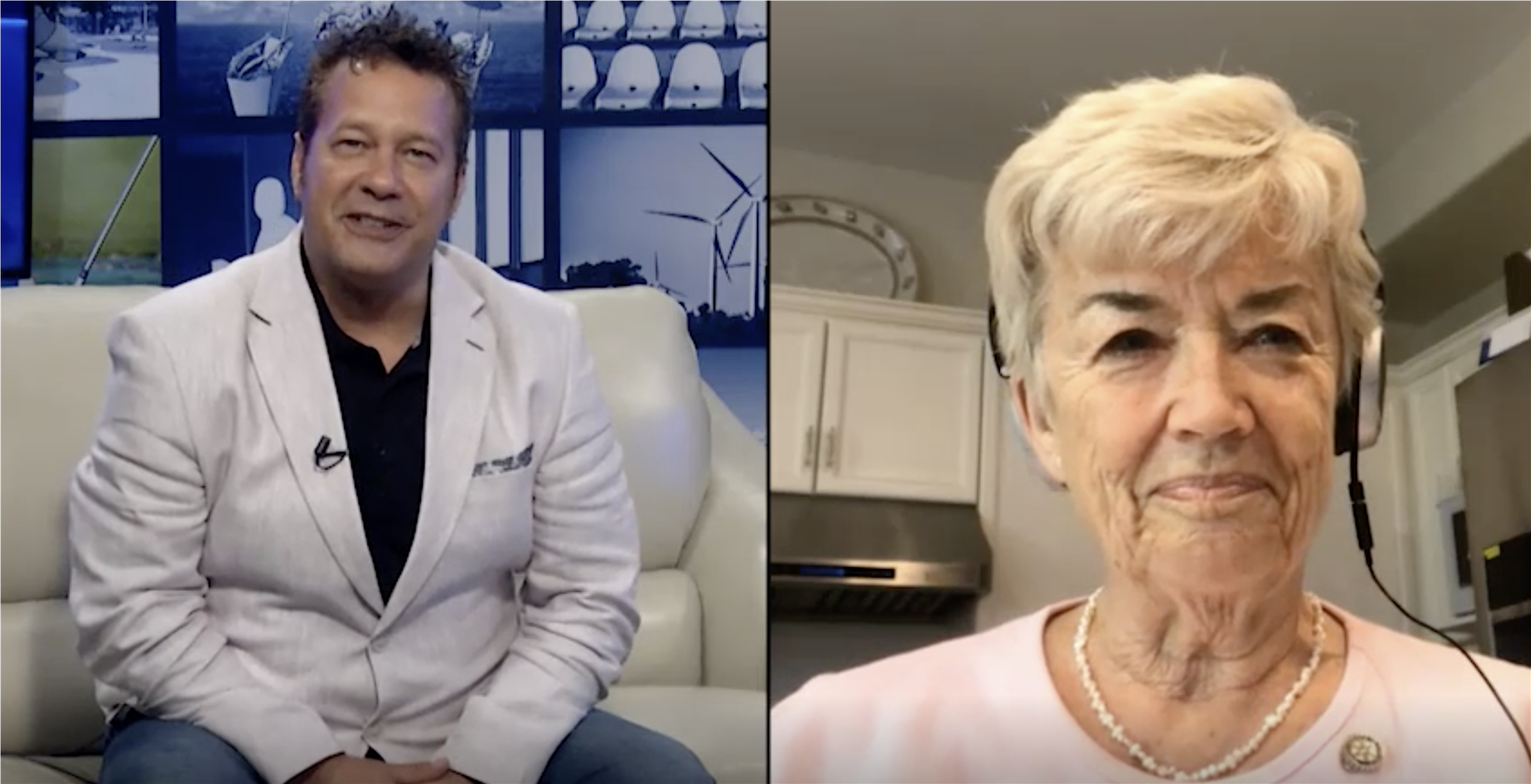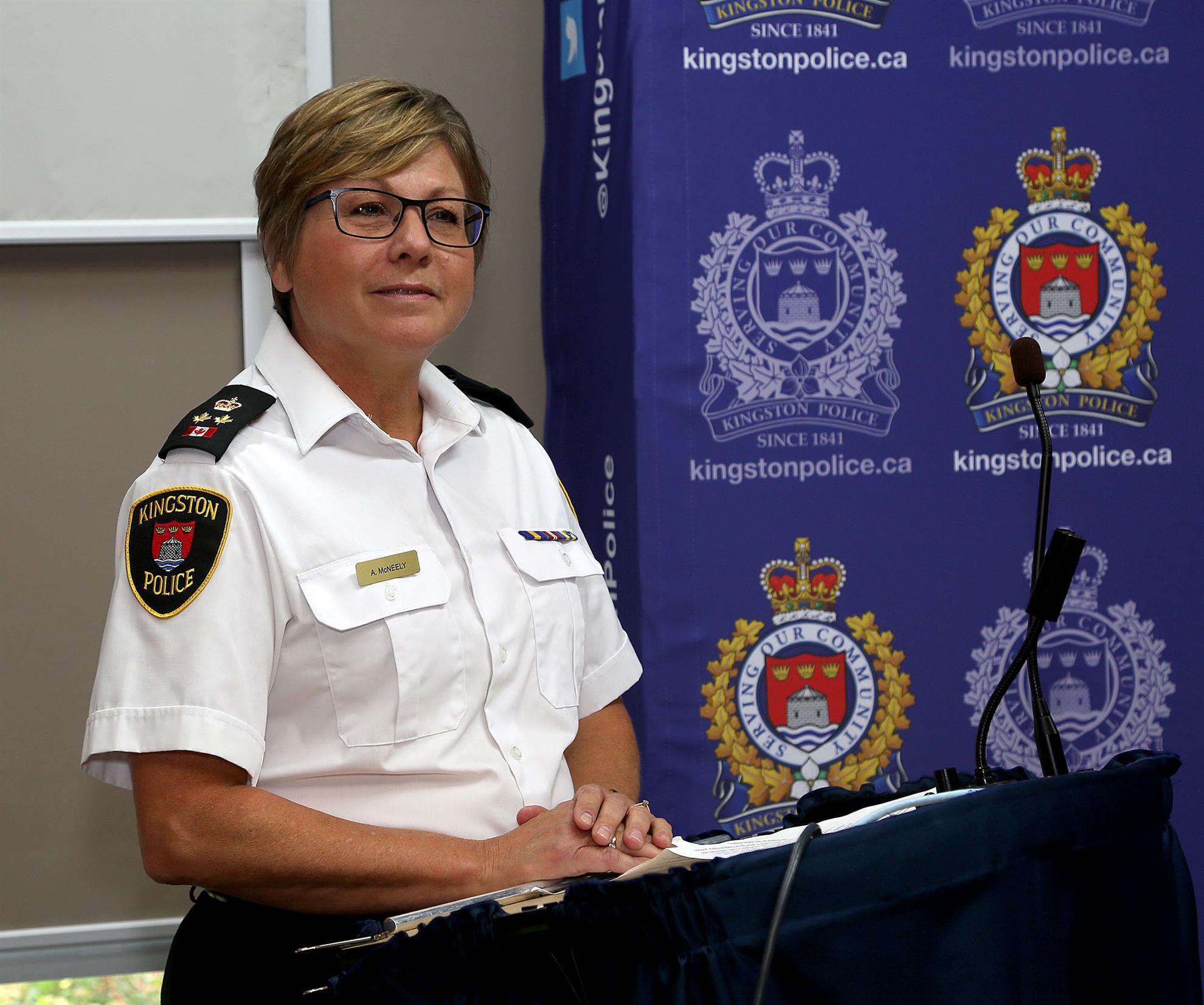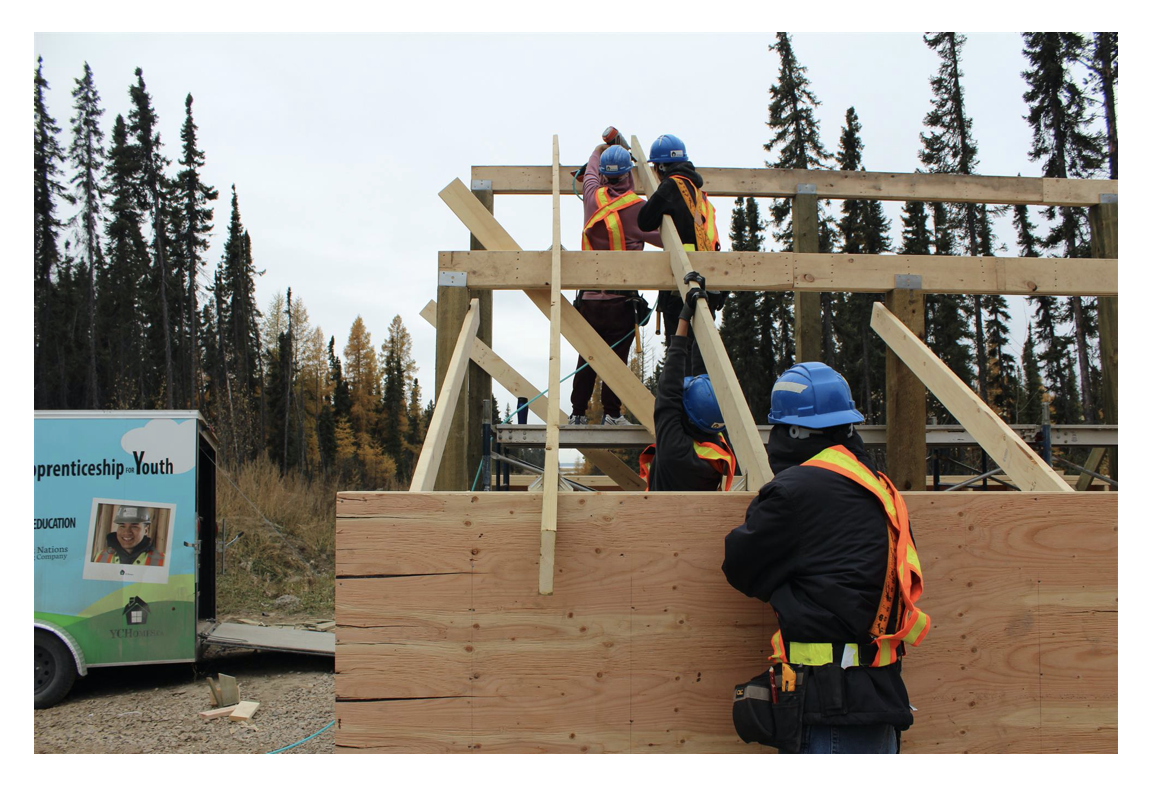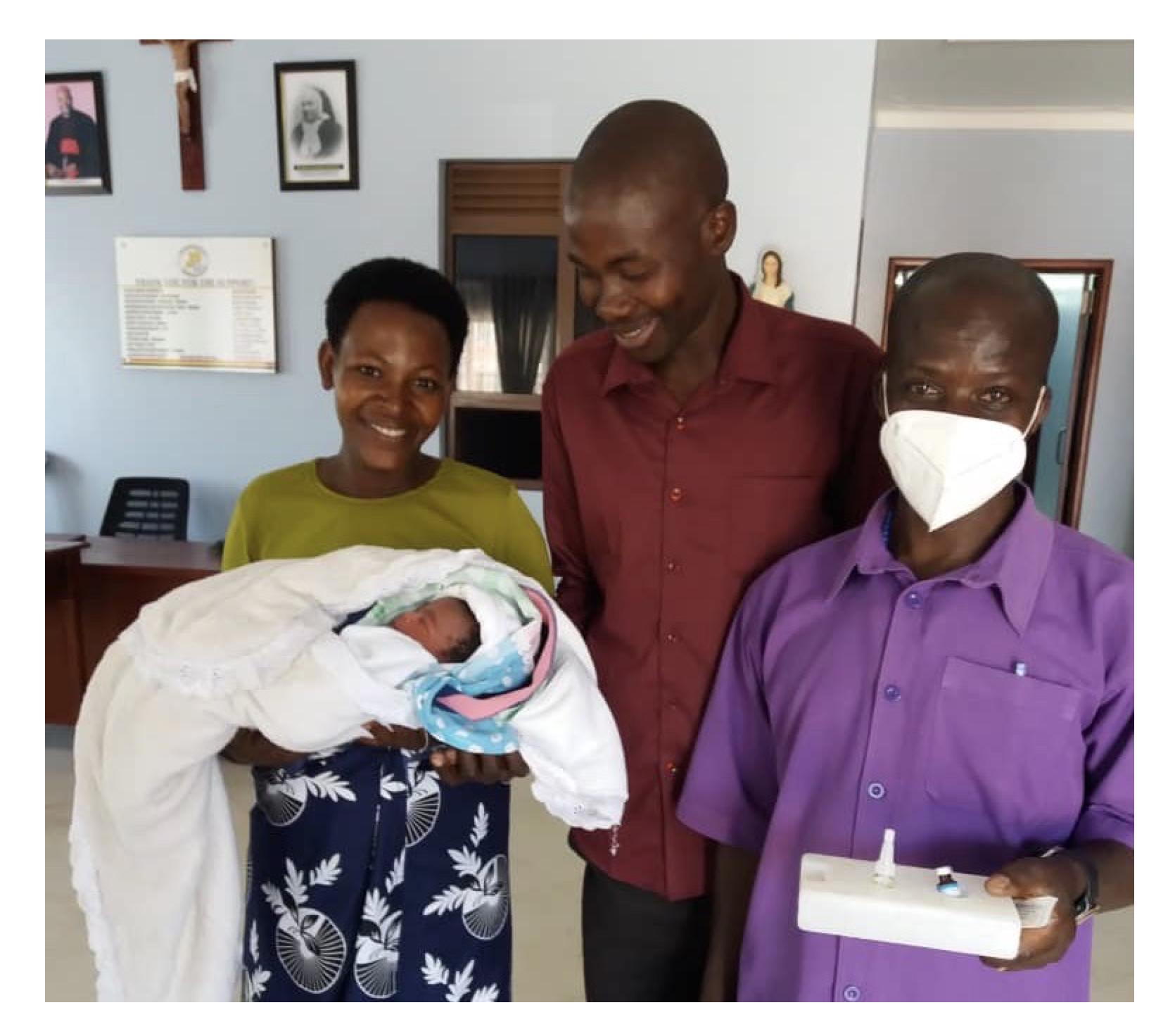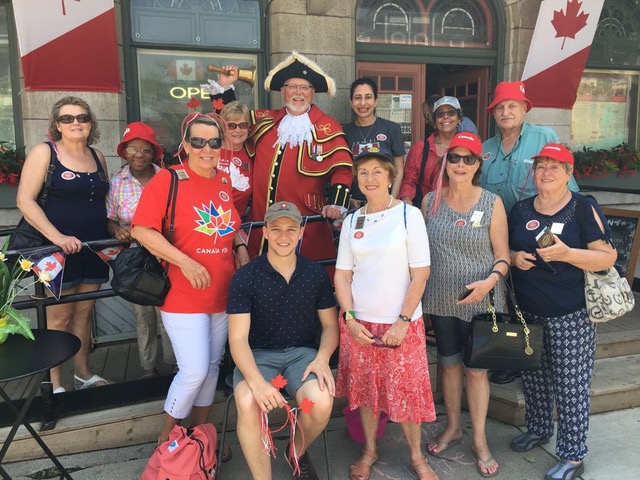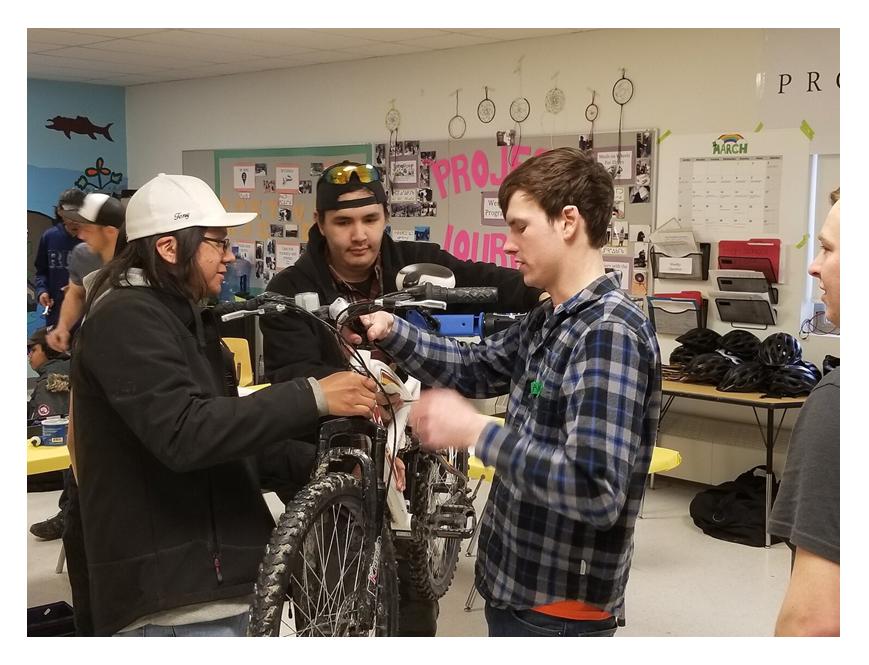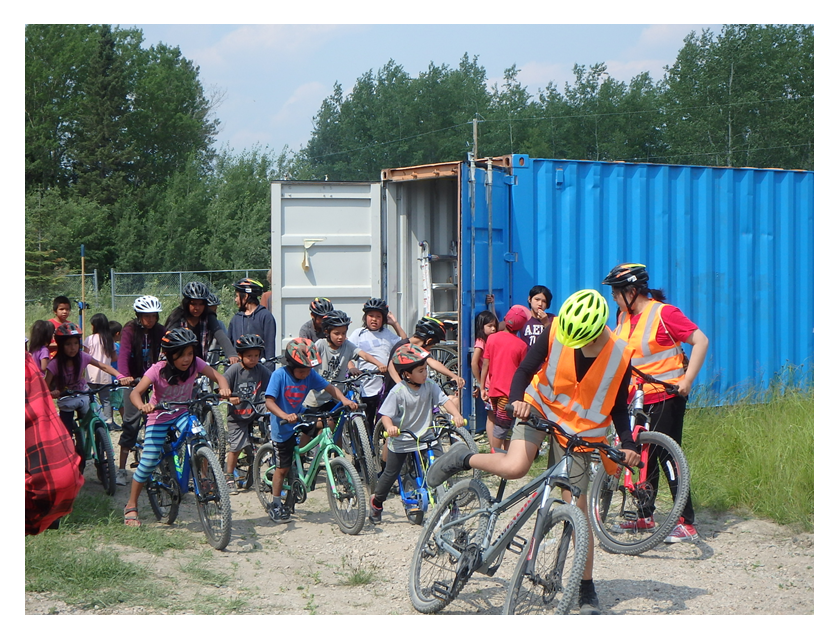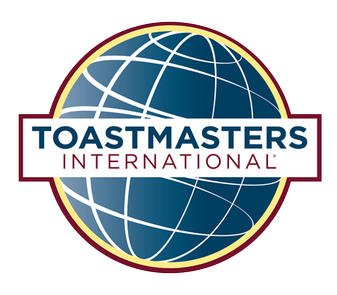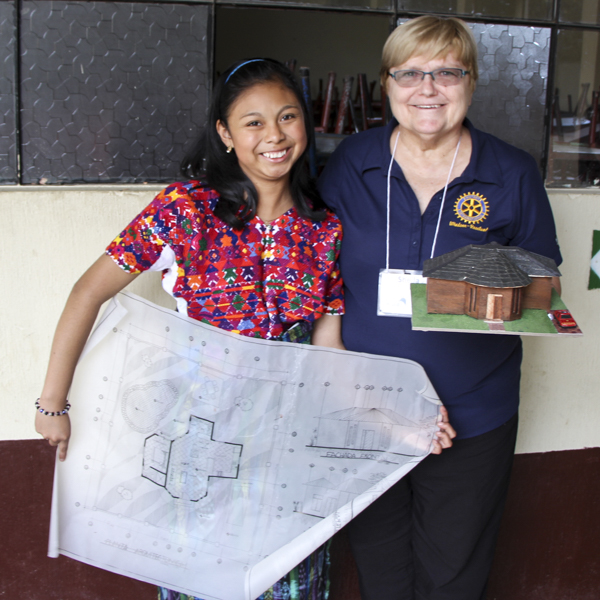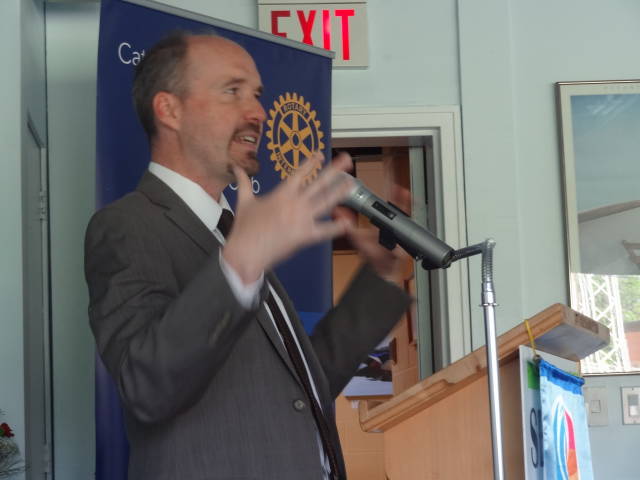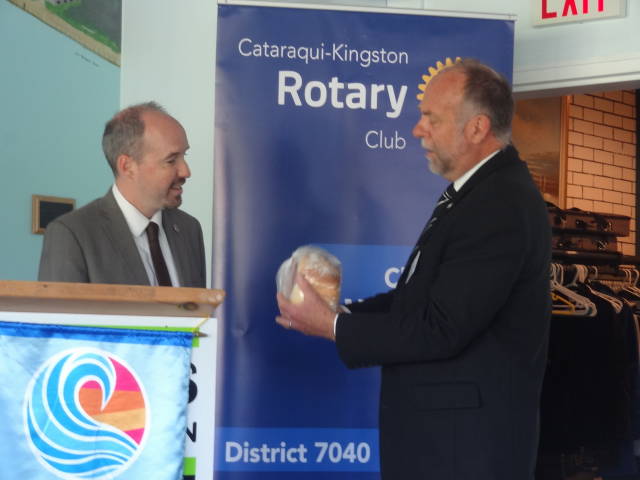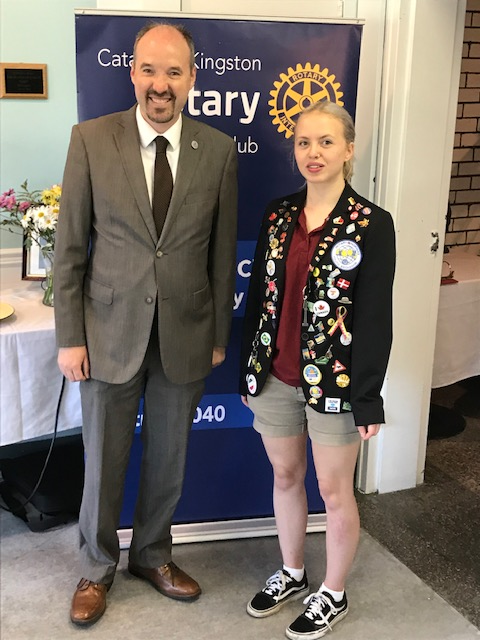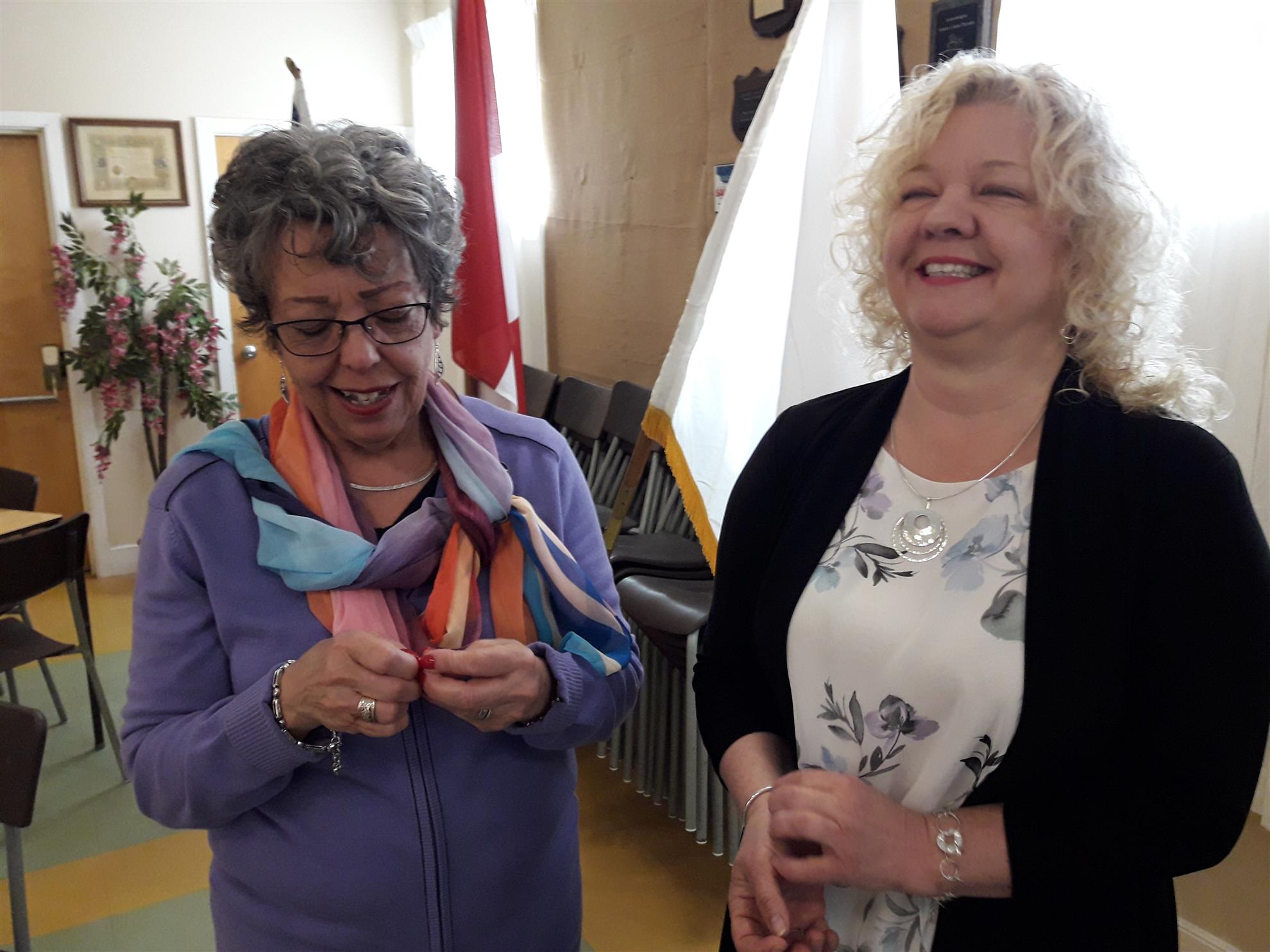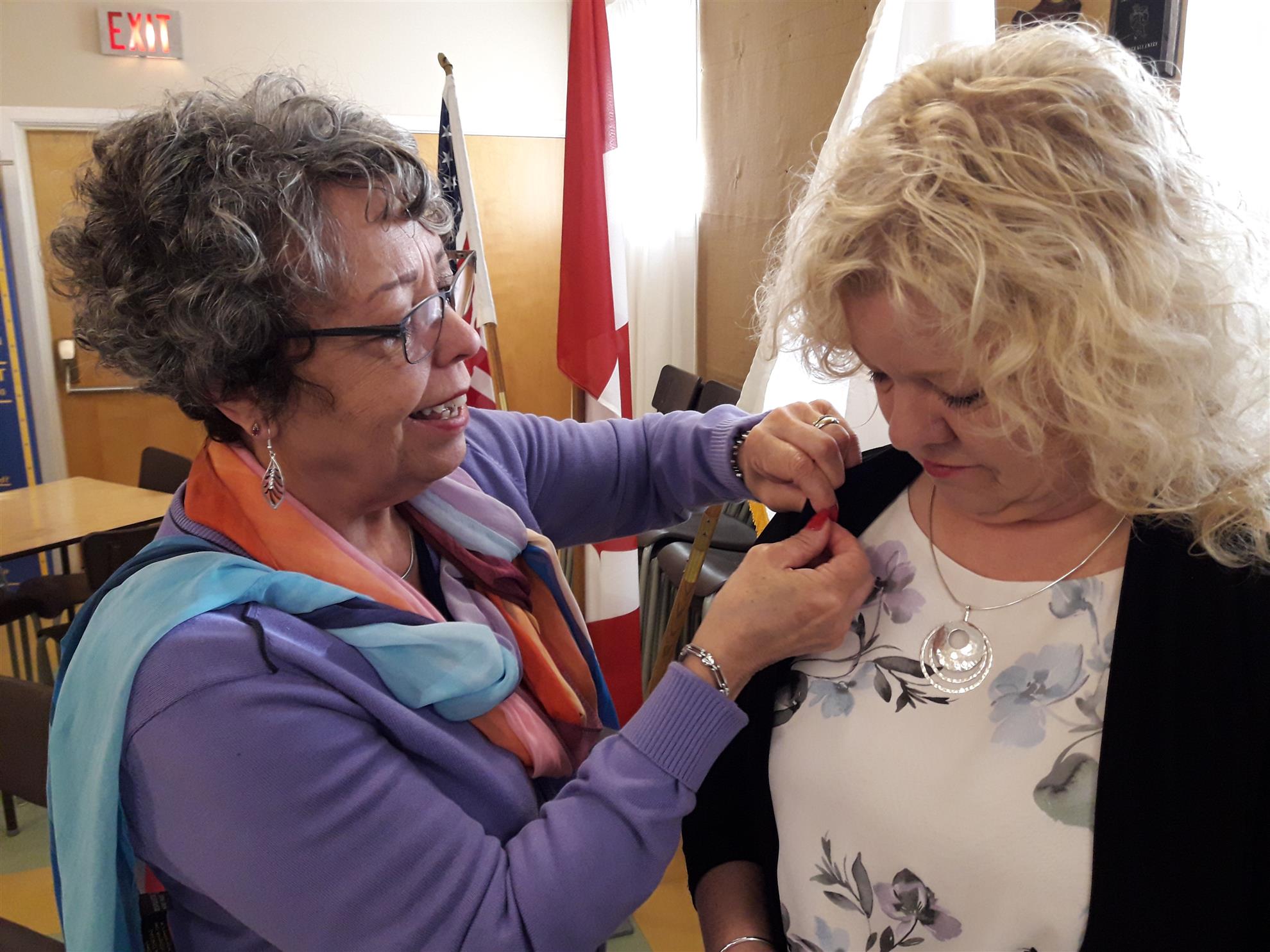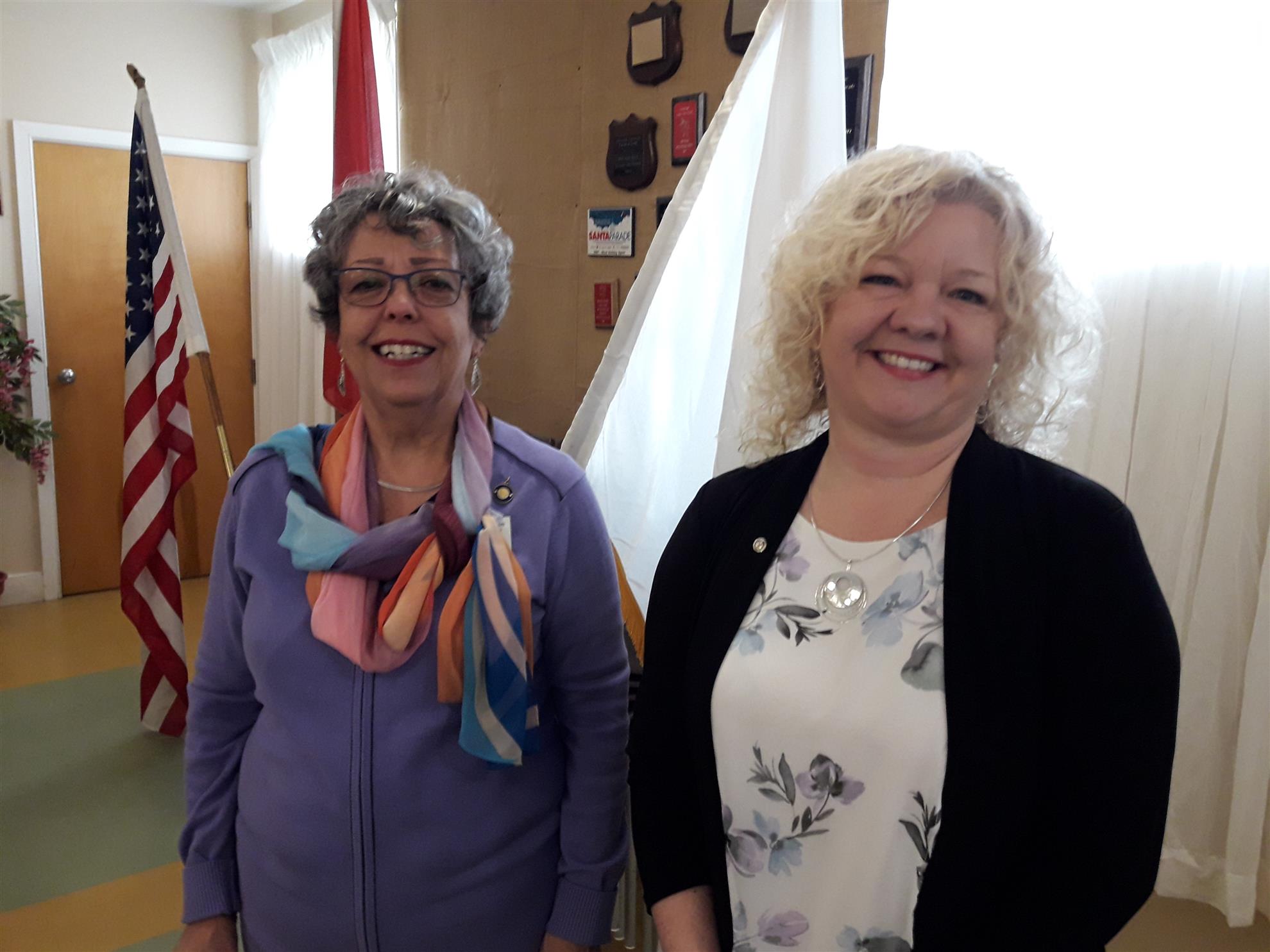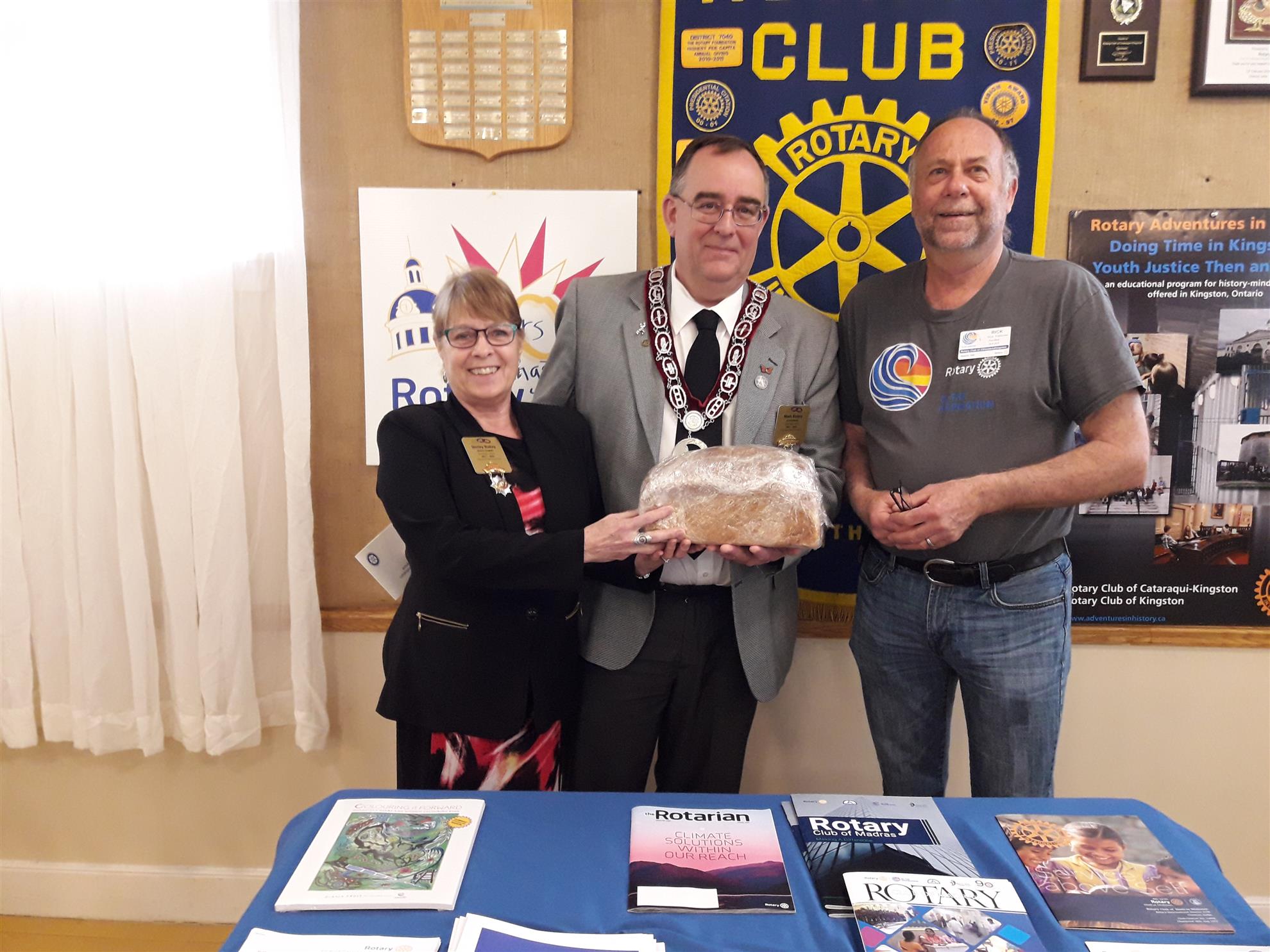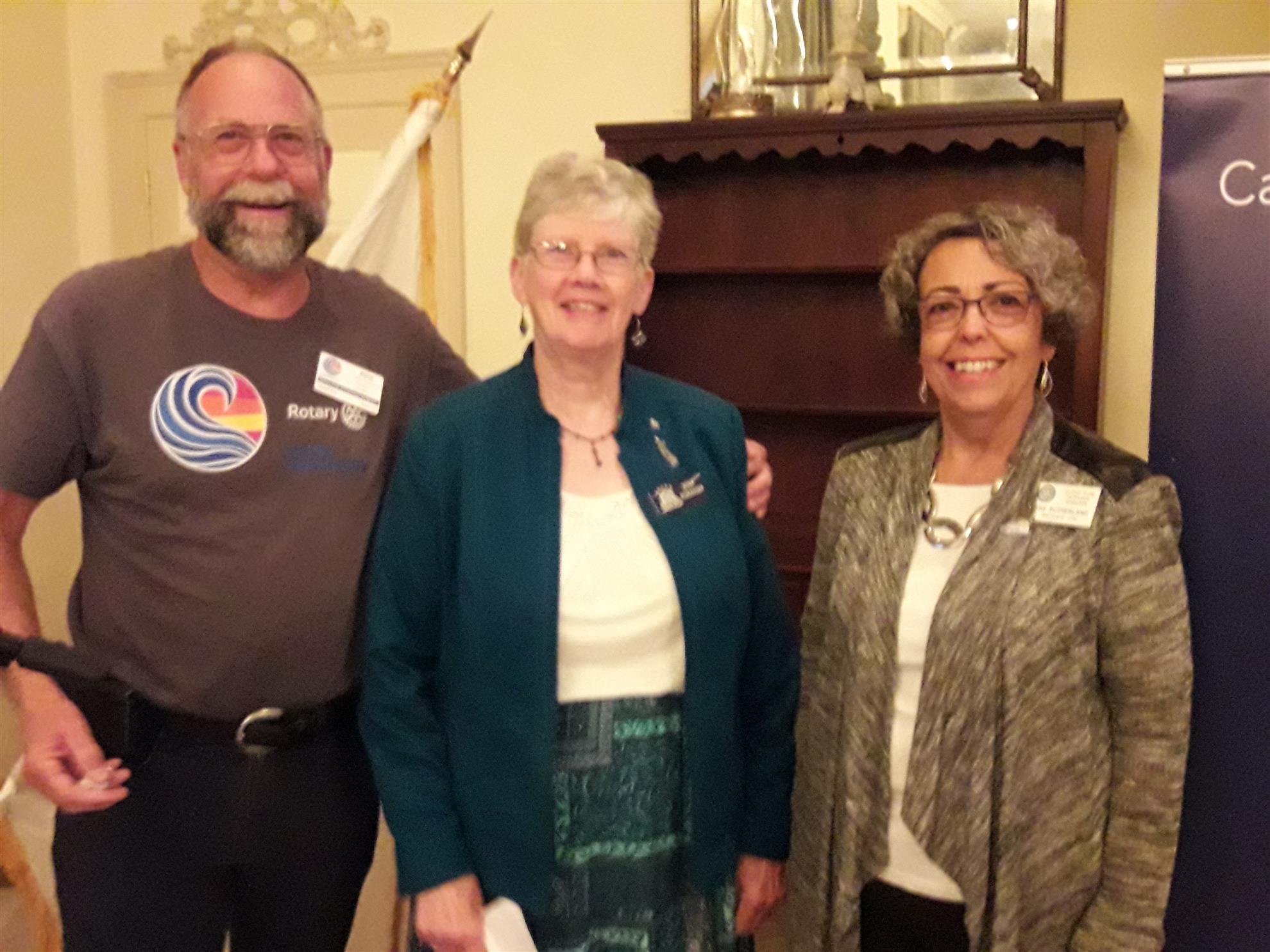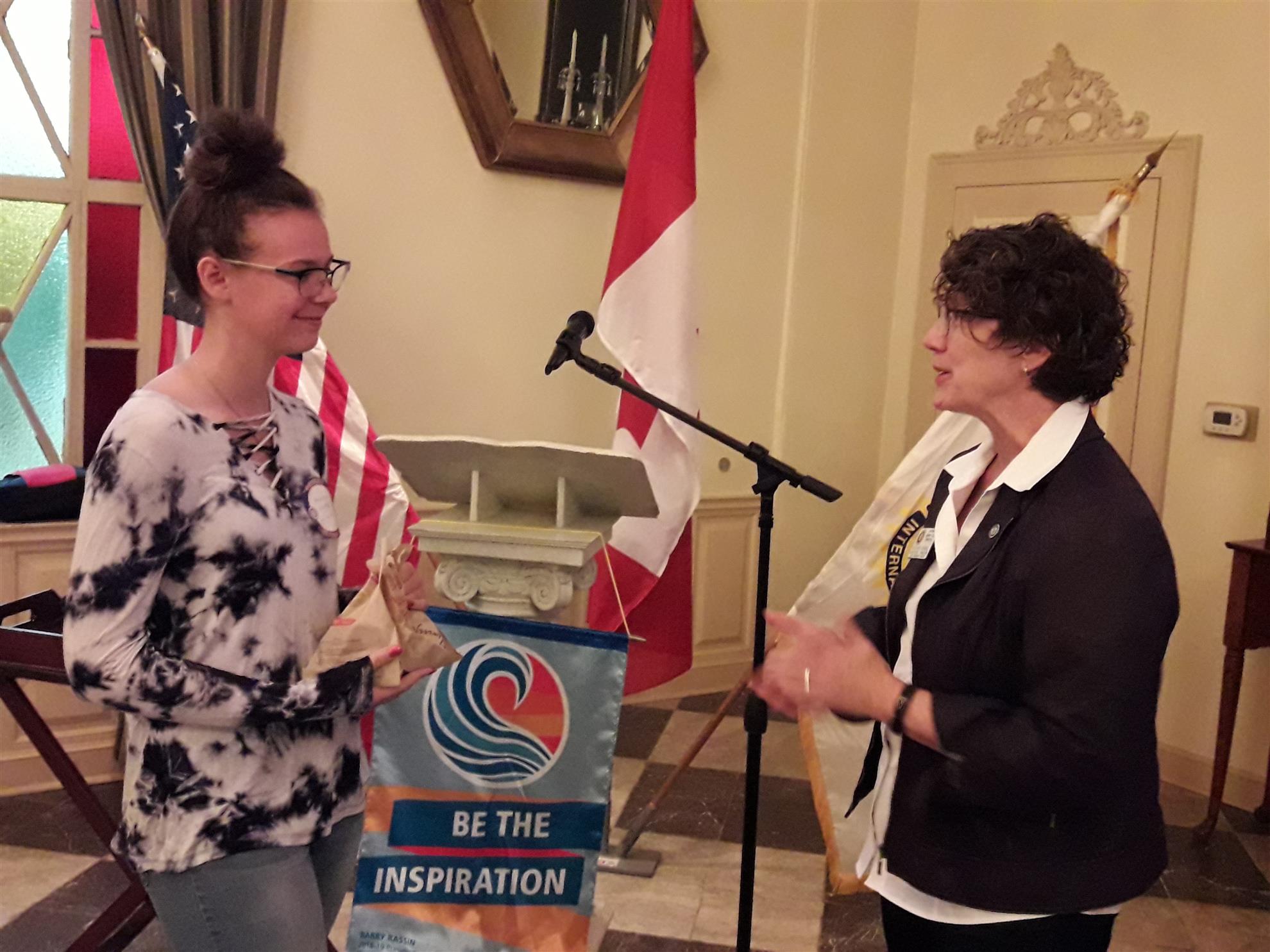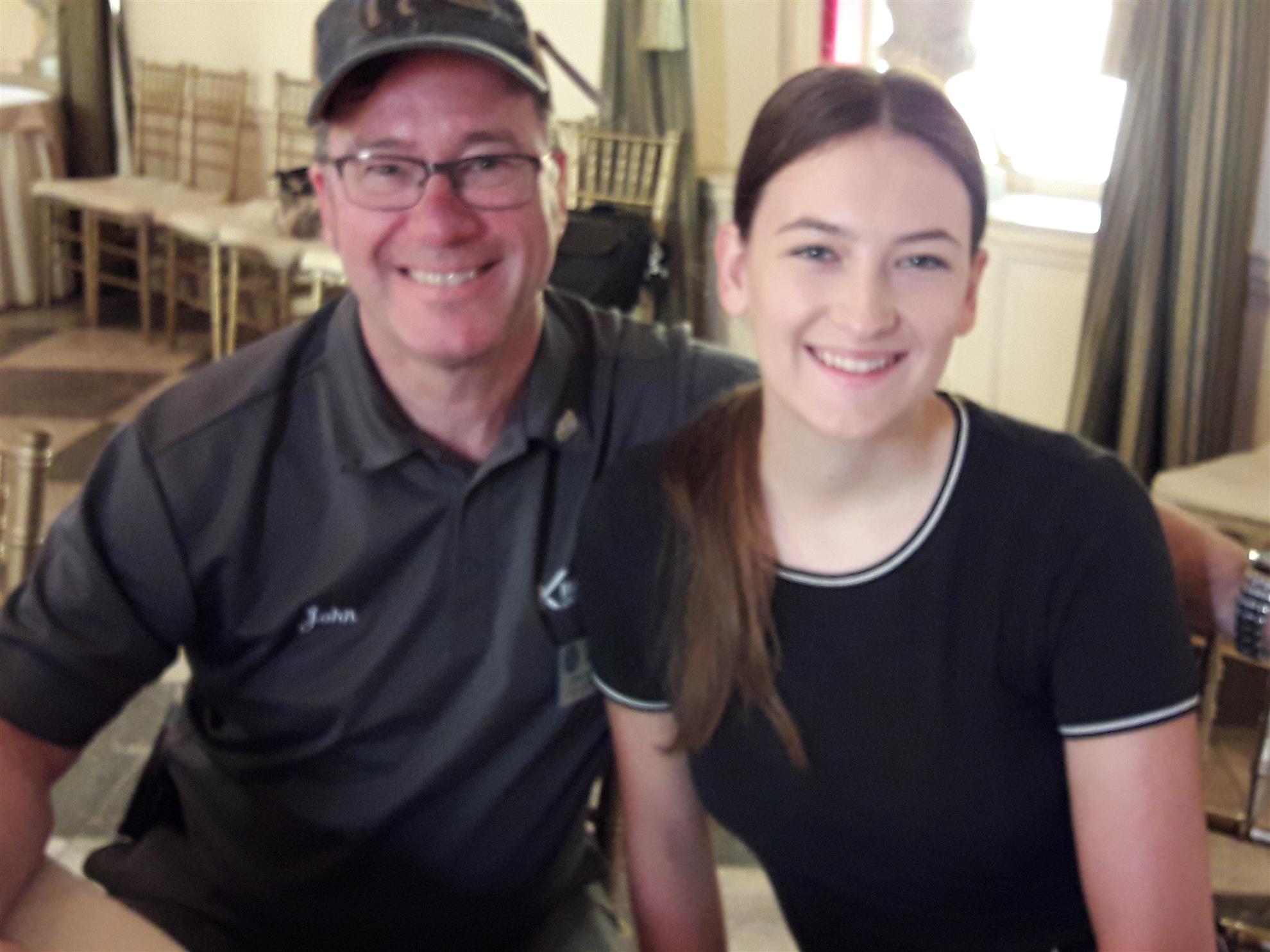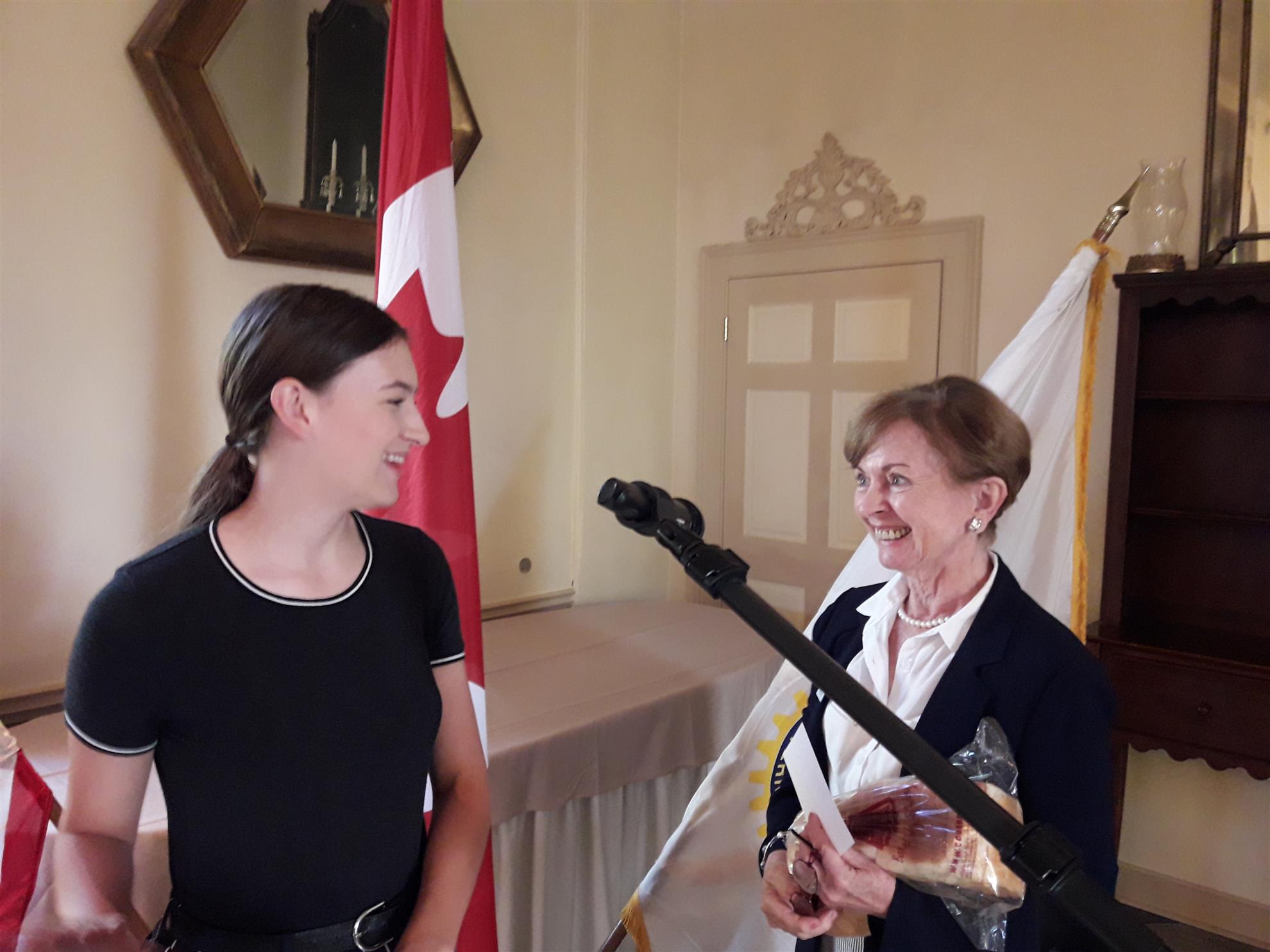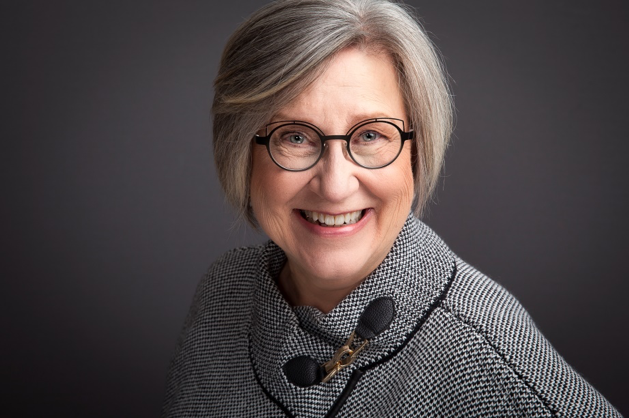Stories
|
APRIL 30, 2024 - DEADLINE for Submissions! 🌷 SPRING 🌷 Community Service Project Grants Online Applications now available! We support local, innovative, specific community projects! Your organization may be eligible for one of our Community Service Project Grants! |
||||||||
Speaker October 24th, 2023 Foundation Chair Tom Zsolnay, Polio PlusThis year World Polio Day fell on our regular meeting day. Foundation Committee Chair Tom Zsolnay spoke briefly about the Rotary Foundation in general, and about Polio Plus in detail. Polio Plus is one of Rotary's signature projects. Since the 1980's Rotary, with help from the CDC, the WHO, and the Bill and Melinda Gates Foundation have been fighting to eradicate Polio forever. Tom invited all members to join in this fight. The full presentation can be seen at; 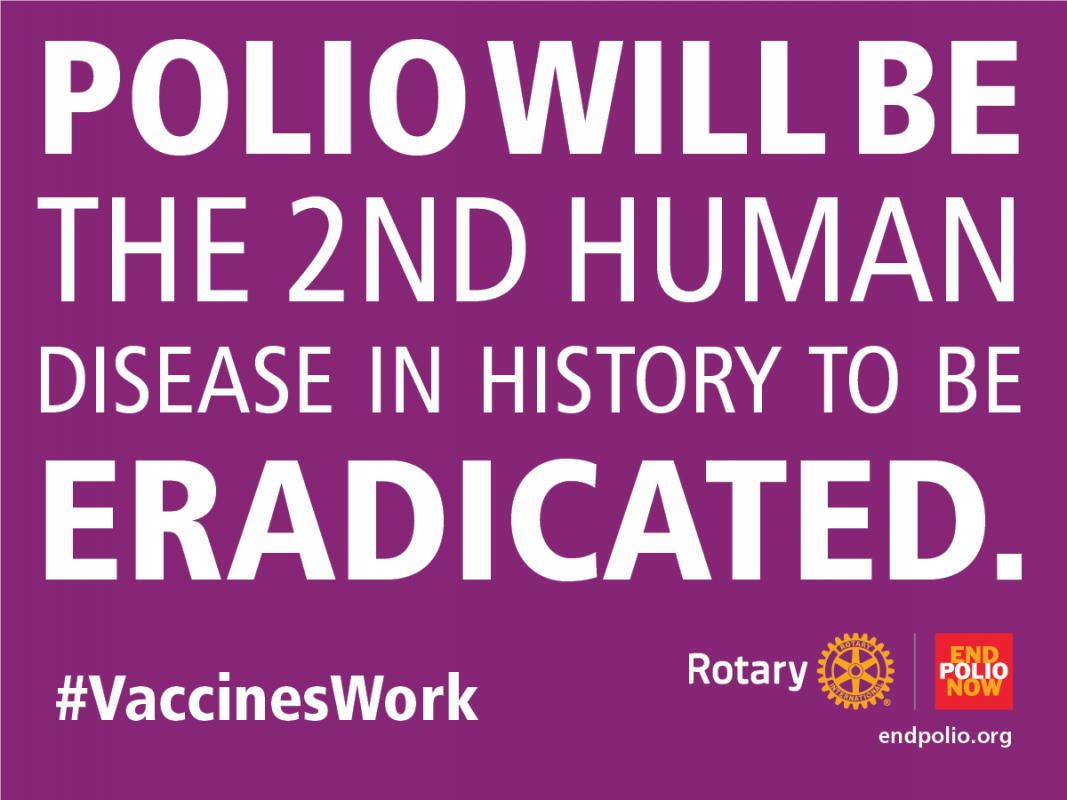 |
||||||||
Speaker September 19th, 2023 - Paige Bailey, Adventure in the EnvironmentToday we heard from Paige Bailey, a high school student who our Club selected to participate in Adventures in the Environment. This is a long standing project of the Rotary Club of Cornwall Sunrise that allows high school students to experience working in environmental studies. This year's program took place from September 11th to 14th. Activities included; counting pollinators, identifying and measuring fish species, and various lectures on topics such as bats, Monarch Butterflies, beekeeping, eels, and more. Participants stay with hosts in Cornwall. Paige speaks of her interest in Environmental Studies - she participated in a Co-op placement at Sandy Pines Wildlife Centre.
|
||||||||
2023 Fall Community Service Grants A. Online Applications now available for CKRotary FALL 2023 Community Service Grants! Are you looking for funding to support a local innovative, specific community project? Then your organization may be eligible for one of our Community Service Project Grants! Deadline for submissions: midnight SEPTEMBER 30, 2023 |
||||||||
Photography at The MessAt our club meeting May 16, 2023, Sandi Dodds told us of the development of a photography studio at The Mess Open Arts Studio.
|
||||||||
Kingston 4 Paws Update May 16 2023At our regular meeting, May 16, 2023, Tina Bailey gave us an update on the impact on people's lives of the service dogs offered by Kingston 4 Paws, with an update on Millie, currently with foster parents in preparation for training.
|
||||||||
Speaker March 21st - Soren Christianson, Better homes Kingston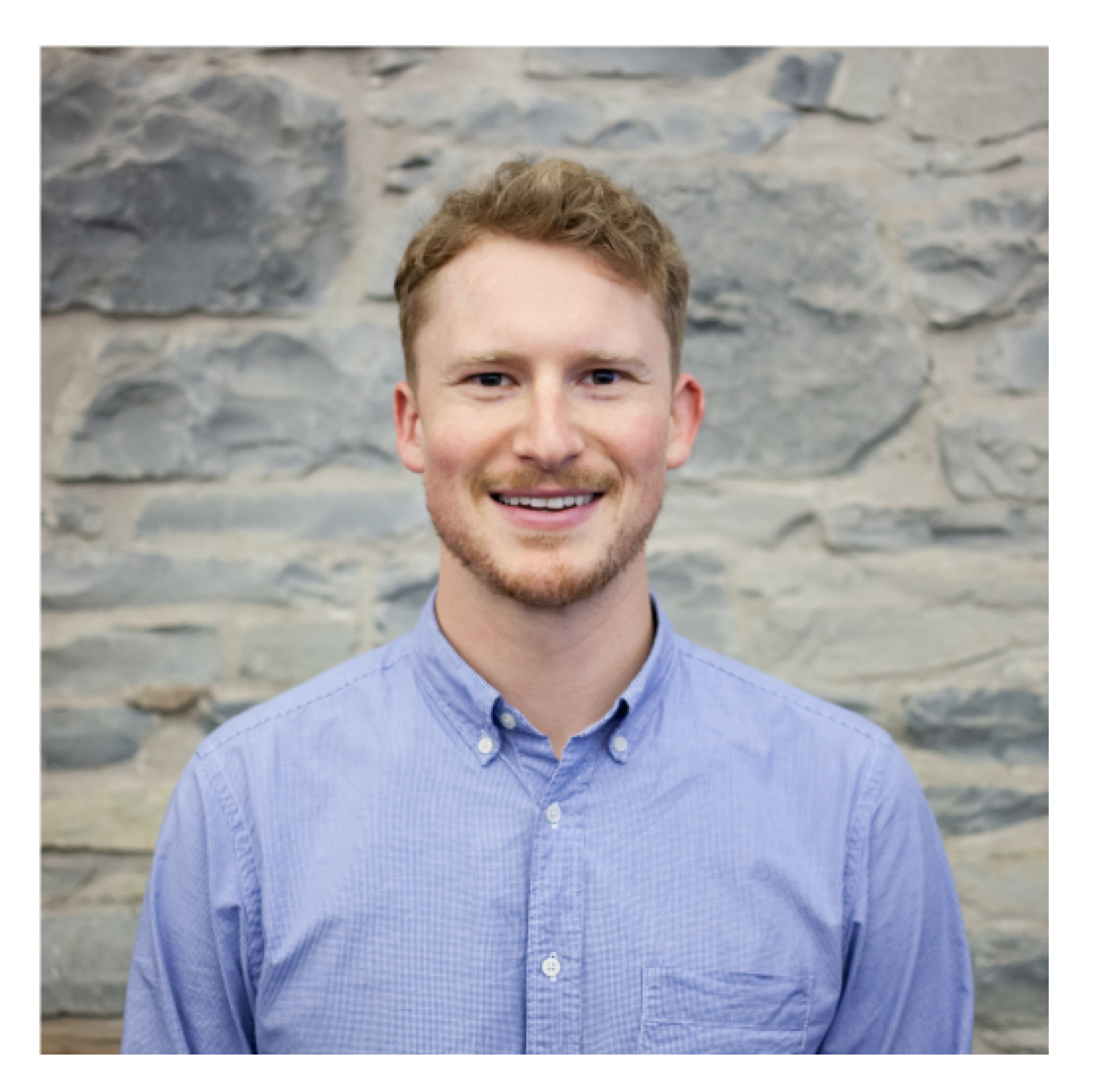 Better Homes Kingston: energy retrofits for your home and the globe! Last year we heard about the commitment of the City of Kingston to supporting climate action, greenhouse gas reductions and more sustainable city-wide initatives. Better Homes Kingston is an energy audit and retrofit guidance program designed to support homeowners with making changes to save money, reduce energy inefficiency and promote better technology. Soren Christianson, Program Director joined us to discuss the program and how the last year has gone for this initiative! Soren's presentation can be seen at https://youtu.be/-9oA1lxL82U
|
||||||||
Speaker March 7th - Jamal Saeed, From Damascus to Canada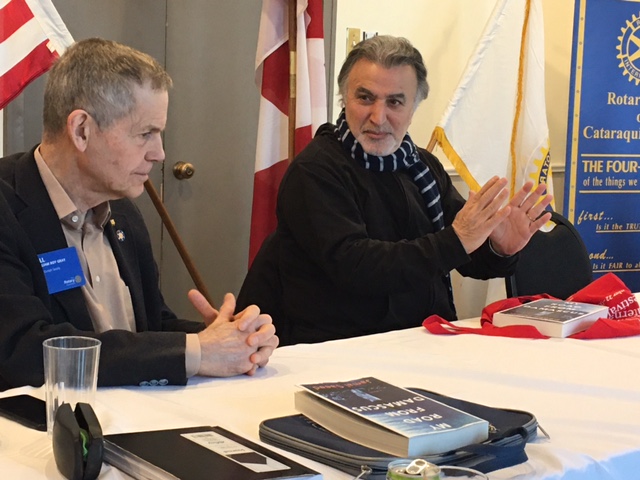 Bill Gray introduced Jamal Saeed, who we first et years ago through our relationship with The Mess. Bill has gotten to know Jamal quite well, and asked him to come and speak about his new book, "My Road from Damascus", which chronicles the journey of Jamal and his family from Syria to Canada. In addition Jamal spoke about the aftermath of the recent earthquake in Turkey and Syria. Jamal's story is dramatic and inspiring, and you can see his full presentation at https://youtu.be/wNTFqdZ4J34
|
||||||||
2023-03-01 Spring Grants announcement for WebsiteCOMMUNITY SERVICE GRANTS . Online Applications now available for CKRotary Spring 2023 Community Service Grants Are you looking for funding to support a local innovative community project? Then your organization may be eligible for one of our Community Service Project Grants! Deadline for submissions: midnight April 15, 2023 |
||||||||
Easter Seals Launch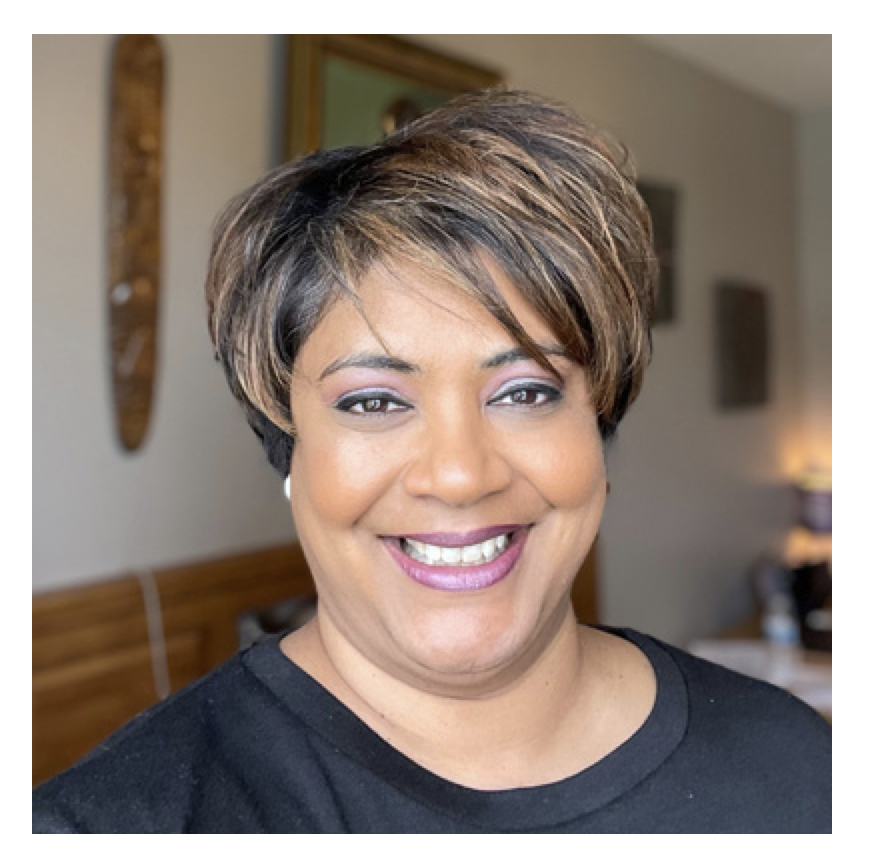 Michelle introduced today’s speakers to kick off the Rotary Easter Seals Campaign. Linda Clouthier and Kingston Club Champion Todd Colbourne joined us live from Smitty’s Annual Pancake Breakfast. Linda told us the happy news that the Easter Seals Camps will be up and fully running the year! Todd thanked us for our Club’s long-time support of Easter Seals. We were also joined by Eater Seals Mom Laura and her 9-year-old son Beau and heard their story and how Easter Seals has helped them. To see the whole presentation, click on the link below. |
||||||||
Speaker February 7th - Travis Blackmore - An Update on Lionhearts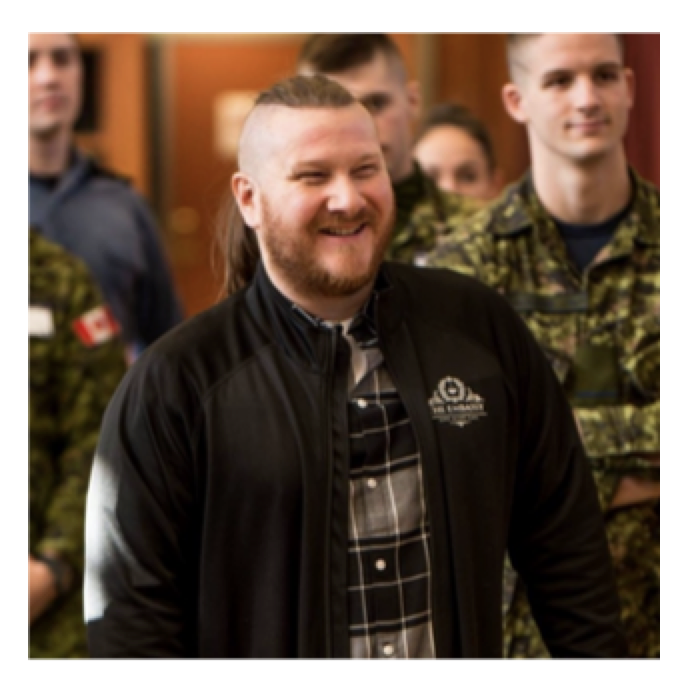 Speaker February 7th - Travis Blackmore - An Update on Lionhearts John Farrow welcomed today’s speaker, Travis Blackmore of Lionhearts. Travis and his crew of volunteers have been doing amazing work since the start of the pandemic, increasing food security to vulnerable people in Kingston. Travis talked about his journey from rock and roll drummer to working as the Executive Director of Lionhearts. He also gave us details of the work of Lionhearts, and talked about the coldest night of the year fundraiser. You can participate in the walk by registering at https://cnoy.org/location/kingstonwestend. To see the rest of Travis’ presentation, click the link at https://youtu.be/Q3-ewmkVOFY |
||||||||
Speaker January 24th, 2023 - Mark Nardi, Business Support Analyst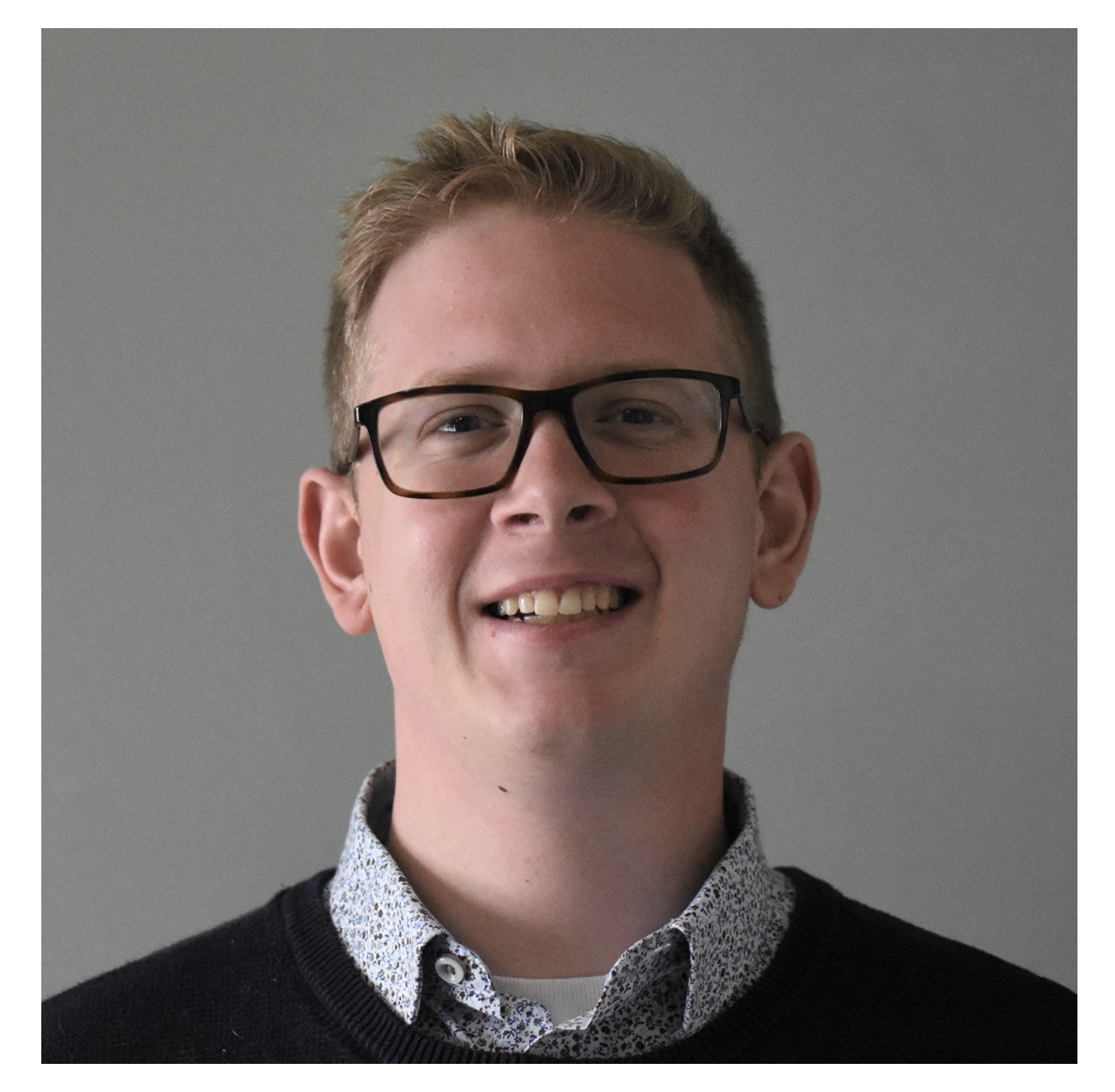 Mark Nardi is a Business Support Analyst with the City of Kingston's Business Support Office. The Business Support Office leverages knowledge of City departments and municipal processes to help local businesses get effective resolutions when working with the City. It was created because many business owners don't know the services available to them, or may not know how to access them. To see Mark's full presentation, click on the link below; |
||||||||
Speaker January 17th - Michel Wong Kee Song, 7040 District Governor 2022-2023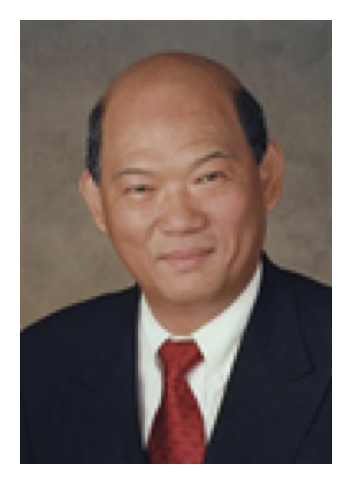 President Sean welcomed District Governor Michel this morning. Michel Wong Kee Song is an entrepreneur, community volunteer and a family man. Born and raised in Vacoas, Mauritius, he was surrounded by many different cultures and developed a passion for the travel industry. He has owned his travel business for over 40 years and has been giving time to his community for even longer. Growing up in a struggling neighborhood, he quickly learned what was important and wanted to help others in need. Michel shared his Rotary origin story with us, and also talked about some projects that he was proud the be involved in. Michel has attended 16 International Rotary Conventions! Michel was thanked by Elizabeth this morning. To see all of Michel's presentation, click the link below. |
||||||||
The Gift of Life - DIALYSIS in Porur IndiaTHE GIFT of LIFE ROTARY Brings DIALYSIS to the Poorest of the Poor in Porur, India 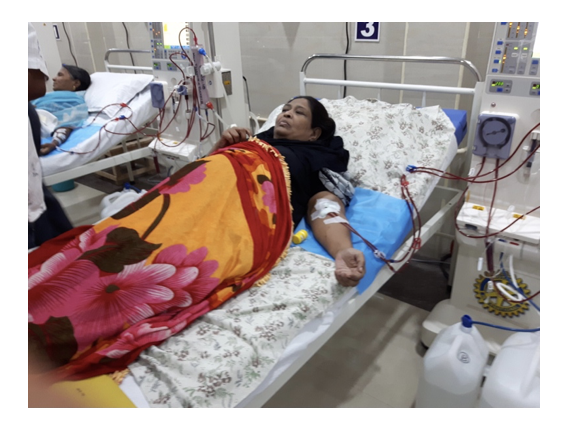 As Rotarians, we are all familiar with our claim that we serve to change lives, and as Rotarians, we do our best to live up to that goal through the many projects we support. But some projects not only change lives, they also SAVE lives! Through a Global Grant worth almost US$120,000, the Rotary Club of Chennai Capital obtained financial support from Rotary clubs around the world – including a contribution from the Rotary Club of Cataraqui-Kingston – to provide life-changing and life-saving kidney dialysis treatment for some of the poorest people in the south of India suffering from Chronic Kidney Disease (CKD) for whom treatment was virtually unattainable.
|
||||||||
fall grants banner*FALL* COMMUNITY SERVICE GRANTS Are you looking for funding to support a local innovative community project? Then your organization may be eligible for one of our Community Project Service Grants! Our Community Services chair discusses these grants with Bill Welychka on CKWS
|
||||||||
BREADWINNERS at LPS!BREADWINNERS! at LOUGHBOROUGH PUBLIC SCHOOL The new Teaching Kitchen at Loughborough Public School was inaugurated by Mr. Alan Macdonald’s Grade 7 Challenge North Class on the last Monday of the school year! The students prepared and baked 16 loaves of bread and clearly enjoyed the experience of being the first class to use the new kitchen, as well as being pleased with the outcome of their efforts. The Kitchen is part of the the Greenhouse and Teaching Kitchen Project that has been in the planning and construction stages for the past three years. Once the idea of a previous Grade 7 Challenge Class as a “Legacy Project” for future generations of students, both the Greenhouse and the Teaching Kitchen are now fully constructed, although the interior of the Greenhouse has yet to be outfitted. The purchase of the major appliances, work tables, and shelving units for the Teaching Kitchen was made possible by a CK Rotary Community Service Project Grant that was awarded to Loughborough Public School for that purpose in our Spring Grants competition. CK Rotary congratulates Mr. Macdonald and his students on their bread making skills and wishes all who use the new kitchen success and a sense of pride in all their future culinary achievements! 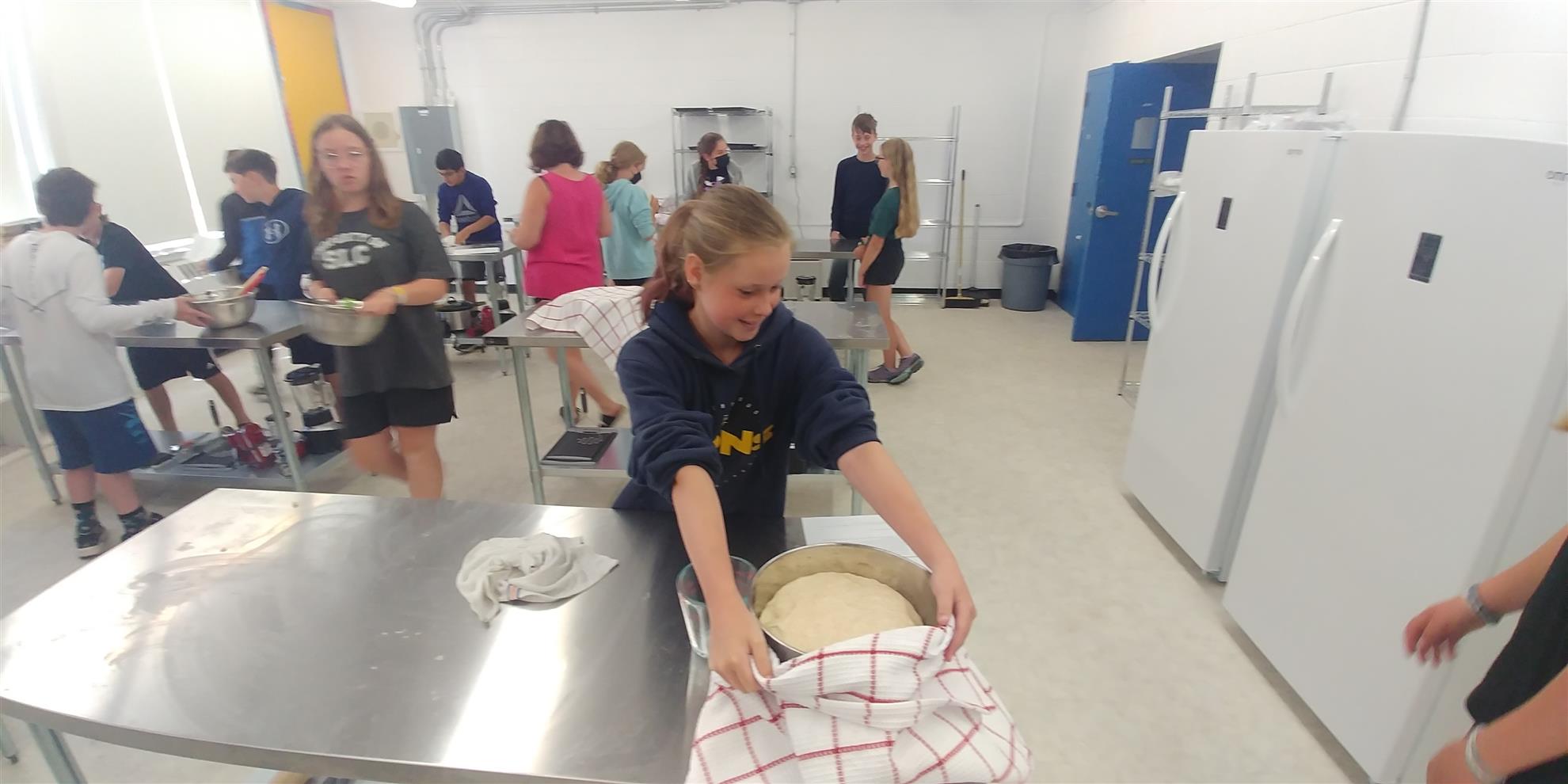 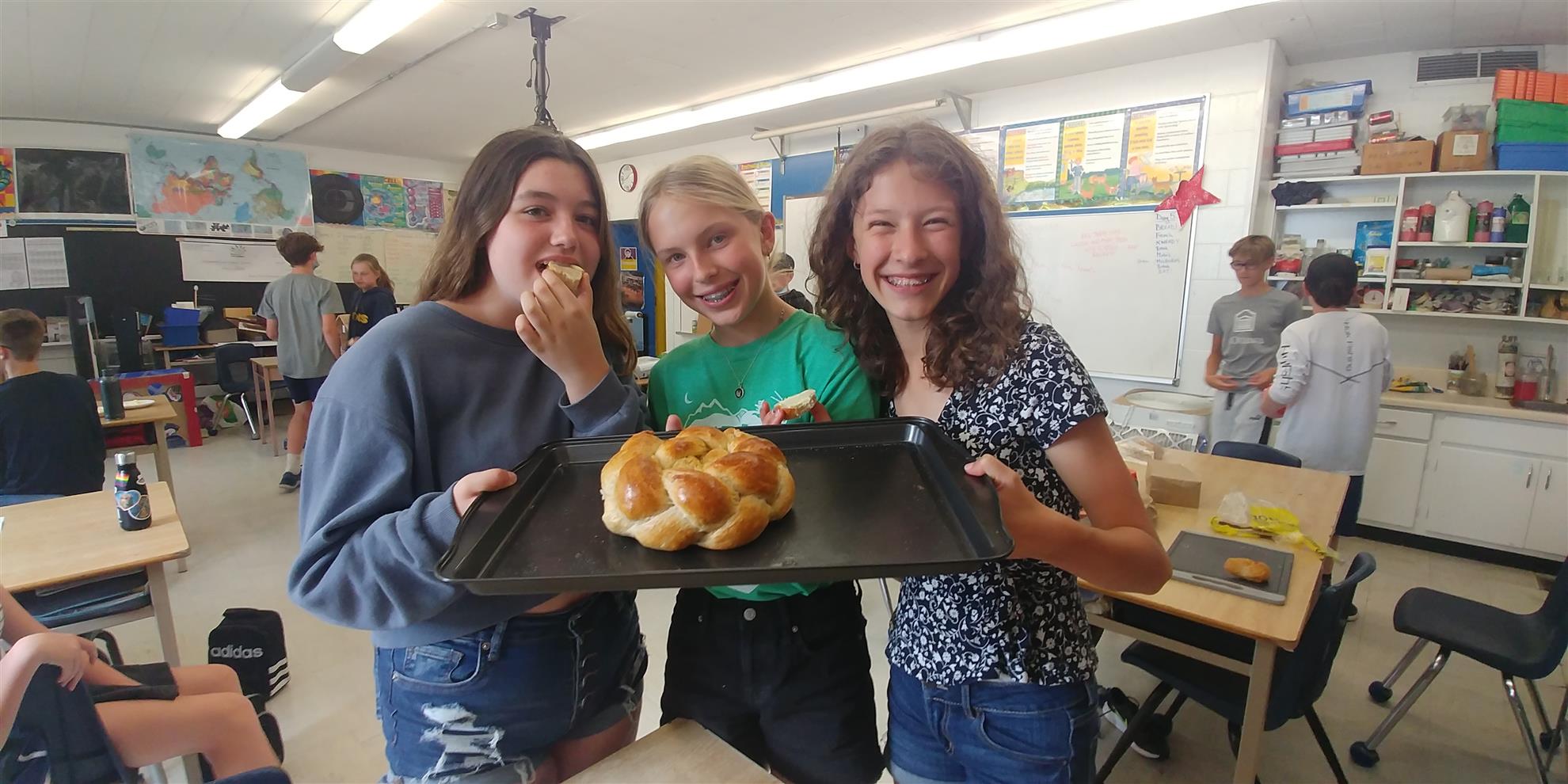 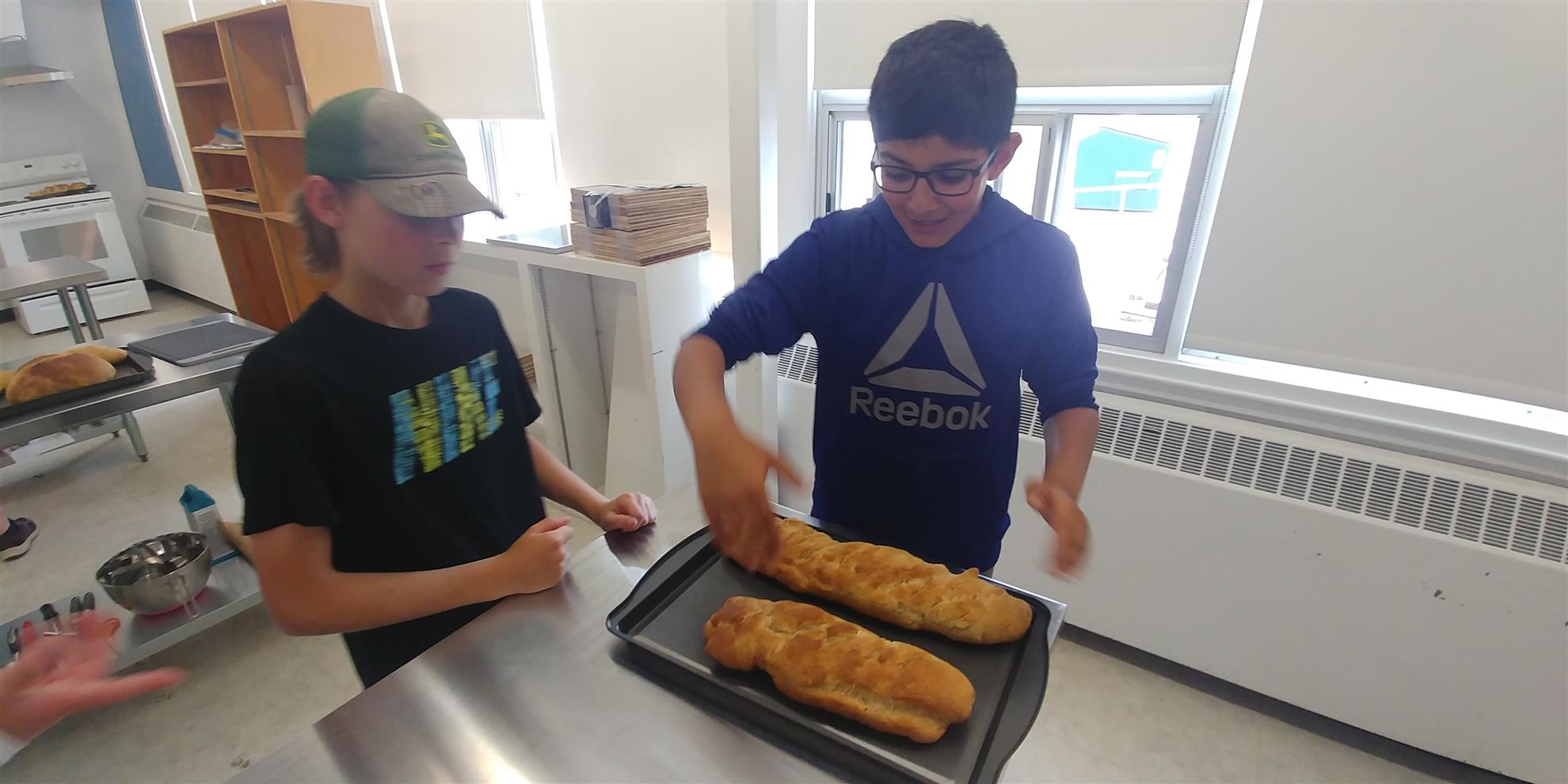 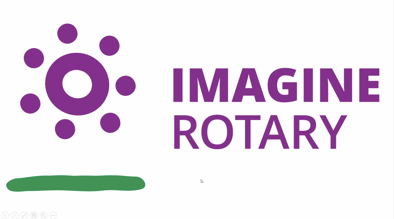 |
||||||||
Classroom Without Walls IMAGINE… …a classroom without walls, no chalk board, no bulletins boards, no desks, and no chairs, but a place in the forest, with trees, and wild flowers, and filtered sunlight, and rocks with moss, and squirrels running about! THIS is the classroom of Mother Nature where 120 young schoolchildren from Loughborough Public School will spend a total of five days during the next school year, experiencing the wonders that surround them in Frontenac Provincial Park. |
||||||||
Marilyn Goodyear Whiteley Induction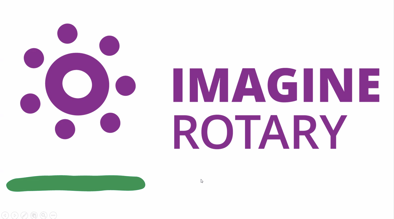 IMAGINE… …that at our first meeting of the NEW ROTARY YEAR, we welcomed our newest member of CK Rotary, MARILYN GOODYEAR WHITELEY! Marilyn was inducted by Past-President, Ana Sutherland, and received her Rotary Pin from new President, Sean Goodall. Congratulations to Marilyn were expressed by all Rotarians in attendance, including her Sponsor, Rotarian Elizabeth Cohoe. 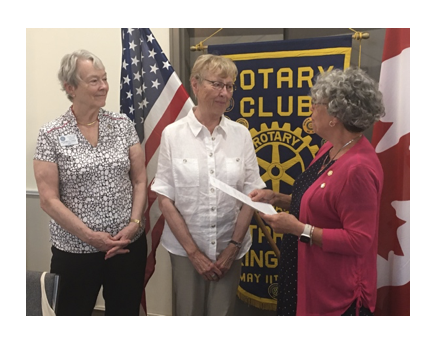 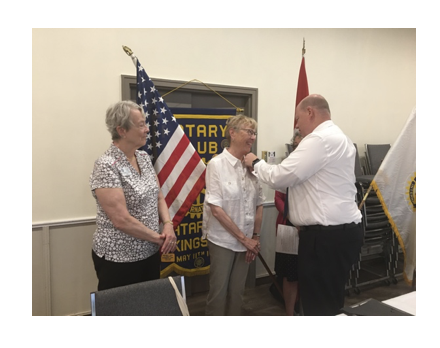 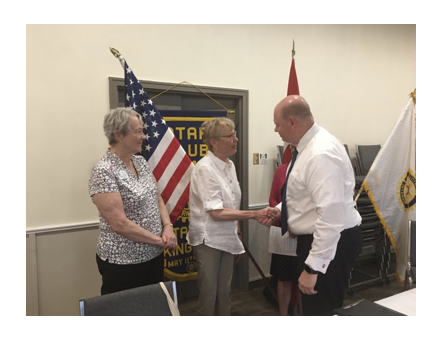 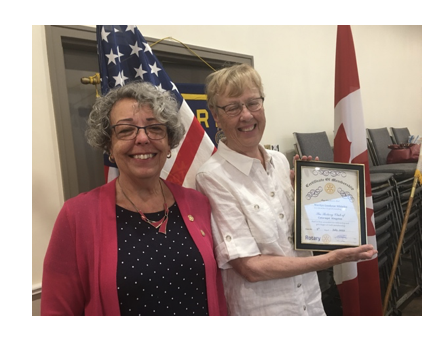 |
||||||||
MORE TREES, PLEASE! A Community-Based Response to Climate Crisis It is no secret that our planet is in the midst of both a climate AND a biodiversity crisis due to climate change. Even our Kingston Municipal Council has declared a climate crisis in our city. While we alone cannot solve the global problem, we can make a difference by doing our part to increase climate resilience in our city! How, you might ask? Well, read on… We are pleased to announce that CK Rotary has formed a strategic partnership with Little Forests Kingston (see also Facebook), an organization led by Joyce Hostyn, a local community leader and committed “rewilder.” Joyce’s vision is to vastly increase the forest canopy in all our Kingston neighbourhoods by planting “tiny forests” throughout the city in an effort to increase climate resilience. |
||||||||
Speaker June 7th, 2022 - Marilyn Powers, Michelle Peters, Jeanette Gaffney - EarlyAct at Vanier Public School in BrockvilleGuest Speaker Introduction by Elizabeth Cohoe. “Several years ago, at a District Assembly, I had the privilege of hearing a presentation about EarlyAct at Vanier Public School in Brockville. It’s been in the back of my mind ever since, as a worthwhile club for elementary school students. Over the last few years, our Rotary Club has been developing a strong relationship with Loughborough School in Sydenham, most recently through our assistance with their greenhouse and teaching kitchen. They have representatives here today to hear about the experiences at Vanier School. Needless to say, I’m very excited about hearing from our speakers today. Marilyn Powers and Michelle Peters are Rotarians at The Rotary Club of Brockville. Jeanette Gaffney is a grade 3 – 4 teacher at Vanier School. It was Michelle who was inspired to get EarlyAct started at the school, when she was teaching there. On her retirement, Jeanette took over the leadership of the program. Marilyn is the current Rotary Club liaison for EarlyAct at the school. When I contacted them to see about a presentation at our club, I was inspired by their enthusiasm for EarlyAct and the impact it has had on their school.” Marilyn, Michelle and Jeanette’s complete presentation and video is available on our website. Alan MacDonald and his class from Loughborough Public School also joined us this morning to hear their presentation. Greg Mumford thanked our guests with the traditional loaf of bread which will be donated to Lunch by George. To see more about Vanier Public School's Earlyact Club, see https://vanier.ucdsb.on.ca/for_students/get_involved/early_act_club |
||||||||
Speakers March 29th, 2022 - Update from Two More Grant RecipientsThis week we heard updates from two more of our Fall Grant recipients - Napanee Rotarian Mandy Stapeley from Autism Network Lennox and Addington County, and Tara Bauer from Turtles Kingston. Mandy spoke about the mission of ANLAC - to support individuals and families affected by Autism Spectrum Disorder (ASD), and provide education to the community. One in 59 Canadians is affected by ASD, which covers a wide range of conditions (hence 'spectrum'). Autism Network LAC won the 2021 Social Impact Award from the Napanee District Chamber of Commerce for it's work. They received a grant to provide 14 sensory support kits for kids in schools. These kits include tactile items (shown below). The items can be comforting, allow self regulation, help reduce stress, and avoid meltdowns or shutdowns for kids with ASD. 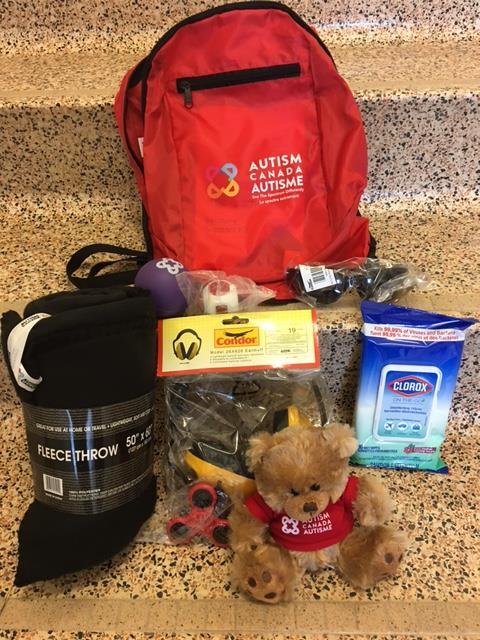 In cooperation with the Limestone District School Board, kits were distributed to kids needing them the most. The LDSB has 4 special Autism support classes and a further 10 referral/support school sites. The kits help foster learning and inclusion, benefiting all kids. With each kit distributed, Autism Canada sned out a package to help families and teachers make best use of the kit. Other work by ANLAC includes; providing kits to first responders to help kids in stressful emergency situations (which they were very pleased to receive); providing communication tablets to schools; and spreading awareness, especially for World Autism Day (April 2nd) and Autism Awareness Month in Canada (September). Our other speaker was Tara Bauer, new Director at Turtles Kingston. Tara is an Environmental Scientist with a B.Sc. and M.Sc., and a background in Hydrogeology. Turtles Kingston is dedicated to protecting and educating the public about turtles in the Kingston area. Kingston is home to five of eight turtle species in Ontario, all of which are at risk. Only 1 % of turtle eggs ever reach reproductive adulthood. They are considered a 'keystone' species - their loss indicates severe breakdown in the ecosystem. Turtles help clean the ecosystem and are a conduit between land and water. They help keep fish populations healthy as well. Our grant provides materials for nest protection boxes. Nest predation is one of three big dangers to turtles (traffic and habitat destruction are the others). The boxes are simple constructions anchored with spikes that help protect turtle nests and allow every egg to hatch. Part of the grant also went to instruction cards and turtle crossing signs. 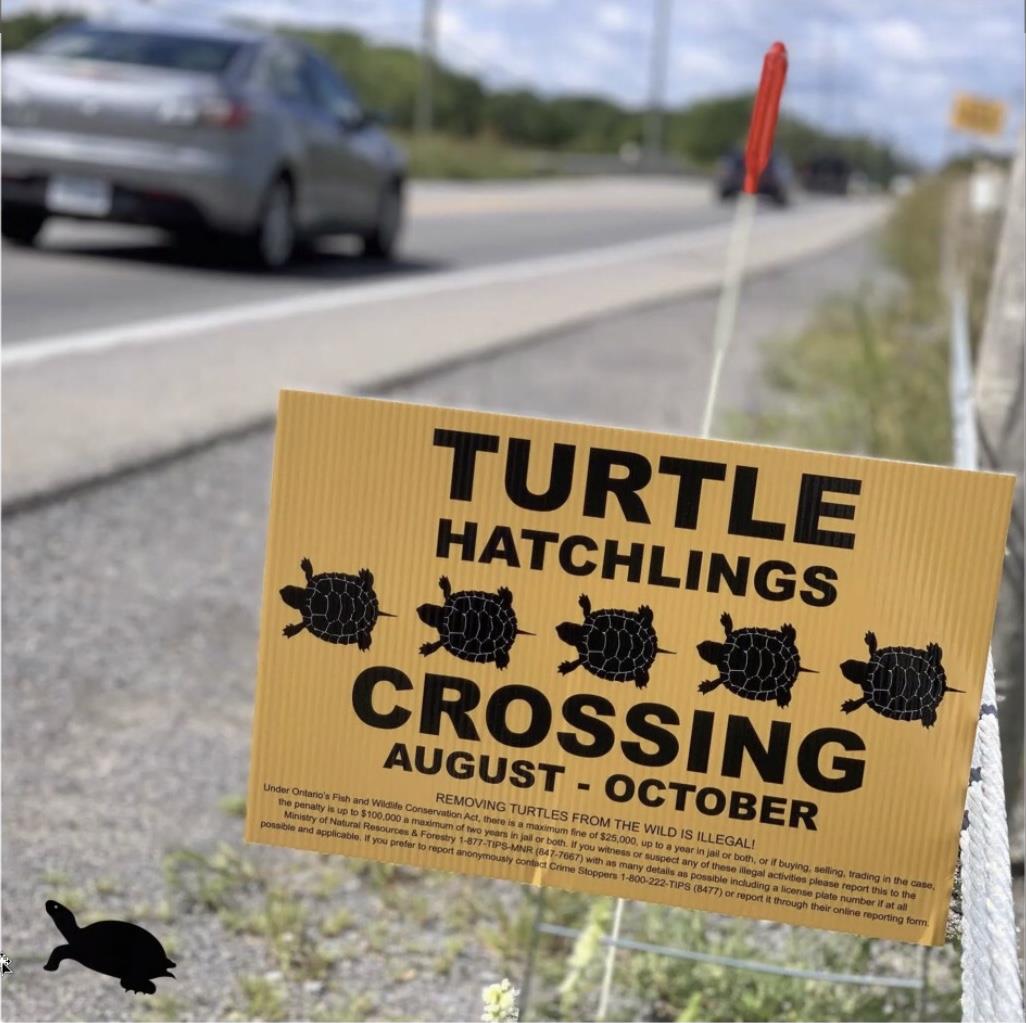 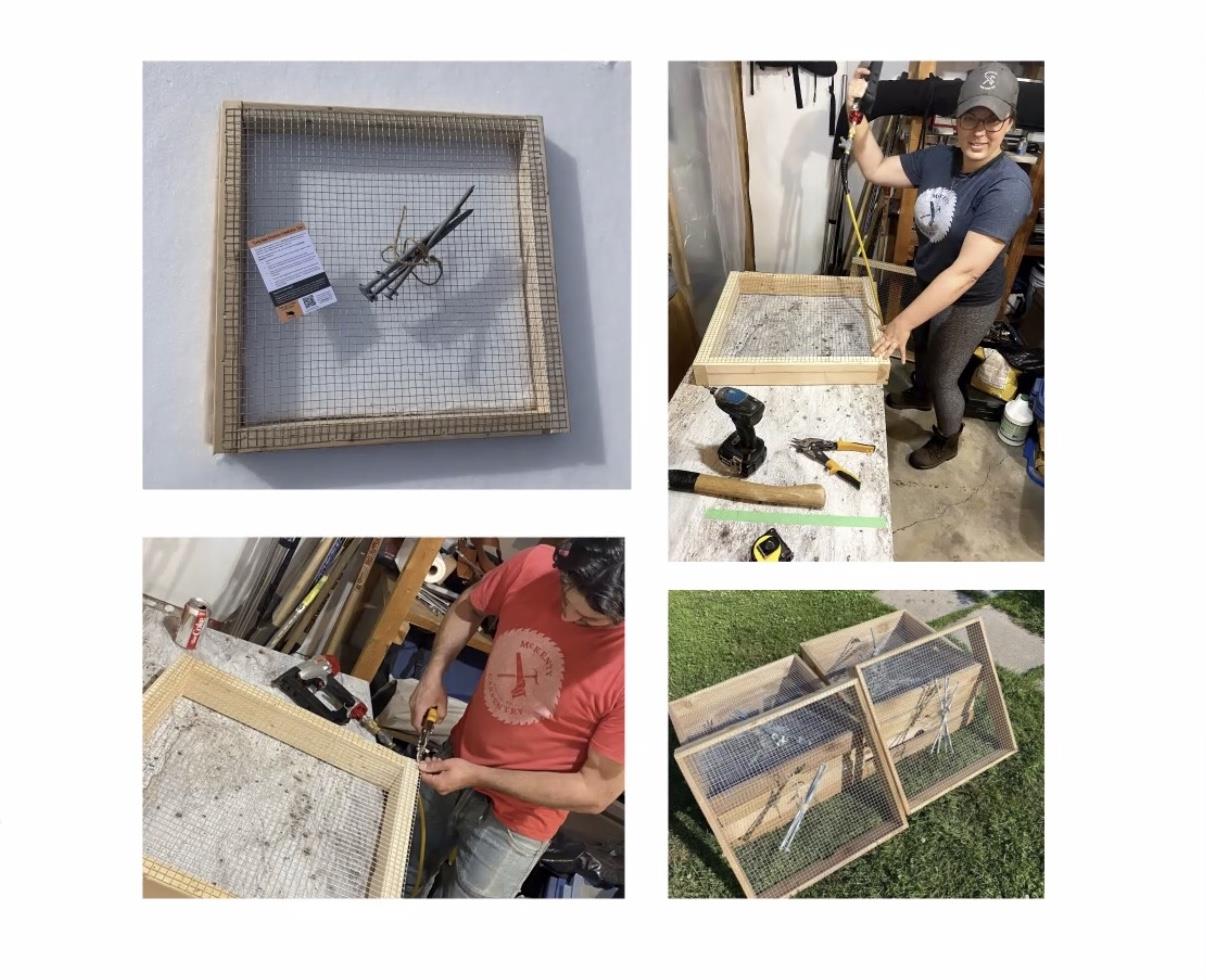 Boxes are currently being constructed, and an army of volunteers are ready to install them for the nesting season in May. In response to questions, Tara told us they are attempting to expand the science side of their operation, trying to do turtle counts, especially in the inner harbour. They are also working with the city to install more turtle protection fencing like is being done now along Collins Creek. Tara noted that turtle fencing helps others species as well. Both of our wonderful speakers were thanked by Joyce Yee. Thanks to the Service Projects Committee for selecting such amazing recipients, including Interval House and The Mess, who spoke two weeks ago.
|
||||||||
Speaker March 22nd - Antje McNeely, Kingston Chief of Police
|
||||||||
Remember Dinah - The Service Dog Puppy?Remember DINAH - The Service Dog Puppy? 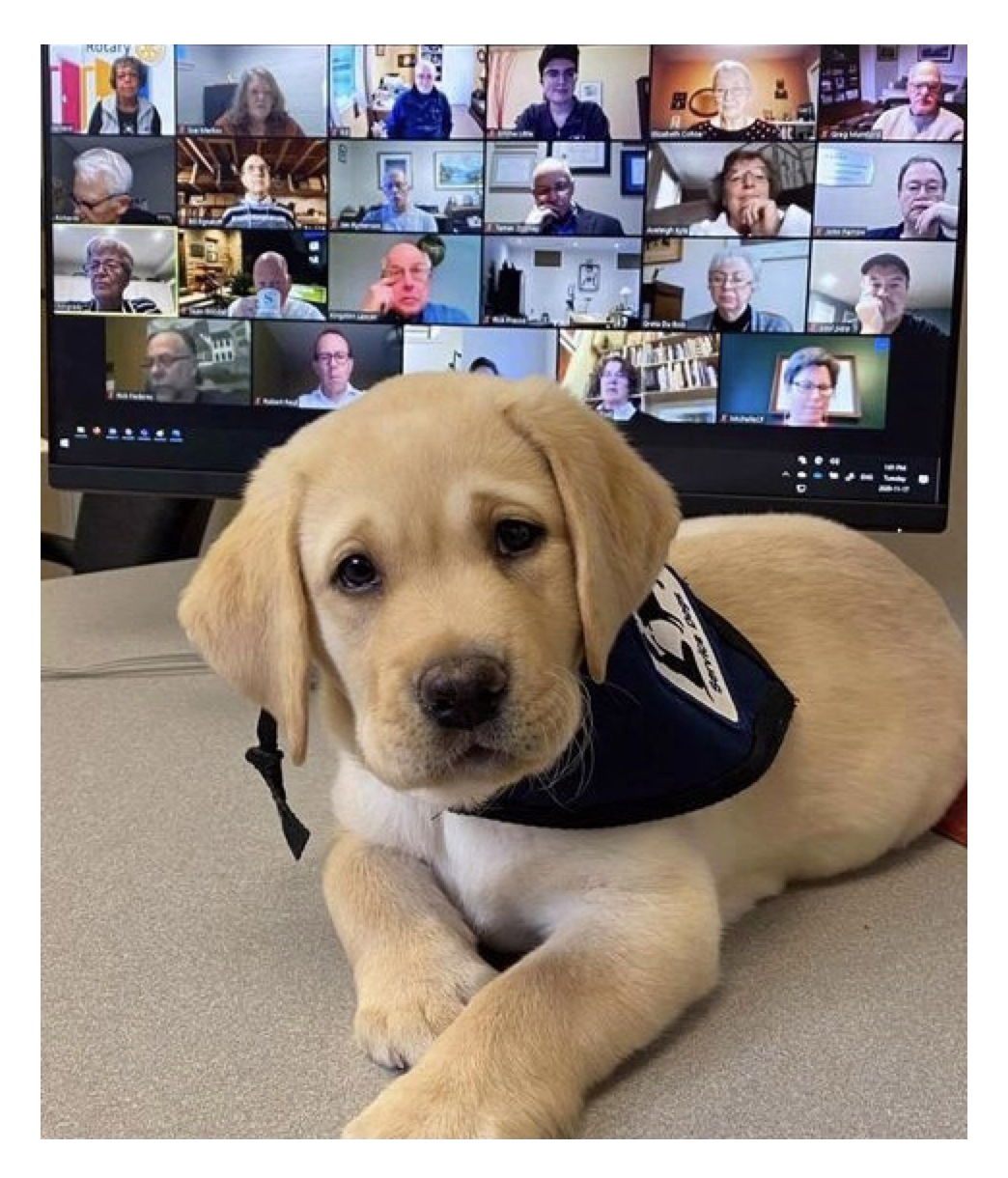 In the Fall of 2020, our Cataraqui-Kingston Rotary Club awarded a Community Service Project Grant to KINGSTON 4 PAWS SERVICE DOGS in order to assist in acquiring and training a service dog to be placed eventually with a person with Autism, PTSD, seizures, other health issues, or mobility challenges. In the Fall of 2020, our Cataraqui-Kingston Rotary Club awarded a Community Service Project Grant to KINGSTON 4 PAWS SERVICE DOGS in order to assist in acquiring and training a service dog to be placed eventually with a person with Autism, PTSD, seizures, other health issues, or mobility challenges.Today, almost 18 months later, we received an update and photos from Dinah’s Foster Family describing how Dinah has grown into a wonderful companion and enriched their lives as she prepares for her placement with a special needs individual. It is a heartwarming story which we thought everyone would love to read. Their letter follows, so please continue… “Kingston 4 Paws Dinah” February 2022 |
||||||||
Smiles and Stuffies - Tipi Moza and More!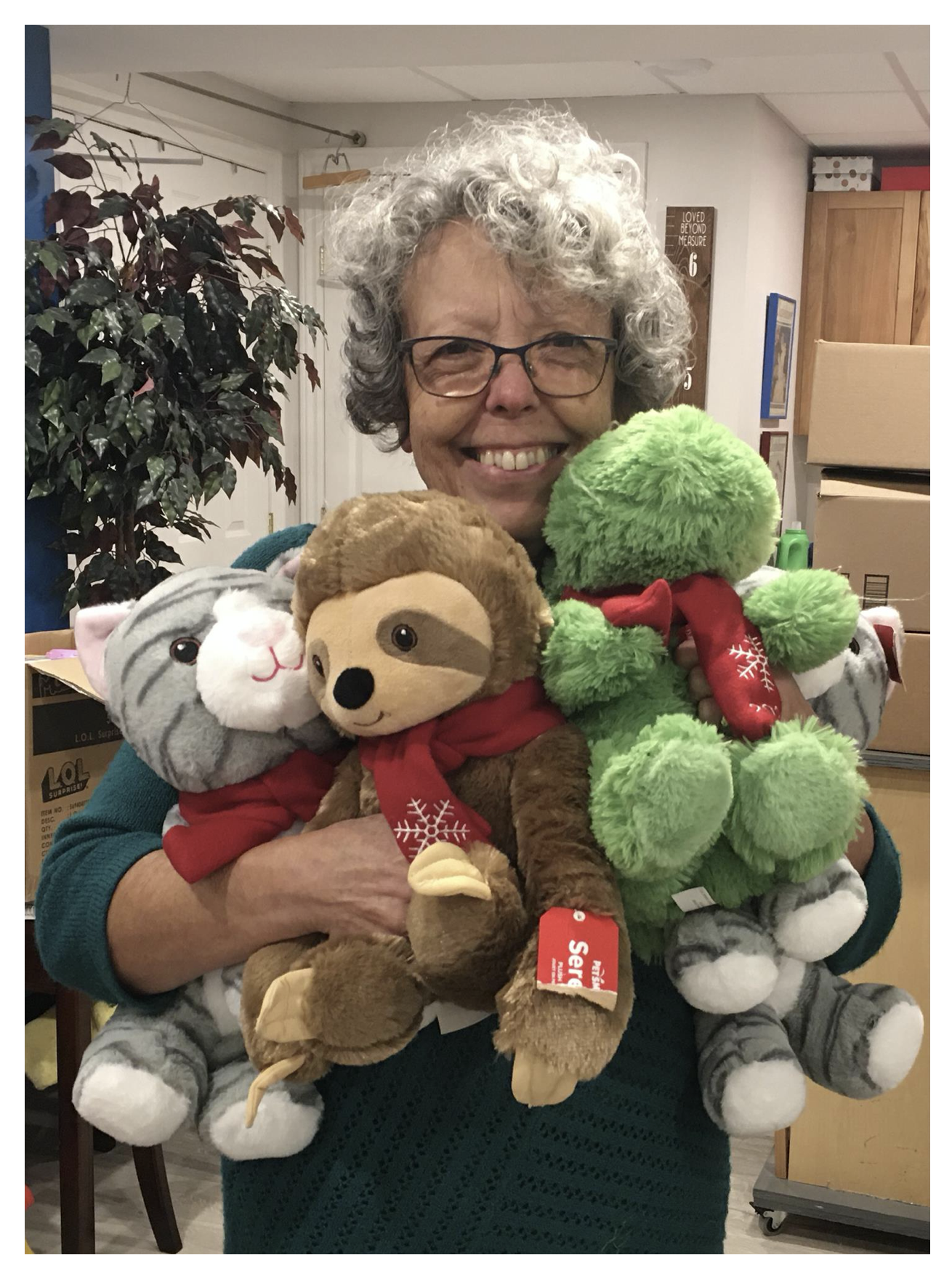 Smiles and Stuffies! Tipi Moza and More! Thank you Pet Smart! Together, we brought Smiles and Stuffies to 650 children in the Kingston area! Our Cataraqui-Kingston Rotary Club loves to be involved in “hands on” community activities! And one of our favourites is assembling Christmas Gift Bags for the children of Tipi Moza, an organization that provides affordable and subsidized housing for Aboriginal, Métis, and Inuit people in Kingston. Since 2019, club members have shopped, wrapped, and packaged an array of gifts, all geared to the age and gender of each child living in a Tipi Moza home. And each year Toys R Us has helped to make our efforts a success with their generous donations of toys, gift cards, and discounts! Thank youToys R Us for your continued support! |
||||||||
Cataraqui-Kingston Rotary Club 2021 Fall Community Service GrantsCataraqui-Kingston Rotary Club 2021 Fall Community Service Grants Congratulations to these grant recipients: Loughborough Public School - $500 for a Perennial Food Forest 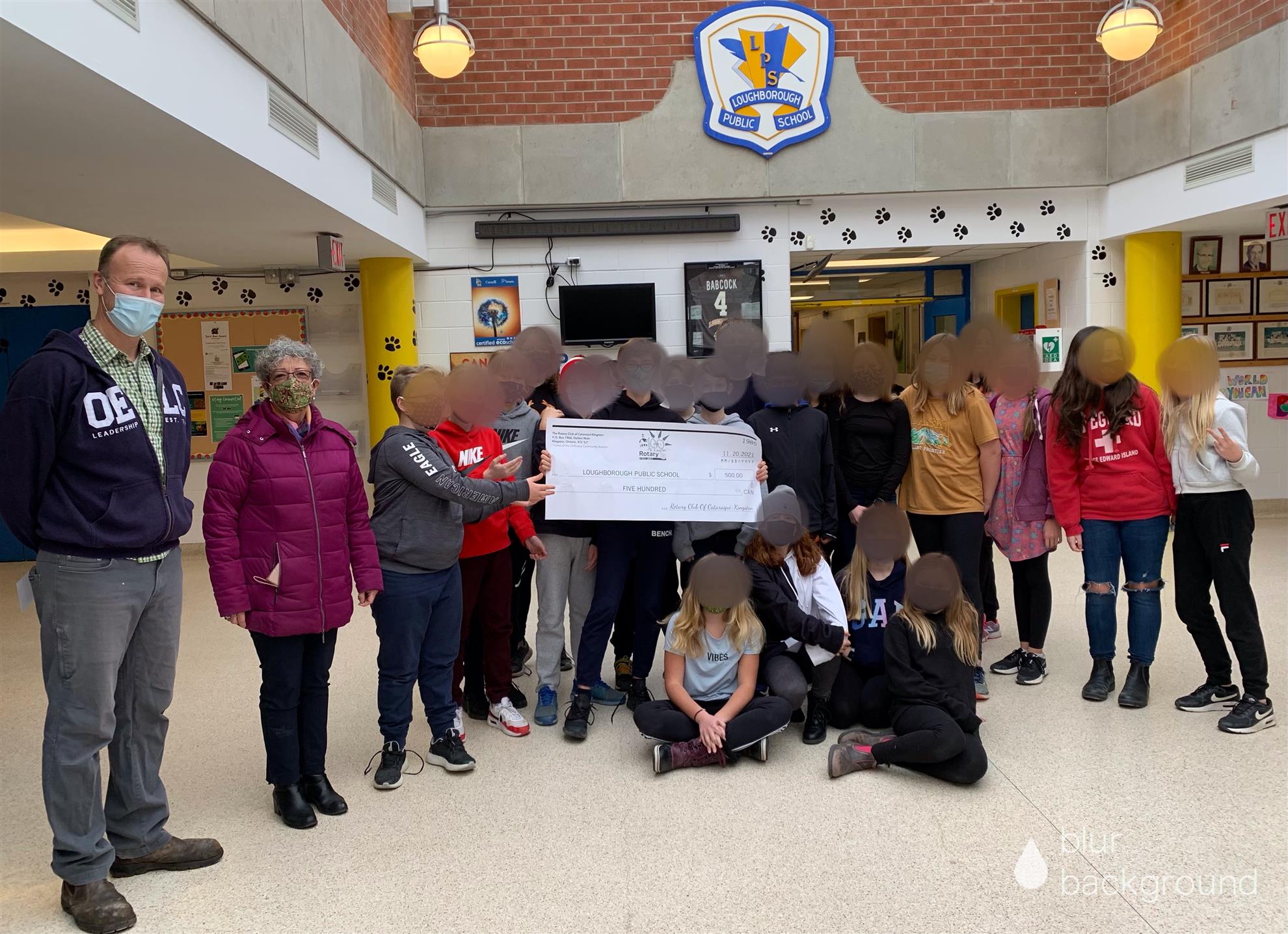 This was our first School-Based Mini-Grant and it was awarded to the Grade 7 Challenge North Class and Grace Foodbank Garden led by Master Gardener and Teacher Alan Macdonald. The goal of this group is to plant twenty-two fruit trees that will help to improve food security in their community by increasing the availability of affordable fresh fruit for those with limited income. The students will learn more about environmentally friendly ways of growing food and producing a local supply of fruit with a carbon neutral or negative footprint. The Mini-Grant will help fund the purchase of the fruit trees. |
||||||||
Speaker November 23, 2021 - Tom Zsolnay - The Rotary FoundationTom Zsolnay, a Rotarian since 2004, a member of our club for a year, and President and CEO of University Hospitals of Kingston Foundation, offered an overview of The Rotary Foundation. In his talk you will find answers to these questions:
|
||||||||
Speaker November 9th, 2021 - John Price - The Memory Project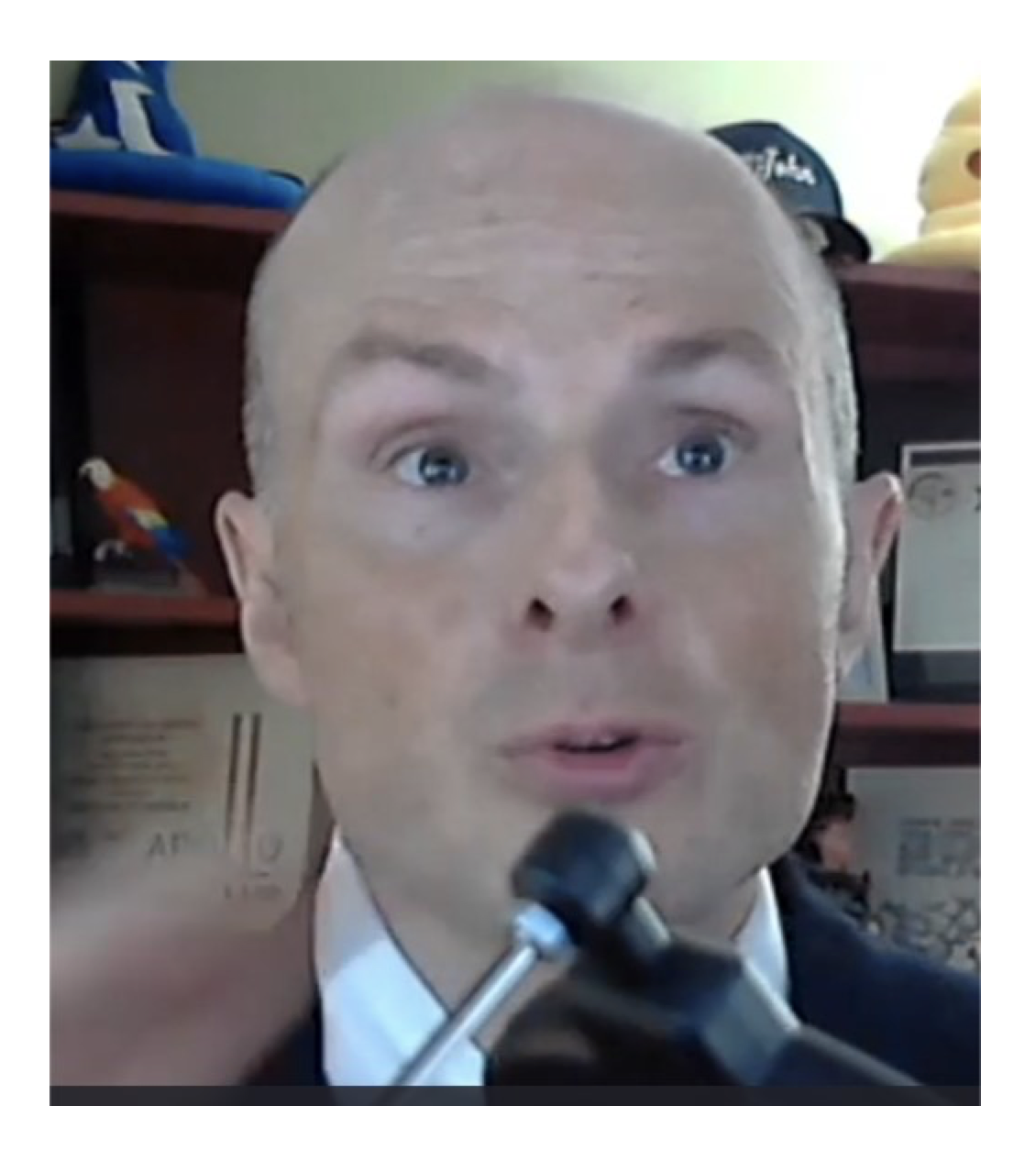 John Farrow introduced today's speaker, John Price. This is not the first time we have had a speaker from The Memory Project. The goal of this ongoing project is a Historica Canada initiative to shares the stories of members of our armed forces at schools and community groups. They have reached over 3 million Canadians since 2001. Major John Price (ret'd) is with us today. He was a public affairs officer and served in Afghanistan, Haiti, Sri Lanka, and with the Navy in the Gulf of Oman. John began with a story of how when starting out at RMC he was told by a senior cadet that Kingston is beautiful but "you don't get to go there". He wishes he could be in the room with us, but alas can not. |
||||||||
BREAST CANCER SCREENING PROJECTBREAST CANCER SCREENING PROJECT  The Cataraqui Kingston Rotary Club is partnering with the Madras Chenna Patna Rotary Club in an exciting Global Grant project intended to detect breast cancer in its early stages using innovative technology (the iBreastExam screening device) developed in India approximately a decade ago. Already this technology has been successfully used approximately 250,000 times in pilot projects around the world. This current project will demonstrate that using this new technology, a widespread, clinically effective program for the noninvasive and painless detection of early stage breast cancer is feasible financially, both for women clients and in terms of the medical infrastructure currently in place in India. The project will be delivered in the state of Tamil Nadu, in southern India. There the incidence of breast cancer is rising drastically at a rate of approximately 4% per annum compounded. The Cataraqui Kingston Rotary Club is partnering with the Madras Chenna Patna Rotary Club in an exciting Global Grant project intended to detect breast cancer in its early stages using innovative technology (the iBreastExam screening device) developed in India approximately a decade ago. Already this technology has been successfully used approximately 250,000 times in pilot projects around the world. This current project will demonstrate that using this new technology, a widespread, clinically effective program for the noninvasive and painless detection of early stage breast cancer is feasible financially, both for women clients and in terms of the medical infrastructure currently in place in India. The project will be delivered in the state of Tamil Nadu, in southern India. There the incidence of breast cancer is rising drastically at a rate of approximately 4% per annum compounded. |
||||||||
Speaker November 2nd, 2021 - Rob Adams YMCA of Eastern OntarioJohn Gale introduced our speaker Rob Adams today. Born in Woodstock, Ontario, Rob is currently the head of the YMCA of Eastern Ontario. Rob was previously with the Natioanl Capital Region YMCA/YWCA. Rob currently lives in Brockville.
|
||||||||
Speaker July 27th, Meet Tom Zsolnay, one of our newest members! President Ana introduced Tom this morning. A rotarian since 2004, in Sudbury and in the Victoria Harbourside Club, and recently transferred to Kingston, and happily chose Cataraqui-Kingston as his new club.
|
||||||||
Lunch by George - 2021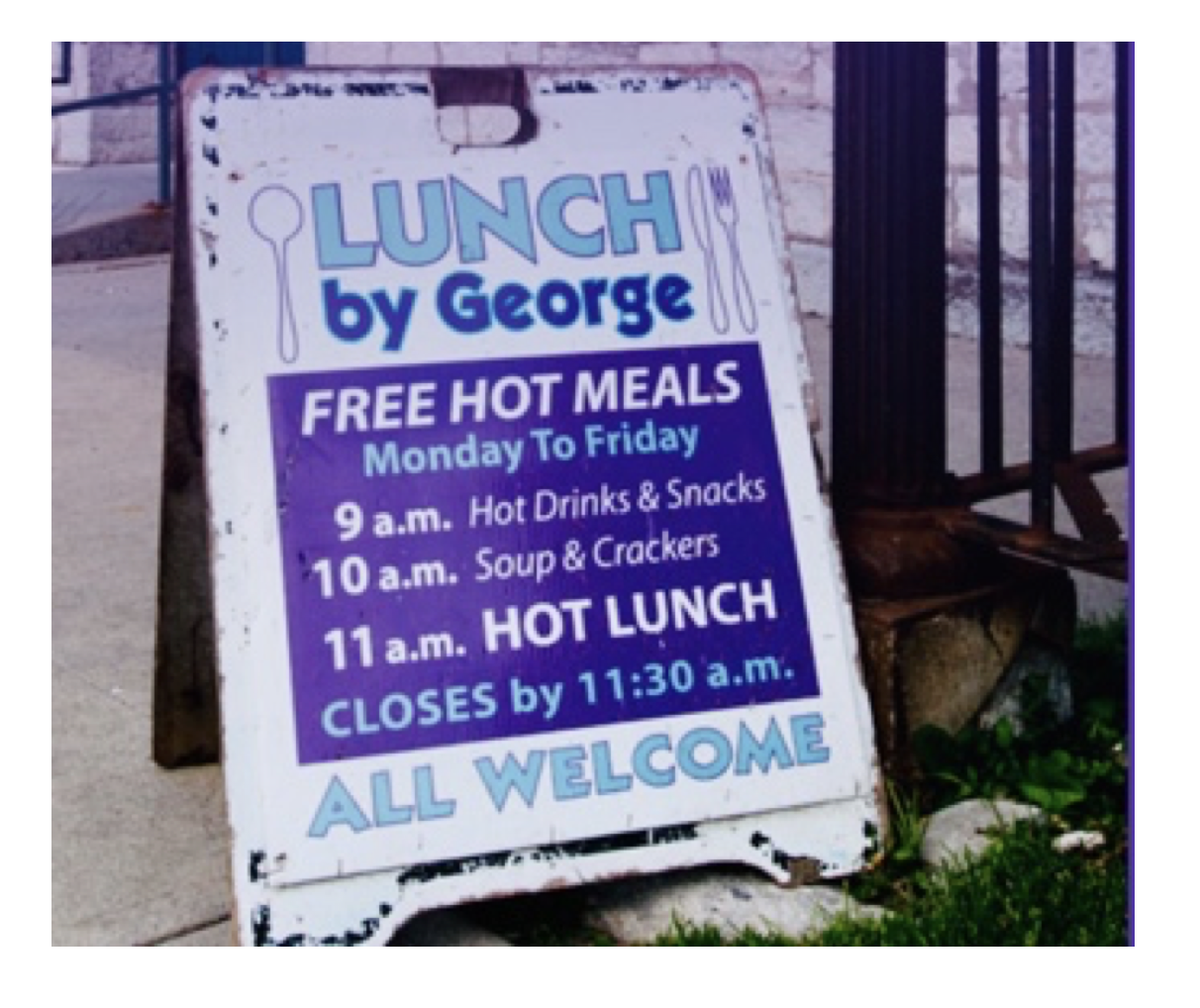
By George! It’s Lunch Time! Your donations and Auction dollars at work!
Of course, the pandemic introduced a number of challenges, most notably the prohibition of in-person dining. But Lunch by George soon adapted to a takeout program which continued to provide a steady supply of nutritious and appetizing meals every week day, without compromising the quality and variety of the lunches served. Just take a look at a sampling of lunches served during the pandemic! See photos in link: Lunch(es) by George! The Cataraqui-Kingston Rotary Club is proud to be an ongoing supporter of Lunch By George. We are but one part of many individuals, businesses, and charitable organizations who make this support possible. Donations are always welcome, as the need is always great. lunchbygeorge.ca/support-lunch-by-george/ And don’t forget, your participation in our annual Community Auction as a Donor, a Bidder, or a Sponsor will also support Lunch by George!
|
||||||||
Speaker June 15th - Pareza Tahamtan and Jolee Fu, RYLA 2021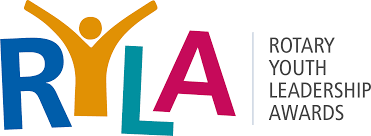 Greg Mumford introduced this morning's speakers. This morning we heard from Pareza and Jolee, two wonderful young students who participated in this year's RYLA (Rotary Youth Leaderships Awards). Once again RYLA was held virtually. Pareza is finishing grade 11, and Jolee is finishing grade 12 and is off to Waterloo University in the Fall. Jolee started by telling us that RYLA has taught her to dream big, to help create a more inclusive society. She was inspired by her peers and the instructors, and her favourite part was the project forum, where ideas were discussed about addressing issues. RYLA created a safe space where dreams could be discussed openly. Pareza is headed to Concurrent Education, and enjoyed the open discussing of ideas and the workshops that helped to build her leadership skills. Youth have ideas for change, but need the skills and advice on starting something to make change happen. RYLA helped provide this. There were also public speaking workshops to build confidence, and speakers who inspired the students to pursue their dreams. |
||||||||
Rushooka - Dominic Tumsuwegyi UpdateRushooka Maternal Health Clinic Update 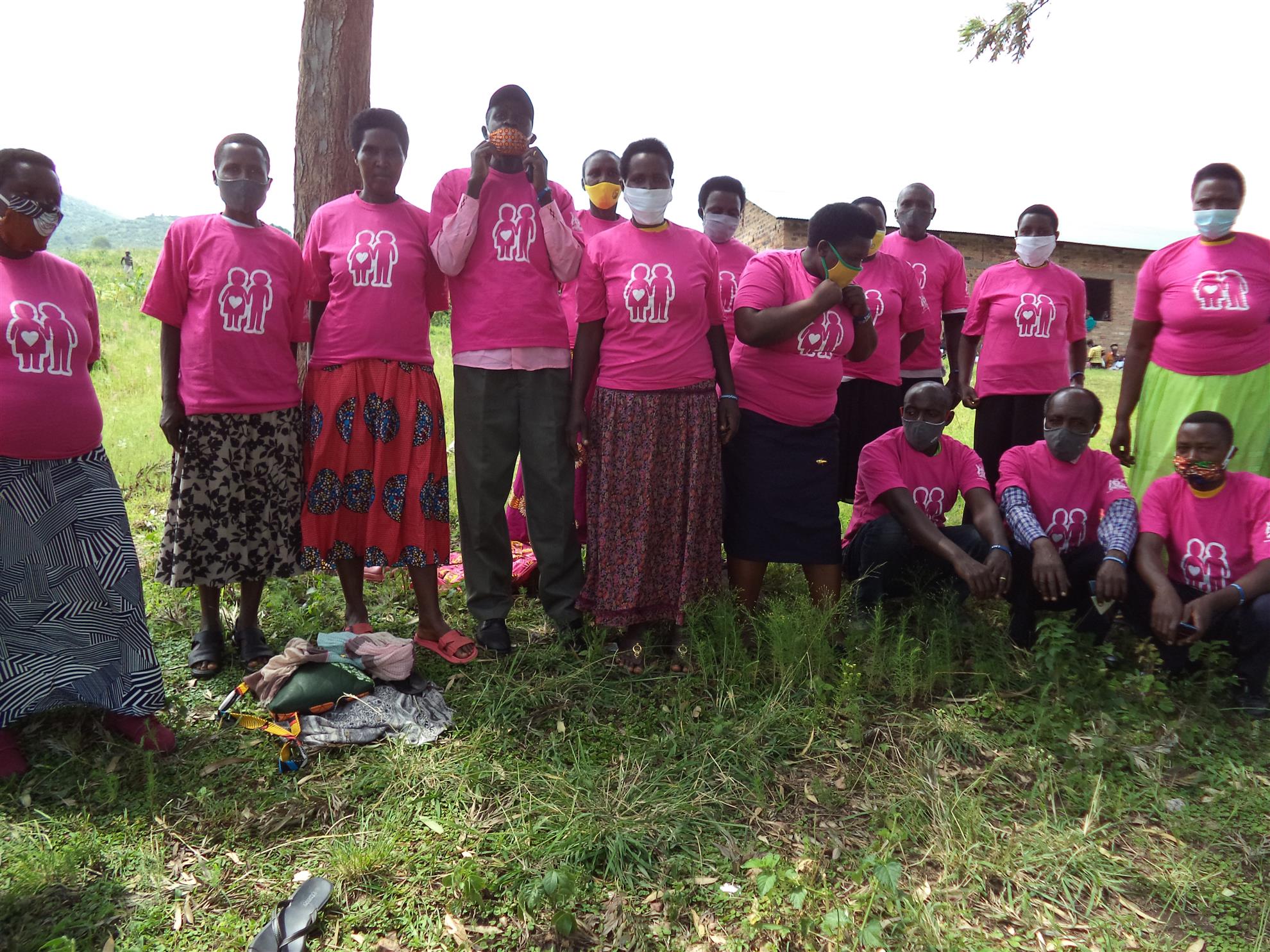 On June 8th, Dominic Tumsuwigye from the Kampala Kolola RC presented at our weekly meeting, the achievements of the health teams at the Rushooka Maternal Health Clinic since the health centre commenced operations in October of 2020. The project has been a fabulous success. Firstly, lives have been saved because mothers with difficult pregnancies were able to access the surgical services at the Centre as opposed to travelling for hours over poor roads to get to the District Hospital. Secondly, the Centre, which previously was classed as a level # 2 health centre, has been elevated to a level # 4 centre and now qualifies for government operational funding to enable it to continue providing sophisticated medical assistance to the people in its catchment area, including surgeries and diagnostic services previously only available at the District Hospital. |
||||||||
Speaker June 1st - Jo-Anne Brady - The Far Program Endowment CampaignBy way of introducing Jo-Anne today, President John spoke about the genesis of the FAR program at Pathways, and how it seeks to continue the good work of Pathways, how it brought together many partners, and how it has been so successful, despite Covid. John talked about the next step - our project is time limited, so there is a need to ensure long term funding. That's what Jo-Anne was here to speak about today. Jo-Anne is a co-chair of the fundraising committee at Pathways Kingston.
|
||||||||
Speakers May 11th - Bill Gray and Greta Du Bois - Rotary Relationships  Today’s meeting was a follow-on of sorts from last week’s meeting, where PDG Martha Weaver talked about diversity, inclusivity, equity, and accessibility. Two veteran Rotarians from our club talked about how we can move forward, building relationships and achieving our diversity and inclusivity goals. Here the full talk on our Youtube Channel: Bill Gray and Greta Du Bois - Rotary Relationships. |
||||||||
Speaker May 4th - PDG Martha Weaver - Diversity, Equity and Inclusivity and Accessibility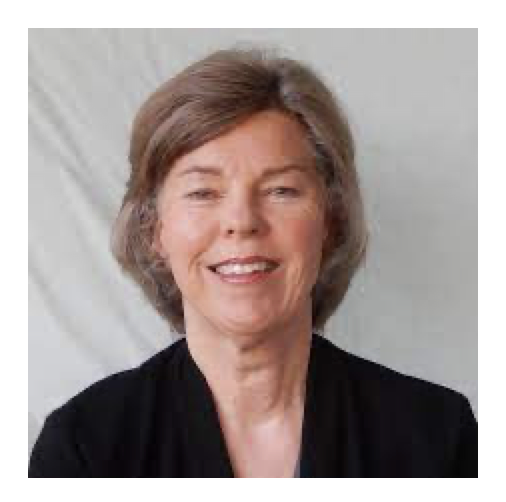 John Farrow introduced our speaker Martha Weaver who was District Governor in 2018-19. She is a member of the Chateaugay Rotary Club in Northern New York where she lives. She is leading the District committee on Diversity, Equity and Inclusivity and Accessibility. |
||||||||
Speaker April 27th - Lesley Anderson, Ancestry Canada - Building Your Family Tree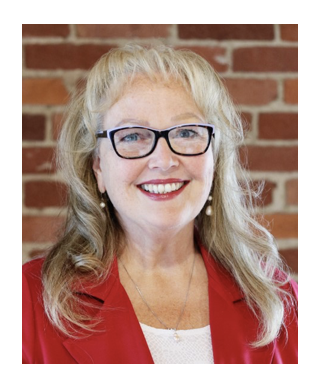 John Farrow introduced Lesley Anderson from Ancestry Canada this morning. Lesley is the Chair of Ancestry's Family History Board for Canada. She gives much of her time doing presentations at genealogical society meetings and conferences, and speaking to groups like us.
|
||||||||
Speaker April 13th - Rebecca Rolfe - Focus Forward For Indigenous Youth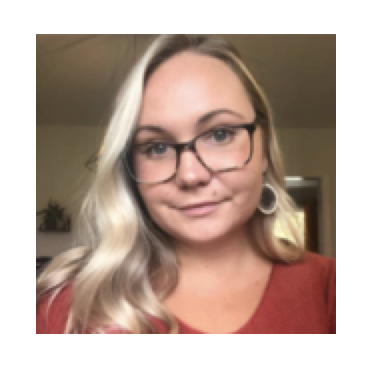 Elizabeth introduced Rebecca Rolfe to the club this morning. Rebecca describes herself as a settler woman who became involved with Focus Forward For Indigenous Youth (FFFIY) soon after it was founded in 2017, starting as a volunteer then transitioning to one of the first two paid staff members. Rebecca holds a B.A. and M.A. from Queen’s
|
||||||||
Speaker April 6th, 2021 - Brenda Moore, The Food Hub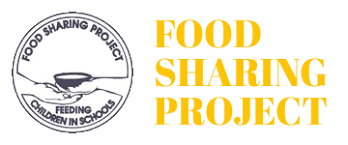 Ana introduced our speaker Brenda Moore, who is the Chair of the Food Sharing Project and also a recent recipient of a Paul Harris Fellow award. After expressing her appreciation for the support of Rotary both financially and in person, Brenda spoke about a new project in town called The Food Hub. |
||||||||
Speaker March 30th - Member Auction LaunchThis morning our Auction Chairs, Greg, John, and John introduced this year's auction to our club members. This is our biggest fundraiser, and requires everyone to take on a role, even a small one. The Chais stressed that the process is a long one, ending in November, so it's best to be ready to start early.
|
||||||||
Speaker March 23rd - Getting to Know Heather Nogrady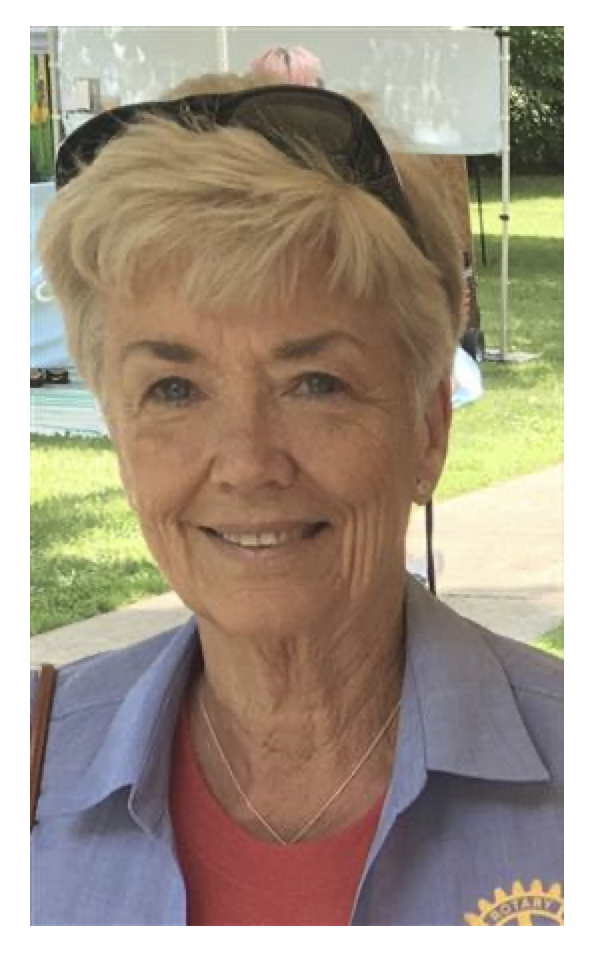 Heather was introduced this morning by Michelle Chatten Fiedorec. Michelle prefaced her introduction of Heather with a history of Rotary Fireside Chats/Classification talks. This “Getting to know You” event was conducted by Michelle and Heather in an interview format. Heather was introduced this morning by Michelle Chatten Fiedorec. Michelle prefaced her introduction of Heather with a history of Rotary Fireside Chats/Classification talks. This “Getting to know You” event was conducted by Michelle and Heather in an interview format. |
||||||||
Speaker March 16th - Pat Armstrong - ESRAG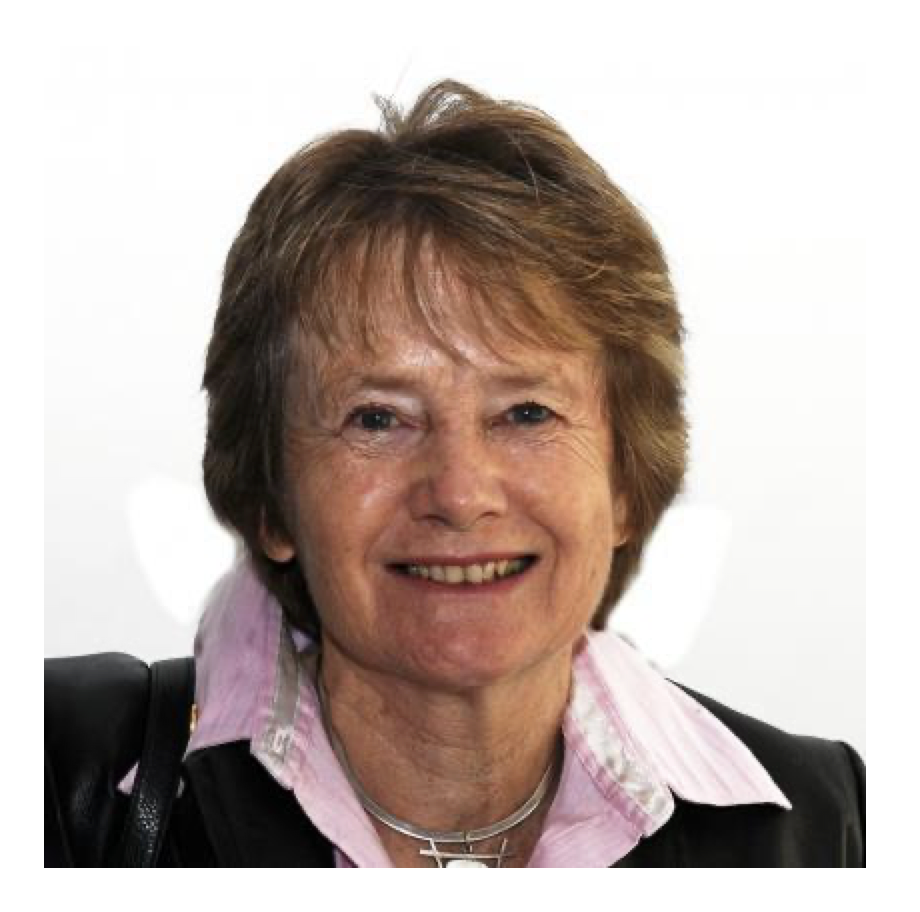 John Farrow introduced our speaker, Pat Armstrong, who has been a Rotarian for 15 years. She is also a member of the Environmental Sustainability Rotary Action Group. (ESRAG). Pat works as an educator for sustainability. She has a BSci (Hons.), DipEd. and is currently completing a doctorate on adolescent leadership for sustainability at RMIT University. Pat has worked in a number of roles (mostly in the areas of waste and resource recovery, climate change and biodiversity), including management, strategic planning, grant writing, training, evaluation and publication. John Farrow introduced our speaker, Pat Armstrong, who has been a Rotarian for 15 years. She is also a member of the Environmental Sustainability Rotary Action Group. (ESRAG). Pat works as an educator for sustainability. She has a BSci (Hons.), DipEd. and is currently completing a doctorate on adolescent leadership for sustainability at RMIT University. Pat has worked in a number of roles (mostly in the areas of waste and resource recovery, climate change and biodiversity), including management, strategic planning, grant writing, training, evaluation and publication.John also briefly covered what a RAG, or Rotary Action Group, is. According to the RI website; "Rotary Action Groups are independent, Rotary-affiliated groups made up of people from around the world who are experts in a particular field, such as economic development, peace, addiction prevention, the environment, or water. Action groups offer their technical expertise and support to help clubs plan and implement projects to increase our impact, one of Rotary's strategic priorities. This support includes helping clubs find partners, funding, and other resources." |
||||||||
Rotarians Facilitate COVID-19 VaccinationCataraqui-Kingston Rotarians Step Up to Facilitate COVID-19 Vaccination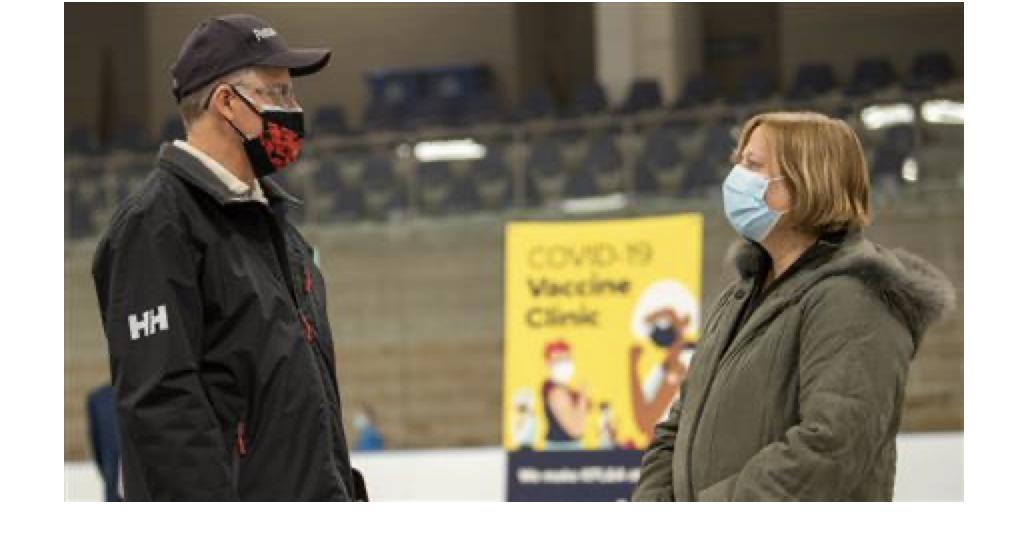 March 10th, C-K Rotary members and friends began screening and ushering Kingstonians attending the Mass Immunization Clinic at the Invista Centre. They're part of a team from all four Kingston Clubs and two Rotaract Clubs covering two volunteer posts for the entire time, seven days a week, that the clinic is open. March 10th, C-K Rotary members and friends began screening and ushering Kingstonians attending the Mass Immunization Clinic at the Invista Centre. They're part of a team from all four Kingston Clubs and two Rotaract Clubs covering two volunteer posts for the entire time, seven days a week, that the clinic is open.Click on photo for photo album of clinic opening |
||||||||
Hope Gardens GreenhouseHope Gardens Greenhouse – Montreal Lake Cree NationFocus Forward for Indigenous Youth is a Kingston based registered charity that collaborates with Indigenous communities from across Canada on self-determined community projects that empower youth, using trades-based educational programming. In their programmes, youth gain hands-on skills, job site training, apprenticeship hours and high school credits, all with professional mentorship. |
||||||||
Rushooka Maternal Health Cliniic
|
||||||||
SIRIBA adopt a Community. UgandaFrom refugee camp to a thriving developing community, the story of Siriba village in Uganda.The Siriba project is a perfect example of a Rotary Economic and Community Development Grant, a working and financial partnership between local and international Rotary clubs with the support of a Global Grant from the Rotary Foundation. Siriba grew into a village out of a refugee camp for displaced widows and orphans. Some 20 years ago they fled the violence of the “Lord’s Resistance Army “in Northern Uganda, led by the infamous warlord Joseph Kony wanting to overthrow the President and create a theocratic state based on the Ten Commandments and local Acholi tradition. (Kony is from the same tribe as Idi Amin). Men and youngsters were abducted, 66,000 children became soldiers, and 2 million people were displaced internally from 1986 to 2009. The women in the refugee camp slowly started to organise themselves making a living by selling charcoal and growing sunflowers and maize on rented land. With time a village emerged. This was the situation when the Rotary Club of Kampala North, D 9211 heard of their plight and decided to help. |
||||||||
Speaker March 9, 2021 - Joint Meeting with RC Morningside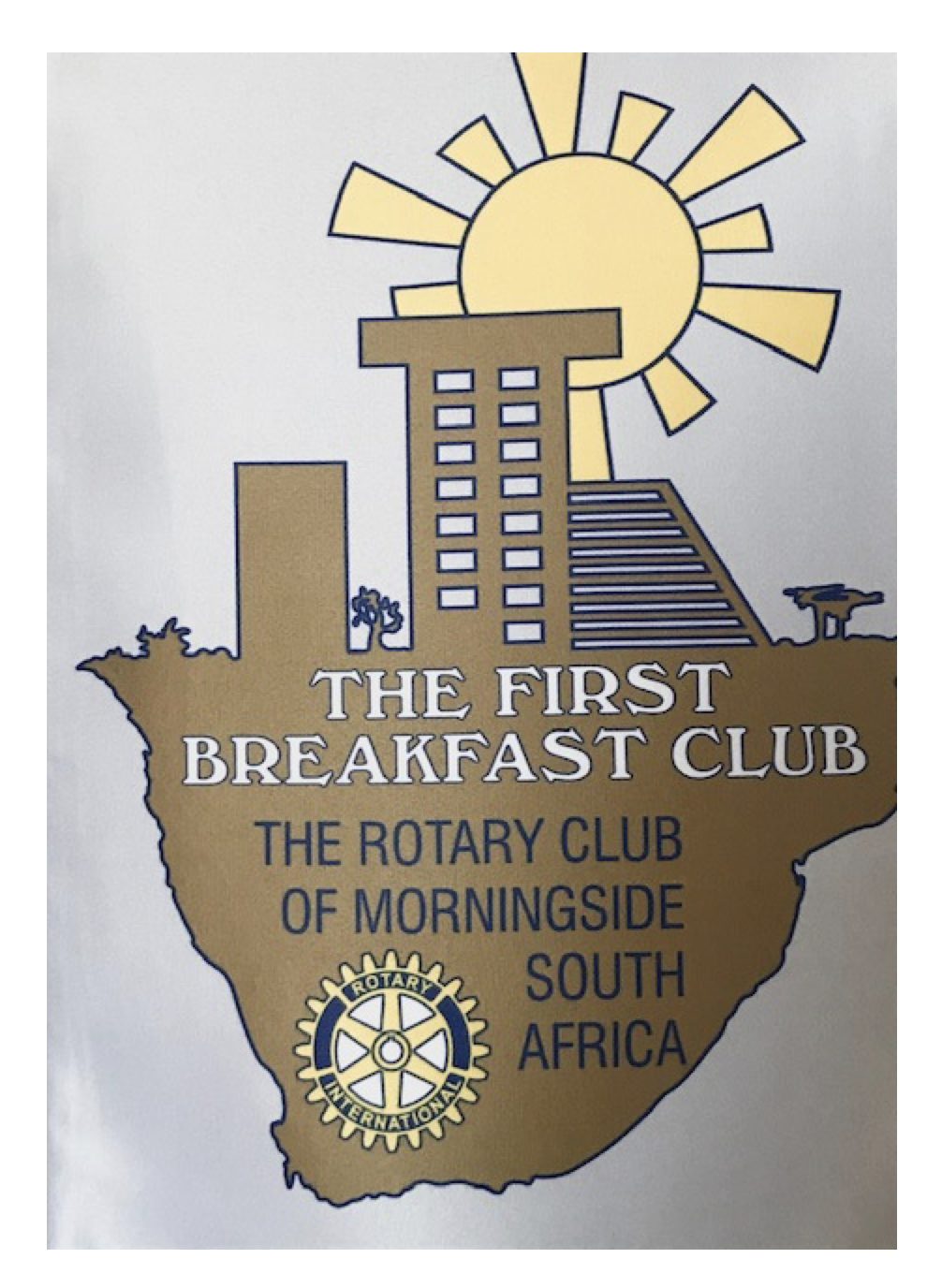 This morning we had a joint meeting between our club and the Morningside Rotary Club of Johannesburg, South Africa. This morning we had a joint meeting between our club and the Morningside Rotary Club of Johannesburg, South Africa.We have a long and fruitful association with Morningside. This morning the South Africans reported on two of their projects, and C-K Rotary reported on one of our projects. Greta reminded us that the relationship of between Morningside and Cataraqui-Kingston goes back at least 10 years. At one of her yearly visits to Cataraqui she pitched a project out that her club in South Africa was undertaking. During the last year we have participated with Morningside in two other projects. Morningside also hosted the Canadians during the friendship exchange, and we had a wonderful visit here with the South Africans.
|
||||||||
Speaker March 2nd - Michelle Deschenes, Registered Dietetic Technician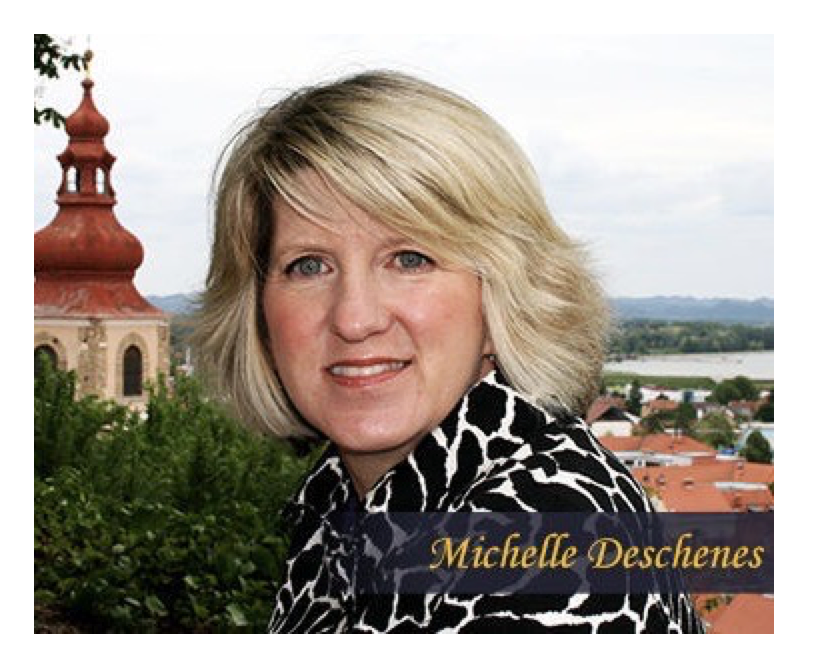 John Farrow introduced Michelle this morning. She has lived all across Canada, worked in hospitals and with the RCMP, now runs her own business “Ace Nutrition”. John Farrow introduced Michelle this morning. She has lived all across Canada, worked in hospitals and with the RCMP, now runs her own business “Ace Nutrition”.
March is Nutrition Month – the slogan is,“What you eat - unique, like you.” We all have our own food preference and unique eating habits Canada is a diverse country with the passing on of food habits from generation to generation |
||||||||
International Rotary Friendship Exchanges
|
||||||||
Speaker February 23rd, 2021 - Mara Shaw, National Farmers Union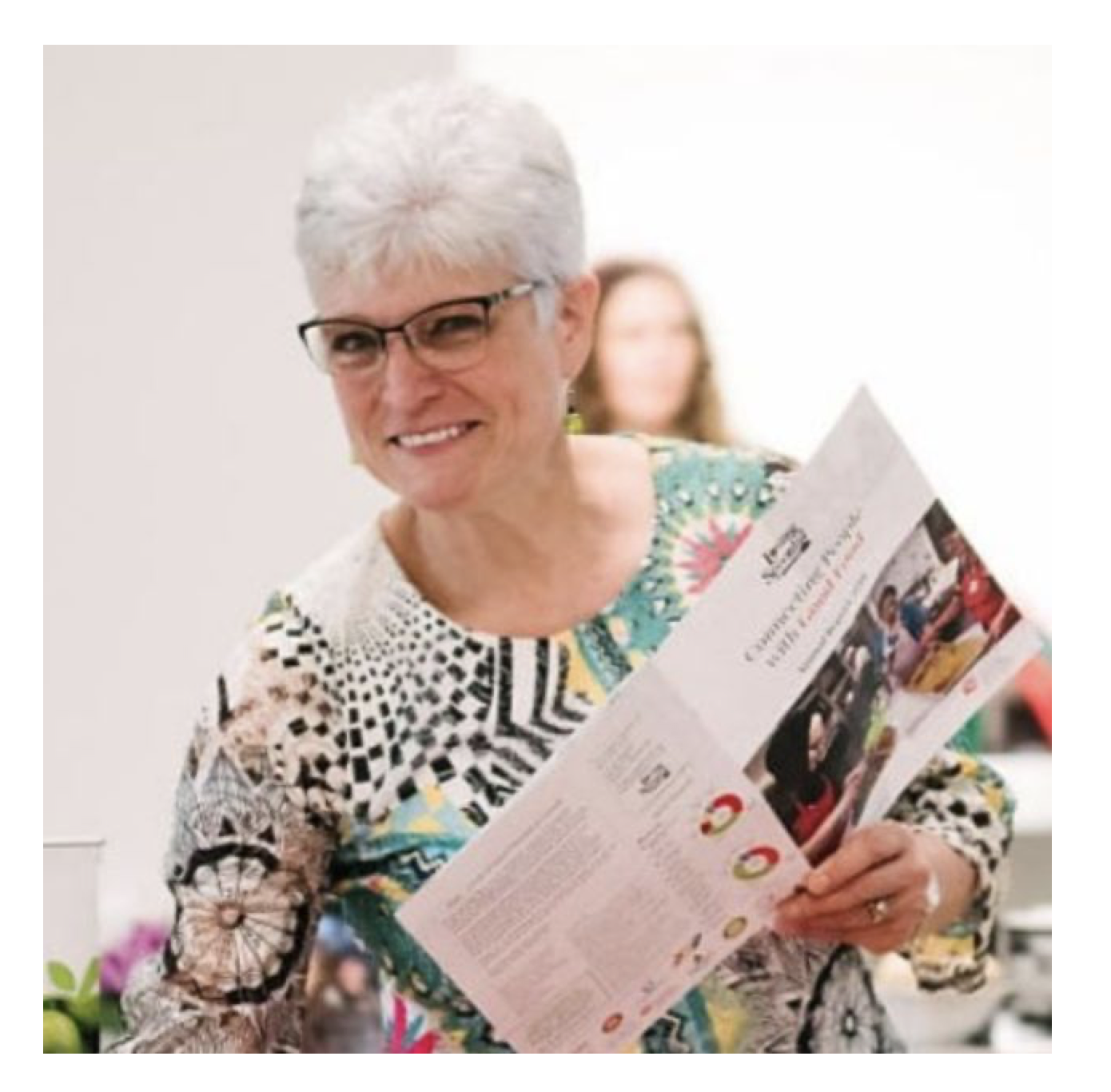 Sutherland introduced our speaker Mara Shaw, who is the Executive Director of the National Farmers Union of Canada. Before her presentation Mara gave us an update on her daughter Karena whom we all know. She is attending Carleton University now, and is Co-President of their Rotaract Club. Sutherland introduced our speaker Mara Shaw, who is the Executive Director of the National Farmers Union of Canada. Before her presentation Mara gave us an update on her daughter Karena whom we all know. She is attending Carleton University now, and is Co-President of their Rotaract Club.Speaker Points:
Speaker thanks was provided by John Farrow. |
||||||||
Keep Pedalling In Pikangikum
|
||||||||
Speaker February 16th - Nikki Beaulieu, Development Manager – Kingston Interval House Nikki thanked our Club for the commercial washer and dryer that will be installed shortly at their Robin's Hope Centre. This will enable them to expand their important clothing program to their clients. |
||||||||
FARther on Pathways to Education
Kingston Youth Going FARther on Pathways to Education! Rotary is assisting vulnerable youth in their transition from high school to post secondary pursuits.
Thanks to a $140,000 Rotary Global Grant initiated by the Rotary Club of Cataraqui-Kingston, high school graduates of the Pathways to Education Program will now have greater access to ongoing support through the new Rotary FAR Project as they move on to post-secondary education and meaningful employment! |
||||||||
Speaker February 2nd - Update on Pathways FAR Project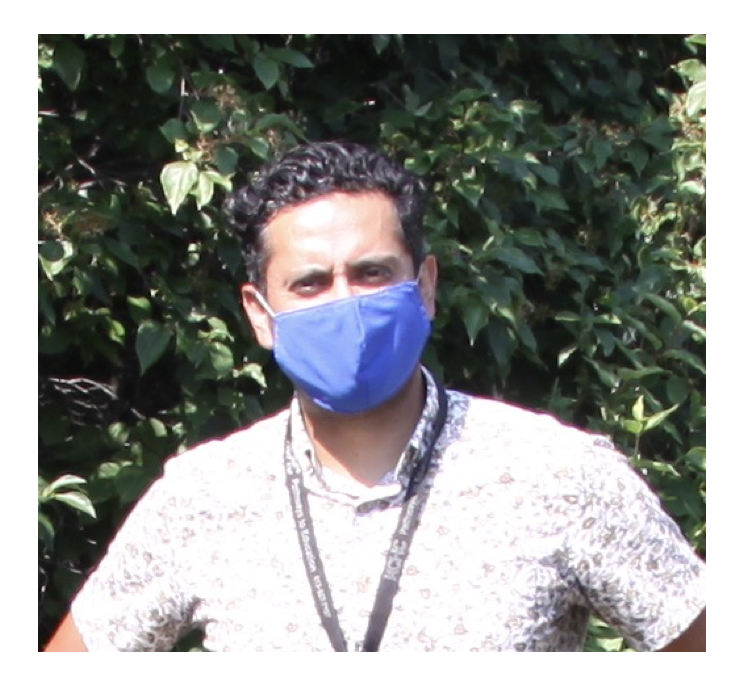 John Richards welcomed our two guests, Roger Romero and Jon Oosterman from Pathways for Education Kingston. Roger moved to Kingston with his family from El Salvador in the early 1980's (he has spoken about his experiences as a new Canadian to our club - Ed.). Roger is Program Coordinator for Pathways and is a Friend of Rotary with our club. A graduate of Brock University in Psychology, Roger oversees the after school programs and partnerships for Pathways Kingston. Jon Oosterman is a graduate of St. Lawrence College in Psychology and has worked at Pathways for over 5 years. Jon is the new Facilitator of Alumni Relations (FAR) - where the program name comes from. What is Pathways? An national organization started in Regent Park in Toronto in a Community Health Centre, dedicated to helping students in disadvantaged neighbourhoods succeed in high school. It was an organization dedicated to being proactive, not reactive in helping kids. Pathways Kingston follows this structure of being associated with a Community Health Centre (KCHC), working to help with the social causes of poor health. |
||||||||
Speaker January 26th - Melissa Larkin, Darkspark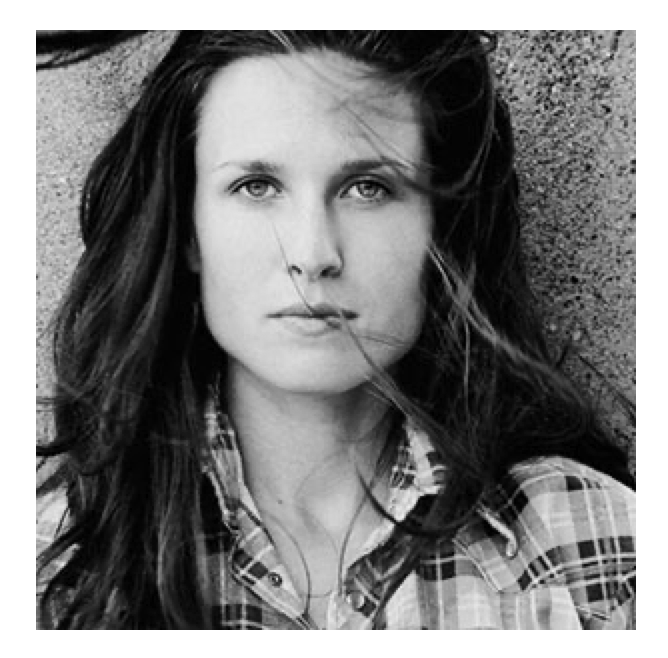 Robert Reid introduced Melissa Larkin, Co-founder and Director of Darkspark, this morning. Melissa is a vocalist and songwriter with an impressive resume. Darkspark received assistance from our National Committee for two projects in 2017 and 2019. Melissa was here this morning to tell us about that project and what's coming up for Darkspark. Melissa began with a thank-you for our donation, which came at a critical point in time and has helped launch them on to new heights. She also gave us some background on Darkspark. They started in 2013 and ran on and off until 2016 when they were incorporated. Melissa and her partner D'ari Lisle, a music producer, were asked to teach a history unit at the Quinte Mohawk School - a cross cultural look at colonialism which challenged grade 7 and 8 students to express themselves through song and digital story telling. The program caught the attention of the Federal Government and they received funding to travel to 16 locations across Canada to replicate the program in 2017 and 2018, and the program became Four Directions. The instruction was intergenerational, with an elder always present. The 5 day program challenged students to create 11 short documentaries and 48 songs which were shared millions of times on social media. Our National Committee contributed to the Tyendinaga stop on the tour. Why song and digital storytelling? Melissa that kids are addicted to pop culture, so why not harness that and turn it toward social change. The students talked about many issues and turned them into songs - a natural fit. |
||||||||
Shawn Seargeant, Lionhearts John Farrow introduced Shawn Seargeant, Director of Operations for Lionhearts, an organization that has been on front lines and front pages for feeding people during COVID-19, including recently established warming hub at Stages, now operating 7 days a week. John Farrow introduced Shawn Seargeant, Director of Operations for Lionhearts, an organization that has been on front lines and front pages for feeding people during COVID-19, including recently established warming hub at Stages, now operating 7 days a week.Sean began with a thank you. Truly the entire City has made it possible for them to do what they’ve been doing. To keep the ball rolling, Lionhearts has recently received some additional grants. The four Rotary clubs in Kingston stepped up to provide some funding when it was most needed. Sean also offered congratulations on 100 years of Rotary. Lionhearts is fairly new in Kingston. Seven years ago, a group of friends met concerning food security. They met with various organizations such as St. Vincent de Paul and Martha’s Table who were doing emergency food programs. The problem then: little fresh produce was available to these organizations. It was overwhelming for any one organization to pick up large surplus food donations from places like Costco (who once donated 800 lbs of strawberries). Lionhearts became able to pick up very large donations and distribute it in manageable quantities to various agencies. They picked up $474,000 worth of products picked up in their first year of operations. Last year, the value was $3.2 million of fresh produce, bread, meat, and dairy. Today, three trucks are on the road almost every day, and 32 agencies rely on their deliveries. Lionhearts helps organizations to be bigger, better versions of themselves, just as Rotary does. |
||||||||
Sean Goodall - My 'Get to Know You" Talk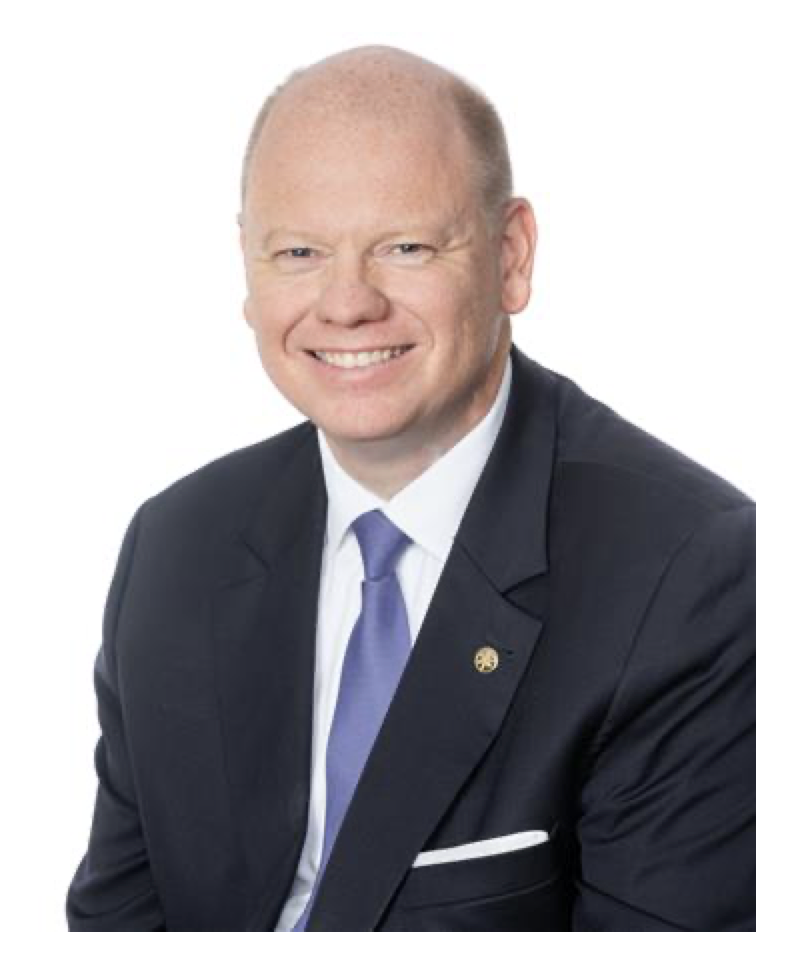 John Farrow introduced our speaker Sean Goodall who gave his classification talk . . . John Farrow introduced our speaker Sean Goodall who gave his classification talk . . .(henceforth to be known as the "Get to Know Me" talk). Sean has come from Windsor recently where he has taken over the management of the Robert J. Reid Funeral Home. John also encouraged new members to pay close attention so when it's their turn they can have something to refer to.Sean gave a wonderful humour-filled rundown of his life up to his move to Kingston with his family. Sean was born in Scarborough and grew up in Pickering. He married his wife Sarah in 1996. They lived in Stouffville for a year and a half before relocating to Windsor. Shortly after that their first child child Kassandra was born, followed by three more children. Kassandra graduated recently from the University of Ottawa with a Bachelor of Science in Nursing. She is married and works for Ottawa Public Health inspecting long term care facilities with regard to the pandemic. Their son Kaleb has graduated from the St. Lawrence College Fire Service Programme. Being unable to find employment with a fire service, he has begun an electrical apprenticeship. Kendra is attending Houghton College in New York State, working remotely at this time on a double major in education and psychology. She may be looking at a third major in social studies. His youngest daughter Kelsey is in grade 11 at LaSalle High School and has a part time job at Tim Horton’s on the base. Even their new grand puppy has a K name. She was born in the home of bakery owners in Kemptville, so is called Kaiser. Since their move to Kingston, Sarah has become employed as a unit clerk at Kingston General Hospital. For fun, Sean and Sarah enjoy camping. Sean is a certified referee for both hockey and soccer. Mostly, he referees youth games but on occasion, adult games.
|
||||||||
Gabriela Calizaya - My Life Since Rotary Exchange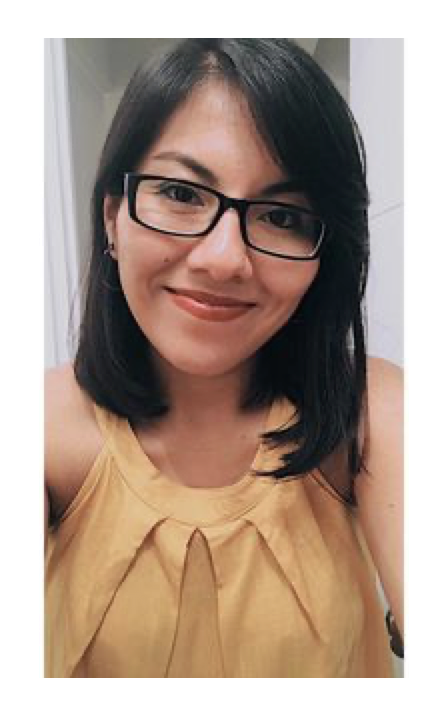 Rick Fiedorec introduced our speaker Gabriela (Gaby) Calizaya who needed little introduction because we all had such a great chat prior to the bell. For those who are newer to the club and don't know Gaby, she was our inbound Rotary Exchange Student in 2011-2012, almost 10 years ago! Gaby spoke about her life since her Rotary Youth Exchange experience with our club, which took place during 2011 – 2012. Returning to Peru when that ended, she applied to University in August. As students usually begin university in March, they asked her why she had waited. When she explained that she had been taking part in the Rotary Youth Exchange, they were very interested in that, and saw it as an asset. She was speaking English very well due to her experience here. In 2015, she had an opportunity to do a university exchange and went to attend school in Spain, in Ávila, about an hour from Madrid. It is a very small town with an ancient city wall, with the new city beyond it. While there, she took the opportunity to see a lot of other places. During March there was a two-week break, and she visited places like Rome and Santiago Compostela, walking part of the Camino de Santiago. They started in Ávila, and walked 15 to 20 km. every day for five days. Spain has a lot of holidays, and with Ávila being such a small place, she took the opportunity to visit many other places. She visited Salamanca, and Valencia which is close to Barcelona. She also enjoyed the seaside. Other interesting trips were to Marrakech, Morocco, and Madrid and the small towns near there. When she finished her time at university in Ávila, she still had six months on her visa, so she traveled around Europe. She visited many places, including a second trip to Madrid and Rome, and then Napoli, the Isle of Capri, and Florence in Italy, and Santorini and Athens in Greece. She ventured as far as Prague, Amsterdam, Barcelona, and Paris. Returning home, she still had two more years of university. In Peru, before you can receive a degree, you must complete an internship, and she did that at an oil and gas company in Lima, working in their finance department for a year. After that she wrote her thesis, a marketing plan, and completed more classes before her final degree. |
||||||||
Speaker December 8th - Chris Cochrane, aka Mr. Zoom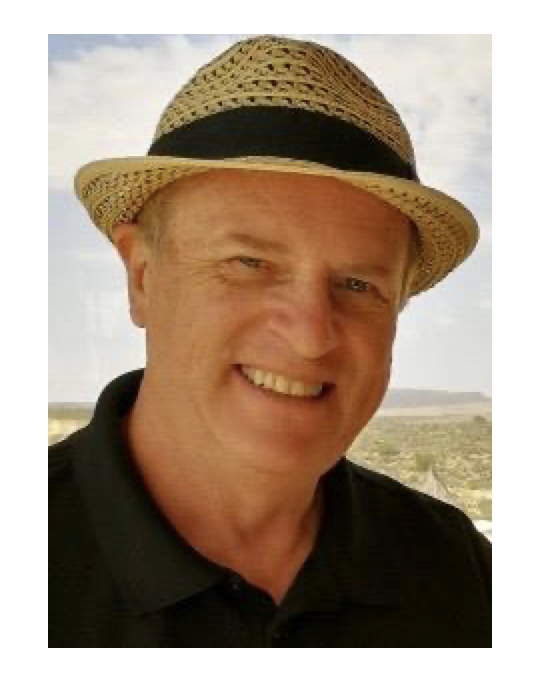 Ana Sutherland introduced today’s speaker, Chris Cochrane. He’s past President of The Passport Club and serves currently as Chair of Public Image for his club and for our District. He’s been given the moniker “ Mr. Zoom“ for his extensive use and teachings on the platform and he was in the very first group of Rotarians to adopt the Zoom platform for club use back in 2015. In 2012, he helped to start and grow the eClub of SouthWest USA based in Arizona. In 2015, he was one of the founders of the eClub of Silicon Valley based in California. Today these clubs are recognized by Rotary International as standards for eClubs. Hopefully today he'll give us some ways we can leverage being online to make our club better. Chris began by thanking our club for the invitation, remarking he loves the way we do things in our club. Chris tries to follow the “5 Way Test” – the fifth question is, “is it fun”. Chris loves to talk about the idea of Zoom and hybrid meetings, because they have so many advantages. They will become the new norm for Clubs that want to have increased impact. Some of the advantages are;
|
||||||||
Speaker December 1st - Holger Knaack, President of Rotary International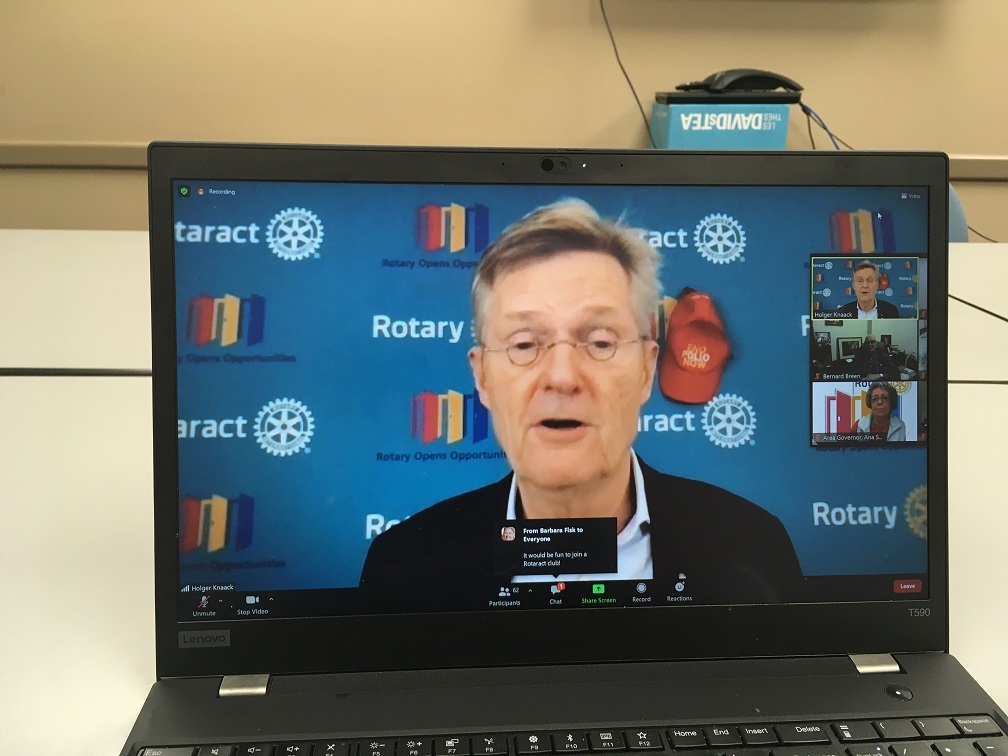 Introduction for RI President Holger Knaack by Past District Governor Bill Gray Welcome Holger. You are the first (sitting) President of Rotary International to attend the weekly meeting of Rotary Club of Cataraqui-Kingston in our thirty-six-year history. So welcome. We are honoured to have you with us. Your theme Rotary Opens Opportunities reflects my experience in Rotary – and I am quite certain for many of us in this Zoom meeting today. Rotary Opens Opportunities for Youth. You have said that after Polio, Rotary is best known for its Youth Programmes. You did not expect to be President of Rotary International. Rotary opened an opportunity for you to serve in that way. You said yes when you received a phone call in May 2019, serving the shortest President Nominee period ever, just one month. At the International Assembly in January 2019, you said “Crisis becomes an opportunity.” No one knew then the crisis the world would be facing in just one year’s time. We are in good hands. Fellow Rotarians, please welcome President Holger Knaack. Highlights of Holger’s presentation: Rotary opens opportunities for others as well as for ourselves. This happens through the many service projects that we undertake. It also provides an opportunity for personal growth. Members can become better leaders, and better speakers. It can broaden one’s perspective, and it can raise our level of tolerance for others. Holger and his wife, Susanne, had no children of their own, but they hosted many different Youth Exchange students over the years. No one expected the Covid 19 pandemic, or the changes it would create. We need to keep all of the things we are learning from it. For example, Zoom meetings allow us to have interesting speakers from anywhere in the world. We shouldn’t always be doing the same things, and the pandemic has made us more flexible. Many people are saving money because they cannot travel, but at the same time we can’t wait to be able to shake hands and hug each other. Holger believes that each club should have a strategic meeting once a year, to look at where they would like to be in five years. He is concerned about the increasing average age of Rotarians. In his club it is 64. In the whole of the UK it is 75! This is a good reason to focus on youth as potential members. Rotary is a place where lifelong friendships can form. This is a good time for the theme, “Diversity, Equity, and Inclusion”. The Black Lives Matter movement in the USA has brought this to the forefront, but diversity looks different in every country. Discrimination is everywhere, and as Rotarians we need to stand up to it and fight it. Discrimination can appear in the smallest of ways. Rotary International has now formed a task force to address this. Questions and Answers: Q: You have been involved in the Rotary Youth Exchange. What can we do to better integrate these kids? How can we encourage people to be host families? A: Look for non-Rotarian hosts. A great source can be the parents whose kids participated in the programme. We need to stay in touch with our Youth Exchange participants. It’s all about engagement. Q: How is the Rotary Foundation doing? A: In the past few years, contributions have not dropped very much, but the Annual Fund has because applications have doubled. Q: Does RI think of assisting with distributing the Covid 19 vaccines? A: Definitely yes because we are organized for this already through polio vaccinations. The structure is already there and it would be perfect for Africa, Asia, and India. The companies making the vaccines can only bring them to airports. Rotary should have a public image campaign in conjunction with this. Q: What is RI doing to get youthful members? A: RI can only encourage Rotary Clubs in this direction. Currently Rotary’s membership image is that of a revolving door. We need to work at keeping our members. Q: What is RI doing about dues for Rotaract members? A: In 2022 this will be very small…something like $5 to $8. Rotary Clubs could help them. At this time there is no cost. Find ways to get them to join your club. One district in India has 25,000 Rotaract members. Q: Strategic meetings are important, and thanks to Covid we have been given opportunities to meet by Zoom. A: Rotary is a grass roots organization, and that’s where strategic planning must take place. Q: What approach should clubs take to balance support of RI initiatives versus the needs of local communities? A: Needs vary from one community to another, resulting in a balance that may be different from one community to another. Q: How do you (Holger) deal with Zoom fatigue? A: Normally a RI President travels a lot. Because of the pandemic, there is no travel, but I am loving the ability to meet on screen with people, and it has provided an opportunity to reach out to so many. I see many opportunities in Zoom. John Gale thanked Holger with a virtual loaf of bread after explaining what we would normally do in an in-person meeting. Holger’s last remark was, “Don’t forget to have fun!” |
||||||||
Speaker November 24th - Haresh Ramchandani. , The Rotary FoundationThe introduction, talk, and discussion are on Youtube: CKR 24 Nov 2020 Haresh Ramchandani PDG 7020 RI Foundation Higher Further Faster More Sean Goodall introduced Haresh. November is Rotary Foundation month. Sean reached out to a former director of Rotary Foundation who recommended Haresh Ramchandani. “We make a living by what we get. We make a life by what we live.” Haresh was born in India and moved to Kingston, Jamaica. HE has two children and is a real estate developer by profession. Life member of Rotary and PDG of 7020 Caribbean Islands. He currently chairs Rotary International Past District Governors committee. He has many hobbies and loves sports. Talk Summary (see video for full details) Marvel has recently introduced a female lead and embraced diversity in its Higher, Further, Faster theme. Rotary has been focusing on that in recent times. What was causing this massive excitement in the Marvel superhero world? An ideal of self-empowerment. We don’t need to wait on anyone. Higher, Further, Faster, More, a message to girls and to the whole world. We are the ones we have been waiting for. Ramesh walked us through what our Rotary Foundation does, drawing on his love of comic superheroes. |
||||||||
Speakers November 17th - Community Grants PresentationService Projects Director Bill Egnatoff introduced today's meeting. This is one of the Club Members' favourite meetings - when we award deserving community groups grant funding. This time around each group awarded has a Rotarian to act as liaison to help enhance our relationships. Heather Nogrady is liaison to Lunch by George (LBG) and remarked that it is a pleasure to introduce an organization that not only addresses a great need, but fits in with the values of our club and Rotary as a whole. Heather introduced Aveleigh Kyle. Aveleigh is Co-chair of Lunch by George, and Outreach by George. She told us that since the Covid crisis began they have seen their number of people serviced double. The usual method of delivery had to be abandoned in favour of take out only. Aveleigh also worries about what will happen when the cold weather comes and there is no warm place to share a meal. LBG also incurred increased costs of delivery - most of their volunteers are older folks who are vulnerable to Covid, so two staff had to be hired to get the work done. Of course PPE has had to be purchased to make things safe for everyone. In addition to serving more people, Aveleigh told us the number of young people being served has increased. As well as distributing food, sleeping bags, warm clothing and tarps are being distributed to people who are sleeping outside for a variety of reasons. Aveleigh played a short video (in verse no less) that was used as a contest entry - this video showed what LBG does every day. Elizabeth Cohoe is liaison for Kingston 4 Paws Service dogs (K4P). Our relationship began in 2016, when they received their first grant. This grant today is their third grant of $4,000 which goes toward training and raising a puppy, part of the $20,000 that is needed to fully train a service dog. K4P has also helped us by being present at many of our events, like the Nut Drive. Being there also helps the puppies' training. They have also helped promote the auction on CKWS TV. K4P's mission is to train and provide service dogs for people with PTSD and other mental health issues, or Autism. To find out more, go to www.kingstonservicedogs.ca Elizabeth welcomed Sue Markos and Dinah. Sue and her husband relocated to Kingston about 3 years ago. She and her husband have fostered 3 dogs, included Dinah, the dog we are sponsoring. 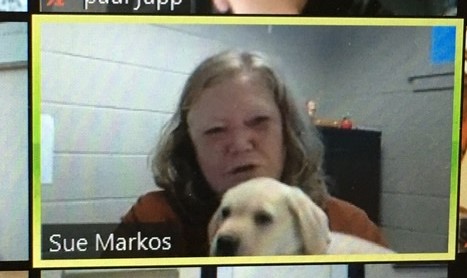 Sue thanked the club for our support. Dinah is 9 weeks old. Funds assist with Dinah's feeding, vet care, and training for 18 to 20 months. At about 16 months of age K4P will decide what the dog will do and who she will go to. K4P also provides seizure response dogs, but that training is longer because of the nature of the work. Because of Covid, their fundraising has been affected, plus the usual classroom training is not possible, so they've had to find new ways to train because the crowded public spaces that the dog is exposed to are simply not there. K4P also provides support to dogs and owners for the complete cycle of placement. They have 63 dogs in the program now (Dinah is #64). Trainers reach out on a regular basis to see if training needs to be refreshed. Hopefully we can meet Sue and Dinah in person at a meeting in the future. Greta DuBois is liaison for Kingston Interval House (KIH). Greta was struck by the simplicity of their request but also the scope of their actions. KIH requested funds for an industrial washer and dryer to sanitize clothing donations that they receive for clients and their children. KIH's work falls right in line with Rotary's values, but what they do most is empower people. There is no greater gift to a person than empowerment - it pays dividends throughout their lives. Leigh Martens has been working for KIH for 15 years, starting as a frontline crisis counsellor. Leigh is passionate about what she does, and is always looking for ways to improve KIH. KIH has been around since 1975, providing services that have changed a lot over the years. They provide emergency shelter at their facility, outreach programs to help their clients receive counselling, their second stage facility which provides geared to income housing for a year, and much more. Because of Covid, education has gone on line, and their recently re-launched volunteer program had to adapt. Volunteers sort donations in a safe facility, but clothing donations need to be sanitized. Our funds will make it possible to make it easy and safe for clients to get clothes without having to go out. Another benefit is that a laundry pair will be re-purposed to the second stage facility so that there will be laundry on each floor, making it safer for the residents because they will not have to be in close contact with as many people. KIH supports hundreds of women, and this has not stopped because of Covid - the staff took about a minute to digest the changes required, then got right back to work. Our donation will make that work just a little bit easier. Questions; Elizabeth - Sue, what's it like having to give up your fostered dog? Sue - I've fostered two dogs, Walter and Humphrey for 8 or 9 weeks until about 18 months. It's difficult raising a puppy then having them leave you, but it's so rewarding seeing the difference these dogs make in people's live - they literally open up the recipients lives. It's like sending a child to university - the pride and joy of seeming them succeed is my greatest reward. Bill - let's not forget that some of these funds come from our work at Bingo. It's an important source of funds. John Gale - Leigh, how has Covid impacted your service needs at KIH? Leigh - it was eerily quiet at first, something that even Kingston Police took notice of. The thought was that women were just hunkering down and going into survival mode with abusive partners - that's a scary thought. Request have started to rise and the ways to support the women and their children have had to adapt. Shelter numbers had to be adjusted for social distancing, but many women were choosing the lesser of two evils and staying with their partners. Groups are now being done with children via Zoom. Sue - in our case, group fundraising was curtailed, as were events where people came out to meet the dogs. But demand has gone up a lot because of increased mental health issues. AND, breeders weren't breeding dogs. Greta - can I foster a dog? Sue - Absolutely, dog training experience is not required. Trainers work with the dogs, and fosters learn with the dogs. This is the only 24/7 volunteer experience out there! It's fun but demanding. Bill - in closing, thanks to all for the great work you do. I leave today thinking this is why I joined Rotary. Our new initiative mini-grants are closing November 23rd, we have 1 application so far. |
||||||||
Speaker November 10th - Becky Pero, Easter SealsSpeaker Introduction: Jim Rymerson, who coordinates our club’s Easter Seals drive, introduced Becky Pero, who is the Development Officer for Easter Seals of Eastern Ontario. Becky has been working for Easter Seals here in Kingston since January, but was also employed by them from 2008 – 2010 before she returned to school. She attended Queen’s and obtained a M.A and a PhD there, moving on to work for two years in the Department of Medicine at Queens before coming to Easter Seals. Everyone should take note of their current fundraiser called Battle of the Wines. It is basically a raffle for wine, and the winning team of six will receive 168 bottles of wine. (Ana will be circulating the detailed information about how to sign up and how the game works.) Deadline to enter is November 27th and the winners will be announced on December 3rd. Easter Seals will be 100 years old in 2022. It is a Canadian, USA, and Australian organization. Ontario has its own chapter, and all money raised here stays here. Easter Seals assists children and youth who have physical disabilities. There are two camps, and the one we are most familiar with is Camp Merrywood. There is another camp in the London area. These camps employ about 150 staff seasonally. In order to qualify for Easter Seals support, a child must be under the age of 19, and a resident of Ontario and have a permanent disability that requires a mobility device. Easter Seals also provides some post secondary educational scholarships. What used to be the Timmy and Tammy programs is now the Ambassador Program. Easter Seals also provides resources for parents, and they manage two government funded programs. They provide equipment funding, offering up to $3,000 per child. This specialized equipment is very costly and most families would have difficulty affording these things without assistance. In 2019, 755 requests were funded. In 2020 there may be as many as 950 requests for things like van ramps, lifts, computers and walkers. As children grow, they outgrow things and equipment must be replaced. At the summer camps, kids feel normal and free because they are among others like themselves. The same activities that are provided in other camps are provided for the children at the Easter Seals camps…although there was no possibility of camp this summer because of the pandemic. Attending costs $2,500 and in 2019 there were 744 campers. Easter Seals is struggling with fundraising this year because most of their traditional events cannot be held. Still, there are going to be five virtual events this year. Becky showed us an interesting video which illustrated the kinds of equipment that kids need, and the costs for each. This may be viewed on You Tube at https://youtu.be/kyyekMnKW7E . There were some questions that Becky answered. First, there will be 100-year celebrations and a provincial planning committee will be working to create them. The families own the equipment that Easter Seals helps to fund. Parents apply for a grant with a quote for what they need. There is a network through the Child Development Centre at Hotel Dieu Hospital where equipment that children have outgrown may go to another child who needs it. Becky also explained where the name Easter Seals came from. It started as a fundraiser, and supporters received stamp like seals to add to their mail. It was always a campaign that took place in the spring. In the beginning the organization was called The Ontario Society for Crippled Children. Ana reminded us that the Odd Fellows (our usual meeting hosts) provide recovering and refurbishing equipment for various organizations as one of their service projects. Robert Reid thanked Becky, and her small daughter Isabel who made a few appearances, with our traditional loaf of bread. |
||||||||
Speaker November 3rd, Garrett Cole - What's New with RotaractHeather Nogrady introduced Garret Cole, Rotaract chair of Rotary in Kingston and one of the youngest Rotarians (RC Kingston) in Kingston, and a member of Toastmasters. He drives an Audi and loves dogs. For the past 2 years Garrett has been co-chair for Rotaract, Interact, and Earlyact and the liaison between the Rotary Club of Kingston and the Queen’s Rotaract Club. He spoke about Rotaract in Kingston and beyond. He began with two examples of recent Rotaract service activity: Pi(e) Day - selling delicious, well, sometimes delicious, mostly passable and never poisonous pies. Last time they were actually rather good; a volunteer from the Boys and Girls club whose facilities they were using headed up the baking. Rotaract - Purple Pinky Day. The good news is that the dye isn’t carcinogenic anymore! |
||||||||
October 20th Speakers - World Polio Day |
||||||||
Speaker October 13th - District 7040 Governor Hadi MortadaOur speaker introduction today was by Ana Sutherland: 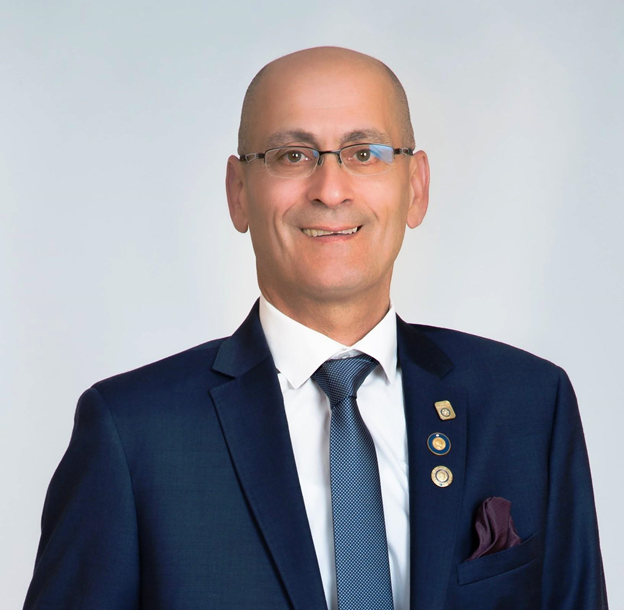 Hadi Mortada, our District Governor. Hadi was born and raised in Beirut Lebanon, and received early education at St Joseph school. Hadi completed a diploma in Electronics Technology at the Beirut Technical College. In 1985 he moved to the United States where he completed English studies and pre-engineering at the University of Georgia. In 1986 Hadi moved to Colorado where he completed Electronics Engineering Technology at the University of Southern Colorado. Hadi is also a Microsoft Certified Professional MCP (1998). In late 1989 Hadi moved to Canada and completed Sales & Marketing Certificates at Algonquin College. At the same time, he was part of a team that started a daily news paper in Ottawa, "The Ottawa Sun" where he worked with the company for 27 years. Hadi's Rotary involvement
District Conference committee 14-15, 15-16, 16-17 PR & Sponsorship Hadi's roles in his club include - Public Relations committee chair, Calendar Committee, Mums Committee, Membership committee, Club President, Music for Humanity committee, Club Co-Treasurer, Chair Social & Recreational Committee. Hadi also played an instrumental role in developing the club's website. He is Social Media liaison for West Ottawa and the Ottawa area clubs. Conventions Attended Montreal, Lisbon, Atlanta, Toronto, Hamburg, and many District Conferences Hadi is a landlord of rental properties, and a renovator, builder, and gardener. His hobbies are travel, cycling, rowing with Dragon Boat Team, classic cars enthusiast and restoration. Hadi has always been impressed by our club, and what we accomplish both locally and internationally. He told us about how he became involved in Rotary. Back in 2002, a friend and client invited him to have lunch at a Rotary meeting, and he eventually joined the club in 2003 while he was still working. In 2007, he became ill with Crohn’s disease, and had to take time off. In January 2008, he was hospitalized for three months. He and his wife had no family here in Canada, and it was his friends in Rotary that responded and supported him. This is when he came to realize that there is a Rotary family that everyone has. Rotarians care about each other as well as doing service work together. People seem to join for one reason and stay for another…this often being the friendships that develop. Rotary offers everyone a lot of opportunities. During this time of Covid 19, we needed to adapt and have often turned a negative thing into different positives. Rotary is a team. We were able to use Covid 19 as an opportunity. It is important that we set goals as they give us direction, whether or not we actually achieve them all. They can change, but they are important in providing a road map. We achieve more when we have set goals. It’s important for Rotary to maintain visibility in our community. Hadi worked on membership in his club, and has realized that it’s easier to get members than it is to keep them. Rotary needs to be accessible and affordable. Maybe we should consider gathering differently and break away from “the way we have always done it”. We should look to other organizations for new possible ways to do things. Invite other service organizations to join us on a project. We can achieve more that way. We should be aware of the new Area of Focus on the environment that was introduced by Rotary International. We should promote District activities among our members. The first ever virtual District Conference is about to happen, and it’s going to be great. In answer to a question, Hadi let us know that we can register for the District Conference up to Friday at noon. There are going to be some great presenters, and great break out sessions. Also, there is going to be a drum circle. John Gale thanked Hadi with our now traditional virtual loaf of bread. |
||||||||
Speaker September 29th - Sarah Champagne, Rotary Peace Scholar Doug Hicks introduced Sarah Champagne, a journalist from Montreal who was a Rotary Peace Fellow taking her Master's at the University of North Carolina School of Media and Journalism. We've learned recently how rigorous the application is. Sarah has worked in print, multimedia, and radio. She has worked for Le Devoir in Quebec, and reported as a freelancer for publications in 15 countries over four continents. Teaming with photographers, she has worked on a large project on human migration. She has been awarded the James Travers Foreign Corresponding Fellowship, a major Canadian journalism award, and has been identified as an emerging talent by two Quebec journalism federations, and she speaks four languages. Sarah thanked us for sharing peace stories today. She is now in Austin, Texas, and started with thanks for her Rotary Peace Scholar experience. (This portion of Sarah's talk was obtained from her Power Point presentation as my connection failed) Rotary operates the Peace Scholar program from six different countries - England, USA (North Carolina), Sweden, Uganda, Australia, Japan and Thailand. Sarah participated in the two-year Master's program, and there is also an intensive Professional Development Certificate Program lasting a few weeks (former member Francine Allard was a participant). More tan 1300 alumni work on peace and development in 115 countries. Over half work with NGO's or government agencies. 6% work for UN agencies. (Connection restored) Sarah showed us her class (class 16 and 17), highlighting a couple of students who made a special impact on her. Linh Vo from Vietnam raised herself because her parents were so poor - her father was a bomb sawyer after the Vietnam War, selling metal from dismantled bombs. Vo now works in Vietnam in the area of ethical investment. Emilya Huseynova is from Azerbaijan. She is an epidemiologist, working in the US on the Covid response. Emilya was raising three children while studying as a Peace Scholar. She felt that as a woman from a former Soviet country that her role as a Peace Scholar is very important. Yared Lemma is from Ethiopia. Yared found his niche through the Peace Scholar program, working in the area of migration and applying data science to peace building. But what about Sarah? She has travelled to Cameroon, Guatemala, Mexico, Nepal after an earthquake, Benin, and many other places. Why did she want to return to school? In 2015/2016, she was preparing for a project on remittances - small amounts of money sent home by immigrants for basic needs. Together these remittances account for three times the world's formal development assistance. People take their fates into their own hands to climb the social ladder - this is what attracted Sarah's attention. If those immigrants' remittances were a country, the GDP would rank 25th in the world. Sarah went to meet the families benefiting from these remittances. She traveled to Haiti, Mexico, and then Turkey to meet Syrian refugees. There she met Sarah, a young woman the same age, who was waiting for a sponsor, as Turkey was only a temporary home. Sarah returned to Montreal to write a story for Le Devoir, thinking that if people could meet people life Syrian Sarah, it would influence opinions to welcome other refugees. The same day her article was to be published, she also wrote a piece on Donald Trump's Muslim ban, and the shooting that occurred at the Quebec Mosque. This pushed Sarah to apply for the Peace Fellowship. She decided to try to promote dialogue through her stories, and the Fellowship would help her do just that. That principle - dialogue through stories - would influence all her work. She is trying to merge her values with Rotary's Four Way Test and what she has learned as a Peace Fellow. She researched peace journalism, focusing on stories of transformation - how can someone involved in war be an agent of peace. For her Filed Applied Experience between the two years of the Fellowship, Sarah traveled to Columbia. Columbia signed a peace treaty in 2016 that was supposed to end 50 years of conflict, although the reality is more complicated. Sarah was very interested in the Peace Commission, which collects stories around the country to help write an official history. Following their work and attending their meetings, and met a man who was forced to be a child soldier when he was 13. After demobilization through a government program 4 years later, he became a cameraman for one of the largest TV stations in Columbia. He became a model of the idea that it doesn't matter who you are, or what you've done, it's who you can become. He represents for Sarah the whole history of Columbia. Sarah also told us that she was working for the Texas Tribune based in Austin, although she was working remotely. She pitched a project to Le Devoir in the vein of how do people reconcile divisions? She new that there would be many articles in the US talking about division leading up to the election but wanted to take a different approach. So she returned to Austin (after 5 other states) to write articles. Questions - Bill Egnatoff - your work reminds me of my time in Sierra Leone. How to women drive the quest for peace? For women it's just the fight to survive, to 'push the life in front of them'. Their interest in peace is much higher, and they have to pay a role in peace building. A researcher speaking at the Fellowship told the class that peace treaties are 50% more likely to work if women are involved early in the process. Women experience particularly brutal violence in war, and need to be involved in peace making. John Gale - what is the common thread of studies in the Fellowship given everyone's varied background? There is one compulsory class each semester, including mediation and negotiation, which has really helped Sarah in her work. Other experts lectured as well, and the UN High Commissioner for Refugees spoke at the University. Many Alumni have given presentations, and some have joined Rotary. Alumni also continue to meet online. Greta - is there a link between the Universities involved in the Fellowship? The major link is Rotary. There are common sessions, and a common newsletter. Unfortunately time constraints don't allow travel to other centres, but the directors meet regularly. The Alumni will also form a strong bond between centres. Heather Nogrady thanked our speaker today. Thank-you for another learning experience for a relatively new Rotarian. |
||||||||
Speaker September 22nd - Sophie Kiwala - Helping During the PandemicSophie was born and raised in Kingston. She received her education from Queen’s University, Humber College and Athabasca University. Sophie has a long and positive history of work in public and stakeholder relations, is a solid team builder and is accustomed to work in stressful situations with unpredictable and continuously shifting priorities. She speaks French and English is her first language. Sophie spent seventeen years working in retail management and as an entrepreneur. She spent five years living in Turkey and France studying English literature and French at Athabasca University part-time. She volunteered in an ex-patriot women’s group to raise funds in Turkey to help build their first women’s shelter. Upon returning to Canada from Europe, she started working in residential and commercial renovation, interior design, and rental property ownership. Sophie ran for the Liberal nomination and became our Liberal MPP in the 2014 election. During her tenure, she has served as a Parliamentary Assistant to several ministers, most recently as PA to the Minister of Indigenous Relations and Reconciliation. In 2014, Sophie focused attention on the issue of missing and murdered Aboriginal women in Canada. As part of her campaign to raise awareness, she publicized the Faceless Doll Project, an art project which uses faceless female dolls to represent the missing women.[7] On October 23, 2014 she read a Members' motion in the legislature calling on the Ontario Legislature to support the National Aboriginal Organisations' call on the Federal government to initiate a public inquiry to study the issue. In July 2020, Sophie revealed that she was running for the Ontario Liberal Party again with the nomination set to take place in 2022. She is a fellow Rotarian and is member of Kingston Waterfront Club. Sophie Kiwala spoke about helping the community during the pandemic. Before her presentation, Sophie talked about a project at Q.E.C.V.I. that helps financially challenged graduating students with the fee for post secondary applications. Having heard about what we are doing at Pathways, she thought this might be of interest to the club. Sophie began her talk by sharing that she had lived overseas for five years, and when she returned, she wanted to start a business. Her brother in law’s experience has always continued to inspire her. He developed a company that made chimney liners, and went knocking on doors for contracts even before he knew how chimney liners were made. This kind of optimism has always struck her as the way to go about something. After the 2019 election had taken place, and she found out about the Christmas time closure of programmes that provided free meals to people in need, she decided to take action. She reached out, looking for volunteers and for a source of training for herself. She attended Lunch by George to learn about how this could be done. She found two venues, at St. Luke’s Church and at the Renaissance Event Venue. Sophie was overwhelmed by the amount of support that her idea received. There were many donations of time and of food from the community. The Muslim Association sponsored and did the cooking at the Renaissance. It was really moving to see the number of volunteers. In fact, so many people wanted to help, she was having difficulty finding things for everyone to do. The owner of the Renaissance, Paul Fortier, was also very generous and helped with the cooking. Even a young boy made cards for all the gift bags.   After that program came Covid, and Sophie worried about changes in the food supply chain and how it would affect people in need. Two community members, Salahuddin and Ulfat Jalaluddin, came forward with an offer of having a large garden planted on their property which is near the Robinson Farm. Pyke Farms delivered compost and Loving Spoonful donated seed. Tomlinson Organic also provided some soil. Friendships developed among the volunteers who worked in the garden. A mask making project evolved from this project, and proceeds from that went to the Youth Shelter and the Humane Society. Many people were involved, wanting to give something back to the community. Michelle Chatten-Fiedorec offered our thanks to Sophie with our traditional loaf of bread that has become virtual. Sophie was touched by our thanks and told us about something in the Koran that it reminded her of… If I had only two things, a loaf of bread and a hyacinth, I would give the loaf of bread to someone who needed it, and keep the hyacinth to feed my soul. |
||||||||
Speaker September 15th - Gord Hunter, Executive Director, Kingston Humane Society.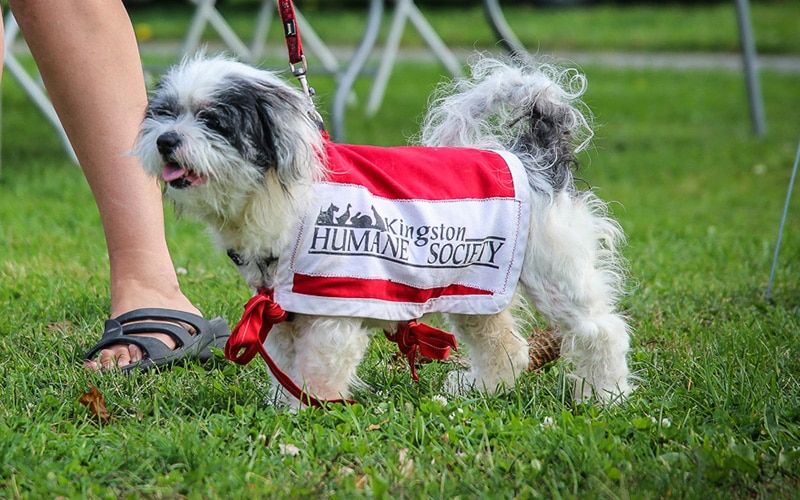 Introduction by Martin Thomas: Some say that the character of a society is measured by how they take care of the needy and vulnerable. I think that includes pets and animals. The Kingston Humane Society originated in 1884. Its objective is to provide shelter and care for animals and to investigate cruelty to or abuse of animals in the Kingston community. Gord Hunter, Executive Director, Kingston Humane Society (KHS). Gord began with Big Paws, the KHS fundraiser, September 15th - October 15th, for which the media launch was September 15th, shortly after our meeting. Normally it’s at Lake Ontario Park but this year is online, with participants logging their dog-walking kilometres, aiming to reach right across Canada! KHS is nearly 140 years old, the longest-running Humane Society in Canada. The Montreal SPCA has been going a bit longer. Generally, the SPCA has been in charge of investigation of cruelty and welfare issues. The Humane Society has helped, but not necessarily been involved in investigations. This year, a local judge decision affected charity involvement in law enforcement, so the SPCA in Ontario couldn’t continue investigations, so they stopped as of June 30 last year. The KHS stepped in and got some provincial funding for involvement in investigations for 6 months. Then the Solicitor General’s office took over in early January. KHS is a shelter, providing municipal services for seven municipalities in the Kingston area—City of Kingston, Loyalist Township, Stone Mills, Gananoque, and Central, South, and North Frontenac. We usually hold animals for up to 5 days. If animals are not claimed, then they can be put up for adoption. KHS feeds, treats, and spays or neuters as needed before adoption.Last year KHS took in about 1800 animals, 65% cats and 35% dogs. The cat return rate is only 5% but the rate is well over 60% for dogs.Seventy percent of KHS funding comes from the community, including regular donations and estate gifts. Funds are used to treat and care for animals. A veterinarian is on staff four days per week. She does spays and neutering and treats injuries.Funding is obtained through public events such as Big Paws, Bowl for the Animals, a month-long bake sale, and an online auction. KHS lost or changed some events due to COVID-19, through which they lost about $100,000 in funding. In response to COVID-19, from March 17 to May 6, KHS stopped adoptions. On May 6, they started contactless adoption and fostering, which got a great response. They now have a cohort system for their staff to work safely to avoid another potential shutdown. They use Zoom for placement arrangements. Luckily, they have remained COVID-free. In June, KHS re-started adoptions and taking surrendered animals. They’ve done about 250 adoptions since May 6. The community and staff have taken well to this, although the contactless adoption is more work and is more time-consuming. Cats can be done entirely on Zoom. For dogs, prospective adopters can choose them through seeing them in an off-leash area. The annual Big Paws event in Lake Ontario Park is very exciting for the staff and participants. It draws a huge variety of dogs. All staff assist. This year it had to be done differently—a month-long Big Paws across Canada virtual event. People track their walks. The goal is to complete a virtual walk across Canada. The registration fee is $25. Walk reporting is done on a Web site. The staff have done very well, with no infections. They have even covered duties of the usual 200 volunteers. Questions: Greta: Is KHS involved only with pets or also wild-life in the city? A: We are partnered with Sandy Pines for wildlife and transfer to them. Rick: introduced Trixie-Lou, who came from KHS seven years ago. What is the hold time? With Trixie-Lou it was an extra five days. She was not claimed, so the original owners' loss was my gain! A: Hold time is decided by municipalities. If the animal has a micro-chip, we can contact the owner. If there’s a collar, we hold it as long as possible. Strays are usually easily identified as such. We have partnerships with local lost-and-found Web sites and a woman who is a “pet detective.” Rick: Is having a staff vet new? A: Yes. Our veterinarian, Dr. Lorie Games, works with us 4 days a week. We don’t want to adopt out unaltered animals or have poor outcomes. Elizabeth: What percentage of strays have been microchipped by their owners? Do you microchip animals that go out? A: Less than 30% come with microchips, and about the same portion with tags. We encourage tag purchase. We hold micro-chip clinics, which will resume some time in the future. John F: Has there been an increase in voluntary surrender during COVID? A: There has been a decrease. There has been a 40% reduction of intakes across Ontario. All SPCA shelters are still closed to surrenders. Our surrenders are now scheduled, which eliminates spontaneous surrenders. Also, people are around their houses more so are less likely to have problems. Elizabeth Cohoe: What about unclaimed strays of particular breeds? Do you work with breed-specific rescues? A: Yes, we have partners. Example: Great Pyrenees, a protective breed. This dog needs to go to someone who understands the challenges. We work with breed-specific or behaviour-specific rescue organizations. John Farrow: and do you work with Sheba’s Haven? A: Yes. Some rescue organizations are familiar with palliative care. We started our own program recently. Some families are willing to provide care. Martin Thomas: Our son adopted a great dog from Texas. A friend adopted one from Alabama. Are dogs from the southern USA an issue? A: We’ve helped too; for example after a hurricane, the International Humane Society goes down. We take dogs in shelters there so dogs lost in the hurricane can be admitted. During COVID, you worry about fomite carriers so we quarantine and use full personal protective equipment. (Scribe note: The American Veterinary Medical Association published this, which has a paragraph on fomite transmission—transmission through touching contaminated surfaces: COVID-10: FAQs For Pet Owners.) Martin: Are cats in need of therapy during COVID? A: I’ve seen the jokes about dogs and cats! Cats don’t do as well in shelters, since we can’t let them out for walks. Rick Fiedorec: As a recipient, I’m truly thankful. ( Rick presented a virtual loaf of bread.) |
||||||||
Speakers September 8th - Julia Davies and Holly Gwynne-Timothy - Giving a Voice Back to Cancer Patients Elizabeth Cohoe introduced our speakers this morning. Holly Gwynne - Timothy is the Artistic Director of Melos Choir, and has a great history with music. What you may not know is that her knowledge extends to the actual functioning of the human voice. And with Holly was Julia Davies, a social worker for the Cancer Center of South Eastern Ontario. She overseas a lot of the therapeutic programming for their clients, so together they're going to talk about the project called Finding Our Voice, a program that was partially funded through our Community Grants process in the fall of 2019. Julia:
Thank you very much for the opportunity to speak. Um, I really appreciate it. And obviously we very much appreciated the grant that you provided. I'm Julia Davis. I'm one of the social workers at the Cancer Center here in Kingston. There are four social workers at the Cancer Center, and more recently I have been involved in trying to look at some more alternative type of therapeutic groups for our patients. Ideally what I wanted to try and do is not to have groups at the Cancer Center. We found historically that groups are not well attended at the Cancer Center, and really that I feel came from the fact that people spend enough time there having treatment and multiple appointments that, really, who wants to come to the Cancer Center. I started to think about the idea of, well, why don't we have more groups in the community and move? The attendance would be better as well as being much more therapeutic for someone. Often the Cancer Center can be really triggering to people. Often people who have finished their treatment do not want to go back there unless they absolutely have to, which, I'm sure we can all really understand. So when I started to think about alternative groups I came across an article from out of the UK actually written in collaboration with the Welsh Cancer charity, who did some reach research into the therapeutic value of singing. So I thought, well, why not have a singing group? I asked Holly if she was interested in it, and in her usual style. Holly was immediately enthusiastic and it actually didn't take much organizing. We found a venue, Holly was on board and it was publicized through the Communications Department at the hospital. It was really good. We started off using the Tett Center as our venue a couple of years ago in the fall and we got good attendance. What I what I found with the group from a social perspective is that it's really worked. The feedback we've had is that people have really appreciated that it's been off site - not been at the Cancer Center. Anecdotally, I think it's ticked the mental health box for a lot of people. I think a lot of people after treatment become quite isolated socially. A lot of confidence is gone and so it was really quite good to get people physically out to an event. It was really good that it became part of people's routine and Monday night they came to singing. WhatI really loved is we got a really great cross section of people. I think at one point our youngest member was 29 and our oldest was in her 80s. We struggled a little bit with getting men along, but I think at one point we had 4 four men and on average. On a on a really good night we'd maybe have about 13 people out. Sometimes people really struggle with stamina and with ongoing side effects of treatment, so there was never any pressure for people. Holly and I made it really clear that it wasn't exactly a drop in, but you really didn't have to make any kind of firm commitment and we were always really pleased to see people whenever they could attend. Another really nice thing that we did was we moved from the Tett Center to St. Paul’s Anglican church on Montreal and Queen. The church was a really lovely facility for people and from my perspective it was really nice. Halfway through we all had tea and there was an opportunity for people to speak during that time. We when we took breaks it was really interesting because I think what people really liked about the group was it wasn't all about cancer. Being a non-musical person, it was very interesting to me because I think when I started the group I had in my head I would be the Social Work person there and of course I wouldn't sing and then the first day it dawned on me like obviously I would sing as well. I think for the people who came were maybe a bit shy and you do make yourself a bit vulnerable when you haven't ever done any choir singing or any group singing. We did have a sort of festive group. Members of Melos joined us and we had some festive singing at the Cancer Center last December. Families came and sat and listened as well. I have so many memories of sitting in my office, speaking with people who were really struggling with mental health and not knowing what to do and I would say to them all, why don’t you come to the singing group? it was a very good project and to my mind very successful and patients are talking about it to me now and they really miss the group and the sense of camaraderie, but mostly actually really are missing singing. Holly: It’s a little hard after six months of quarantine and no singing to just suddenly feel such a flood of gratitude and memories about this experience of working with Julia and her clients at the Cancer Center. You know, she's a great listener, but also now I know a great speaker and she's good singer. I do want to say that I've worked in my with people with damaged voices or impaired voices. I've had the privilege of working with a couple of people with cancer, some people post-stroke, but this was my first time in a group setting and it was also my first time kind of being connected to such people as a complete stranger. Other times that I've had the chance to work with these people, they've come to me through a known connection and there's been a little bit of safety for them in jumping into the agreement to sing My main goal was to work on functional vocal exercises that would restore the autonomic reflexes in the vocal tract. These are things that we don't think about much unless we start to lose our speaking voice. The main thing is frustration and difficulty communicating feelings and thoughts to their loved ones and colleagues. This is one of the things with cancer treatment. It's such a shock to the system and a lot of the overt physiological elements of cancer treatment are exceedingly damaging to the vocal tract. On top of that, we had people in the group, some of whom had throat, cancer, lung cancer, Esophageal cancer and brain cancer. All of which were accompanied by surgeries which were extremely invasive, so you can begin to imagine the sorts of anxieties they had around their bodies and the frustrations from things they were in the in the middle of experiencing or had recently experienced. So I was pretty nervous about working with a mixed group. We had someone in the group who'd been singing all her life, and then a couple of professionals who came through one right on the heels of treatment for throat cancer and so we had others who had never opened their mouths to sing. That mixture really in a sense, helped the emotional tenor of the group. The levelling factor was cancer, so the desire to find something optimistic and forward moving and the desire not to dwell on anything negative or frustrating was important. So my challenge in setting the exercises was not to push them into that zone of fatigue and frustration, but to allow exercises that would enable their bodies to generate sound more effortlessly. I would say I had pretty good success rate and I certainly got some amazing feedback from people about sensations, of improved breathing, phonation, and developing a singing voice. I had one or two that I felt I couldn't help in the physiological sense, who week after week reported “wow, my voice still doesn't sustain itself”, but I think Julia touched on the communal benefits, the emotional benefits the pure joy we had. There was never any shame, never any sense that one should be improving. Even when you're singing without cancer, you have to take each day as it comes, because the voice is a mirror of so many things - what you've eaten, how much sleep you've had, your emotions, allergies in any number of things can affect the voice on a given day, so one must always take what's given to you on a given day and in that spirit, I led the group and encouraged them to be gentle in their judgements about the sounds they were making and how they were feeling. So it was a really a true privilege and I want to thank the Rotary for everything you did to support this endeavour. Holly then read a couple of very heartfelt letters from a couple of the participants in the group. In response to questions, Holly told us that the group hopes to resume once Covid restrictions are eased. In the future a more distinct division between those only interested in the Monday night group and those wanting a collaboration with Melos will be pursued. They hope to continue performing at the Cancer Center as well because that was very satisfying to both the group and the patients. The program received funding from several sources but both Julia and Holly are confident that funding for the group can be secured from various sources. As said by one of our members, we can all be proud of the funding we provided for this great program. Bill Egnatoff thanked Julia and Holly for a great presentation. |
||||||||
Aruna Koushik - NID in Nigeria |
||||||||
Marioly Sanchez - How Being a Rotary Exchange Student Changed My Life |
||||||||
Speaker Aug 18th - PDG Katie Burke - Global Grant Scholarships and Peace Fellowships Michelle Chatten-Fiedorec introduced PDG Katie Burke, who was our District Governor in 2010-11. She has a long history of involvement in education. During this presentation, we learned about the types of funded studies that are available through Rotary. For a Global Grant Scholarship, the applicant must live in our District 7040, but already be accepted for the first year of study at a Masters level outside of their home country. Their study must be within one of Rotary’s seven areas of focus, and they must be endorsed by a 7040 Rotary Club. Note that there are now seven areas of focus, as “Supporting the Environment” has been added to the former six. There are two types of Peace Fellowships. One is for a two-year Masters level program at one of seven universities around the world. The other is for a three-month certificate program at one of two universities, following at least five years of work experience. Rotarians and their lineal descendants may not apply. Katie talked about the type of person who would make a good candidate, and the list was of pretty amazing credentials. For details about the application process, you may visit https://my.rotary.org/en/peace-fellowship-application Our District can recommend a candidate, but the final decision comes from the Rotary Foundation. Natalie Kauf is a past recipient. She was nominated by our Rotary Club, and has attended as a speaker. This year, Audrey Wagner will be going to Oxford University and will be studying aspects of food security. Some may remember Ambassadorial Scholarships- they no longer exist. Their place was taken by the Global Grant Scholarships. Speaker thanks were offered by Sean Goodall. |
||||||||
Speaker August 4th - Committee ReportsAuction: Greg Mumford reported. This year’s auction will need everyone to be active in seeking items. Over the past three years we have netted less each year with $40K, $47K and $54K. This is money that is directed to service. Bingo money will be down due to the closure, so this is our main opportunity to make money for the club to use in service. There has been an idea floated to promote purchasing gift certificates from businesses rather than simply counting on them to donate. John Farrow will be drafting a special message to our honourary members and former members of the club about this. There may also be former members who are still in business and able to contribute. John is also going to approach donors who haven’t participated in a number of years. Murray reviewed sponsorships, with Rotarians who were present. If you have ideas for sponsorships this information needs to be given to Murray. Greg reviewed all of the available support tools, and asked that everyone keep him updated on the status of donors. Membership: Ana reported on membership initiatives. We should be inviting people to see who we are and what we do. We would like to aim for diversity, equity and inclusion, recognizing that being a member of Rotary is about doing something meaningful for ourselves as well as service to others. The Rotary in Kingston website will be showcasing all of the clubs for the community, and it is hoped that it will drive membership. The membership committee is building a strategy for the year. We will be inviting speakers to be members. Becoming a Friend of Rotary, for some is a lead in to becoming a full member. Last year, two Friends of Rotary became Rotarian members. The Rotary in Kingston website will make it possible for community members to see the different club profiles, and there will be links to each club website. Our meeting agendas with the link to Zoom are being sent out to our honourary members as well as Friends of Rotary. National Committee: Robert Reid reported. There is a strong committee this year. Last year we invested all but $28 of the budget, and this year we will have about $8,600. Sean Goodall is a new member, and there are three Friends of Rotary on the committee. (Amanda Stolk, Mike Amesse and Katie Koopman) The club bursary at SLC now has a principle value of $40,000, as $12,000 has been added over the last several years. Before any more money is added to this, we will be investigating whether the current situation has had a significant effect on it. It is difficult to be in contact with the student recipients due to privacy rules. The committee is interested in participating in the Tipi Moza project again this year in collaboration with the Community Service Committee. There have been conversations with True North Aid, and there are two projects that are of interest. They are sending activity packages aimed at children of northern communities, and also masks. Katie Koopman has referred two more seamstresses to Ana, and there will be 250 masks to send north. It was noted that John Farrow has a supply of masks and bandanas at Kingston Dodge. If you have ideas about further distribution of these items, please inform John. Focus Forward for Indigenous Youth may have another project that we can become involved in. This is the organization that had the greenhouse project on Manitoulin Island. We have given $5,000 of the $10,000 needed for the orchard at No. 9 Gardens. Trees will be planted that are mature enough that they should bear fruit in a year or two. We are hoping to be able to get student involvement in the planting. Don’t forget that September 30th is Orange Shirt Day. You can order a shirt (if you don’t already have one) up to August 15th. The National Committee will be addressing support of the auction at future meetings. International Service: John Gale reported. Most of this year’s budget was committed prior to June 30th, due to a change in the matching formula used by The Foundation. There are currently three projects of interest. One is an equipment upgrade to four government schools in India. This is a $50,000 project and our involvement is $3,000. Another is equipment for a maternity health centre in western Uganda. Both of these have been submitted to TRF. A breast screening project in India was approved last year, and we are committed to $5,000. This is already being reviewed at TRF. We have requests from three clubs to become sister clubs. These are Madras East, Madras Coromandel, and Madras Channapatna. We will do the ceremonies on Zoom. Madras Coromandel is going to be celebrating Rotarians there who are members of the Arch Klumph Society. They both have 10 years of service, and this is a very active Rotary Club. Greta presented an update on the Sechaba Project of the Morningside Club of Johannesburg, in association with the Early Care Foundation. Our commitment is $1,500. The project is located in a very poor area that has been affected badly by the pandemic. Greta showed a video that explains the project. View at www.sechabasupportproject.org. Community Service: Bill Egnatoff reported. The committee will be discussing a number of topics. These are whether to hold the fall call for grant proposals, whether we should consider another priorities survey, collaboration with other clubs, or other organizations, hands on opportunities. We should be careful to consider projects and not underwriting the running of other organizations. Could we couple fundraising to a specific project? Bill had a very good discussion with a new member of the Frontenac Club, and who is very enthusiastic about community service. One of our new members, Sean Goodall is also very interested in community service. It was suggested that a discussion of these topics and how we will do community service should be formalized on the agenda of a future club meeting, as all members should have input. Rotary FAR Project: John Gale reported. The money has been received from TRF, a coordinator has been hired, and we should be receiving invoices from Pathways to Education. The mentorship training has happened and now individual interviews of future mentors is taking place. Updates will be sent as needed to all of our partners and TRF. A steering committee will be established. An Interac Club is planned for Pathways to Education. Foundation: As time ran out, John Farrow will bring his report to our meeting next week. |
||||||||
Speaker July 28th - Ben Anderson - Toastmasters |
||||||||
Speaker, July 21st - Reagan Gale - The Cognitive Effects of Aging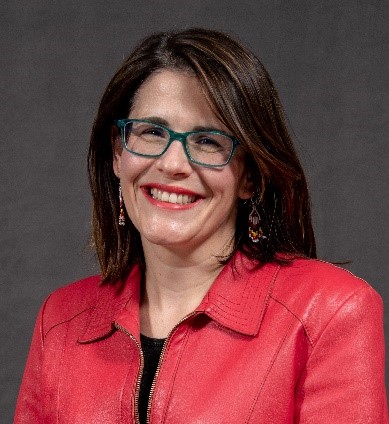 John Gale introduced his daughter Reagan Gale whose topic was about changes in thinking as we age. Reagan received her PhD from the University of Windsor with a focus in Clinical Neuropsychology. She is the founding president of the Psychological Society of the Yukon and President-Elect of the College of Alberta Psychologists. Reagan is the Director of Clinical Psychology for the Yukon Department of Health and Social Services, where she has been formally recognized as one of the emerging leaders within the public service. She has practiced privately providing neuropsychological, psychological, and psycho-vocational assessment in Whitehorse. Reagan’s practice focuses largely on the areas of aging, cognition, and brain injury. Reagan was a Rotary Exchange student to the Philippines, hosted by the Rotary Club of Kingston and the Islands, and is a current member of the Rotary Club of Whitehorse. She has two young sons, a highly neurotic dog, and enjoys running (slowly) in her spare time. “Forget About It” As we age, some things slow down and some things become stronger, and it’s normal for thinking to change as we get older. Cognitive processing slows and reaction time slows. Speech is harder to hear and understand. Novel problems are harder to solve, and there are small changes in working, or short-term memory. Most older adults believe that memory will decline with age, so are primed for it and look for it. The use of memory strategies can improve our ability to learn and remember new information. Examples of strategies are writing lists, and using phone reminders about things to do. Some things improve with age, like memory for words and concepts. Emotion and logic are integrated in our reasoning. Older adults have an increased acceptance of ambiguity and uncertainty. Unexpected and challenging changes would be in thinking, social behaviour, personality and self care. Some changes do merit attention. It’s normal to forget names of people, but forgetting names of close family and friends or recent events, and asking for the same information over and over is not. It’s normal to misplace items but putting objects in unusual places, such as putting keys in the microwave are concerning. It can be normal to pick up a pill bottle and wonder, “Did I already take this?” Unfortunately, although this is normal, some older adults worry that this is a sign of dementia. Everyone has memory lapses and it’s usually unnecessary to worry about it. It would be abnormal if one is very confused and not just slower. It is normal to find multitasking more difficult but it’s not normal if it is really hard to concentrate and pay attention. It’s normal to make a bad decision sometimes, but not normal to frequently show poor judgment in dealing with money or assessing risk. Everyone makes occasional mistakes in dealing with their own finances, but not normal if a person can’t keep track of monthly bills. Regarding language, it’s normal to have difficulty finding a word, but not normal if this is frequent or if someone begins to refer to really common objects as “that thing”. It’s normal to lose the thread of a conversation especially if distracted or if many are speaking at the same time. To regularly lose the thread of what someone is saying is not. Stress can increase these challenges. We tend to remember things that we pay attention to. You can’t remember what you didn’t learn, or in other words put into your memory, if your attention is elsewhere at the time. Low mood and high anxiety both impair memory and if that is the case, these should be addressed. Usually people don’t have a problem with orientation (that is knowing who, where and when you are). It is not normal to lose track of the date, the season or the passage of time. Getting lost or not knowing where you are in a familiar place is troubling. Most adults do not get dementia, but many people worry about it, and this can lead to thinking that normal lapses are a symptom. Depression related cognitive dysfunction leads to a quicker onset of dementia, whereas it could otherwise take as much as fifteen years. Vagueness, memory loss and slowed speech can be a sign of dementia and these can go into remission with effective treatments. Adults today are under pressure to age perfectly. You are told that if you just do enough to keep fit, eat a healthy diet, and do things to stimulate cognition, you can do this. There is an industry in selling products to look young and this is especially aimed at women. You cannot prevent normal changes, but you can learn to be gentle with yourself and have fun. Q&A: There is some truth in crosswords and similar pursuits being helpful. What can be more protective is doing NEW things that are both cognitive and physical, such as learning to play a new musical instrument. It is important to maintain social relationships. This can be a challenge in retirement, and you need to be intentional. Rotary can play an important role. Is a decline as the day progresses a sign of impending dementia? No. It could just be normal fatigue. In dementia there is a term “sundowning”. Many people with dementia evidence increased agitation and confusion as the day progresses. If anyone would like to ask Reagan a question, she would be available by email at reagan.gale@gmail.com. Heather Nogrady offered our thanks, and as a loaf of bread was out of the question, Reagan said she would go and make herself some toast and peanut butter for breakfast. Reagan's presentation can be viewed at https://portal.clubrunner.ca/1091/Documents/en-us/1363f16e-bd43-4853-975b-66ad1cce1ac7/1/
|
||||||||
RYLA 2020 reportGreg Mumford introduced Paul Elsley, one of our speakers. Paul is the President of the Rotary Club of Kingston, and is a real example of Service Above Self. It was Paul with his affiliation to Isthmus who brought the Covid 19 food project together, and he is also involved in a back pack project every fall. Paul has been Bill Egnatoff’s partner in Adventures in History, and with his connections to the schools, he has been instrumental in getting students to attend Rotary youth programs. He took over RYLA when it came to Kingston three years ago, and took it virtual this year. Paul is going to be assisted by Jorja Majury, who is a student who attended RYLA this year. RYLA 2020: RYLA occurred in May from the 29th to the 31st. It’s always difficult to find a time that works for all the school boards with differing exam and course schedules. The rationale for Rotary Youth Programs is schools are less able to provide enrichment programs, and these experiences can be transformational. They build cultural literacy and provide a place to form life-long friendships. Youth programs are integral with the Rotary International ethos. They also serve as a place to expose youth to Rotary and eventually have a relationship with Rotary. Paul attended RYLA as a student in 1975, and he has also found that many of today’s members were introduced to Rotary through youth programs. Recruitment is also a challenge – this doesn’t work without including schools in the process. The idea is that it should be a collaboration between Rotary and the schools. We should also invite youth who have attended a program to come and speak at a club meeting. Numbers – There were 53 students, representing 25 Rotary Clubs in District 7040 and 7010. They were 15 – 18 years old, between their third year in high school to their final year, and there were 13 male students and 40 were female. There were 12 from the USA and 41 from Canada. A unique benefit of being online is that American students can participate without the hassles of border crossing! Location – This is the last year in the cycle for Kingston. RYLA will move to Montreal next year. Key Personnel – Leaders came from multiple Rotary Clubs and Rotaract Clubs. Hurdles – This year, the Covid 19 pandemic made recruitment a challenge because the schools were physically closed. It made it more difficult to connect with the delegates. There were technical challenges due to running the program virtually. Typically, we can engage with students within a classroom setting but this wasn’t possible. Opportunities – There were some benefits in the way RYLA was held. Kids are familiar with technology. Costs were reduced and some logistical problems with the international border didn’t exist. Time commitment was limited, 2 hours in the morning and 2 in the afternoon. The potential number of participants was unlimited. The fee was $100 rather than $500 so some clubs sponsored multiple students. Jorja took over and talked about her experience as an attendee. She found that the speakers were amazing, and she gained confidence in talking to and meeting people. She learned a lot about leadership, identifying her own leadership style and skills. The participants developed a project called Fitness 4 Food that is going to raise money for the Covid 19 food project. Paul said that being in charge of RYLA has been a rewarding experience. There was a lot of collaboration between Rotary Clubs, and seeing it evolve over three years was interesting, as it improved every year. There was great support received from the schools as well as the Rotary Clubs. For the Fitness 4 Food project the students will be choosing an activity and then looking for pledges. Jorja was asked to send an email that will be forward to all of our members. During the question period, we learned that Greg Mumford has known Jorja for about 10 years, as it was her grandfather Greg Hasted who brought Greg into Rotary. John Gale thanked our speakers, pointing out that this year’s theme for Rotary is “Rotary Brings Opportunities”. This presentation showed that Rotary brings opportunities to Rotarians as well as youth. John also noted that the Rotary FAR project wants to establish an Interact Club. |
||||||||
John Gale - New Year, New PresidentPresident’s Prologue I spent the last week at cottage on the north shore of Lake Huron, a fabulous week. Last night, I got a call from my daughter in Whitehorse, calling to congratulate me for beginning our new Rotary year. She joined Rotary in Whitehorse. We discussed the new theme for the Rotary year—Rotary Opens Opportunities. She sees the impact of COVID on Rotary as an opportunity to redo how we do meetings and to rethink how we do our fellowship. I am finding meeting through Zoom more interesting than our breakfast meetings. We seem to all be able to talk with one another, not just with the same people at the same table. Her club is old, and we’re also an older club. If we rely on new media, we have an opportunity to invite people and make it an attractive meeting place. President’s Address The theme for this year is Rotary Opens Opportunities. The impact of Zoom and new technologies has been beneficial for our club. I first want to talk about how successful our year was last year. Fifteen months ago, I challenged us to embrace a big project building on our international connections, to build connections with Pathways. It has now been approved by the Foundation and is well underway. We now have an opportunity to deliver that project to the community. Already, because of this project, we are building a whole panel of Rotarians who want to act as mentors. There are many more graduates than mentors, so I hope that many more Rotarians will want to become mentors to the Pathways graduates. I expect that the mentorship role will develop. I expect that other Rotarians and other people in the community will volunteer to act as mentors. It becomes a way to build connections not simply with Pathways but to draw other members of the community into what Rotary is doing in Kingston. It is a way to introduce ourselves to the community as a whole and to bring people into our club, without relying on the old personal-connections model. Because we’re now involved with Pathways, we have the opportunity to do other things besides mentorship with the Pathways project—the Rotary FAR (Facilitator of Alumni Relations) Project. For instance, we just helped Pathways celebrate the graduation of their high school students. That will bring other opportunities to build and deepen the relationship with Pathways. Our focus in the Rotary FAR program is on getting students into post-secondary education and into the workplace and to help graduates find employment. One of the key partners is KEYS Job Centre, an organization in Kingston that is focusing on helping youth find employment in the Kingston area. It will be a key participant in making the FAR program a success. It’s an opportunity for us to build a relationship with KEYS, to assist them in helping graduates from the Pathways program to find employment. Lots of things will happen for our club this year as we work on delivering the FAR Project. We will have to build relationships that will help to build the brand of Rotary in the community and bring people into our club. Other things happened last year in addition to embracing Pathways and doing something that’s really ambitious. At the end of the year there were three big projects that involved a lot of “sweat equity”, as Murray (Cotton) likes to say. Through our National Committee, we have the development of a relationship with the community of Loughborough and the Loughborough Public School. We’re now talking about building a greenhouse, assisting that school to integrate with its community in a way it hasn’t done before, through the re-establishment of a home economics course at that school. We’re going to be able to build on that throughout the year. We’ve put a lot of our funds into making that happen. We’re going to assist the community and the school to work out how that’s going to work. It’s an opportunity for us to facilitate and integrate the efforts of the community in that part of Kingston. It will also be a way to build awareness of Rotary, to build personal connections with that community, and to draw members of that community into Rotary. That’s the product of the work of our National Committee over the last year or two. We’re now starting to see real accomplishments and the possibility for big impacts because of the efforts of that committee. Finally, the COVID-19 food hamper project, a co-operative effort of all of the clubs in Kingston, is a real opportunity for sweat equity. Many of us are delivering or packing food hampers. That’s a way to build relationships among our clubs. This COVID-19 project has really facilitated individuals from the various clubs to get together and to talk to one another again in a way they haven’t done in many years simply because our clubs become silos. We talk among ourselves but we haven’t really had a lot to say with the other clubs because we’re not going to their meetings. Participating in a joint effort like the food hamper project leads to meeting Rotarians across clubs regularly. We build links that are very helpful for building the Rotary brand in Kingston. Rotarians start to think of themselves simply as Rotarians, rather than as members of particular clubs. Those are all good developments that provide opportunities for building our brand, delivering meaningful service to our community, and attracting new members. I remember when I was first thinking about how I would go to the club and talk people into a big project that was going to last for a few years, with total cost over $100,000US. I thought that most people in our club would shirk that because it seemed overly ambitious. It was a much larger project financially than we had ever bitten off. It turned out that finding the money wasn’t the most difficult thing at all. We found the money because we were able to build on our international network, but we were also able to get the support of other clubs in Kingston. We should never forget that the Rotary Club of Kingston put in $6,300 US into that project. That’s almost $10,000 Canadian. That’s a big contribution. We wouldn’t have been able to do the project without that or it would have been that much more difficult to accomplish. But because we were able to raise that money, building on our existing relationships, we got that project going. Now the challenge is to actually deliver the project. We have many opportunities for personal service—as mentors to the students in the FAR Project, as managers of the COVID-19 food hamper project, or as facilitators or community organizers at the Loughborough Public School and the greenhouse project there, or packing or delivering food hampers. We have real opportunities as Rotarians and members of the club to actually physically deliver service to the community. In each case, with all of these projects, we start with the money to get things going. Money is important to us because we’re a service organization, but it’s just the key that allows us to help facilitate the planning and delivery. It’s what we bring to the table initially, but what we also bring is our own talent and time to devote to these projects. We have time and talent to contribute, not only to those three projects that we have going. As we begin to think more ambitiously about what we might do, all of us have contacts in the community as a whole. As people become aware of the potential that Rotary presents, our members are going to be able to come back to us with suggestions for what else we might do. But in each case, I think we’re going to find that the first ask from members of the community is going to be our money, but the second ask is our time and talent. Actually, I think our time and talent is the bigger, better contribution, one that we’re going to be able to deliver. The real opportunity for us, going forward, is to be able to develop other projects that our members think are important. We’ll be able to support one another in doing these things. I want to end with this. Our first contribution to most of these projects in Kingston is the delivery of money, but, I think, not the most important and certainly not the last. Contributing funds enables us, if we wish, to become involved in the planning and delivery of the projects that are undertaken. We become facilitators. This is different from what we used to do a few years ago, when we raised money and gave it to other people (organizations) and they went off and did their stuff. Often we never heard from them again with respect to whether their projects were successful. We should be levering our money to get into planning and delivery of projects. That’s an opportunity that Rotary provides to us. The funding of our projects, whether internationally or locally, has enabled us to develop a whole network of contacts. We’re going to be able to go back to those people, the people that we’ve worked with in the past, and to new people who become attracted to us, to develop projects. As a service club, we need to raise and spend money. How do we contribute meaningfully to our club’s major fund-raiser this year, our Internet auction? It has been on hold for a while. The people who have been planning it feel that we should go ahead this year. I want to emphasize how important it is for us as a club to raise those funds. I thought about issuing a challenge that we should aim to raise so many thousands of dollars per member. Maybe that’s better left for a later discussion among our members. We ought to be establishing a target, I think, bearing in mind that the money we raise allows us to finance serious projects, but more importantly, our financial contribution really is the way that we get to the table to be engaged in planning and delivery, the sweat equity that Murray has talked about on many occasions. There’s no point in simply raising money to give to other people. If we raise the money to have a role in deciding how it’s spent, that’s much more fun. That leads me to the final point—remembering how Ana finished her talk at the beginning of the year—let’s not forget that we have fun. And we did. We had more fun last year than we have in a long time. I hope that we’ll have as much fun this year as we did last year because we all pitched in and got enthused about Rotary. Comments Ana: I like what you said a lot and I plan to support you every step of the way! John Farrow: I noticed with interest that our new RI president did not rise through the ranks of Rotary in the traditional way; he came through very active involvement in student exchange and he is dedicated to getting more young people involved in Rotary. Doug Hicks: Thanks to John Gale. Based on observation from experience in several cities, and membership in two Rotary Clubs and Kiwanis, he knows we need a stable platform from which to do our work. We have that, a template for other Rotary clubs. More important is our vision for the future. He thanked the club for the opportunity to be part of it. |
||||||||
Year End MeetingAlthough we could not meet in person, our annual year-end meeting was a great success. The evening started off with Bill and Joan Egnatoff, aka Classic Delights Duo, performing some summer themed music for our listening pleasure. The sound was great (on my speakers anyway). 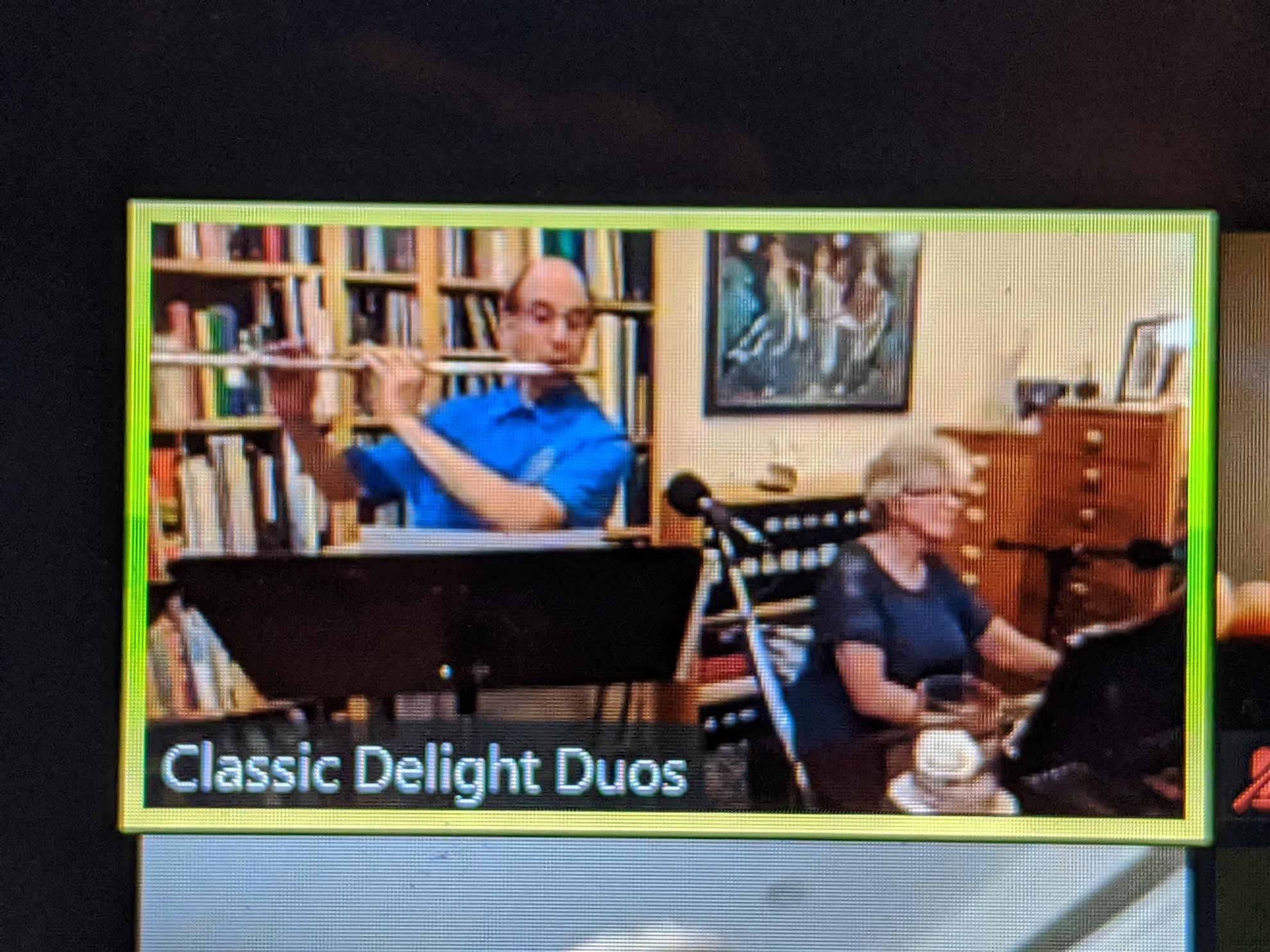 Then Ana called the meeting to order. There was much to cover. Ana talked about the achievements of the Club in a year that saw significant challenges since mid-March. After a short break our meetings resumed using Zoom, thanks to Ana pushing us to keep meeting, and to Ed's technical help. Funds from the Club, community donors, Rotary District 7040, and several NGO's like the United Way were pooled to support a food delivery project that helped the most vulnerable in Kingston - kids who depended on The Food Sharing Project for healthy food, and their families. The program will continue through the summer. It is a great example of Rotary coming together in tough times. International Projects continued, especially the Breat Cancer Detection Project with our sister club in India. And the Pathways Project (officially FAR) came to fruition. There is much to look forward to in John Gale's Year as President. Ana also had the pleasure of inducting for new members and welcoming two new friends of Rotary. Geln Roberts and Jim Rymerson have both transitioned from Friends of Rotary to full time members, and Sean Goodall and Doug Hicks were inducted as new members. We'll hear more about Doug and Sean soon, and Glen and Jim too. Amanda Stolk and her partner Mike Amess were also welcomed as friends of Rotary. It's been a long time since 6 inductions occurred at one year end meeting - it bodes well for our club's future. There were 5 Paul Harris Awards given out at the year-end meeting as well. Ana awarded Rick Fiedorec with a Paul Harris for all he has done for the club since handing over the reins to Ana as President (more about Rick later). The Foundation Committee awarded four members, but first, never missing an opportunity to talk about our Club and member support, John and Bernie highlighted some of the achievements of the year - our Club is first in per-capita Annual Fund donations, and also first in total Polio Plus donations. Bernie also highlighted some notable milestones for Polio - a new vaccine has been developed that is safer, thank to The Gates Foundation. Nigeria will likely be declared Polio-free in August, and next year India will celebrate 10 years being Polio free. John first awarded Murray Cotton, noting that Murray is an extraordinary fundraisers in all the club's activities, has pushed us to make "sweat equity" projects part of our club experience, and always questions how we do things and thinks of how we can be a better club. John also awarded Robert Reid. Robert has steered the National Committee for several years, making it an integral part of our donations, improving the lives of Aboriginal communities and furthering the cause of understanding in area schools. Bernie awarded Paul Harris recognition to both Ana Sutherland and Ed Thomson, one of our "dynamic duos" of C-K Rotary. Ana has led the club with skill and grace, pushing us to keep meeting via Zoom, and making sure that our physical meetings ran smoothly in our new location, often being the first to arrive and the last to leave. Ana also took on the role of Area Governor even before her term was up - a big sacrifice at any time, bigger when you are still President. Ed Thomson was also recognized as being a driver of our weekly meetings, helping with set-up and takedown most weeks, and also helping with the technology end of things for the speaker when needed. Ed also helped us get our Zoom meetings up and running, as well as participating in the auction committee as an aid to John Farrow (with Doug Townsend) in the task of gift entry. Ed also performs a valuable behind the scenes role as keeper of our auction database (information is power!). Thanks to all five recipients for all you do for the Club and for Rotary. There is much more that could be said about the work these folks do, this is just a sample of how valuable they are to us. Ana also had the pleasure of rewarding the Rotarian of the Year Award to Rick Fiedorec. Rick transitioned from two terms as President and did not miss a beat this year. He assumed the role of Treasurer and tackled the task of getting the books in order from the last few years. Working with our new bookkeeper, he achieved that task about mid-year. His work as Treasurer has helped guide the Directors and we have been kept well informed of our financial position. Rick has also acted as a mentor to Ana through her year as President. 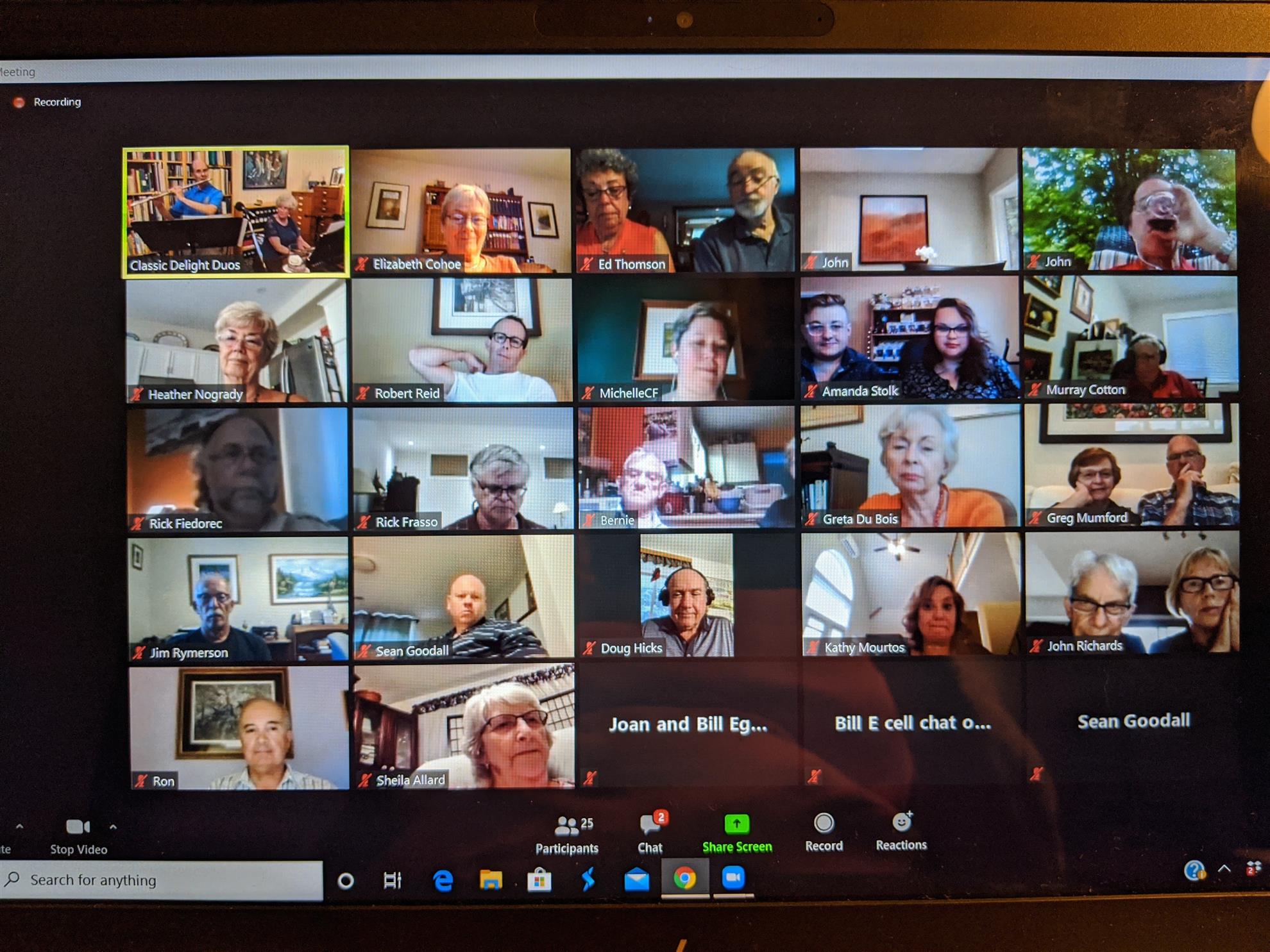 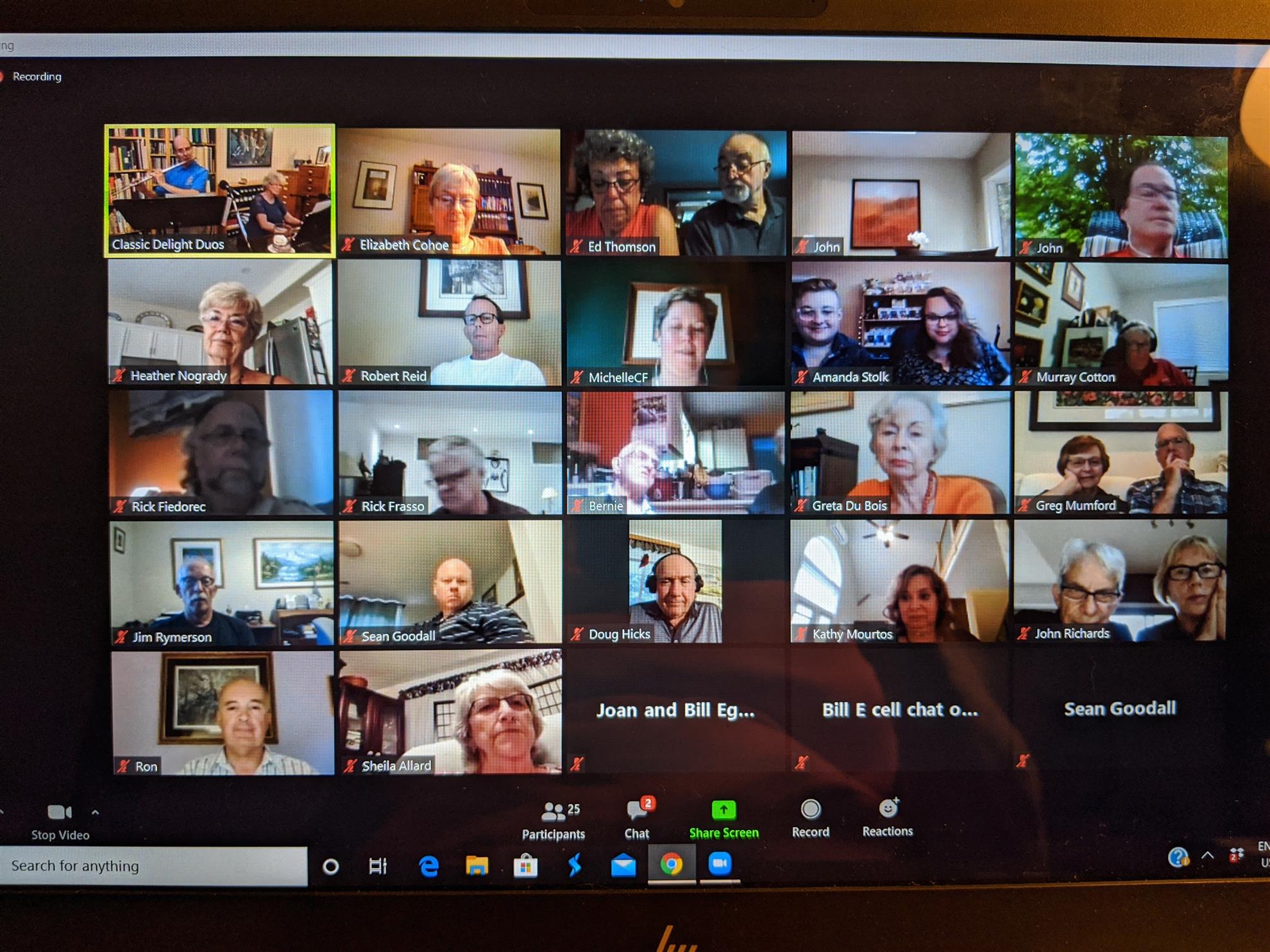 |
||||||||
John Farrow - The Rotary Foundation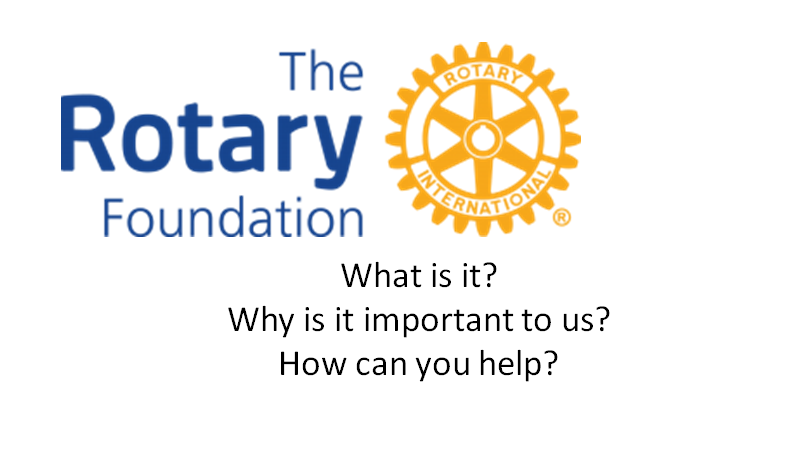 Ana introduced John Farrow, who actually needs no introduction, as our speaker. John did say that he joined the club in 1990. The Rotary Foundation: John talked about what it is, why it is important, and how you can help. The Foundation was created in 1917 following the Atlanta Rotary Convention, with an initial amount of $26.50. (Scribe’s note – The Bank of Canada says the value in 2020 would be $473.16). Every year, 50% of your Annual Fund donation goes back to the Districts (District Dedicated Funds, or DDF), and 50% goes to the World Fund to advance the goals of Rotary. The Global Fund matches District Designated Funds and makes the scope of projects larger. There is never enough money to match all the applications that are received. The Foundation encourages - and requires -partnerships among Rotary Clubs. These will be even more important as starting July 1st R.I. will no longer match club and donor monies for a project. John notes this is a challenge, but with the partnerships our club has made thanks to people like Bill Gray and John Gale (and others) we can overcome this. The ending of R.I. matching dollars is actually a testament to the quality of the projects out there. The grants in order of the amounts awarded go to the following areas of focus. 1. Preventing Disease, 2. Clean Water, 3. Education, 4. Growing Local Economies, 5. Saving Mothers and Children, and 6. Promoting Peace. Charity Navigator gives The Rotary Foundation the highest rating possible, as 92% of the money goes to projects. 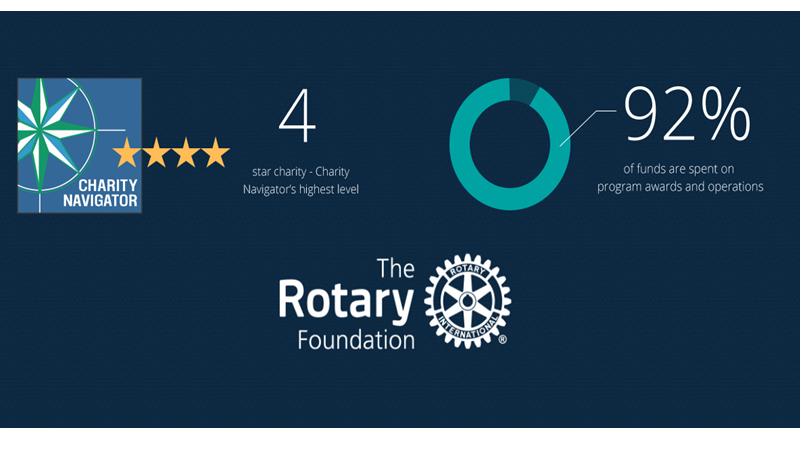 Why is it important to us? It aligns with our reasons for joining Rotary. Our club has benefited by thousands of dollars over the years. There are always six or seven active projects involving our club, representing hundreds of thousands of dollars. Many of our members donate to The Foundation. It puts the “international” in Rotary International as Bill Gray reminded John recently. The Annual Fund invests money for three years before investing in a project, and the interest accrued helps pay many of the expenses of running the Foundation. "Rules are a good thing", according to John. There are very rigorous rules to adhere to in order to receive a grant. A project must be sustainable. A Rotary Club partner is required at the other end. It’s important for a club to have champions, and we have this in Bill Gray and John Gale. We also have dedicated people in District 7040. Bonnie Black and Bette Miller lead the effort in our District, and John remarked after attending the Global Grants Workshop, he was even more confident in donating to the Foundation. John then used our Rotary FAR project to illustrate the way that money can be combined. Our club contributed $15,000, and with money we raised outside of our club funds it became $21,200, but the Rotary Clubs of Kingston, Napanee and the Passport Club all contributed. Five clubs in India contributed, as well as District Designated Funds, and The World Fund. So…all combined to support a project that has a value of almost $109,000. Through working together with other clubs, and with The Foundation, we can do things that we couldn’t do on our own.  How can you donate? The Annual Fund is the primary source of money for project grants. We have a goal of “Every Rotarian Every Year”. Every year, 50% goes to the World Fund and 50% to the District Designated Fund. You can donate by writing a cheque, by a monthly withdrawal plan, or monthly on your credit card. You can choose a specific area of focus where your money will go. You can also support Polio Plus, and you can also support a specific project that you know of until it is fully funded. The Endowment Fund ensures long term viability of Rotary International programs. Money is invested and only the interest is used. A Benefactor is someone how has added The Foundation as a beneficiary of their will. John outlined the various qualifications, you can achieve, starting with being a member of the Paul Harris Society ($1000). Increased donations take you to Major Donor, Bequest Society, and Arch Klumph Society. Our club aims to have every member donate every year. There is also a Rotary credit card in which a small amount from every purchase goes to The Foundation. It’s a small amount but has raised over $8.6 million in recent years. Our club has constantly been at our near the top of giving, with the average per member of $360 - first in the District to date. Over all donations have been $65,750, with $7,214 to Polio Plus, again, first in the District. You may contact John for any information you need about making a donation to any of the funds. Questions: Thinking about directing donations, is the Rotary FAR project now fully funded? Yes but there are always new projects being proposed. Bill Gray noted that most clubs don’t have enough money to do large projects, and so they find allies. We have a very active International Committee. Cooperation between clubs is increasing and we are finding new partnerships. We have built a network of partner clubs around the world, and it has benefited our FAR project. Ana offered our thanks to John for his presentation. Paul Harris Society recognition: Ana announced that Heather Nogrady is not only a Paul Harris Society member but has achieved recognition for being a Paul Harris + 2. Speaker thanks was offered by Bill Egnatoff who also noted the many ways that John has contributed to our club and to Rotary. He pointed out an interesting slip that John made that actually formed a new word, “transparity”, which seems to describe balancing the inequities in the world. 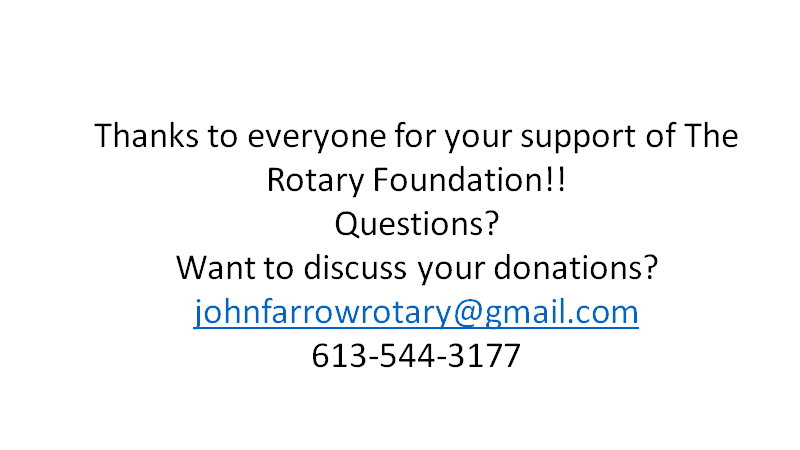 |
||||||||
Michelle Clarabut, Programming and Communications, Marine Museum of the Great Lakes - What's New at the Museum?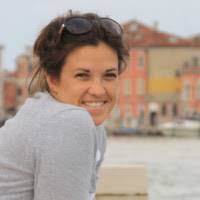 Michelle Clarabut, Ph.D, Programs and Communications Manager, Marine Museum of the Great Lakes at Kingston John Farrow introduced our guest speaker. Inspired by a recent TV news segment on the Marine Museum of the Great Lakes and the news that Brett Smith has helped to “repurchase” the building that used to house the Museum, he contacted Michelle Clarabut, Programming and Communications, to talk about its Memory Project, commemorating the Battle of the Atlantic. Michelle - It’s great to be out in community. I’m the Programs and Communications Manager, in a full-time staff of two. We will have two summer students, one of which has started just last week. Two years ago, we had to leave our 55 Ontario Street location. We leased the building from the Government, which sold it, but we now own the building. The Museum has been temporarilyhoused at Portsmouth Olympic Harbour and hope to get back to our original location some time this year. We are closed to the public right now, but hope to open soon. A lot is happening behind the scenes. We have recently completed our 2020-2025 Strategic Plan, Steering into the Future, which emphasizes our mission to create an inclusive space that inspires the enduring connection with the maritime heritage of Kingston and the Great Lakes, including social, economic, and environmental history of our area. The plan provides an overview of our own history and outlines our thee priorities for the next five years. We are re-imagining what the Marine Museum will look like, and are also working on our business plan, including our 5-year capital and operational budget. We are researching the acquisition of a new historic ship. The Alexander Henry was returned to Thunder Bay a while back, where it was built. Last summer, we were given by a former museum member, the Red Jacket, a very well-known Canadian racing yacht. It was designed by George Cuthbertson and George Casisan and built by Erich Bruckmann. It was the first Canadian and non-American boat to win the overall title at the Southern Ocean Racing Conference in 1968 in her second year. This vessel will be a great addition to our exhibits. Typically, we have summer camps and educational programs at local school. Last summer we reached over 578 Kingston youth. We also have Nautical Nights, a winter speaker series, January to March. This year it was cut short because of COVID in March We also do public tours, including in local retirement homes. We’re very active in the community, trying to engage people with maritime history. After the March break, we started Virtual Challenges to take the place of cancelled live events.. The first was a one-week boat building challenge—build it, name it, see how many marbles are needed to sink it; a lot of fun—open to everyone. We have had others in the past, including environmental challenges (building water filters, talking about pollution in the Great Lakes) and art-related projects (designing a Great Lakes cruise ship). These provide opportunity for youth, families, and groups, to be creative. This Thursday, June 18th is our first Virtual Talk, “Turtle Talks,” by Mabyn Armstrong. This talk is about local ecosystems and invasive species. Join us on the Marine Museum of the Great Lakes Youtube channel. Information is on our Facebook page. Forged in Fire: Kingston Goes to Sea was a project I put together, with a personal and community story. To commemorate 75th Anniversary of the end of World War II and the Battle of the Atlantic. Kingston a had huge role in the Battle of the Atlantic and the Second World War through ship-building. Twelve ships built here served as convoy escorts in the North Atlantic. Two didn’t make it home. The huge contribution of Kingston is a story that doesn’t often get told. The project is about the ships, the people who built them, and the men and women who served including Wrens, volunteer reserve, and Merchant Navy. The project is about community engagement. Many veterans are unfortunately deceased, but we would love to have stories by the second and later generation about a loved one who served—people from the Kingston area and involved in either ship-building or having served in another maritime capacity. It could be about how they met their husband or wife during the war, funny anecdotes about their training experience, personal stories and anecdotes that were passed on. The project Web space is a place where people can come and share their stories including pictures or artifacts. mareinemuseum.ca/forgedinfire . Once a story is submitted, it becomes available to the public. A few have been submitted so far. We are especially interested in those who built the ships, often forgotten and also those who served on the ships built in Kingston. We are collaborating with RMC Museum. We intended to create a 2020 pop-up exhibit, but COVID-19 has prevented that (so far). We are discussing making it a virtual exhibit and feeding into a blog series to bring stories together. We are looking for commonalities or links across the stories; e.g., people who were on the same ship at the same time, unknown to their families. We are also hoping to share hidden stories, e.g., community gatherings for launches - we have some amazing pictures of that. We are also developing educational program, for schools and local community groups. Now after three months that we’re going to be opening up, it will be interesting to see how that will work out. Discussion Bill Egnatoff mentioned how much he appreciated the opportunity of having Adventures in History work in the Museum and visit its archives. One student said, “This smells like history.” John Farrow: Have you reached out to the Genealogical Society? He will connect the Museum through his wife, a member. A call could go out through all Ontario branches. John Gale: Will you be able to give sense of how many women were employed in the shipyards? Michelle: Unfortunately, a lot of records have disappeared. WWII years are a gap in the records. I would love to find information on that. I would like stories of women serving as “Wrens,” (WRCNS, Women’s Royal Canadian Naval Service), and stories from Indigenous communities. I am reaching out to Prince Edward County, and Gananoque (part of the Kingston area). Individual stories are not being told; I want to find them. They deserve to be told. Murray Cotton: I loved the first photo of the Canada Steamship Lines. My father worked for them for over 50 years. He wanted to serve, but was deemed an essential worker so had to go back to the docks. I refer you to Terry Hicks. Robert Reid thanked Michelle. He is pro-development downtown, but was very concerned to learn about the sale of the property where the museum was housed. He was very happy to learn of the recent purchase of the property so the Museum could move back in. He visited with his children, and was also there for the funeral held there. He acknowledged the very aggressive plan and budget. Robert thanked Michelle with a virtual loaf of bread. |
||||||||
Amanda Stolk - True North Aid during Covid-19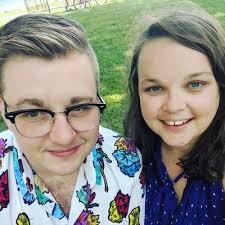 John Farrow introduced Amanda Stolk. Our first encounter with Amanda and True North Aid was assisting them with their collection of medical devices back in 2015. Amanda was here to tell us about the work of True North Aid as it is today. She is the Project and Communications Director of the organization. True North Aid has been in existence since 2009, supporting Canada’s northern communities. It is based in Kingston but has volunteers in many other places. There are eight foundation stones to their work. These are self determination, reconciliation, water, food, health, housing, hope and education. Amanda outlined some of their key projects. Currently there is a Covid 19 emergency fund, and they are sending shipments of things like masks and critical care supplies. The Canadian government is assisting, but sometimes things needed just don’t get there fast enough. One in ten diabetics will die from this disease and diabetes is a common health issue in the north due to diet. In fact, many people have a lot more other underlying health problems that make their outcomes poorer. True North Aid ran a recent campaign to support this need for supplies. They are currently backing the children’s needs related to learning from home. Backpacks full of school supplies were sent. These bore a cost of about $40 each, and were sent to the Clearwater River, Canoe Lake and La Loche communities, but now no one can go there. Fly in communities have more protection from the virus whereas those with road access have a bigger problem. Housing is crowded, often with three generations under one roof so this encourages the spread of disease. Amanda showed us photos that illustrated the kind of medical assistance that is being given. People ask why they can’t just relocate south where they are not so remote, but to them, this is their home. Many of the elders do not speak English. True North Aid wants to be able to support them so that they can stay in what has been their home for so countless generations. For more information, visit www.truenorthaid.ca. Amanda may be reached at amanda@truenorthaid.ca. Questions followed. Is Covid 19 affecting these communities disproportionately? The answer is yes. Health problems make the risk greater, and living conditions cause the spread to be easier. What happens if someone is so sick, they need to be on a ventilator? They get sent to Thunder Bay. Amanda reminded us that it is really third world conditions for many of these people. How much communication is there between the various communities? The communities are currently blocking inter-community communication. Ron Pols thanked Amanda with a virtual loaf of bread, saying that thinking about these people, the words resilience and pride come to mind. |
||||||||
Greg Podmore - Guatemala Literacy project
John Farrow introduced Greg Podmore. Greg is a member of the Rotary Club of Grand Prairie Alberta, and his club has been involved in a large Guatemala literacy project since 2004. https://www.guatemalaliteracy.org/
Greg told us about the high need for their program among indigenous children in Guatemala. Four out of five are illiterate. Parents cannot afford to send them to school. This is a large grass roots project that receives $200,000 annually from the Rotary Foundation. There are also large donations from around the world. Rotary works with an organization in Guatemala called Cooperative for Education. It all started in Cincinnati by two young men who were teachers in Guatemala who thought that text books could be provided to students there. 600 Rotary Clubs around the world are now involved. It started with text books, and then expanded to computers. Children find the books to be exciting. One third of indigenous people cannot read or write. Teachers receive two years of training. First, a story is read to the children. Then when they understand it, they take the story back and put on puppet shows or act out the stories. Later they learn to write their own stories.
At first, the adults didn’t understand why their children needed this. The books include learning about math, social studies, science and Spanish. 60% of mid level jobs require a knowledge of computers. 95% of the individuals who go through the program are able to get employment.
There is a sustainability plan, and the schools also put in money.
RISE is a youth development program that starts in grade 7. Students often leave school after grade 6. Students are chosen in grades 5 or 6 for RISE. They look for tough and determined kids, and not necessarily the brightest ones. They are also children whose parents cannot afford their education. Without this program, 95% will never finish high school. They will go to work farming like their parents did.
The Rise program is much more than books. They gather monthly for training in things like interviewing for jobs. They also tour places where employment may be located. They come together to see different ways to improve their communities. Each student has a counsellor. They learn about good citizenship, and volunteering in their communities to help needy people. It’s all about breaking the cycle of poverty.
How can you get involved? Rotary Clubs can sponsor a class or a student in the Rise program. Canada has also matched the TRF grants.
The next trip to Guatemala is planned for February 2021.
Greta spoke about attending a Friendship Exchange in Guatemala. John Gale spoke about a local group of Rotarians that attends the Uniendo Conference in Central America, and asked whether this project is linked to the Guatemalan stove project. (They are not.)
The question was asked whether they are mostly dealing with just rural populations or also cities. They are involved in both, but mainly in the western highlands.
Heather Nogrady offered our thanks with a virtual loaf of bread. It was interesting to hear about how this project evolved, and to see photos of children who were so obviously happy and proud, and that said a lot. |
||||||||
Laura Tamblyn Watts - Seniors in Isolation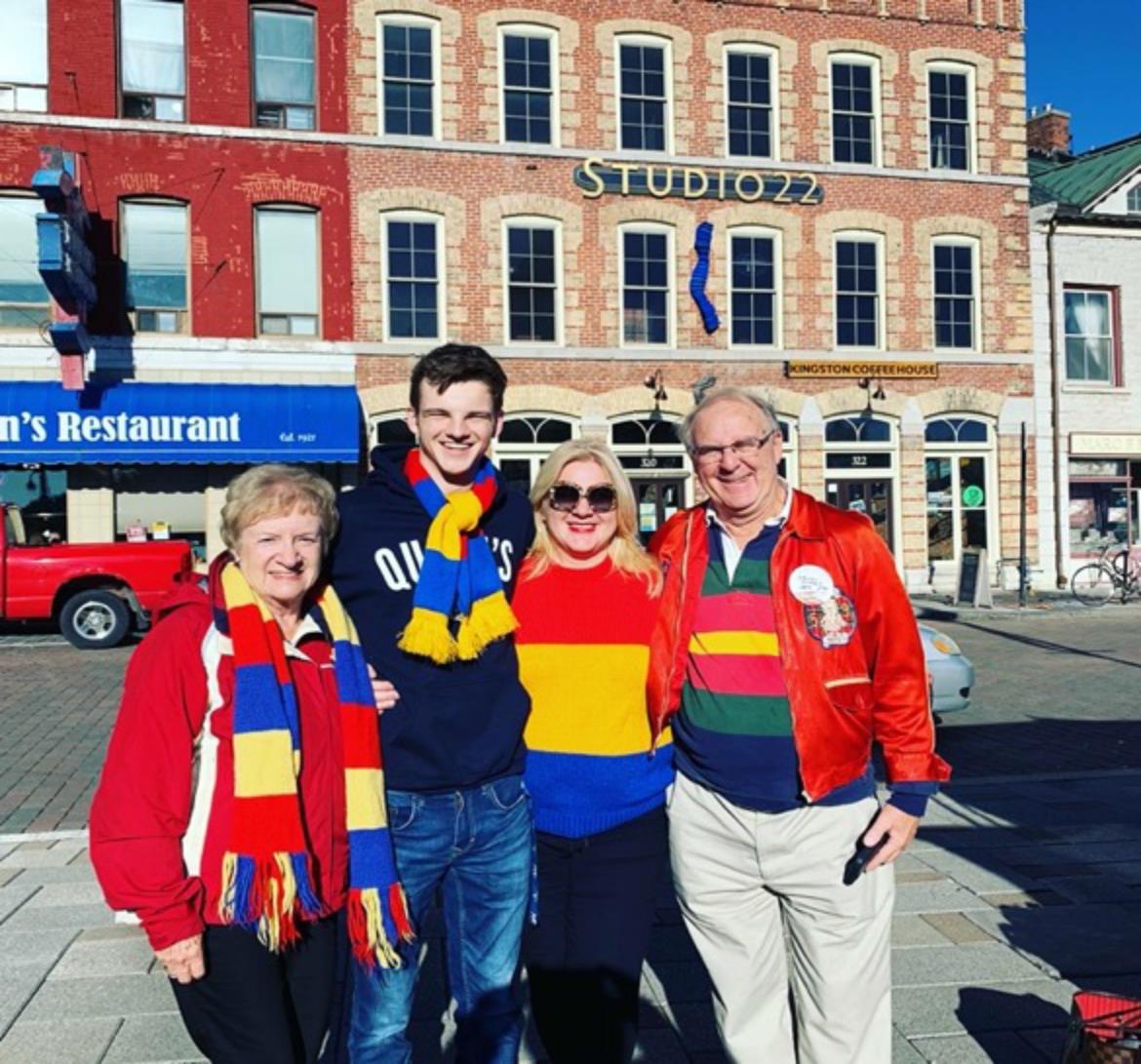 John Farrow introduced our guest speaker, remarking that Queen’s University is a great source of speakers for our club. The recent Alumni magazine had a feature article on Laura. A 1994 grad, she is a recognized expert in elder law an elder issues. Laura has started a program through Queen’s and also started a national seniors’ advocacy organization, CanAge. Please see the speaker’s slides: Rotary Club May 19 Social Isolation Laura: (It's still dark here in British Columbia.) Thank you for the invitation. I have been connected to Rotary for many years. Our family has hosted two Rotary Youth Exchange students. Kingston is about as COVID free as anywhere in the country, so stay there! CanAge is a national not-for-profit which collaborates with Queen’s, government, and a variety of other agencies. It’s mission “is to advance the rights and well-being of Canadians as we age.” Its vision, “for older Canadians to live vibrant and connected lives,” is for the polar opposite of social isolation. As a senior, if you’re well connected and don’t smoke, you’re probably doing pretty well. Laura shared some of her personal experience in dealing with COVID-19. Her parents are Queen’s grads and her son has finished first year at Queen’s. Her parents, 83 years old, have great social networks and are active and healthy. It took a while for them to get used to the COVID-19 situation. She had to tell them starkly that if they got sick, they were going to die and nobody would give them medical services. It was the first time in their lives that they had experienced social isolation and the first time that they had to ask for help, including for grocery shopping. CanAge creates seniors' projects through partnerships. A most recent one links Queen’s students and senior alumni. In planning this, when Laura approached the V-P of Advancement, Laura told her that she hoped Queen’s was not asking elders for money at this time. Thankfully, it was not. Instead, the Office of Advancement collaborated in creating a friendship program. Laura asked the United Way for help, as she did with Canadian Frailty Network and Elder Abuse Prevention (ON). They had the program up and running within 1 1/2 weeks. Organizations are working together in a way she’s never seen in 25 years of work, launching new programs very quickly. Laura gave us some background on social isolation and how bad it is for our health. One study out of Harvard compared the impact of social isolation to smoking 15 cigarettes a day. People need about 3 to 4 good relationships, including intergenerational relationships. It is very challenging to raise money for programs for seniors. But this one time, since all people have experienced some form of isolation, it has been easier. A phone call two to three times a week to a senior can have a huge impact on physical and mental health. Social isolation and loneliness are not the same thing. Social isolation is the idea that you really don’t have people to reach out to if you wanted. A recent study in Holland measured all the health indicators when a program for 4-year-olds was moved into a long-tern care centre. The functionality of residents increased remarkably. Laura shared some statistics on social isolation among Canadians before COVID-19. Sixty-two percent or seniors would like more time with friends and family. During COVID-19, 54% of Canadians report feeling lonely. Laura also shared info about abuse and neglect. No government has given any money to address this during the Covid Crisis. About one in five seniors experienced abuse and neglect before COVID-19, now the figure is possibly one in three. Two-thirds of this is propagated by family and friends. Financial abuse is also very high. Laura and the organizations with which she works are trying to figure out how to address this problem. COVID-19 frauds and scams came out very quickly. The Queen’s program matches students with older people. Queen’s found about 6,000 Queen’s alumni across Canada who might have been at risk. Training for the students starts with various myths and ensures that they have a good understanding of who they’ll be contacting. Only 8% of seniors will ever be in a nursing home. All are vulnerable to the virus, but many may not be otherwise vulnerable. It’s important not to treat seniors like children. About half of people over 80 have some cognitive impairment. Mild impairment starts showing up about 10 years before diagnosis of serious dementia. Families don’t necessarily take care of their senior parents, as many are physically distant from them. Often the older person is the one supporting the younger. Hearing loss is very common, so students need to take that into account in their conversations. Reading lips of people with masks is impossible, so this is a problem for those who rely on lip-reading. Laura's mother can no longer read (some) people’s lips. The program started early in the COVID-19 situation, and had 50 volunteers very quickly. Then Alumni Associations started participating. The program has been running for about three weeks and is already being much appreciated. Communities are being built. The United Way guidelines on communication are being followed. Twitter: @ltamblynwatts Questions: John Gale: How are you able to measure elder abuse? Laura: It’s too early for absolute numbers. The Elder Mistreatment Survey, the largest of its kind, gives detailed background. Abuse takes many forms. We’re currently looking at agency response numbers, including from the police and seniors’ help lines. Call volumes are up about 10 times what they were in pre-COVID-19 times. Usually elder abuse is significantly under-reported. John Farrow: Laura, first, I feel for you in dealing with your parents. It took my wife and her two sisters two weeks to convince her parents to return from Florida. What finally convinced them was that they couldn’t be guaranteed their health insurance coverage would hold if they got sick. Second, as an initiative of the Southern Frontenac Community Services, whose Grace Centre is closed, a group of volunteers led by its Executive Director David Townsend, are calling every senior they service once or twice a week. Laura: I live in B.C. and Toronto. In Toronto, I’m seeing people checking in or their neighbours. Faith communities and others are doing a lot of work. Current restrictions limit support from family care-givers. Robert Reid: Will your son stay in BC with Queen’s going online? A: It depends on whether the community wants him back! He loves Kingston and Queen’s. “What would you like to do?” “I’d like to go back to Kingston.” The loss to students is big. They’re learning a lot about resilience. Laura: It is interesting to hear stories about influenza pandemic and other past events. I really want to hear stories from our community. Please send them to me. Ana Sutherland thanked Laura, explaining that we would normally give her a loaf of bread. Laura pointed us two a major reference on elder abuse: Into the Light: National Survey on the Mistreatment of Older Canadians 2015 (NICE National Initiative for the Care of the Elderly. Dr. Lynn McDonald (University of Toronto), Principal Investigator/Author) Laura's Power Point presentation can be seen at https://ckrotary.org/documents/en-us/224e8005-a4c7-442d-bb6c-cabd2b46006d/1/ |
||||||||
Food Sharing ProjectThere are some 4,000 students who participate in the Food Sharing program in schools. Many of these children receive breakfast, lunch and a snack every school day between September and June. My program, Isthmus, bridges the gap between Friday and Monday for these children giving them a hamper of food for the weekend. With COVID-19, numbers are growing and will continue to do so. We held our first distribution on Friday handing out 226 hampers to 167 families. This test involved the 5 schools that my program serves. Those schools are Rideau Heights PS, JG Simcoe PS, Molly Brant PS, Centennial PS and St. Francis of Assisi CS. Food was purchased or donated on Tuesday and Wednesday. Hampers were packed on Thursday and Friday. The food was delivered between 2:30 pm and 5:30 pm on Friday. Families receiving the food were so thankful! For this delivery, the hampers included the following items: one block of cheese, one litre of milk, broccoli, a small bag of carrots, 4 apples, 4 bananas, 4 oranges, 2 boxes of mac and cheese, a can of pasta sauce, a package of spaghetti, 2 cups of apple sauce, 2 juice boxes, a loaf of bread and 2 packages of oatmeal. Not enough food to get the family through a whole week but we assume they have other sources of food. The bread is donated by Cobbs bakery through Lionhearts. The rest of the food is purchased at wholesale prices from Deodatos, Grants No Frills and the Wholesale Club. Going forward, the plan is to run the Isthmus program (5 schools) one week and the Food Sharing Project the next (26 schools) alternating between the two. |
||||||||
Jackie Blakney - Classification TalkNot to be deterred by Covid-19, we continue to have guest speakers! 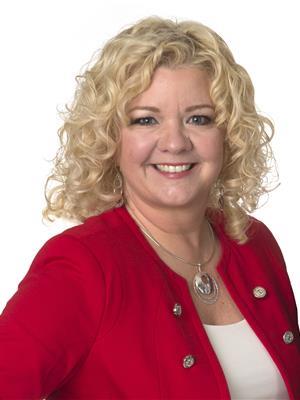 Ana introduced our speaker for today, Jackie Blakney. Ana met Jackie through BNI and became friends and business colleagues then introduced her to Rotary. Jackie is a real estate broker and has loved real estate since she was young. She bought her first house at the age of 18! Jackie served as a law clerk for 20 years in real estate, all the while raising two kids on her own. The last 15 years she has been selling real estate. People ask her why - she simply responds I had two kids and a mortgage to pay! Jackie had nine people working in her office. They sold 165 homes last year but she wanted to bring a more personal touch to her business, so she’s downsized to a team including her sister, her two sons and a full-time assistant located at Remax Finest on Gardiners Road. Jackie thought everyone wanted to know how real estate was managing during the Covid crisis. Several government bodies regulate real estate - new clauses are present in every offer. There is a chance that the registry office might be closed to process transactions and allowances are made for this. Interactions with people now mean masks, gloves, buyer and seller declarations, and acknowledgement of the risks of open houses. Although a lot is done virtually Jackie cautioned that buying a house totally over the Internet is not a good idea. When showing a home now sellers are asked to turn on the lights, leave the doors open, some of the cupboards open, and the perspective buyers are only allowed to touch the doorknobs which are cleaned often. Buyers even leave their shoes outside. Jackie also belongs to an organization of the top 100 Remax agents across Canada. They chat daily about ways to meet the challenges. She doesn’t listen to the news much but the phones are ringing, probably because Canadians are not good at being cooped up. We have withstood that for 30 to 45 days, but now people need to move and real estate is an essential service. Jackie continues to offer services like grocery delivery to senior clients - she has some clients in care homes and arranged for a delivery of chocolate recently to one of them. One of the great things is how we’re helping each other, and and she is actually enjoying spring for the first time in a long time because it’s usually her busiest season. She thinks there may be a surge coming - she has 20 listings ready to go and some people just can’t wait. There are still bidding wars although instead of ten bidders we now have two or three. Questions? John Farrow asked what is the status of the military? Jackie functions as a rental agent as well as a sales agent for military. Transactions that were already in process have been completed and the leaders are moving regardless of the Covid crisis. She said that the effect on the Kingston real estate market market is not as big as you think. John also asked the difference between a broker and an agent. Jackie responded after becoming an agent there is an education process to get to be a broker - you can then become our broker manager and a broker owner when you own real estate brokerage. Greg Mumford asked about her partner Tim? They are separate now. Jackie figures she has about 10 years left in real estate and it was a business decision to downsize. Bill Egnatoff asked if Jackie has mentored other agents? Jackie responded she mentors both clients and agents - she gives lots of new agents advice and they share forms and good ideas. She learns from her daily interactions with customers and shares them with her team. Real estate is full of problems and she learns every day how to handle those. Some day she will write a book about mushrooms, bats, and buried logs! Martin asked how does it affect your family time? Jackie said it’s tough when you’re a single mom - you need to learn to set time aside for yourself. She once had a seller call her on Christmas Eve but politely rebuffed them. She’s never worked on Easter, Thanksgiving or Christmas. Jackie is part of a large family which matters to her a lot - she shares this with her team and she tells her sons "don’t be like me"! Thanks for a great talk Jackie!
|
||||||||
Dr. Karen Lawford, Department of Gender Studies, Queen's University Karen’s background includes a B.Sc. in Sciences from Trent University and a Bachelor in Health Sciences specializing in midwifery. She went on to earn a M.A. and Ph.D. from the University of Ottawa. She is currently an Assistant Professor of Gender Studies at Queen’s. Her research interests are; maternity care on reserves, medical evacuation, Midwifery, Indigenous feminist theories and methodologies, Indigenous women and Two Spirit Leadership, Indigenous health and wellness, and health care. Karen loves finding a solution to a problem. She has investigated how health care systems work. Health care in Canada involves many levels of government…Federal, Provincial and Territorial systems, although most people are unaware of the Federal system. The Federal level of health care deals with the military, First Nations, penitentiaries and the RCMP. A lot of these jurisdictional divisions go back to 1867, and also to the Indian Act of 1876. This act allowed the government to have authority over all aspects of the lives of people on the reserves. They were unable to leave a reserve without a pass, and attendance at the residential schools was compulsory. If children were not sent there, the RCMP would come and get them. The reserves are on what is considered Crown land, and this means residents cannot own the land, or make money from it. The Indian Act also specified that they couldn’t sell crops grown on the land. This illustrates the power of the Indian Act. Some groups recently have taken the government to court, for things like the under funding of schools. Karen’s specific interest is health care. If you live on reserve then health care is federally provided. Each reserve has its own funding agreement. Care used to be provided by nurses, but some nursing stations are being closed, partly because there have been recent 40% cuts in funding. Karen showed us a map of Canada that showed the large number of tribal councils with different health care systems being managed by the Federal government. It looks like a logistical nightmare. All councils have different agreements with the Federal government. All of Canada is covered by some Aboriginal treaty, but Indigenous people are saying that health care isn’t a treaty right but rather a human right. Many treaties were signed under duress and in English which those signing didn’t understand. There are also four Inuit regions in Canada. Comprehensive land agreements there include health care. They cannot be negotiated any more even though the treaty was signed years ago, although there have been challenges to this now. Karen’s research during her M.A. found that in 1892 the government hired two obstetricians to deliver babies on reserves. Now there is an evacuation policy, which means that toward the end of her pregnancy a woman has to travel to a larger city to wait for labor and delivery. Astonishingly, this is still in effect. One of the women in her research in Manitoba had to fly out of her community to Norway House and await delivery. There is no prenatal education provided and no prenatal care. When a woman leaves her community to give birth there is no provision for a family member to accompany her. She is not allowed an escort. Another woman drove herself 1.5 hours to Winnipeg. Because it turned out that she wasn’t actually in labour, she had to make this trip three times. This was her first pregnancy. She did have prenatal care from a nurse on her reserve, and two weeks of post-partum care. If there had been a midwife on reserve she would have received the proper care most Canadian women have access to. There is also the difficulty of having different health care systems involved in their care, and there seems to be a communication problem between these two providers. Robert Reid thanked Karen with our traditional loaf of bread, and the hope that reconciliation will lead to better understanding. |
||||||||
Dr. Elaine Power, Head of Gender Studies, Queen's UniversityJohn Farrow introduced our guest speaker, Dr. Elaine Power, Department of Gender Studies, Queen’s University. Elaine's research areas are poverty, gender, equality, and how this all relates to food insecurity. John was searching for a speaker leading up to International Women's Day, and Dr. Power's research seemed a good fit for presenting to our club.  Dr. Power is actually part of the School of Kinesiology and Health Studies, and has only recently been chosen to also head up Gender Studies. In the School of K and H Studies, she taught a course on the social determinants of health. This has led to her current research. Elaine reminded us that our area is part of the “Dish With One Spoon Territory” - a wonderful metaphor that speaks of an Aboriginal treaty with the dish representing the earth and the spoon representing peace. What is Food Insecurity? How is it measured? What strategies do people use to deal with it? And what should we, who don't experience it, do to help? At it core, food insecurity is the feeling on not having sufficient money to be able to feed yourself or your family—not having enough money closely is connected with insufficient food, with serious health and welfare consequences. Food Insecurity is measured at household level, but experienced at the individual level, which is where gender enters the picture. Women will do almost anything to protect their children from hunger and will also sacrifice for their male partners in the same way. Food insecurity is measured country wide, but unfortunately not consistently. Provinces can opt out in Federal measurements of the issue, which means incomplete data to help analyze the problem. Surveys show there are 3 levels of food insecurity.
Elaine has also done recent research on Queen’s students experiencing food insecurity, which she described as heartbreaking, shocking, and it kept her up nights thinking about the issue. Surveys are conducted with target groups - there are different questions for adult and child surveys, and these questions are based over the experiences of the past year. The questions were developed out of focus groups with low-income families in the U.S. Data for Canada. 2012 was last national study, analysis from 2014.
Elaine showed how much money is left after rent is paid for those on Ontario Works, Full Time Minimum Wage, and Median Ontario Income. If your are on social assistance, it is almost impossible to pay the rent and buy decent food. Considered family of four and single person. Those on Ontario Works in Kingston actually can't even come close to the amount needed for food. Adding to the depth of her research, Elaine talked about the strategies people that experience food insecurity use to cope;
Also used are food strategies liking recipe stretching, cutting portion sizes or food groups, and as mentioned, women giving up food to make sure their children are fed. Elaine also showed us discussion notes from focus group of seniors who are coping with food insecurity. Many of these seniors had health problems, and coped with not enough food be sleeping more, drinking more water or tea, or smoking. These quotes really brought a more human face to the issue. What should society do? First off food banks are ineffective. Only 20% go to them and they aren’t enough. People who use food banks just stay food insecure. Increased income and secure employment are what is needed. The only effective response will be an effective poverty elimination strategy. |
||||||||
Easter Seals Launch - Nicole and Jessica LessiterOur speakers today were introduced by Elizabeth Cohoe. Todd Colborne of the Kingston Club joined Rotary 22 years ago and immediately joined the Easter Seals Committee. He has been involved in Easter Seals since that time. Special guests were an Easter Seals mother and daughter, Nicole and three year old Jessica Lessiter. Todd began with a slide presentation. We learned that Easter Seals was founded in 1922 by a group of Rotary Clubs in southern Ontario, and has now spread to all provinces. Money raised stays in the region where it was donated, based on postal codes. Easter Seals serves kids with physical disabilities. Easter Seals is approaching its 100-year celebration, and to celebrate, the Kingston Club is creating a campfire area for camp Merrywood for the centenary. Todd outlined the structure of Easter Seals and talked about the two camps in Ontario. Children served are under the age of 19, are permanent residents of Ontario, with a permanent disability that requires a assistive device. There are also post secondary scholarships available through Easter Seals. Families apply mostly because raising a child with a physical disability is very costly. The equipment is not only expensive, but also needs to be replaced as children grow. They may need multiple devices and this can cost up to $40,000 a year. Todd showed examples of how much these items can cost. It was also interesting to hear about Camp Merrywood, as the activities that are available are pretty typical of any children’s camp. This camp costs about $2,500 for a 10-day session. The kick off for this year’s campaign will be on Feb 20th 5-7 pm at Kingsbridge Retirement Centre. There will be TV segments over the next month. Team fundraising will take place as it has in past. Your business can support the effort with an ad. CKWS donates the cost of these adsto Easter Seals. Todd suggested that Rotary Clubs could do an ad, and there are sponsorship opportunities also available. There are also other local events throughout the year. This year’s pancake breakfast at Smitty’s is one of them. (Todd will send a link to a great video which will be circulated to all members.) Todd is assisting Jim Rymerson to set up our club team. Jim is team captain this year, thanks to him for volunteering! We can donate on the page he is setting up online, and we can also donate offline by cheque or credit card. Forms are available at club meetings. Nicole Lessiter talked about her and her husband’s experience being parents to Jessica who is three years old. Jessica was born with a very rare neurological condition called Pitt Hopkins Syndrome. It affects every muscle in her body. Symptoms include developmental delay, breathing apneas, seizures and reflux. At the age of three she is unable to walk, and some with this condition never do. She will be forever non-verbal, but it is possible for her to have a good life. They knew early that there was a problem but they had to wait for testing. They have been involved with Easter Seals since 2018. Having no benefits through employment, Easter Seals may be the only way to afford what Jessica needs. As funds are not unlimited though, they were advised in 2018 that money available had run out by August. In 2019 the funds ran out in July. Nicole talked about some of the special devices needed for Jessica and they are very expensive. For example, an appropriate walker would be $2,500. Her wheel chair was almost $6,000., and she will outgrow it. Parents try to find the money and only use Easter Seals as a last resort. Easter Seals gives parents $400 a year for diapers. The government doesn’t assist. Other needs include car seats, bed stairs and lifts. Parents try to conserve and share equipment as their children out grow things. That’s how they got their first $10,000., stroller. During Jessica’s first year, the cost for equipment, meds, and special food was $50,000. They have downsized their home twice in order to help make Jessica’s care affordable. The reason Nicole presented this information about cost was to emphasize that donations are really important. The link for Easter Seals Eastern Ontario is http://www.easterseals.org/contact-us/ontario-east-region/ Krista Leclair of the Kingston Club is the Senior Development Officer for the Kingston Area The link to Camp Merrywood is https://www.eastersealscamps.org/about/camp-merrywood Heather Nogrady thanked Todd and Nicole and presented our traditional loaf of bread to Nicole. |
||||||||
Steve Snyder, Queen's Golden Gaels Football Coach - "Dog Stamps and ABC's"John Farrow introduced our speaker Steven Snyder, Queen's Golden Gaels Head Football Coach. Steve is only the fifth coach in Queen’s football history (no pressure there), so there's the weight of history on him! Born in London, Ontario, Steve played football for St. Francis Xavier University in Nova Scotia, but returned to coach at Western University. John thanked Queen’s Alumni Magazine for reporting Steve's story, giving him the idea for the invite. Steve began by thanking us for the invitation. People only see the 'game face' of Queen's Football and don't realize that there is so much going on behind the scenes. There are 110 student athletes on the team – the staff recruited all of them, and purposely brought them to Queen’s. Queen's Football operates 365 days a year and the student athletes are committed to the team 6 days a week! There are also 13 coaches, 5 of whom are full-time paid employees, plus 3 team doctors, 2 physiotherapists, 2 videographers. 2 equipment managers and more. This means there aree over 125 people as part of the Queen's football family. Steve focuses heavily on team culture and coaching his assistant coaches – which is a different role for him from when he was one of the assistant coaches at Western. At 34 years old, Steve is the youngest university football head coach in Canada. The foundation of his philosophy and team is ‘reliability’. This translates to the ABC's: A-Always show up for your commitments, B-Be on time (early is on time), and C-Communicate (beforehand, if you can’t do A or B). If you live your life by the ABC's success will follow. Pride in a team comes from ownership – the greatest teams are formed when the teams themselves take the leadership role. In Steve's first team meeting the names of all the players were posted and the team members were asked to vote on the most reliable members – those 14 guys unite the team and drive the culture forward. Called the Unity Council – they have a direct role in what the team does. When Steve wants to institute a new protocol, they help him roll it out. Relationships are key and there must be broader connection than just football – even if football isn’t going well, Steve wants to have a healthy, positive connection through mentorship. To this end, Steve also developed the 'Gael for Life' program, which teaches life skills for success beyond football and Queen’s. The influence of a coach is so extensive in the lives of the players (Steve sees them more than their parents do) - why would they want to confine their world to 'just chasing a football'? The idea is to prepare people for life beyond football with life skills. The Unity Council helped to decide what life skills are most important to learn: networking, responsible social media use, home ownership, job interviews and resume building, basic financial literacy….. and the team was even taught handshaking! Can’t have a sub-par handshake! Steve believes that the players will be meeting many people over their careers and first impressions count. Steve says this is the most fun as he's ever had as a coach – for 6 days, 12 hours a day, the coaching staff interviewed every player in a mock job interview situation and then gave each other feedback. Then the staff shared top job interview questions to be prepared for when the players are in this situation again. All the players wanted to know when they could do this again! This led Steve to ask us to please consider our students for any summer employment opportunities you may know about. You will benefit from having a dedicated employee at your business. As part of the Gaels' commitment to Kingston, the team has a Community Engagement coach – team members participate in food bank fundraising (Tackle Hunger), autism mentorship, and are in the local schools several times a year. Steve says we have no professional football team, so the Gaels want to be the best team representing Kingston. The Gaels only play 8 regular season games in a year, and can only play a maximum of 13 if the go all the way, but we keep working every day for the balance of the year. There is no 'sitting on the couch' for these guys. Every day the work on conditioning, developing football skills, and preparing for that next game. Right now Steve and the coaches are in the recruiting phase. Each week they bring 4-6 student athletes to campus to check us out. This week there are 4 from British Columbia, next week students from Manitoba. We have 3 separate evaluations of each candidate’s potential : physical (in person or videotape of playing - the 'dog' stamp), academic (transcripts - the 'scholar' stamp), and most importantly, character – that’s where Steve comes in : will they contribute to the culture? Can we trust them? Will they be reliable? They snoop on them (social media), talk to their High School coach, visit the family home, high school etc. The team is looking for OKG's (Our Kinda Guy) for the final stamp – driven to graduate (can they succeed even without football); passionate about the ‘process’ of football (90% of what we do is preparation); respectful and responsible: you’re representing our team – we must treat everyone with respect. Our number 1 goal is to be the most respected team on campus and in the community. Our number 2 goal is to win the championship. Steve wants to build champions that can win us a championship. In closing, Steve talked about their marvelous stadium, and invited us to come out see a game (maybe a Rotary Day?). He also spoke briefly about his time playing professional football in Germany, where he met the women who would become his wife. Steve was thanked today for his presentation by Ed Thompson. Steve is an intense fellow who is should take the Gaels football team to new heights, and develop some amazing young adults in the process.  |
||||||||
Doug Townsend, Honourary RotarianPresident Ana Sutherland was pleased to induct Doug Townsend as an Honourary Rotarian this morning. Doug is a Charter Member of Cataraqui Rotary. 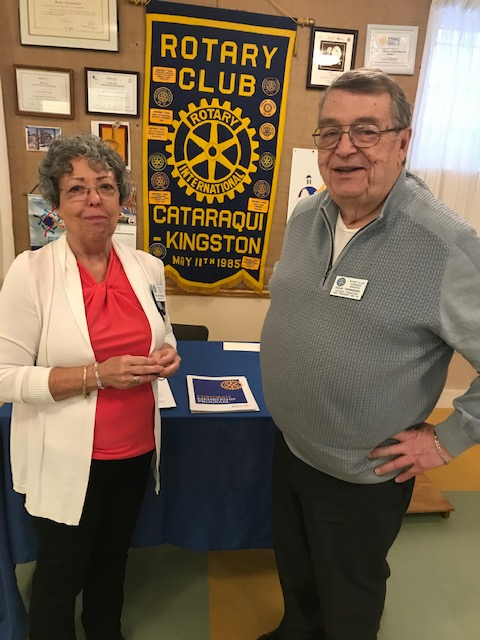 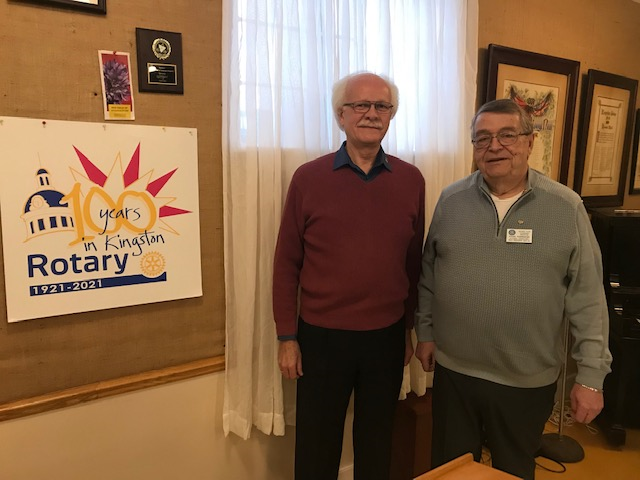 "Godfather" Fred Richmond with Doug In reflecting on his almost 35 years as a Rotarian, Doug told us that in 1985 the two Kingston clubs (Kingston and Kingston-Frontenac) realized that there was a need and room for another Rotary club in Kingston, and that the new club should be a breakfast club. On May 10th, 1985, The Rotary Club of Cataraqui-Kingston was chartered with 26 members, although the club had been meeting since April of that year. Membership has waxed and waned over the years, as has membership in many service clubs. Another significant event that Doug reflected on was the admission of women in to Rotary in 1987. Rotary was taken to the California Supreme Court where it was determined that it was a public organization, not a private club. Shortly after the decision Kingston and Cataraqui-Kingston admitted their first female members, much to the benefit of Rotary according to Doug. One practice that fell by the wayside was the telling of jokes to avoid a fine from the Fine Master, as the jokes were on the risque side. How far we have come! Initially our major source of funds was from bingo, and the club made many donations to local organizations, including major ones to KGH. Doug has been very involved with the local grants process over the past ten years, where his actuarial training has been invaluable in collating hundreds of grant applications into easy to handle summaries. Doug has also tracked the numbers and told us that we have handed out over $250,000 during the 10-year history of the present grants process (and $100,000 to International projects it was added). Being granted Honourary membership legitimizes his work on the Grants, annual Auction, and Rotary Centennial Project. Doug is honoured to be a member of Cataraqui Rotary.
|
||||||||
Leah Werry, The Nanny Angel NetworkJohn Farrow introduced Leah Werry, Kingston Champion for the Nanny Angel Network. Leah was drawn to the amazing work that the Nanny Angel Network (NAN for short) when she was introduced at a fundraising dinner in 2018. NAN is the only charity providing free in-home specialized child care to the children of mothers with cancer. Leah learned NAN was looking for its first satellite location, she recommended Kingston, and was recruited to be the Champion. The Kingston location began operations in 2019. In October 2019 Leah represented NAN at the Astellas Oncology Changing Cancer Care competition, which funds the most innovative non-medical ideas in cancer care. NAN took home the $100,000 US first prize, and Leah shared her winning pitch with us. When moms get sick, they choose between their own care and their children’s care. She had an experience of her food poisoning, but didn’t call for help! How many women with cancer, do the same thing, or don’t have anyone to call? Cancer treatment needs a dose of humanity for the whole family, especially if it’s the mom who has cancer. The Nanny Angel Network provides in-home child care, up to 4 hours per week. To date, the Network has helped over 800 families. The Network was filling a huge gap, but new needs emerged. Kids were not prepared to deal with the illness and sometimes the loss of their mothers. Stress from the situation shows in many serious ways, including acting out, and even suicide, and also affect health later in life. She shared her experience as a youth age 14 of her dad fighting for his life after a disastrous accident, and the complete loss of normalcy in family life. The Nanny Angels are carefully trained to provide regular support, offering some consistency in family life. Often families don’t have the remarkable community support that she experienced when her dad was injured. The Network provides kids with coping skills, attention, care, and an opportunity to laugh and let loose. She learned about the Nanny Angel Network serendipitously, through an invitation of one of her business clients to a gala. Soon she was volunteering to help set up a branch of the organization in Kingston. So far, since beginning in the summer of 2019, they have been helping 12 families. The organization was selected out of over 240 organizations around the world to receive a grant of $100,000USD. The need in Kingston is huge and the catchment area is large. The organization is in need of volunteers and in help in getting the word out about their services. Questions and Discussion Q: Talk about the camp? A: We haven’t set it up yet in Kingston, but hope to. Summer is often one of the most difficult times. We are looking for partners to help make a camp opportunity available for children. We help children up to age 16, Q: What about your event in February? A: February 5th, at the Sanctuary co-working space. We’ll provide you with more information. It’s an opportunity to learn about our services and opportunities for volunteering. Q: Did you create a TED talk? A: We are going to TED Med in Boston in the spring. Q: How to contact you? Charitable? Canada Helps? A: Web site, Yes, Yes Robert Reid, also at Sanctuary, thanked her, saying that moms are the most awesome people in the world. |
||||||||
Queen's Career Apprenticeship ProgramJohn Farrow introduced Tom Hewitt, Nour Mazloum, and Erica McIlquham this morning to give us an update on the Queen's Career Apprenticeship Program (QCAP). In the first year of the program Tom had come to speak to our club (about two years ago), so it was timely for them to come back and report on the results. Tom thanked us for the invitation and briefly spoke on his role as Chief Development Officer and his 30 years experience in fund raising for hospitals and universities. Tom also reviewed that there are too many arts graduates in Kingston leaving Queen's without meaningful work (and often a pile of debt). Arts graduates offer much to employers - critical thinking, communications skills, problem solving skills, flexibility, adaptability, and digital literacy. QCAP empowers firms in Kingston to hire and keep Queen's grads in Kingston by offering subsidies of up to $4,000 per month for the first four months of the first year of guaranteed employment. This comes from the largesse of Alan Rottenberg, father of a Queen's grad who invested some of his considerable fortune in a foundation to provide funds for the program. Alan sits on the advisory group with representatives from Queen's and KEDCO. 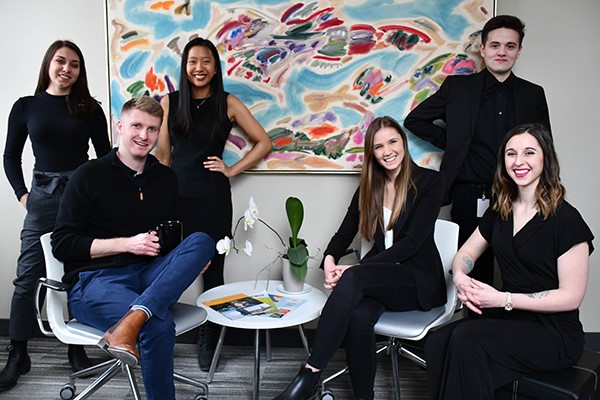 QCAP launched in 2018 with 10 students, then expanded to 20 in 2019. This year's ambitious goal is jobs for 40 students. Firms need to be at least 5 employees to qualify, and jobs should be posted by January 30th. Students have until February 13th to apply and following interviews and selection, students begin work in May. Results from the first two years are promising - 25 students have found permanent work, attracting $1 million in investment and generating $3 million in new payroll. All of it in Kingston, and all high quality jobs! Nour herself is a success story of QCAP - she secured a communications position with KEDCO and is enjoying her work there.  If you are interested in getting involved, think about how your business could benefit from a recent graduate as part of your workforce. Spread the word to prospective employers (deadline is January 30th). If you need more information, go toKingstonEcDev.com/QCAK, or email Nour at mazloum@kingstoncanada.com. One questions asked was what is the long-term future of the program? How long will it be funded. Mr. Rottenberg is looking to expand to other universities, and is approaching other philanthropists to help in the expansion. At some point Tom said perhaps the value will be seen and the subsidies may not even be necessary. Bill Egnatoff suggested there could possibly be a tie in with a new Rotaract Club. John Gales thanked our presenters for coming and updating us on this innovative and important program.
|
||||||||
The Machine Mavericks Robotics TeamJohn Farrow introduced Olivia, Charlotte, and Sara from the Machine Mavericks Robotics Team. Olivia reached out to Bill Egnatoff who suggested them as speakers. The Mavericks are a community High School Robotics team made up of students from 5 area schools who in their inaugural year made it to the world championships! The Mavericks compete as part of the FIRST ( For Inspiration and Recognition of Science and Technology ) Robotics Canada. At the high school level, teams of 10-50 students design, program and build a 125lb. robot. FIRST has 4 categories, starting with Lego robotics for kids as young as 6 years of age. The Machine Mavericks are 20 students from 5 different Kingston high schools and are 52% female in membership. They are unique as they are the only team with their own machine shop (6,000 square feet, with milling machines and plasma cutter), computer lab and practice field. They are getting lots of media coverage, even from The Agenda on TVO – particularly around their goal of gender parity in club membership. The Mavericks chose 50% instead of an all-female team because they want to reflect the reality of their future workplaces. The Mavericks were a bit discouraged after their first competition in Toronto, but did some redesign work and won their next competition in Windsor (failure and reworking a project is a big part of the learning process according to the girls). One success from the first competition was the awarding to the Mavericks of the Rookie Inspiration Award. They then went on to the provincial championships which they won, along with getting the Rookie All Star Award, and then went on to the world competition in Detroit, placing 30th out of 68 teams in their division. Detroit was a big deal - there were 400 teams from 37 countries! 47,000 people in total descended on the city for this competition. The competitions require the teams to design and build their robot, then the robot must play a 'game', negotiating obstacles and placing items like balls in a target. A new game comes out every year and they have just received details of the new game for this year. Outreach is a huge part of what the Mavericks do too. They have been involved in presenting to and working with younger kids' robotics teams, sponsoring international teams in Puerto Rico, and working to start a 'breakfast with bots' group in local schools. They have also created handouts on promoting diversity and teamwork. And they are gracious enough to let the other two area teams use their practice space. After several questions from members, Ed Thomson thanked the members of the team with the usual loaf of bread. Quite an impressive group of young people judging by their presentation. 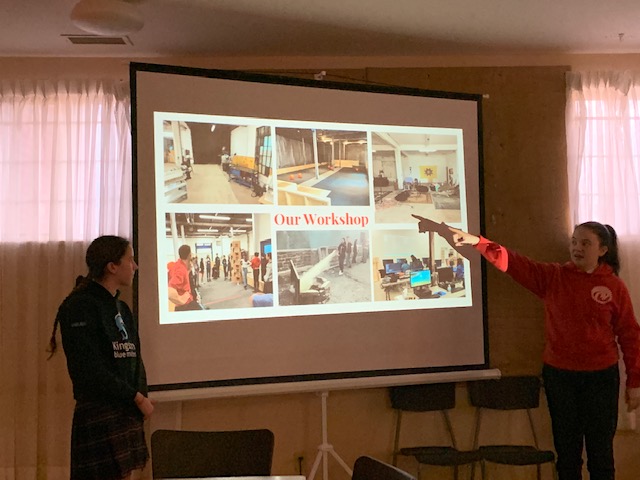 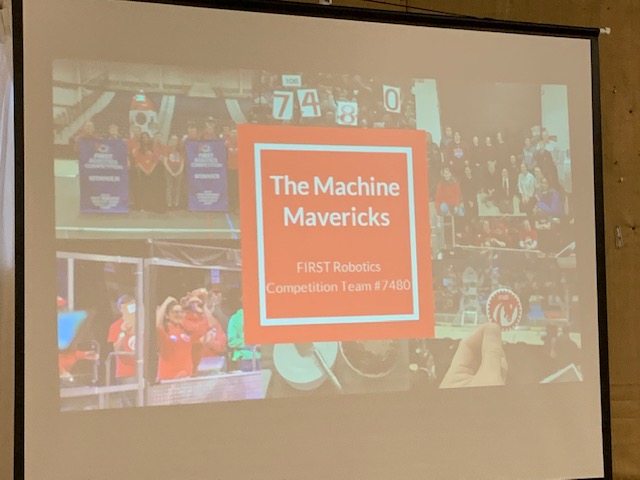 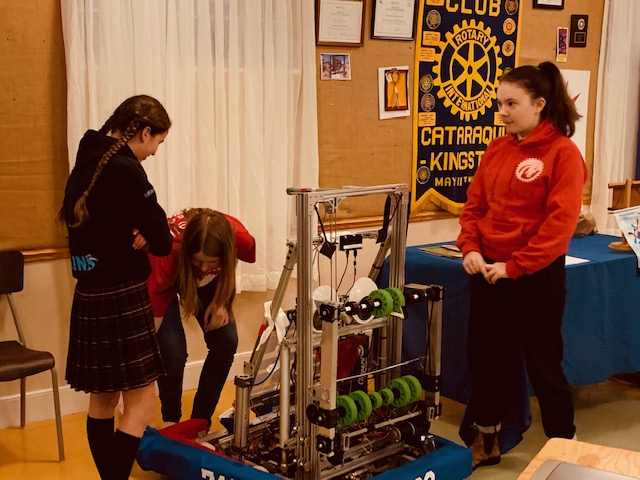 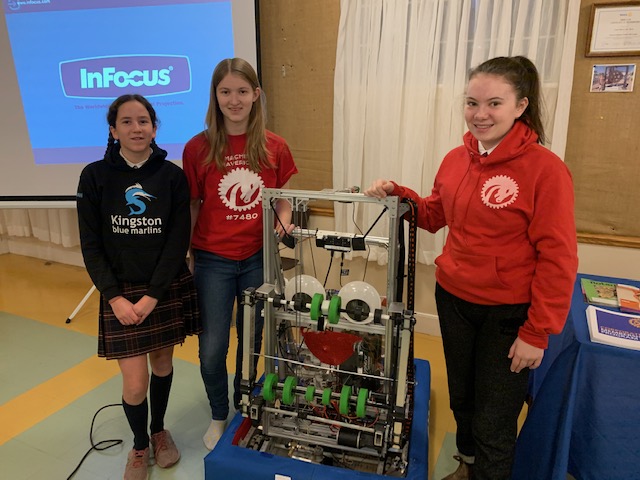 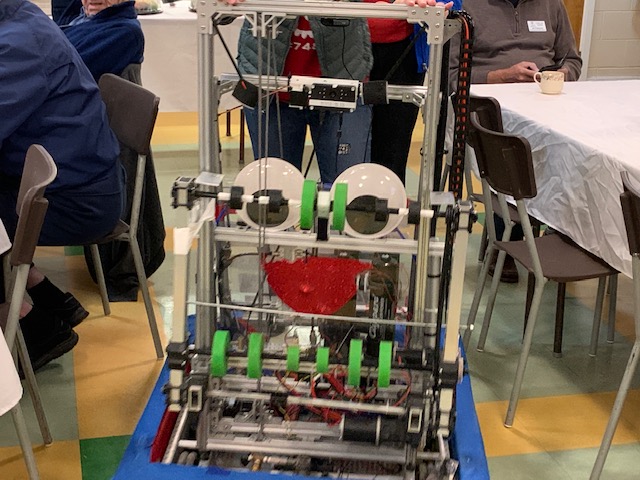 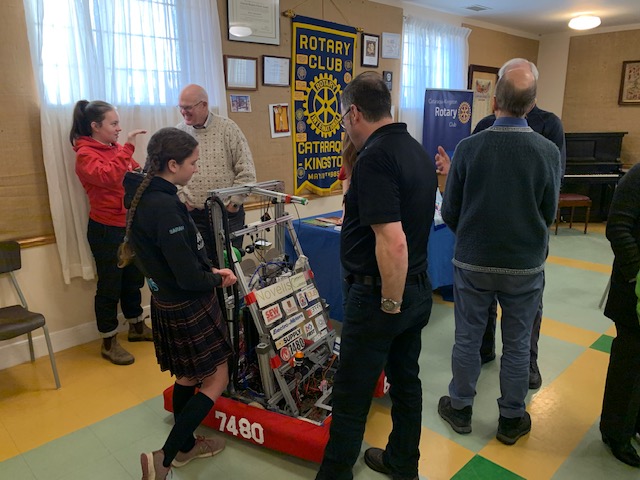 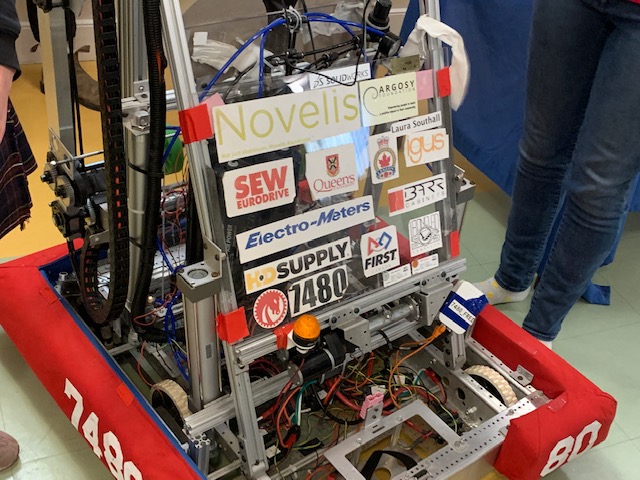 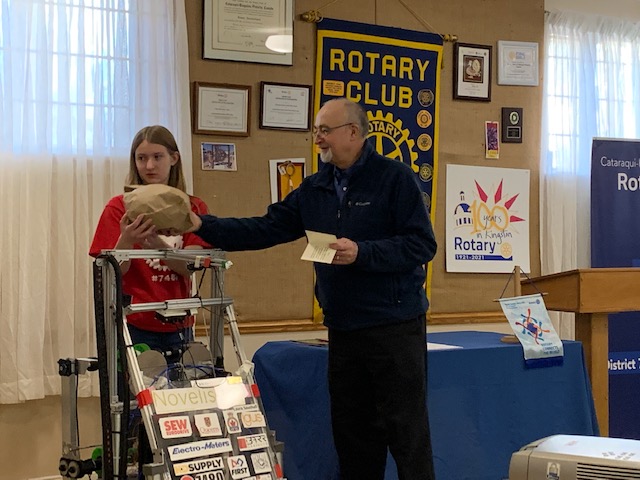 |
||||||||
Annual Holiday PartyLast Tuesday members and guests gathered at the Oddfellows Hall for Cataraqui Rotary's Annual Holiday Party. The Dr. Chris Alfano Jazz Trio provided jazzy seasonal music and the Oddfellows prepared a delicious turkey dinner. There was great conversation and a chance to catch up with spouses and significant others and share some holiday cheer. Thanks to Ana and Ron Pols for organizing this great event. Honourary Members Pat Brown and Arnold Lawrence visited. Fantastic Music! Rotarians - always colourful Martin and Cathy Thomas receive Paul Harris Society recognition The hard work for the evening is done! The proper pose for a framed Christmas hat photo. Fun was had by all. |
||||||||
Annual General Meeting of the ClubAna reviewed the board positions that need to be filled. There have been conversations with someone who may be interested in President Elect but this is not confirmed. Elections will take place at the December 17th meeting. Positions to fill, are: President Elect, Secretary, Director of Service Projects. Membership is also due for a changeover. Greg will carry forward one more year for Youth Service, while mentoring someone else to take over next year. Ana called for volunteers. There were no volunteers so some "persuasion" will have to take place. Ana will chair Membership if Rick Frasso doesn’t carry on for another year. Ana called for nominations from the floor and there were none at the time. Elizabeth described Director of Service Projects as not being onerous. It is mainly a job in which you organize and delegate, and find members willing to lead a project. You attend board meetings to report. There is one possible replacement but a further conversation is needed. Elizabeth will follow up. The Secretary records the board meeting minutes and also communicates with the District by inputting data for members. We don’t record attendance. Make ups no longer need to be within two weeks of a missed meeting, and can be any time during the Rotary year. We are a small club and for that we do phenomenal service. Ana urged people to come forward to participate in the running of the club. We will bring this back on December 17th when elections will take place. Treasurer’s Report: Rick gave us a clear picture of where the club stands financially at the moment. He is pleased to announced that we have been able to get our records caught up due to hiring a bookkeeper. Missing pieces of information have been found. This will all be presented to the board next week. All of the information that Rick presented is available on Club Runner, and Rick urged members to go there. Go to the members only area and you will be on the Admin page, click on view club documents. The CK Rotary Financial Statements are there. Choose which document you want to view and note any questions you may have. Rick explained carry overs from last year. The new meeting venue has improved our finances in that regard, and he thanked Ana for finding it. The Friendship Exchange is not a separate committee. $6K is still there from trip to India and it will be used for the Indian visit here. No club funds go into the Friendship Exchange. We will have Australians here in June 2021. Auction: Currently no money has been transferred from Pay Pal. We do that when all the payments have been made. We expect about $40K to be the bottom line. Bingo will probably bring in about $20K this year. With calendars and nut drive we may have another $2K for next year. The Auction down about $7K from last year. Mostly sponsorships were down. We need to work on this next year, and although Murray Cotton did a great job of getting sponsors, we need everyone’s influence there. Not just Murray. Local Projects has around $10K left for spring grants if the committee decides to accept proposals at that time. The Tipi Moza project and Martha’s Table were split with the National Committee. International Projects has about $2,000US not committed. The Pathways project is included under International because a global grant has been applied for. That money ($15K) was transferred to International. You can make donation to this K2021 project through The Rotary Foundation. The project needs to have a global grant number first in order to do that. John Farrow (Foundation Chair) will send out an email to members about this. We can also put donations through the Kingston club and get receipt. If project is not approved you can reverse it or put into a different project. If you really want tax receipt for this year you can do it that way but the Kingston Club will get the Foundation credit. The preferred method is to go through the Foundation after the Pathways project gets assigned a project number. National Projects: Currently there is about $4K unspent. National includes our bursary at SLC. Number 9 gardens is a 2021 project. The most recent project supported was explained by Elizabeth. Dark Spark uses song writing, recording of pop songs storytelling to empower youth to reduce prejudice and promote cross-cultural understanding. Their current project is taking place on Tyendinaga this week. Youth Service: Adventures in history cost about $28. Bill Egnatoff did a great job getting local businesses to make donations in kind to keep the cost down. Foundation Committee has about $300 left in their budget. Club Administration is somewhat intertwined with Membership. There is a negative situation in Club admin but a surplus in Membership. The General Account overall surplus is about $1,400. We need 20 members at meetings to break even. Today there were 15. This is being balanced with 50:50 and happy bucks. Ana orders breakfasts for 20. The Mermaid Avenue Sandwich Factory caters and they are aware that we take our leftovers to Lunch by George. For this reason, they have been sending extra. This also is a buffer if have extra guests. The venue costs us $50. If you are upgrading your laptop, the club could use a new laptop, and John Farrow can arrange to scrub the hard drive. Please go to Club Runner to view the details of what has been reported. Rick would like to end the Rotary year with a $2K surplus in general account. Rick is doing a great job as treasurer and an appropriate applause followed his presentation. |
||||||||
Community Paul Harris AwardsJohn Farrow and Bernie led the event. John began, noting that today is one of our most amazing days, when we award community members for their contributions. He pointed out that as we confer this award on people in our community it is really fitting with the theme for this Rotary year. “Rotary Connects the World”. John felt that having this week back to back with awarding grants to some local community organizations was fitting. Today we recognize a number of people who have done great work in our community. The Paul Harris recognition comes as a result of our club’s donations to The Rotary Foundation. Arch Klumph’s idea for an endowment fund dedicated to “doing good in the world” planted the seed of The Rotary Foundation in 1917 with an initial donation of $26.50. Thanks to his vision and staunch advocacy, and the extraordinary generosity of Rotary members worldwide, that fund has become one of the world’s leading humanitarian foundations. Just over 100 years later, in 2018, the Foundation handed out over $86 million US to various projects. The Rotary Foundation is one of the highest rated charities, with about 92% of donations going to programs. In 1957 the Paul Harris recognition was developed. Rotary established the recognition in 1957 to encourage and show appreciation for substantial contributions to what was then the Foundation’s only program, Rotary Foundation Fellowships for Advanced Study, the precursor to Ambassadorial Scholarships. In 1965 TRF started the matching grants program and we have applied for a global grant for our Pathways project. The Foundation also funds the fight against polio. It is said that this has been the largest non military effort in world history. The Paul Harris Fellow recognition acknowledges individuals who have contributions made in their name, of $1,000 to The Rotary Foundation. At the International Assembly in 1979, incoming RI President James Bomar challenged each Rotary club to make one non-Rotarian a Paul Harris Fellow. The Rotary Club of Pikesville, Maryland, USA, responded by making a donation in the name of Mother Teresa in 1980. The entertainer Pearl Bailey also became a Paul Harris Fellow through a joint effort of the Rotary clubs in Cape Cod, Massachusetts. Many other notable figures have been named Paul Harris Fellows, including U.S. President Jimmy Carter, Russian President Boris Yeltsin, U.S. astronaut James Lovell, UN Secretary-General Javier Perez de Cuellar, and polio vaccine developer Jonas Salk. Our Club's contributions allow us to name worthy individuals as Paul Harris Fellow, so not only is the award an honour, but also helps with Rotary programs around the world. Locally, people like Vicki Keith, Jayna Hefford, and the members of The Tragically Hip are notable Paul Harris Fellows. The Recipients: Sydney-Jane McCarson was introduced by Bill Egnatoff. Bill met sixteen year old Sydney when she applied to Adventures in History, and as she participated in the program, Bill felt that she is a leader in the making. She is heavily involved in serving her school community and in advocating for the rights of individuals who are subject to discrimination and disrespect. She is also very interested in the proper care of animals, as seen through her work with the SPCA. Her participation in Adventures in History was exemplary. Her questions and comments were always thoughtful and thought-provoking. She was great at welcoming other participants to Kingston, and at two free-time opportunities, she offered tours around City Hall and Macdonald Park. In her own feedback about attending Adventures in History, she wrote about what needs to be fixed in the Canadian youth justice system. At the program she took over hospitality to others. Welcoming others who had never been to Kingston before. She is active in school life and the Student Council. She started a petition on Change.org due to her concern about gender violence. Rick Frasso nominated Brad Revell. Brad grew up in Kingston and attended Frontenac Secondary School, then North Carolina State University on a golf scholarship. After that he played golf professionally for four years and was a member of the PGA tour for two years. Of note is how he donated a portion of his golf winnings to cancer research in memory of his brother. Brad currently works in sales at his family’s Ford/Lincoln dealership in Verona. Brad has been co-chair of 100 Men Who Care, Kingston since 2015 and has helped raise close to $200,000 for local charities. Members of this organization meet four times a year, and each donates $100 at those meetings. The result is that they raise $40,000.00 every year that goes to worthy causes in Kingston. In April of 2018, Brad along with Jeff Stafford rallied our community to attend the first ever Lionhearts Gala. Lionhearts Inc., is a charity that is fully local to Kingston. Lionhearts Inc. works to support the Kingston community in three specific ways: reclaiming surplus food from stores and restaurants that would otherwise go to waste and redistributing it to assist people facing food scarcity; hosting The Embassy, Live Music Cafe Kingston, a dry music venue for anyone who wants to hear great live music, including those who struggle with addictions; and leading F.A.S.T. Fight Against Sex Trafficking. Funds raised at the gala event allowed for the purchase of a van to be used in food redistribution in the Kingston area. Ana Sutherland nominated Dr. Joe Reid. Joe completed a pre-medical honors degree from Queen’s University, a Doctor of Chiropractic degree from Palmer College of Chiropractic in California, and a Bachelor of Education from Queen’s. He also completed Firefighter levels 1 and 2 from the southwest Fire Academy. He currently uses all of his earned degrees. He operates his own chiropractic clinic, New Vision Chiropractic, and is a substitute science teacher with the Limestone District School Board. He is a volunteer firefighter with the Napanee Fire Department and now Kingston Fire and Rescue. Joe’s notable accomplishments are raising money through running “crazy” marathons. He ran the Scotiabank Toronto Waterfront Marathon in full firefighter gear, raising money for the neonatal intensive care unit (NICU) at Kingston General Hospital. This was a cause near and dear to his heart, because four years prior to that, his wife gave birth to twin girls who were 16 weeks premature. They spent three and a half months receiving care in the NICU. In 2017, Joe has raised more than $5,000 for the Downie Wenjack Fund which aims to build cultural understanding and create paths toward reconciliation between indigenous and non-indigenous people. He did this by running the same marathon dressed as the late Tragically Hip frontman, Gord Downie, complete with a Jaws T-shirt, tinfoil pants, and a top hat adorned with a black feather, and an acoustic guitar strapped on his back. Not just your average Joe. John Farrow introduced Steve and Katie Koopman, nominated by Amanda Stolk. When we publicized our looking for Paul Harris recognitions on our Facebook page, Amanda Stolk responded that she would like to nominate Steve and Katie Koopman. Steve and Katie are a team. Steve is communications officer for the Kingston Police. The Coopmans also own a wedding photo business. They have been honored with the YMCA peace medal for the work that they do. Katie and Steve Koopman’s journey of reconciliation began when they fell in love with the story of the Rez Girls 64 Wolves hockey team. The Rez Girls are from Eabametoong First Nation – also known as Fort Hope, a fly-in community 360 kms north of Thunder Bay. In 2016 the girls were at a disadvantage with no equipment and a lack of facilities to practice; nevertheless, with a committed coach, the team overcame these obstacles and pressed on. A Markham high school student collected and shipped equipment north to Fort Hope allowing the team to dream of attending their first tournament Thunder Bay. It was at this tournament that the team and coaches experienced overt racism. This story was first aired on CBC's The Doc Project in 2017. The radio program ended by sharing with the listening audience that the team hoped to attend a tournament in Ottawa in 2018, but it was going to take $100K to get there. Inspired by Gord Downie’s call to reconciliaction, Katie and Steve reached out to the coaching staff and offered to photograph the team’s adventure in Ottawa. And this is where their relationship with Fort Hope began. In addition to photography, Katie and Steve invited the Kingston community to help alleviate the team’s costs by fundraising for the team to attend a Senators’ hockey game. In addition to monetary gifts, people donated muffins, gift cards and snacks. Knowing that the majority of Canadians have never visited a northern Indigenous community, two months after the Ottawa tournament Katie and Steve brought their slideshow of photos and tangible gifts to the girls and parents, and spent a week visiting with the community and volunteering. Since that trip a year and a half ago, Katie and Steve raised $90,000 to help the community purchase cement for a proper pad in Fort Hope’s arena. This attracted the attention and support of David Sharpe, a Queen’s Law alumni and businessman from Tyendinaga, MP Charlie Angus and the Toronto Maple Leaf’s Mitch Marner. Just last March Katie and Steve rallied the Kingston community again to help fund the Rez Girls travel costs to attend the Kids For Kids hockey tournament. In May 2019, Katie and Steve returned to Fort Hope with cameras to teach photography skills to grade nine students, in an effort to help student celebrate their community through the lens. Two gallery showings of the students’ photographic art work were achieved – one up north and one at the Tett Centre here in Kingston. The Koopmans hosted a Reconciliation Walk at the Little Cataraqui Conservation Area at the end of September and continue to walk in a spirit of good ally-ship, having created The Good Ally Project, an initiative of True North Aid, a non-indigenous non-profit charitable organization that offers humanitarian aid to Indigenous communities across Canada. Friends and kind strangers continue to inquire as to how they can help and what is next. This husband and wife team can only hope that the momentum that started with a little hockey team from northern Ontario continues. Both use social media to help advance the cause while also promoting other projects such as The Special Olympics. John closed by acknowledging Amanda Stolk for all the things she makes possible through her association with True North Aid. ) Left to right; Katie Koopman, Sydney-Jane McCarson, Steve Koopman, Dr. Joe Reid, Brad Revell |
||||||||
Melos Choir and Period Instruments C-KR Grant November 2019Melos Choir and Period Instruments
Grant Amount: $3,884The OrganizationMelos Choir and Period Instruments performs Early Music (12th - 18th c) using historically informed period performance practices and instruments, develops local skilled singers and instrumentalists of all ages and abilities to tackle challenging and rarely heard music, and is an educational resource for early music within the community for both adults and youth. The Work Supported by the GrantThe grant enables Melos’ Artistic Director, Holly Gwynne-Timothy, to continue to offer clients of Cancer Centre of Southeastern Ontario free weekly functional vocal sessions. Side effects of cancer treatments, including surgeries, often inhibit patients' proper vocal functioning. Patients experience weakness, phlegm, and inefficient breathing, causing frustration in speech and singing. Some patients have lung removal or significant throat surgeries, creating chronic difficulties and discomfort in breathing and speech. Holly uses Cornelius Reid's functional vocal methods to alleviate damage by relaxing throat constriction, strengthening vocal muscles, and restoring vocal reflexes. Andrea Gerhardt of Music can Heal, Toronto, shares the work with Holly and brings insight into chant and music therapy.
Once vocal and respiratory function has improved, participants begin singing as a group, and are given the option of performing in Melos' Christmas concert, “In Dulci Jubilo”. While participants will rehearse and perform with us publicly, they will not be identified as "cancer patients" but as “Holly's students from her vocal rehab class.” |
||||||||
H'Art Centre of Smiles C-KR Grant November 2019H'Art Centre of Smiles
Grant Amount: $1,700The OrganizationH'Art Centre is a not-for-profit, charitable, inclusive community arts hub that provides adults with disabilities and people facing barriers with the opportunity to create, study, and produce works in the arts and to collaborate with professional artists throughout their lives and as they age. The BOX is H'Art Centre's accessible performing arts space that provides opportunities for those facing barriers to participation in the arts with the opportunity to take part in inclusive performing arts performances. The Rotary Club of Cataraqui-Kingston has provided support in the past for resource improvements to The BOX as well as for special programs. H'art Centre's Able Artists program provides an ongoing series of facilitated workshops and performances led by professional artists with disabilities and leaders in the inclusive arts field. MixAbilities is H'Art Centre's new inclusive arts training program designed to help local artists/educators develop skills and confidence as inclusive artists/educators. The Work Supported by the GrantThe grant will help to further upgrade The BOX technology that will help to make all the performances more accessible to all members of the community who come to the H'Art Centre. Having a portable screen and short-throw, rear projector will make it possible to use projection flexibly in a variety of configurations. The funding will also enable use of the projector and portable screen for H'Art's 2020 production at The Isabel, an advanced, entirely original theatre production involving all 50 participants as well as our artists and choreographers from across the province and Quebec.
|
||||||||
Loving Spoonful C-KR Grant November 2019Loving Spoonful
Grant Amount: $2,250The OrganizationLoving Spoonful connects people with good food across Kingston & Area. Working toward a healthier, more connected community, Loving Spoonful provides programs and champions policies affecting food security, poverty, social inclusion, and community health. The Rotary Club of Cataraqui-Kingston has provided grants in the past for production of a "Where to Find Good Food in Kingston & Area" brochure, supplies for the GROW project that supports community gardens and gardening education in schools, and supplies for fresh food delivery. Volunteers also help with food delivery. One of Loving Spoonful's many programs is the Open Kitchens program, which serves people with low incomes and/or experiencing poverty, particularly in the Rideau Heights neighbourhood. Recruitment for participants and the program itself happens there. People attending learn new healthy food skills, meet others, make connections and friendships, and try and enjoy new healthy foods. Weekly community kitchens workshops are hosted by Loving Spoonful's Community Kitchens Coordinator, professional chef Tibratā Gillies, with leadership encouraged from participants. New recipes are shared, new skills learned, and healthy meals are made to share and to take home to eat with families. The Work Supported by the GrantThe grant will provide food for the Open Kitchens workshops. Free kitchen space at the Rideau Heights Community Centre keeps costs low. The workshops run from April to December 2020. This allows people time to hear about the program, try it out, and find a safe community. Each of these steps take time for each participant to explore. |
||||||||
The Mess Studio C-KR Grant November 2019The Mess Studio
Grant Amount: $2,500The OrganizationThe Mess Studio offers provides opportunity for people to come, connect, and create art in a non-threatening atmosphere of love and acceptance. Bringing a diverse community together, The Mess aims to build relationships through art. Through community building, it strives to empower others to make healthier life choices. The Mess welcomes anyone who is interested in creating art and connecting with others. It operates in the lower hall of St. Andrew's Presbyterian Church, Tuesdays, Wednesdays, and Thursdays, 10 a.m. to 2 p.m. The Mess began in 2009 and now includes a pottery studio. The Rotary Club of Cataraqui-Kingston has been a supporter for eight years. All people who participate in The Mess activities are members. In addition to creating art, they help with running the program including refreshments and meals. The Mess provides opportunities to learn new skills, which contributes to healing lives that have been broken down. "Getting Messy" at The Mess restores dignity, self-reliance, confidence, and self-worth. The Work Supported by the GrantThe grant will help to continue to strengthen the pottery program, including cost of firing, which is done off-site. New to the program will be a series of three two-hour instructional classes for up to six of the community members, provided by Amaranth Stoneware. The sessions will provide much-needed knowledge that will ensure the continued success of the pottery studio. Amaranth has recently asked to display in one of their stores the work of one of The Mess members. |
||||||||
Lunch by George C-KR Grant November 2019Lunch by George
Grant Amount: $2,000The OrganizationLunch by George is a social centre welcoming people of any background who need a comfortable place, warm in the winter, and food. People who are in desperate need, including the hundreds of homeless people in Kingston, can come in and relax a little. Lunch by George opens every weekday at 9 a.m., with coffee and snacks. There are moveable seats which is really important to people. Some people read newspapers; some play cards; some talk; and some just sit and think. There’s a clothes rack with warm clothes. There are also personal supply items available. At 10 a.m., soup is served. At 11 a.m., there is a nutritious hot meal. The food is prepared by coordinator Jenny Hurd, assisted by 30 volunteers. A huge feed is offered at Christmas, which Rotarians help to support. The program has been going since 1985, serving an average of 40 meals a day plus soups. Often 70 to 80 people come, and those numbers have been increasing. The Work Supported by the GrantBecause more people are coming than in the past, donations of food are not keeping up with the need. The grant will go towards food purchase.
|
||||||||
Pathways to Education C-KR Grant November 2019Pathways to Education
Grant Amount: $3,735The OrganizationPathways to Education empowers high-school-aged youth who live in Rideau Heights and Inner Harbour Neighbourhoods. Youth in their program are working towards graduating from high school with the goal of attending post-secondary education, securing meaningful employment, or entering a skilled trade. Pathways currently serves 350 students and supports close to 300 program alumni. The Work Supported by the GrantDrawing on a 2018 program evaluation, Pathways will expand its catchment area to work with students In Grade 7 & 8 from feeder schools. A Facilitator of Group Mentoring will work at Molly Brant and St. Francis schools twice a week, teaching an experiential learning curriculum and building strong relationships. The grant will provide food, transportation, and materials for the program. Forty students will benefit from this program expansion. The second use of the grant will be a program called Pathways Academy, for students to develop hard and soft skills to make their way in the world. The program includes field trips and exploration of employment. The funding will be used for an outdoors club, where students will learn how to be active in nature and to care for themselves.
|
||||||||
Judy Bierma and Anthony Gifford, Kingston and Area Shared Seniors Alternative LivingJohn Farrow introduced our guest speakers, Judy Bierma and Anthony Gifford. John remarked that has been looking forward to this topic because he has two adult children still living at home! Anthony and Judy emailed the club through our website asking to come and talk about their alternative housing arrangement, as they would like to talk to organizations like ours to promote a new way to look and co-operative housing. Judy and Anthony lived on a boat for 13 years. When they came off the boat and wondered what to do next, they came up with the idea of sharing a house with other people like themselves. They are now sharing a five bedroom house with two other people (and looking for another housemate). They started with a good friend who came here from out west. One bedroom might be kept empty and may be used in the future for guests. They are doing this for financial reasons - average pensioner income is going down, while housing costs are going up, and assisted living is very expensive. In assisted living, people can't help each other with daily tasks because of liability. Judy and Anthony were looking not only for financial assistance, they want the social interaction shared housing provides. Statistics indicate that people living together call 911 and visit emergency rooms much less. Loneliness is biggest health problem for seniors. They each staked $70,000 for the down payment and per bedroom cost is $600 a month . Filling the house isn’t a problem, there is a waiting list. Anthony was here to promote the model, not their house, because they are full now. Benefits include a lower cost to the city than for subsidized housing, and a lower carbon footprint. A significant portion of greenhouse gasses are produce by home heating, so full houses are more environmentally friendly. The house also only has two cars for 5 people. He and Judy wouldn’t have likely planted a garden but with a group it turned into fun and it added to their food. He believes they create a smaller carbon footprint. Down side? Of course you step on each others toes from time to time, but you are in control and have more freedom. Acceptance of the model is a challenge, because our society today isn’t big on sharing. Anthony wrote a book called “Dare to Share” to talk about our need to learn to share more in our society. 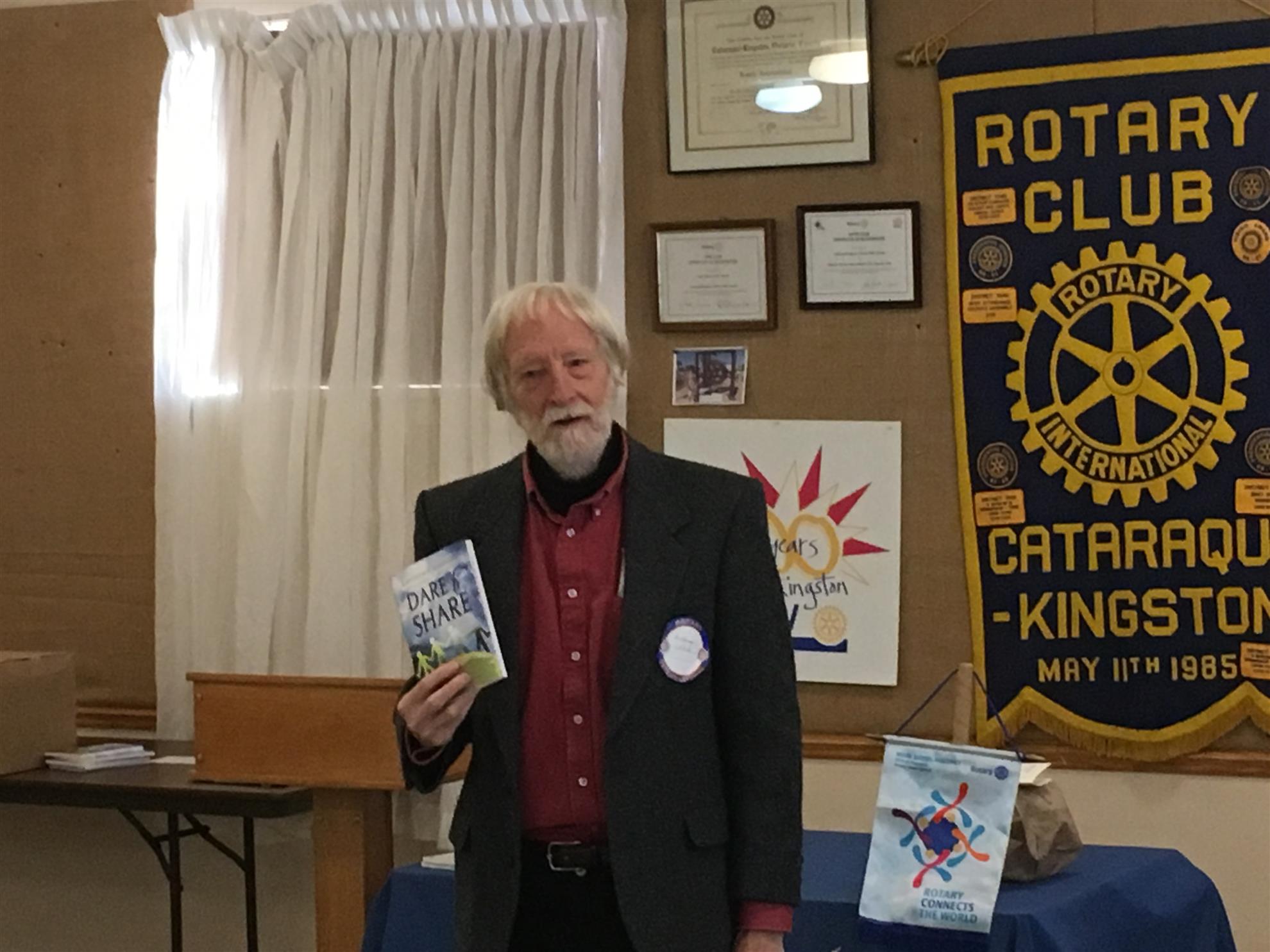 Judy and Anthony are making their house a non-profit model but other models are possible, like should we allow or not allow pets? Compared to what it costs the city for affordable housing, Judy and Anthony's model seems pretty appealing. . Questions. Who owns the house? There are different ways of dividing ownership. Presently they are “landlords”. Are there issues with inspections? Run as single-family place so no tenant - landlord dynamic. Do people sign agreements? No. People can be "voted off the island". They ease people in, beginning with a short visit and extending to overnight etc. They have a waiting list. Robert Reid thanked our speakers with our traditional loaf of bread. 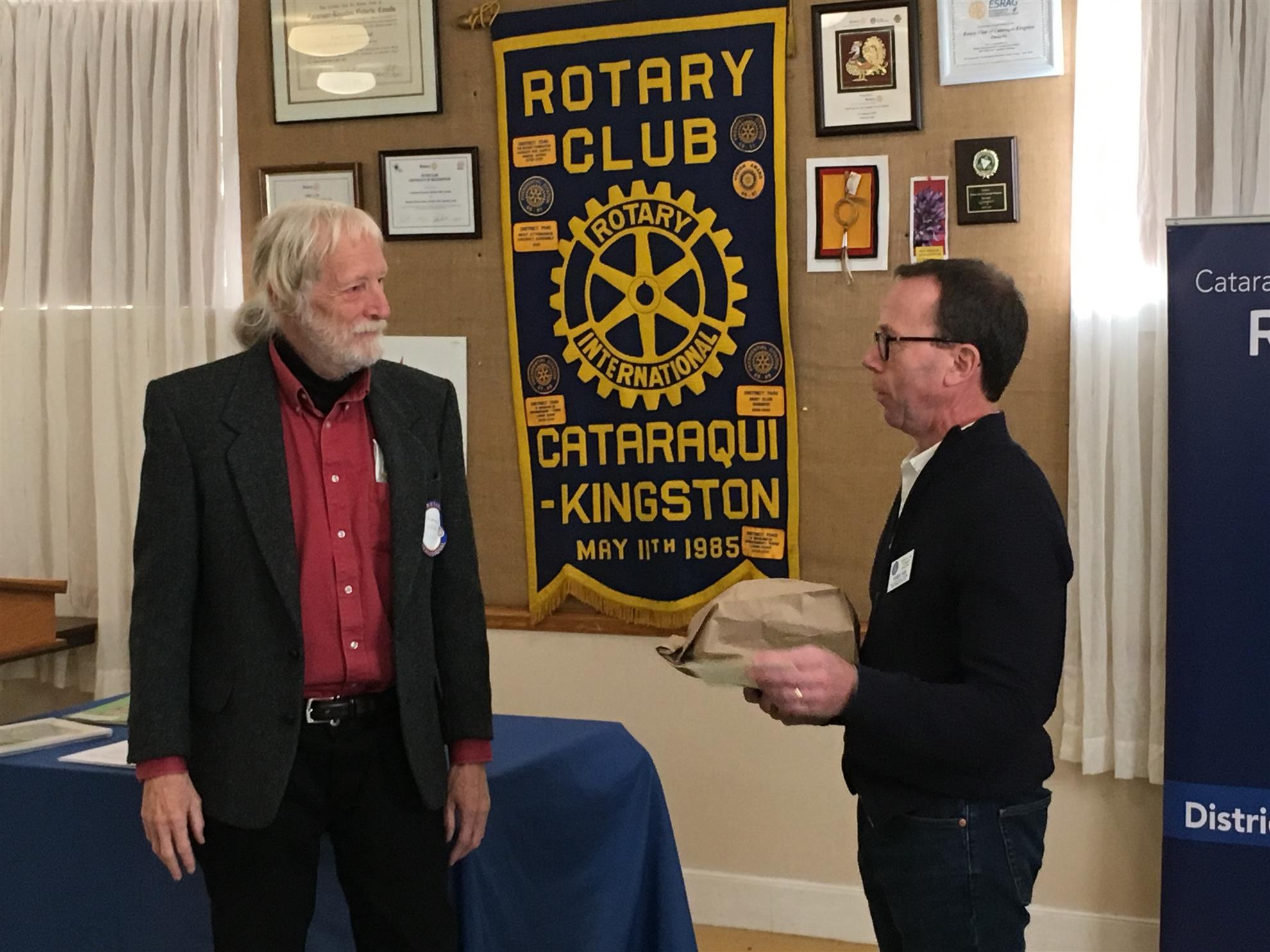 |
||||||||
Paul Van Nest - My Tour of Bomber Command in England - Remembrance Day MeetingJohn Farrow introduced our guest speaker Paul Van Nest, who is a keen student of history. His latest trip was to England to visit sites related to Bomber Command. Hearing about this is a natural fit as our Remembrance Day meeting. The tour started on October 1st. This was Paul's fifth tour with leader Ted Barris, former CBC Radio personality. Many don’t know much about WW2 other than what they've seen war movies. One should also know about the tremendous loss of civilians as well as military. For Bomber Command the losses were appalling. Over 55 thousand died, which was 44% of those involved as Bomber Command Airmen. Also, 8,500 were wounded. Paul showed us sobering statistics about killed and wounded and captured as prisoners, which equalled 60% casualties. You have to go back to the American Civil War to see these kind of casualty statistics Bomber Command was a group name that included Britain (RAF), Canada (RCAF), Australia, New Zealand and South African troops. One in five of dead were Canadians. Paul told us about the aircraft used for speed and bomb capacity. Crew on each aircraft was 7 and he showed us photos of aircraft and crew. Paul talked to a survivor who was tail gunner. This man talked about his experience and said that your crew were your friends. Outside of that they didn’t know if they would ever see them again. The man had a unshakable belief in his pilot. More photos showed us where the crew were located in aircraft, both Halifax and Lancaster. Yorkshire, Lincolnshire both had a large number of airfields because they were a long way away from action in France and London. Only a few German bombers flew into that region. By August 1940, Fighter Command was almost on its knees. To relieve the pressure, the British sent 81 bombers to Berlin, and that was followed by Germany retaliating by bombing London. By 15th September bombing of London escalated, including night attacks. These were all parts of the famous Battle of Britain. By 1942, Arthur Harris (aka Butcher Harris or Bomber Harris, depending on your point of view), was appointed as commander in chief of Bomber Command and they went on the offensive. Civilians really suffered in England and Germany from the bombing campaigns - the English bombing campaign was very controversial, and not commemorated in England until 2012. Paul, with the group, toured airfields and museums, where they could still see things like control towers. He was in one that was set up as a museum as it was during the war. Also, as part of the museum, you could see taxiways, bombs and Lancaster aircraft. Paul explained the difference between a Lancaster and a Halifax. There are no Halifax aircraft left flying, and only a couple of Lancasters.   Paul showed photos of aircraft interiors showing where the crew had to be for 8 – 10 hours in minus 40 degree weather. Planes were vulnerable from rear and underneath, hence the need for a tail gunner. He described a bit of what a tail gunner had to endure, and told us some couldn’t bail out fast enough because of where they were in the aircraft. Soldier ingenuity helped save some airmen from poor aircraft design quirks. Paul also spoke about a family member who was involved and was killed on a bombing mission. He showed us photographs of his cousin and recalled with sadness the last time they were together Paul met with another family member and he now has letters home from from his cousin. This will be the start of some serious research for Paul. He spoke about what it was like to see memorabilia and news items. Paul saw his cousin's grave marker in Germany several years ago. He finds these memories to be intense. He found a cousin in remembrance books in England. Following the presentation, a minute of silence was observed. Jim Rymerson thanked Paul with the traditional loaf of bread. 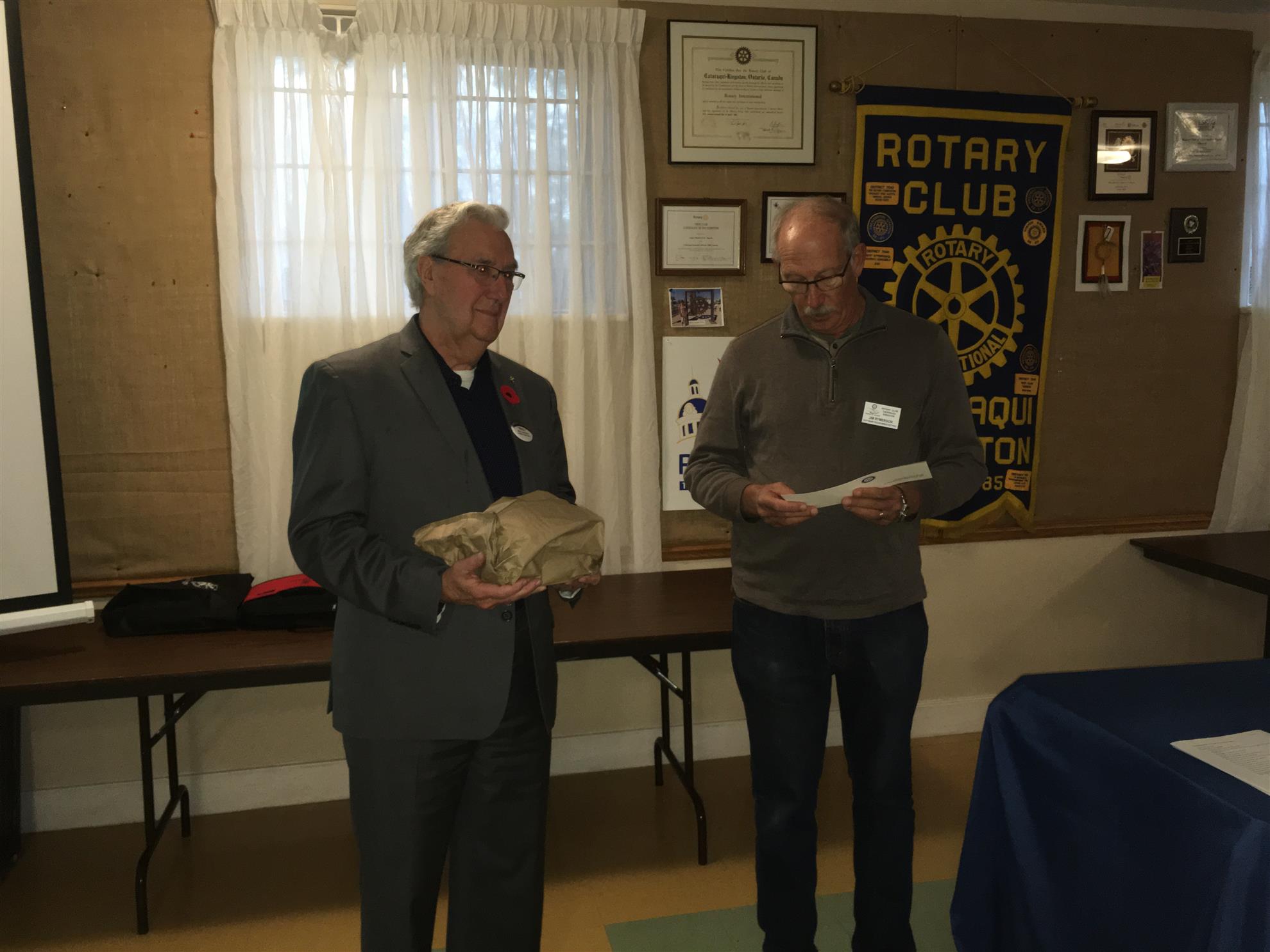 |
||||||||
Bernie Allard and John Farrow - World Polio Day - What does it Mean to Rotarians?John displayed a picture of a man in an iron lung from about 9 years ago; there are still people living in them. The picture is from the video: The Final Inch. This video talks about the last phase of Polio eradication. Anyone who would like to borrow the video can ask John. World Polio Day is Thursday, October 24th. Hajira Wilson, a powerful force for polio eradication work in this area, died recently and will be honoured at the meeting of the Kingston Rotary Club on Thursday/ Consider making a donation in her honour. John asked Bernie to come forward and speak first. Bernie is a past PolioPlus District chair, working to get our more than 60 clubs involved. Thank you Bernie, for that work. Bernie spoke about Rotary and Polio. In 1973-74, everybody knew about polio. As a matter of fact, we have one survivor in this club, our senior member Terry Hicks. He was told he would never walk again, but he’s still doing well at the age of 90+. The Philippines were having many Polio cases and decided to do something. The Salk vaccine had just appeared. One Rotary Club in Illinois was asked if they would help with immunization, which they did. It was not talked about much again until 1985, when it was decided that for the 100th anniversary of Rotary in 2005, we would get rid of this terrible disease, which had up to 300,000 cases per year. The 1987 Munich International Rotary Convention, which Bernie attended, was the first start of a real campaign to raise money; a German car company offered a car, to be delivered anywhere in the world, for a draw at 100 DM per ticket. Then an appeal was made to clubs around the world to meet the goal of raising $120 million dollars. But Rotarians are dumb and stupid and they don’t listen, so the raised over $250,000,000! Since then, we have had four other major campaigns. These have raised over 2.2 billion dollars in conjunction with the World Health Organization (WHO) and the Bill & Melinda Gates Foundation, which doubles our donation every year. Bernie told us that one of saddest pictures he has ever seen is that of an 8-year-old boy in Venezuela limping away dragging he leg. He was the last case in the Americas. We have now reached a point where there are two countries left in the world, Afghanistan and Pakistan with wild Polio virus. 99% of cases are on their borders, where tradition, ignorance, and stupidity, means that Polio is still crossing the border. Three years ago we were down to 17 cases; this year unfortunately there have been 88. It just keeps going. In Afghanistan, all cases were on the border except for one case in the north-east of Afghanistan; people have no idea where it came from. For us, polio is a flight away, for them, it is just one kilometre away. We are dealing with the idea, held by some there, that we, by giving immunization to the children, are causing more problem than not. It’s very difficult to break these taboos. In immunization days around the world, many Rotarians, including his daughter Françine and a friend who spent two weeks in India, give the vaccine to children. In the Middle East and Muslim countries, we need women to do this work since men cannot enter the home alone. Normally volunteers pay their own way, but are hosted by local clubs. We give six other vaccines, including measles, along with polio. It’s a never-ending problem. If we were to stop these immunization days, within 10 years we’d be back to up to 400,000 cases a year. For a country to be declared Polio free, it has to be free of cases for three years. Nigeria was again declared Polio free last summer. We must continue immunization, and also re-visit these countries, with WHO, to ensure that the program continues forever. A donation to Polio Plus is something that everyone should consider. You can’t take it with you in the end, you won’t miss it, and you know that somebody is going to win, and that somebody is everybody. John Farrow: After the Toronto RI Convention, John became interested in the health aspects of polio and the need for surveillance. Rotary is already planning for what happens after final case. What is polio? There are three types of virus. Type 2 & 3 have been eradicated, which has led to a change in the formulation of the vaccine used. Polio has been around since Egyptian times. There was an outbreak in New York City in 1916 that paralyzed 27,000 people and killed 7,000 in the country. Humans shed the virus through their stool, so transmission is closely related to sanitation. The Salk Vaccine came along in 1955, administered by injection, and Sabine’s oral vaccine came along in 1960. Why did Rotary come to focus on polio? The book A Century of Service has a chapter on Polio. Rotary had been working with Crippled Children, through a strong association with Easter Seals, for years. We started with smaller campaigns, including work in the Philippines on one of the first immunizations. Amelda Marcos, “the shoe lady”, wife of President Ferdinand Marcos, was Minister of Health and so had to sign off to give approval. Neither the WHO nor Rotary were really comfortable with the idea of a global effort. Rotary wanted to retain autonomy of individual clubs in deciding on service direction. Nevertheless, after the initial work in The Philippines, RI decided to go all in. It was the first time that Rotary started looking for major gifts. In the 1988 RI Convention, RI moved from control to eradication. Why eradication not control? As Bernie said, it’s only a walk away. It’s only a plane ride away. Right now, there are 70.8 million people in the world that are displaced (UNHCR’s annual Global Trends Report, June 19, 2019). Millions of people are on the move, Syrians refugees are being monitored very closely because they are living in appalling conditions ripe for the spread of any kind of disease. We also have to face the anti-vaccine movement. The United States of America is about to lose its measles-free declaration, because many think vaccinations are dangerous or not important. Surprisingly, the last case of Polio in Europe was just in 2015 in the Ukraine. In 2016, the year of the World Cup in Brazil, the virus was discovered there in the sewage system. The WHO currently monitors sewage systems in 34 high-risk countries around the world. Why do we use the oral vaccine? It’s easier to make, cheaper, and easier to distribute, especially with volunteers - you can’t send them out with syringes. The oral vaccine is better at controlling outbreaks and conferring herd immunity, helping to stop transmission. However, the oral vaccine, in rare cases, can mutate and cause vaccine-derived polio, so there is a small risk. Once we eradicate polio (we’ve targeted $4.2 billion for the final push), we can move, with a lot of training and money, to using the injected vaccine (dead vaccine). But then all live vaccine will have to be destroyed. We have to keep vaccinating in eradicated areas. We need stores of vaccine for that and for outbreaks. The WHO also investigates 100,000 cases of paralysis around the world to determine causes—polio, encephalitis, or others. This is the largest non-military effort in history. It takes a huge army of volunteers. But what happens after the last case? We will continue to vaccinate in the 60 highest risk countries, and continue to monitor cases of paralysis. We will replace the live oral with the injectable dead vaccine, and will destroy all of the live virus vaccines. The PolioPlus program will monitor where the virus is stored around the world, making sure they’re secure. What’s the “Plus” in PolioPlus? See Rotarian, October 2019 (vol. 198 #4). Vaccination has left a legacy of health care improvements in the countries where immunization has been conducted . Some countries need clean water more than vaccine, so bringing clean water to them is part of the work. Jobs are needed for the disabled—polio survivors are helped by Rotarians to find work. Additional medication is included with the polio vaccine, including Vitamin A. That is estimated to have prevented 1.25M deaths from other diseases. Surveillance systems in place have been used to thwart other outbreaks, e.g., Ebola in Nigeria, and Yellow Fever. Often we are giving out bed nets during vaccination. Malaria might be the next thing we try to eliminate. And we are engaging survivors, who become the best advocates for encouraging vaccinations. Bernie: In 2008, an American Family went to the Middle East on vacation and came back with 3 children with the polio virus (which was not publicized) - the last known case in the U.S.A. Donations may be made to The Rotary Foundation Canada (label PolioPlus), by cheque or online. Ana presented a loaf of bread to John and Bernie to share, in thanks for their work and their enlightening presentation. 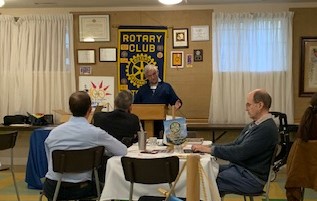 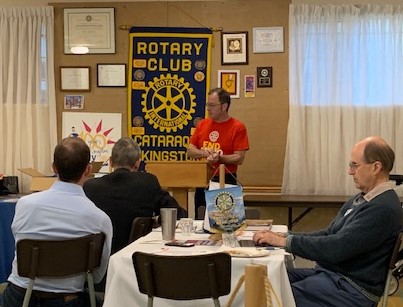 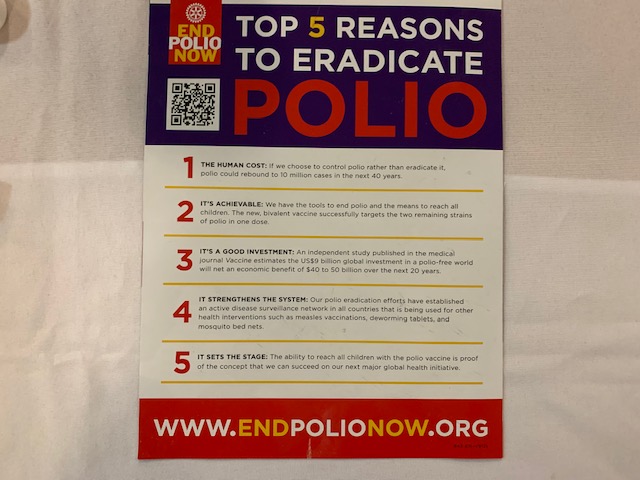 |
||||||||
New Canadians Sharing their ExperiencesPresident Ana introduced our two speakers this morning. Thandi Nkole (said as Tandy eNkolay) is a Quality Improvement Specialist Lean Six Sigma yellow belt by profession with several years of work experience in health, manufacturing, education and the non for profit sector. She’s been in Kingston for 8 years and is an alumna of Queen’s University, Health Care Quality program. Thandi also holds a prior degree in Parasitology from the University of Zambia. Thandi was also an Interactor during her high school years in Zambia. She is passionate about quality and equity and enjoys working with teams and implementing new initiatives. She was also the first participant in Newcomers Empowering Business Collaborative Conversations, partnering with HARS (HIV/Aids Regional Services) help them initiate a health and safety policy. She now works at KEYS to help implement the Workplace Inclusion Charter. Carla Arias had connections to the Rotary club in Bolivia but moved to Kingston in 2016 with her Canadian husband. With a Bachelors in Business Management and a Masters in Corporate Finance, Carla worked for nearly 25 years in finance in Bolivia. Her positions have included seats on two Boards of Directors, auditing for NGOs, United Nation projects and other institutions, Senior Auditor of Price Waterhouse Coopers Bolivia, and CFO of Ernst & Young Bolivia. After moving to Kingston, Carla found work as a financial clerk and volunteered at ISKA (Immigrant Services of Kingston and Area) to help newcomers with tax returns. Rather than continue to seek local jobs in finance, she has felt a desire to be involved in community work and is passionate about helping newcomers in Kingston. Through her own experience as well as volunteer work and personal interactions, she is very sensitive to the needs and situations of immigrants and refugees in Kingston. A former client of KEYS, Carla recently completed her training as an intercultural inclusion coach through Newcomers Empowering Business. 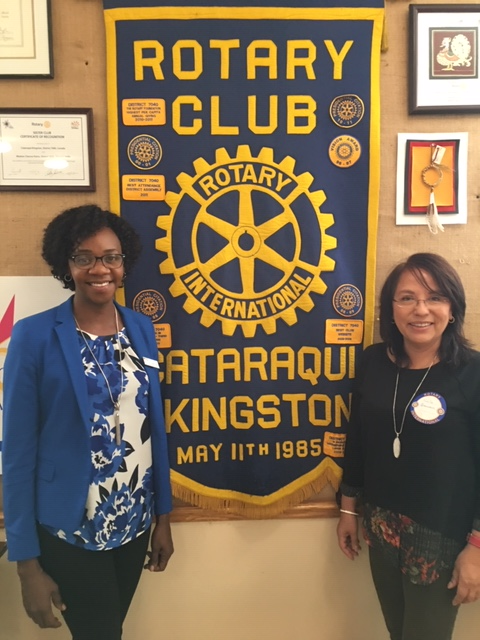 Thandi and Carla then took centre stage Carla talked about her personal experiences on being a newcomer to Canada, and Thandi presented information about the different things that KEYS is doing to welcome newcomers to Kingston. Carla came to Canada just over 3 years ago with her daughter, and married a Canadian. In Bolivia she had a career that she had built over many years. Her parents were part of Rotary and she experienced hosting a Rotary Youth Exchange student with her family. Later, she went to Michigan as a youth exchange student herself! On arrival in Canada as an adult, she felt like a nobody, no one knew her, and life was so different from her life in Bolivia. Her experience and credentials didn’t count here. She started to do taxes for immigrants, feeling fortunate to get a job after trying for many years to get one. She was really happy about this but people didn’t seem to trust what she was doing because she was an immigrant. so it took a long time to prove herself. She always had someone supervising her which wasn’t easy. Carla feels that immigrants come with a lot of knowledge as well as dreams and only need an opportunity to show what they can do. They do feel an undercurrent of not actually being welcome. People aren’t ready to deal with someone different. As a result, many immigrants are not working in their area of expertise. Thandi reported that a study was done this year at KEYS. In Kingston, 95% of people surveyed actually see immigrants positively. Thandi showed stats from the study. Few residents actually have any intercultural knowledge in spite of their wanting to welcome newcomers. So, how can you help? You can contribute to Refugee Resettlement Services, donate goods and services, hire a newcomer, volunteer, for example with English language tutoring. Or, be a mentor, and help them to connect with other people who can be helpful, and help them to network. And especially embrace the Inclusive Workplaces Charter. Champion inclusion in your community and workplace. (ed. note - for more on the charter, go to https://www.cityofkingston.ca/-/keys-and-the-city-host-the-inclusion-charter-launch-promoting-inclusion-and-diversity-in-the-workplace) Questions? Have the programs that you have introduced been going long enough to understand their effectiveness? No. It is too soon. Is KEYS a city of Kingston initiative? Yes in collaboration with other organizations.. Can immigrants call Keys and ask for help? Yes. John Gale commented that as an immigration lawyer he hired a refugee a couple of years ago. She had come from Rwanda and was a lawyer there. Actually, she escaped from there. Failures were his not hers as he didn’t really know how to use her talents. In terms of this presentation, the problems are with the local employers not managing them well. Now he feels that she was a missed opportunity. President Ana announced a networking workshop to be held at the Odd Fellows Hall. It will take place on Saturday, November 23rd 9 – noon. The 4 Rotary Clubs are involved, and it is part of the Supporting New Canadians (SNC) initiative. The purpose is to allow newcomers to Canada to be able to network with Rotarians, and be able to benefit from their expertise in different areas, and in doing so, perhaps find their own place in Rotary. Please come out on November 23rd. The KEYS mentorship program for youth is going to be used in our Pathways program. President Ana decided that she would like to do something in her retirement and she has been mentoring Sam and Sam has a job now. Ana and Sam should be an example for us all. Thandi and Carla were thanked with the traditional loaves of bread. 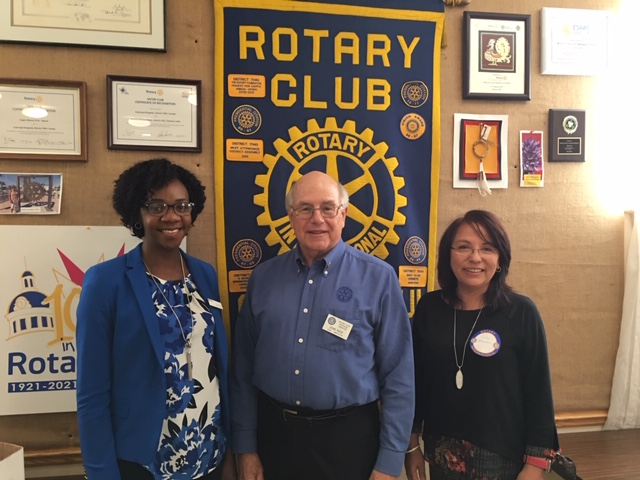 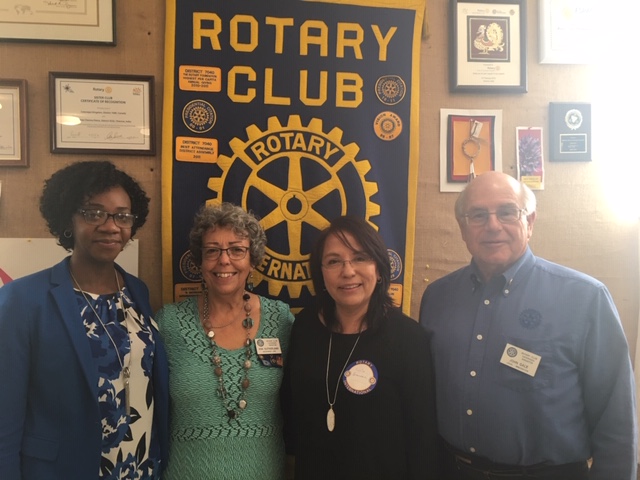 |
||||||||
Mac Johnston, newspaper reporter for 40 yearsGuest speaker Mac Johnston, newspaper reporter for 40 years was introduced today by John Farrow Mac talked about his background; born on a farm in Hastings County, Mac was schooled in Belleville and attended Kemptville Agricultural College. While working a summer job as manager of a retail store in Madoc, Mac dropped into the Quinte Hotel and met a former teacher who told him about a sports news reporter job with the Belleville Intelligencer. The teacher felt so strongly the Mac should apply for the job that he had made an appointment for an interview the next day! Mac got the job, which entailed a 5:30 a.m. start time and many split shifts. Next, the Trentonian City Desk position came open, a great opportunity to show Mac's initiative. Mac connected with City Clerk, learned about city budgets and got involved in reporting on city council. This offered Mac an opportunity to explore other types of reporting, like some agricultural reporting, and writing a story about a man named “Charlie Brown”—what it was like to have a famous name. He then started doing stories on local people with famous names—Pierre Trudeau, Maurice Richard, etc., which earned him an award. Mac and his wife raised a family in Trenton, then got a job in Cornwall with the Standard Freeholder, which was in a downturn cycle, with only four, inexperienced reporters; he had politics, then took on school board reporting. But his wife, from Galt, was not happy there. When visiting her home, he saw ad for working at the Guelph Daily Mercury. He got the job, but only after the manager checked whether they could steal him from one Thompson paper to another. In Guelp there were four reporters and three bureaus, linked by teletype (this was 1971). Then in 1972, Mac got the City Editor’s job. Mac really wanted to be a managing editor or to be a Queen’s Park or Ottawa editor. He finally got an interview for an Ottawa bureau job. which he got. So Mac and his family moved to Ottawa, the start of 40 years there in the Ottawa Press Gallery. Mac described the Press Gallery as an 'interesting' place - at the time there were 143 journalists accredited to Parliamentary Press Gallery, but just 2 years later, 320 people. An hour after anything is spoken in House of Commons, the 'blues' come into 350 North. This was a rough draft of Hansard, but pretty clean, providing the press with direct quotes. Then the reporters would go for interviews, but there was no phone communication, so the reporters had to know what was going on in order to catch ministers. The result was a real scrum. Major stories of day were covered by Canadian Press and there were 48 papers in Thompson chain. Mac had to keep tabs on 71 Members of Parliament. He saw a lot of interesting things, people trying to influence politicians and their staff and to convince reporters that there’s a story in their interests. There was also a lot of socialization, including in bars, with ministers. Mac admitted that he left the Hill because he was drinking too much. He then became assistant editor and manager of The National Legion Magazine, a for-profit company, and he stayed at that job for rest of career. Mac has been to more than 60 countries, sometimes with politicians, many times on his own. Generally, Mac said that politicians are reasonable to deal with, but some that are very manipulative with the press. Q: Is print media dead? (do at a later date as part 2) Q: If you were in Washington how would you handle Mr. Trump? A: Mac has been reading Washington Post since Trump was nominated. The U.S. is a very different climate. There’s spin on everything. Much more polarized. Reporters won’t have access to Trump unless they’re from a Republican supporting paper. Very much polarized, also in American media. In Canada, much more balanced. Jim Rymerson thanked Mac with the traditional loaf of bread. 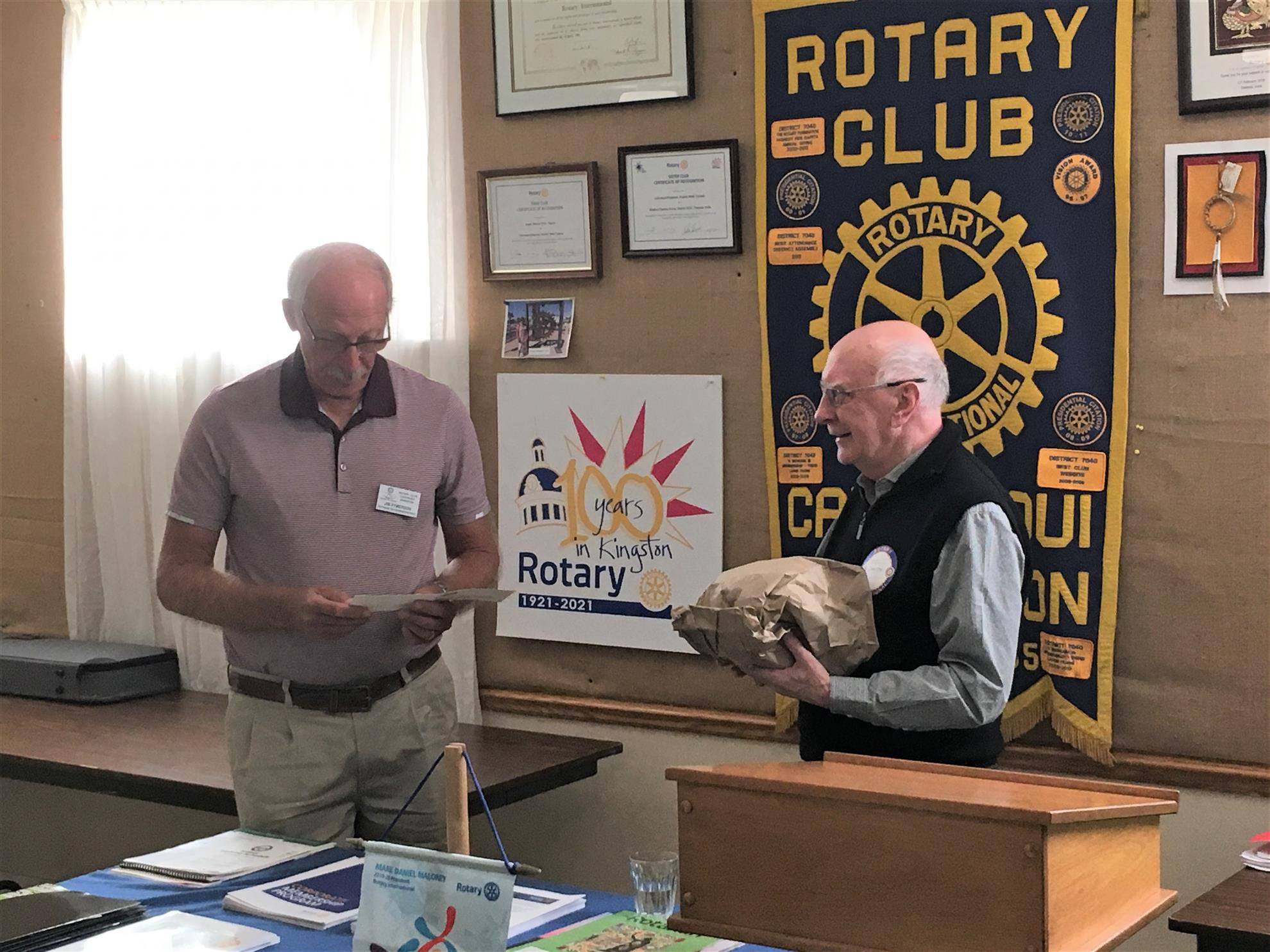 |
||||||||
Claire Grady-Smith, Sherlock's Escapes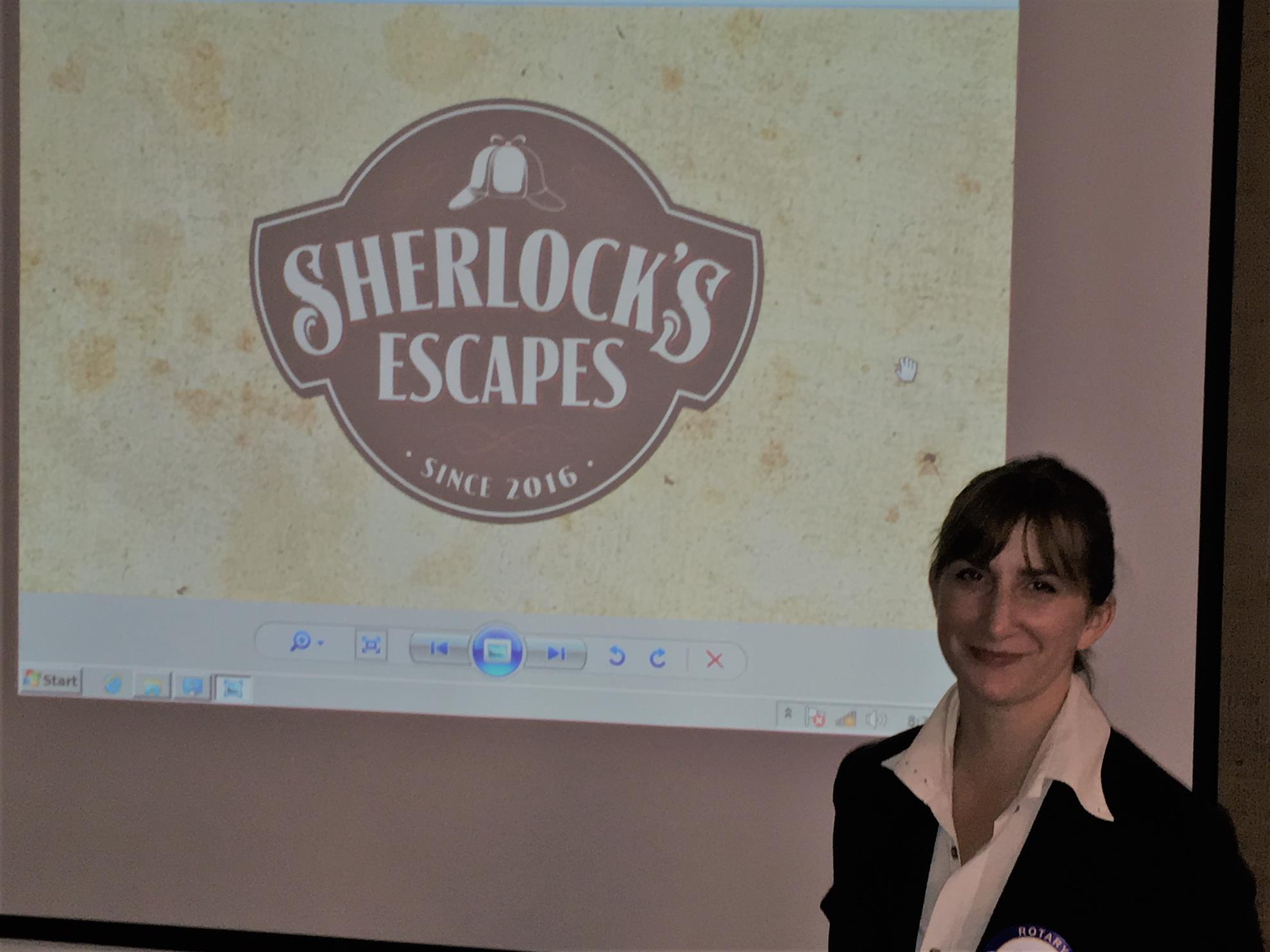 Claire joined us this morning to talk about Sherlock's Escapes, a relatively new type of escape room experience in Downtown Kingston, based on the works of Arthur Conan Doyle. Claire began by telling us about her Rotary connection - in Ottawa, when she was 17, Claire was a Rotary exchange student in France! Claire is a marketing consultant who works online for small businesses. Sherlock’s Escapes is one of her clients, located in Downtown Kingston in the Lasalle Mews. There are several Sherlock Holmes themed rooms, and each room is an active story that you’re launched into the middle of – like you’re in the centre of a board game and you must figure out clues to move from room to room. There are puzzles, locks, hidden passageways and doors, and lots of laughter and good times for everyone are guaranteed! Sherlock's has 4 physical escape rooms, 2 portable rooms and a pop up room. Soon they will be travelling to Thailand to participate in a retreat using an entire hotel as a themed escape. Sherlock's also partners with corporations on team-building retreats. Escape Rooms are a large challenge to market because you can’t show what they look like, and each room is only good for one experience, assuming you solve the puzzle and don't need to come back to try again. To help, they’ve rebranded recently with a new logo, website, etc. and are trying harder to get the word out. Sherlock's is also developing activities for kids to get them off the couch and interested in active fun. Claire recently was drawing caricatures for kids using the escape rooms (she is also an artist and currently has a show at The Elm Café!). The experience is great for all ages - kids as young as 7 have come in with their grandparents. Couples, families, and even Rotary Clubs can try it! They also travel to parties, weddings, etc. and run puzzle games (dress up style) for up to 100 people. As soon as you enter, you're in Sherlock’s lounge! Escape Rooms started in Japan – where they are a little more computerized than here in Canada (walking around a room and clicking on consoles for clues). Escape room implementation here is more social and interactive. Questions: What are the safety/insurance implications? Many! The Fire Marshall loves us. So everyone's safety is guaranteed, there’s always an open door. What’s your success rate? About 20%. If you get out in time, you feel REALLY good! And we want you to come back and try again, so we don’t tell you the solution if you fail. 25 minutes is the record! Claire was thanked for her presentation by John Farrow with a (unlocked) loaf of bread. |
||||||||
Roger Romero - My Work with Pathways KingstonBill Egnatoff introduced Roger Romero from Pathways Kingston by stressing our club's strong connections with the program, and that we know that the program works. Bill also noted that we have had Pathways students participate in Adventures in History. By way of background, Roger noted that Pathways is dependent on partnerships, like the United Way, one of the first organizations to offer support to their program. Pathways is part of the Kingston Community Health Centre, and they both serve primarily an area of the city that faces significant challenges. Roger showed a video talking about how he faced challenges as a young refugee from El Salvador, and tied that to his dedication and that of the entire Pathways staff, many of whom have been with the organization since the beginning. This is an important aspect of their work, the kids they serve need consistency. Roger is the Program Coordinator for Pathways Kingston, meaning he oversees the after school programs and Pathways' strategic partnerships. Pathways is present all across Canada, helping students who face challenges graduate from high school and build a successful future. From it's beginnings in Regent Park in Toronto, Pathways addressed four pillars for success - advocacy for the students, mentorship, financial resources (usually to address food security issues), and one on one help of a graduation coach who supports the student even outside of academics. Relationships are the key in the process. Pathways Kingston opened in 2010, and they are starting to see the change in the community. Why are they associated with Kingston Community Health Centre? Because KCHC addresses the determinants of poor health, low education being one of these factors. Pathways is just one part of a 'wrap-around' approach to health care in Kingston's North end. Students dropped out at twice the rate of the rest of the city in this area. Other statistics gathered by KCHC back up the need for support, especially the fact that the average family income is $23,000 less than other areas of the city. The goal for Pathways was to help the students in their service area finish high school and be prepared for the transition to post-secondary education. The results are impressive - in both the applied and academic streams, Pathways students are much more likely to go on to post-secondary education, beating averages by more than 20%. Pathways target is to serve about 325 students per year, and they have served over 1,000 students, and have 300 alumni. The students attend all area high schools, and remain with the program for all 4 years of high school. These students have complex lives which affect their schooling. The have ACE's - adverse childhood experiences. These traumas create toxic stress in the brain and can adversely affect the student's health and education. And these ACE's can cause problems to subsequent generations. Pathways addresses this by forming a bond of safety and trust with their students. The workers don't do things for their students, they do things with their students, empowering them to get what they need. Peer support is also important. So everything is rosy, right? Not so much. When the students went on tp post-secondary school, they fared poorly, often dropping out. They couldn't make the transition, often dropping out with large debts and taking low paying jobs. The national organization didn't have a solution, so Pathways Kingston came up with the idea of having a worker dedicated to helping graduates connect to the support network that Colleges and Universities provide. Again, results were amazing - 80% of the students stayed in post-secondary school, and those who did drop out were still connected and offered help on what to do next. That's where Rotary comes in - helping raise the money to fund this program for 3 years, finding mentors, hiring graduates, and more. Roger wants to help create the next generation of Rotarians. These kids want to give back, they want to work and be successful! Roger was thanked for his presentation by Robert Reid.
|
||||||||
Doug Townsend and Judy FyfePast President (and Charter Member) Doug Townsend gave us an update on the Centennial Committee’s plan to have 52 vignettes celebrating the history of Rotary’s 100 years in Kingston. He has been given the task of coming up with 8-10 Rotary stories to be used during the Centennial year. So far he has about 5 and is looking for help and ideas in getting the remaining. He needs photos and editorial for: 1 –the founding of the CK Rotary Club 1985 2- Polio Plus 3- Women in Rotary 1989 4- Sweat Equity projects 5- equipment for new schools Some additional ideas that were brought forth were: Adventures in History, Changing face of Rotary, Ambassador Scholar, Waterfront Club, International projects, Rotary Friendship Exchange and Fundraisers. This project is in the works now, and any material you may have would be helpful to Doug Our main speaker today was Judy Fyfe, Director of St. Vincent de Paul Society in Kingston. Judy informed the club of what St. Vincent does for our community and the people who need their help. Plans are underway to move operations from their present location on Concession Street to a new facility on Charles Street. They provide about 80-100 lunches a day. From their website; In the early 1870’s, the St. Vincent de Paul Society was incorporated in Kingston, Ontario. But the story of 85 Stephen Street begins in 1965 when the Society began to formalize their care for those in need through St. Mary’s Cathedral. By 1966, other local parishes joined in the effort of the society to care for the vulnerable in this community and were providing support to those in need and those who were in jail. In 1967-68, under the leadership of Arch Bishop Wilhelm, the property at 85 Stephen St. was purchased. With the tireless support of Father William Burns and local parishioners, including Pat Deasey, John McLean and Don Mocktiche, care for those in need could now include free clothing and furniture. At that time, St. Vincent de Paul Society had only the Warehouse to provide services from. It was not until the mid 1970’s that a hot meal was provided for those living in poverty. Sister Loretta McArthy, who as the 1st Manager of the Society, began this ministry with the purchase of the small building referred to as the “Bug House” as it was once a small extermination business that used the space. Later, a new kitchen was created to accommodate the increasing number of individuals who were in need of a hot meal and a place to belong. The community that exists here today among the clients, volunteers and staff is rooted in the tender care provided by Sister Loretta. Her dedication to this program inspired the naming of our front building – The Loretta Hospitality Centre. Today, we still offer a hot meal at lunchtime, five days a week, all year long. The WearHouse still operates offering free household items and clothing to those who visit our facility. We also offer an Emergency Food Pantry to assist our neighbours who are running short and find themselves without enough food. We work very hard to maintain the quality of service that our founders and early supporters aimed to provide. We stay close to our roots and offer kindness and compassion to all whom cross the threshold at 85 Stephen St. 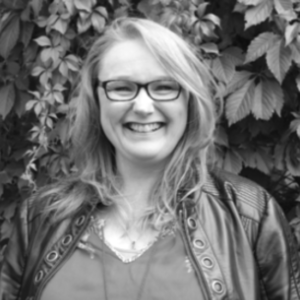 |
||||||||
Maggie McLaren, What's New at Dawn HouseJohn Farrow introduced today's speaker, Maggie McLaren, Director of Dawn House. Maggie has been with Dawn House for 6 years, and ran into John this summer, and was invited to come and give an update on an organization has supported in the past. Maggie feels she was called to the position because the ad kept coming in through the fax machine at her former job every so often. After several times she had to apply. Dawn House has been around since 1986, in response to a housing and homelessness crisis in Kingston. Many women with children who were homeless with children lost those children to CAS. The Sisters of Providence started Dawn House with seed money, and the goal was to prevent homeless women from losing their children. The role changed in the 90's and 2000's to help disadvantaged women from Kingston, many of whom had mental health and addiction issues. Dawn House has since had a passion for working with the most challenged women. Then in 2015, a new city housing policy concentrating on permanent housing over shelters came into effect. This policy has not achieved it's goals (a five-year review is coming up), and the homelessness problem for women especially is worse. We don't see homeless women as much because they try to be invisible for personal safety reasons. Many homeless women sleep during the day and seek other shelters during the night, or they stay in an unsafe situation because there's no alternative. The first shelter to lose funding in 2015 was the women's shelter, as the city wanted co-ed shelters, which doesn't work for women who have been abused or harassed. Dawn House then sold their Victoria Street property and bought the former Bayridge Medical Centre building on Bayridge Drive. This was a big risk but allowed Dawn House to continue to provide permanent housing, supportive housing, and transitional housing. Of course the goal is to get women into market housing, which is next to impossible with rates in Kingston, although the city is trying to address the issue. So Dawn house now has nine apartments, a seven bed transitional shelter, and one emergency bed. They are also trying to develop other housing options, because they continually get calls from other agencies looking for space. Dawn House receives no government assistance, getting their money from rents in the apartments, and from charging very low fees for Wi-Fi and laundry. Much of the money comes from grants, and they are constantly applying for new grants, especially now since a two year Trillium Grant is almost up. Maggie shared some stories of women who have accessed Dawn House for years. One was a trafficking victim who was abused and had a daughter taken away. Her appearance and mannerisms led the staff to suspect a acquired brain injury. She was in the new transitional beds in 2017, and moved to an apartment. She was using drugs to deal with trauma, and Dawn House helped her get a place in KGH for an evaluation. A diagnosis of a rare condition that makes people actually believe they are dead followed. Meds helped stabilize her mental health, and with support the changes have been dramatic. She now cooks, cleans, and helps around the building, changed her appearance, and has become a whole new person according to Maggie. Another women came in in 2017 as well with major anxiety because of a home invasion while living in the Niagara area. She was attacked by a man in the building she worked in, and was terrified whenever a man was in the facility. With help she is now able to leave the building or backyard, and continues to make progress. Dawn House wants to move women from transitional housing after a year maximum, with help to find community housing. Others need to stay longer, like a woman who was released from prison after ten years. She resided at Dawn House but moved to an apartment with a roommate this June. She continues to receive mental health support and is off medication that she receive in prison to keep her docile (a common theme for released prisoners). There are many more stories that show just how important the work of Dawn House is. They serve the disabled, seniors, and more. They main goal is to get women out of the homelessness cycle of shelter to shelter, to build a meaningful life, and recover from whatever took them down the road of homelessness. The common thread seems to be loneliness - lack of family, lack of comradeship, lack of supports. In answer to questions, Maggie answered that one goal of the new fundraising is to open another facility, and the other is to provide funds for programming, to avoid funding shortages. Also, Dawn House works with 16 to 17 women at a time, and have 35 applications that are active. There were also 35 phone calls received in August from women looking for help. Mental health assistance is always a challenge, especially with changes to Addictions and Mental Health KFLA which resulted in Kingston losing a psychiatrist. Dawn House does help its residents manage their medication and keep their various appointments to help them make progress. Perhaps the most important statement that Maggie made about Dawn House is that they never give up on the women they serve, no matter how long they help them and no matter who else gives up on them. President Ana thanked Maggie for a great presentation with the traditional loaf of bread. 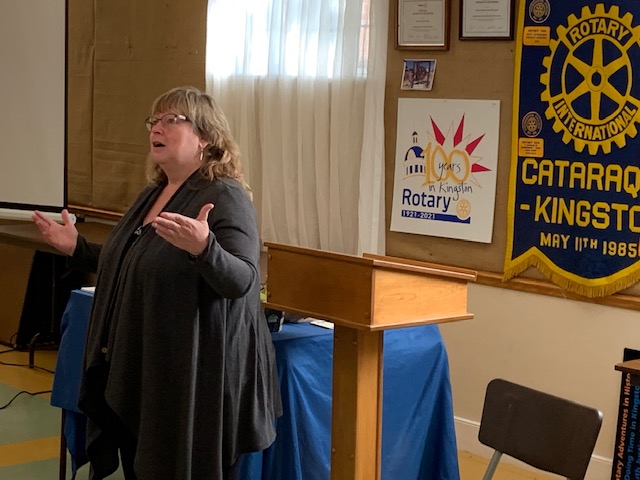 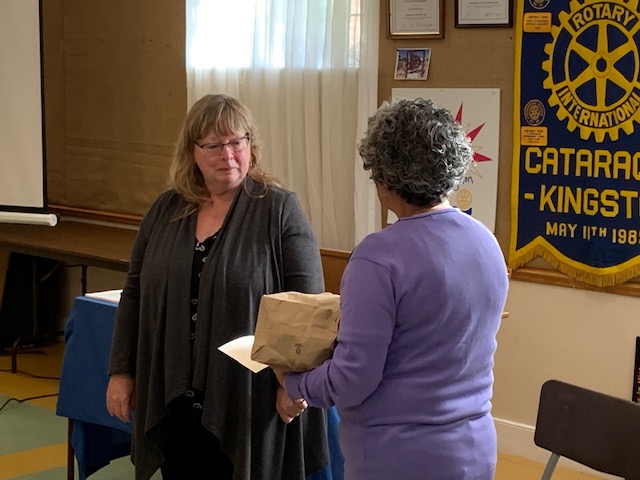 |
||||||||
Update on the Watershed Project in IndiaJohn presented an update on our club's project to restore a 1,500 Hectare watershed in India. This project is a joint project with District Clubs, Rotary International, the agricultural bank owned by the Indian Government and the local communities. The first phase of the project is complete, and the following are excerpts from the report. Please find the latest report for GG1636771 - Watershed and Integrated Rural Development Project in three villages, Krishnagiri, Tamilnadu State, India. Leadership of this project in District 7040 is by Rotary Club of Cataraqui-Kingston while the International Partner is Rotary Club Stavanger International in Norway. The host club is Rotary Club Madras Coromandel in District 3232. (Note - this club was visited by our Friendship Exchange Team to India) The project is a unique partnership with NABARD, National Bank for Agriculture and Rural Development (owned by the Gov't of India), Rotary, National Agro Foundation and the local communities. The project is valued at US$378,000 with the community contributing 16% and NABARD and Rotary/The Rotary Foundation each contributing 42%. The first phase of the project, to restore 10% of the project area or 140 hectares along with education and training in agriculture methods and related income generating schemes is complete. Outcomes are as planned. Now work begins on the second phase of 1,260 hectares. In acres the total project is approximately 3,456 acres in size. Contributors to the project locally were; •RC Plattsburgh Sunrise: US$500 + 5% •RC Arnprior: US$1,000 + 5% •RC Shawville: US$1,000 + 5% •RC Clayton: US$1,000 + 5% •RC Hawksbury: US$2,000 + 5% •RC Cataraqui-Kingston: US$6,000 + 5% • •and District 7040: US$10,000 District Dedicated Funds. Several strategies for rain water retention were put in place in the first phase area. One type shown below is called a Field Bund .png) Farmers were also given ploughs which would turn the earth to a deeper depth, preserving water retention. ) ) • Outcomes of the project (please not 1 lakh = 100,000 • Regular monitoring and observation was done by the watershed development team. The following are the impact assessed by the team: • New water harvesting structures :51.36 lakh liters capacity • Rejuvenation of existing water body : 17.22 lakh liters [Additional] • Fallow land in to cultivation : 53.6 Ha.
• Assessed Impact • Increase of water table in bore-well : From 740 feet to 38 feet • Increase of water table in open well : 25 feet to 2 feet • Rejuvenation of almost dried bore well : from 440 feet to 80 feet • Rejuvenation of dried open well : from 27 feet to 2 feet • Cropping intensity : 165% • Changes in cropping pattern : 35% of CBP area (137.6 ha) • Productivity improvement : 115%
• Rain water harvesting details through various water bodies • Rain water harvested in surface storage :183.75 lakh liters • Rain water harvested in sub surface :91.5 lakh liters John concluded that the first phase results are remarkable, and that the project will now be fully rolled out to the other 90% of the watershed area. Although this project's full effects will only be felt long after our original contribution, we should be very proud of our involvement. Further updates will be provided to the club when the are available. |
||||||||
District Governor Gerry LambertDistrict Governor Gerry Lambert from Canton, New York was here on his official visit to our club. Rick Frasso introduced Gerry, a 23 year Rotarian with a background in the military, teaching, school administration, small business ownership, rental properties and now a Part-time Volunteer Transportation Driver. Gerry's presentation focused on three main topics. First, membership growth - Gerry challenged us with two questions - first, how much time do we spend raising funds for our projects? Then, how much time do we spend on recruiting new Rotarians? The District and RI realizes that membership growth is a problem, especially in North America. The District is offering help to clubs to increase membership, and Gerry spoke about some early success stories with existing clubs in the District. Second, Gerry spoke about co-operation between clubs, something he notes the Kingston Clubs do well. Other clubs in the District are combining to raise funds and support projects. Smaller clubs often act as facilitators, bringing together people and groups even outside of Rotary to get things done. 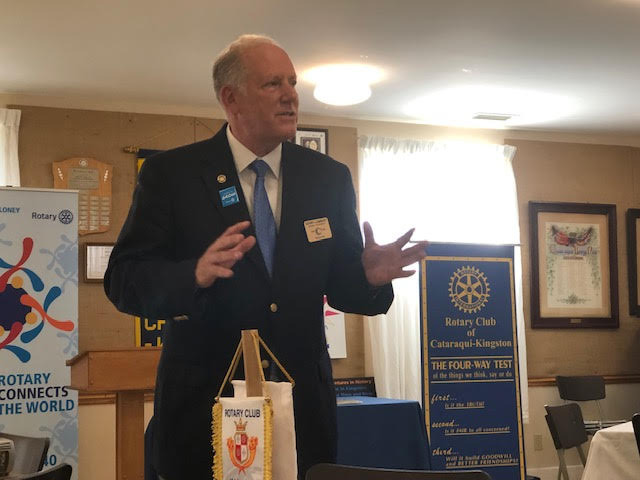 Gerry also spoke about the upcoming District Conference at Clayton in early November. Gerry urged club members to attend and learn about all Rotary can offer. For details and to register, go to the District website, www.rotary7040.com. Club cooperation and Rotarians getting together at a District Conference are just two examples of the year's Rotary Theme, Rotary Connects the World. John Farrow thanked Gerry for visiting today, and presented him with the Club's contribution for The Rotary Foundation and for Polio Plus. 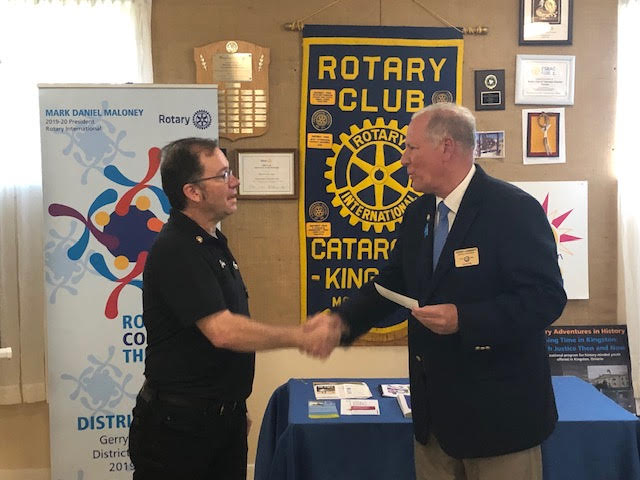 |
||||||||
Concerned Citizens Fighting Climate ChangeJohn Farrow introduced our guest speaker, Gavin Hutchison, who was here to speak with us about climate change. Gavin has an engineering background and got inspired to be involved with spreading the word about climate change after reading the book, The Weather Makers. He was trained by Al Gore in 2012 on how to present on the topic of climate change. So, why is our planet not a cold rock, like our moon? It’s our atmosphere that provides a stable temperature, evaporation, precipitation and photosynthesis. The stable temperature comes from the Greenhouse Effect. The sun’s rays warm the earth’s surface and our atmosphere hangs on to some of that heat for us. Adding greenhouse gases like CO2 is like adding a second ‘blanket’ and causes more heat to be trapped and held on to in the atmosphere. As a result, the earth’s temperature is increasing. In 1988, it was reported that we’d already pushed the earth to its temperature variability limit, and should expect extreme weather events. The last 3 decades have seen highest temperature increases, and the last 5 years on average have been the hottest on record. 224 locations around the world set all time heat records in 2018. The oceans of the world are moderating the extreme temperatures – one of the consequences is an increase in hurricanes and their intensity. The cost of the losses from extreme weather events in the last 2 years is $653 Billion. Gavin ran us through a series of slides that, when presented on after another, made us realize just how many floods, droughts, fires, and hurricanes have been piling up, one one top of another, for many years. So, what do we do? The Paris Climate Agreement of 2015 pointed the way. The long term goal is to decrease global average temps to below industrialized levels. This will be done by reducing carbon dioxide emission levels – down 50% by 2030 and 100% by 2040. Canada will probably not meet our modest commitments of the Paris Accords. Countries like Scotland have already met theirs. Transportation is the largest source of emissions in Ontario and we all need to be driving electric cars! Tesla has announced electric semis for next year, which could significantly lower emissions, because we transport so many goods by truck. Buildings are another big source of emissions because of heat loss – insulate, insulate, insulate and switch to heat pumps! This has an immediate positive impact. What can we do besides this? Speak up! Buy an electric car; eat less meat; make your home and business more energy efficient; buy a smaller car; buy a plug-in hybrid vehicle; buy a battery electric vehicle; let our politicians know this matters! Canadians are very high emitters among the countries of the world. Europe, China and India are moving much more quickly than we are in North America. The time to act is not now, it has already past. We can't afford to wait any longer. You are welcome to join 350Kingston.org. Join the Friday climate change demonstrations at city hall. For more info, go to ClimateRealityProject.org Ed Thompson thanked Gavin for his very informative presentation. 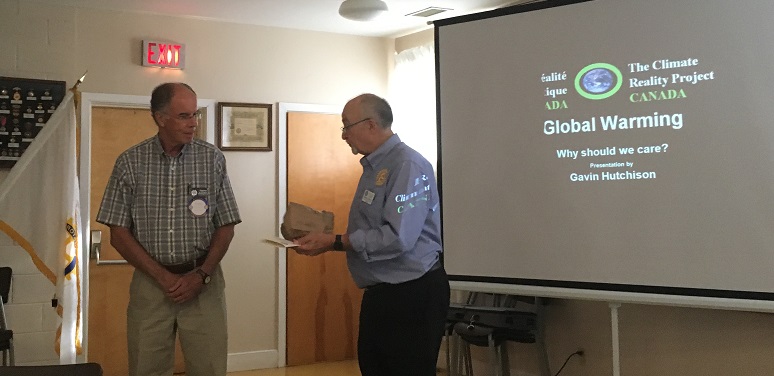 |
||||||||
Doug van der Horden - Does Human Trafficking Occur in Kingston?John Farrow introduced our guest speaker, Doug van der Horden, who is here to speak with us about preventing human trafficking in the Kingston area. You will remember that Doug received a Paul Harris designation from us last year for his work for the last 12 years trying to help prevent human trafficking in this area. He is a counselor at Ernestown Secondary School, and has held several interesting jobs in the past. Doug complimented us on the awesome vibe in the room at 7am! His presentation is usually 3 hours long, so he can only just skim the surface in the next 20 minutes. 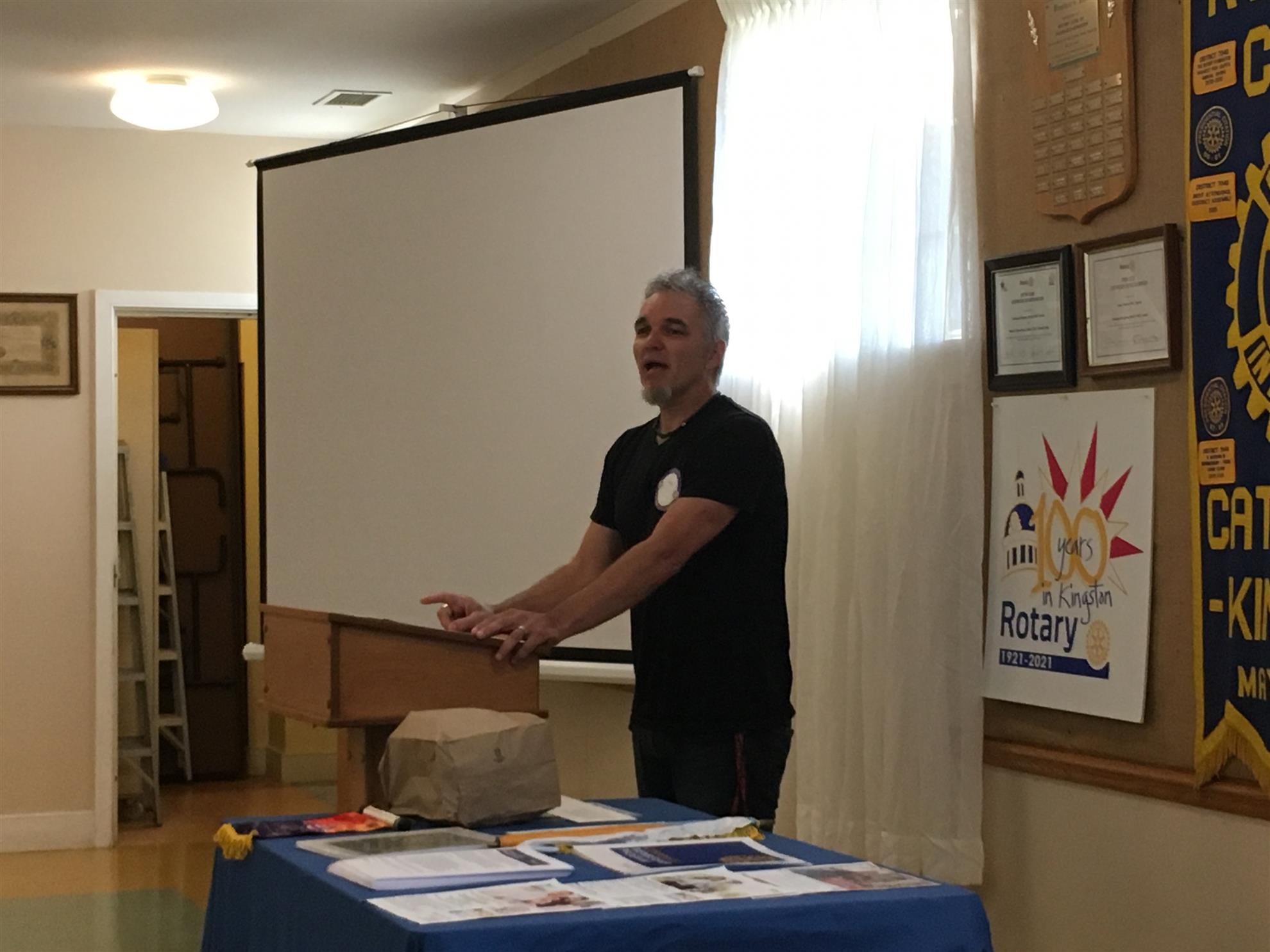 Doug has been with the School Board for 12 years, and has had a varied past – military (member of the Vimy Band), pastor, musician, Salvation Army worker in the prisons, and youth worker. He went back to school when he got out of the military and had a child on the way. When he was in college, he saw a film called Human Trafficking with Donald Sutherland in it. At that time, the topic was not anywhere on Doug's radar, but it affected him profoundly and he started to approach anyone he could who worked with folks living on the street – trying to learn more about it. Human Trafficking is such a complex issue. The Alliance for Action committee was formed locally in an effort to get the attention of the police and the major crimes unit. The Chair of the group approached the police chief and they had their first meeting after three years of trying to get together with the Police – the police knew nothing. It was not on their radar either, and they didn’t have the resources to deal with it. Alliance for Action had been looking into trafficking for 4 years, and the police were more than willing to listen to them and learn. What exactly is human trafficking? In simple terms, it is the illegal sale of human beings like commodities in order to meet a demand for forced labour or sexual slavery. It's different than human smuggling, where people pay to get into a country illegally, although once there these smuggled people are very vulnerable to being trafficked. Every 30 seconds worldwide someone becomes a victim of human trafficking. Victims are being forced, even if they’re being paid. The psychological bond with the trafficker is SO strong, it’s very hard for younger, disadvantaged youth to break free. The average age of someone being trafficked is 12 to 15 years, and there have been local cases, some of which are still working there way through the courts. Girls represent between 70-80% of trafficked people, and it doesn’t necessarily mean transporting them far away. Sometimes these girls are being given a roof over their heads and are being pimped out, right here, in the Kingston area. The 401 corridor is a trafficking artery (Doug has done presentations to the En Route staffs and managers). 5 years ago, Timea Nagy, a survivor and advocate came to speak with in Kingston and at Kingston General Hospital, and awareness has been building. Alliance for Action is no longer a working group, but Doug is still going. CBC Radio reported that the best way to combat trafficking is to educate our young people. Doug and others have been presenting to kids grade 7 and 8 and up to increase their awareness. There are 2 types of trafficking: domestic or international. Doug focuses on domestic – within this country and our neighbourhoods. We he asks within his school how many people thought trafficking was happening within our country, province? Sure! Within our community? People answer no, it’s not happening in our community – but guess what? It is! Social media facilitates reach-outs from traffickers in large cities. Doug related a story of one group home kid who was moved to another city. She disappeared and , couldn’t find her anywhere, and surfaced eventually over social media and because of the education we’re doing, her friend identified a false reach-out and a ‘sting’ operation was organized. In Odessa! Cops got the girl back, and it was traced to a prostitution ring in Toronto. There are 3 types of pimps: a prevalent one is the Romeo pimp– a few years older than the girls and works at winning them over and builds an online relationship with them. Then they isolate them from their family and friends and introduce them to the sex trade. It's really hard to get the girls back at this point. Videos are often used for blackmailing. Then Romeo asks a favour…… just this one time. This is the type of pimp that is seen most often. Doug asks the kids – what do you think a pimp looks like? There are the stereotypically dressed ones (big hat, fur coat, cane, gold jewelry, etc.), but a lot of them are young, average-looking women! You wouldn't pick them out in a crowd. President Ana Sutherland thanked Doug for his very enthusiastic and informative presentation on this disturbing topic…… 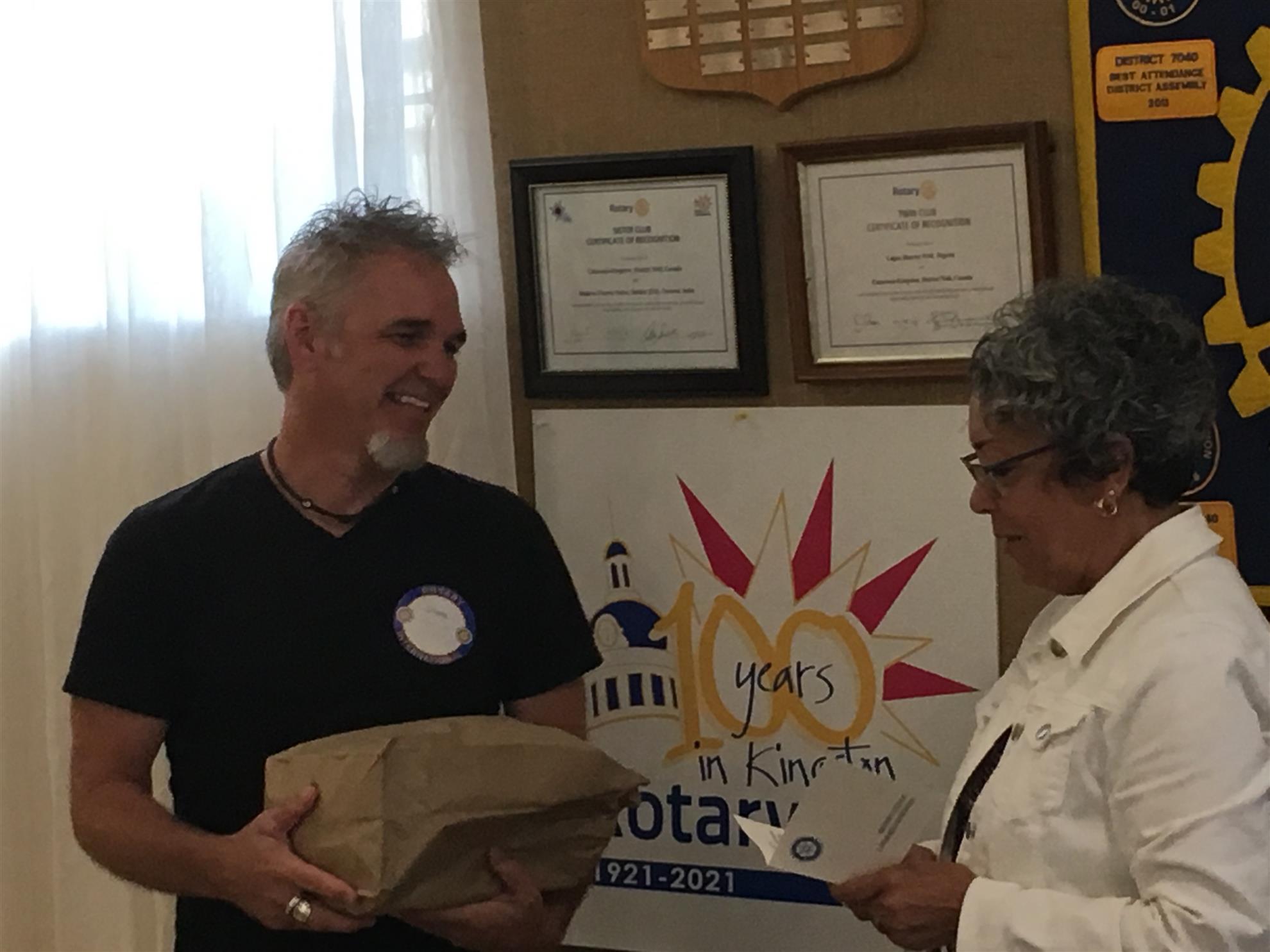 Who do you call if you suspect someone is being trafficked? The Canadian Human Trafficking Crisis Number is 1-833-900-1010. You can also contact Kingston Police or Victims Services at 613-548-4834. You can follow Doug's work on Facebook at; https://www.facebook.com/fast.kingston/?ref=bookmarks |
||||||||
John Mckay, Kingston Police Pipe BandJohn Farrow introduced our guest speaker, John Mackay, from the Kingston Police Pipe Band. Our relationship began with a chance meeting with another band member at a bingo hall annual general meeting, and culminated with a grant for a project last year. John did his teaching degree at Queen’s after an undergrad degree at McMaster, and his involvement with the Kingston Police Pipe Band began back in 2016. John actually went to Scotland as part of his degree studies to learn and teach there at a famous piping and drumming school. He's now a contract math teacher with the Limestone District School Board, the piping instructor at Royal Military College and the founder of the Kingston Police Pipe Band. 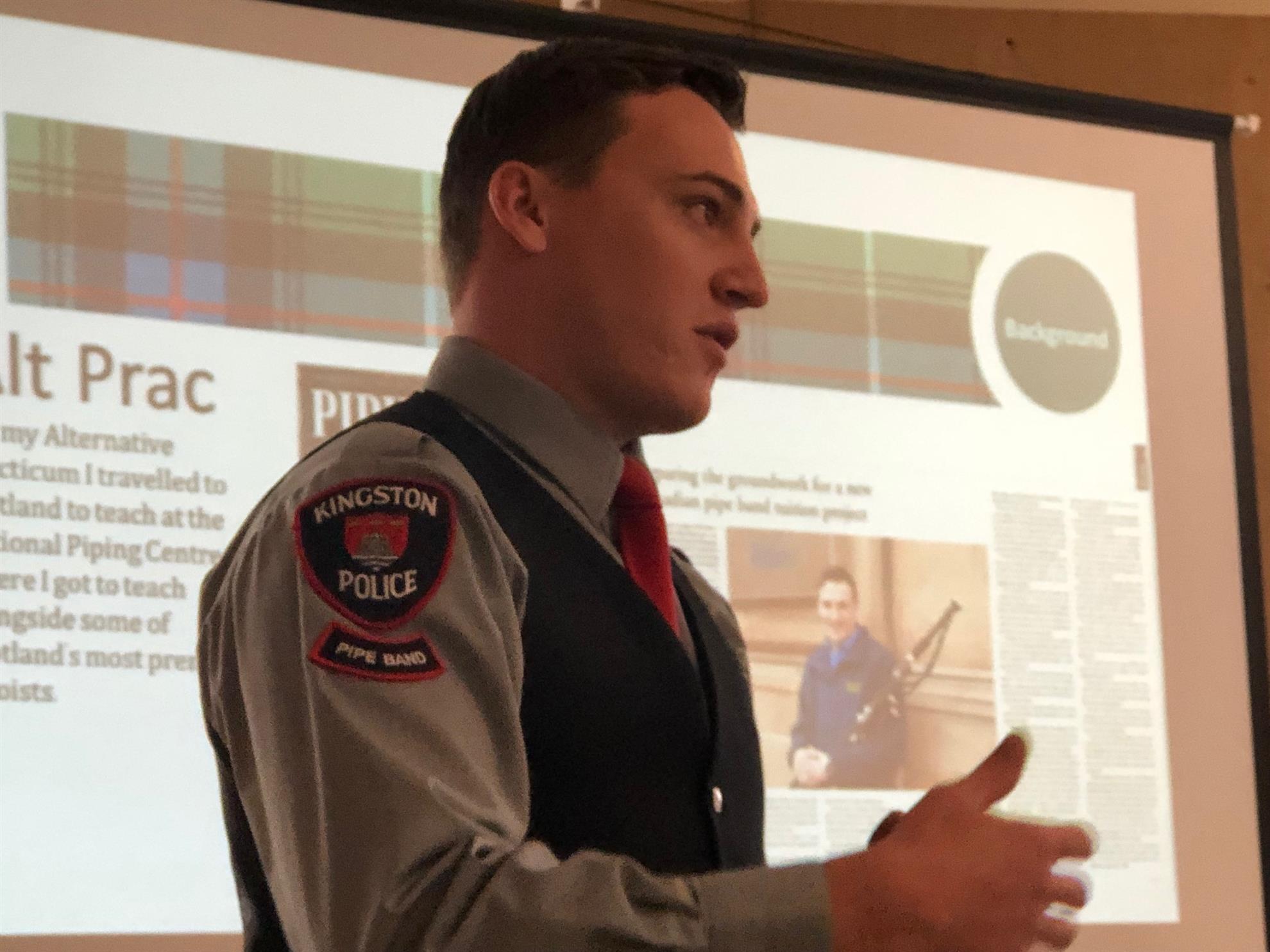 The band's first performance was at the First Capital Highland Gathering at the Isabel Bader Centre last April, and it showed what the band is capable of – a band built from scratch! John was inspired by the Inverary and District Pipe Band from Scotland and their story of building from nothing to world pipe band champions. He approached the Chief of Police in Kingston and outlined his plan to work with low-socioeconomic background kids and build a pipe band together. John obtained support and started to advertise free piping and drumming classes, and obtained practice space from Queen’s at McArthur College. He even used his own school loan money to buy practice equipment, and when that was insufficient to support the band's growth, the band applied for a Rotary grant from our club to help out. John expressed his thanks at getting funds for much needed equipment. In May 2017 they got the official go ahead from the Police Department, and were officially branded the Kingston Police Pipe Band. Fundraising was a priority, and there fundraising included selling donuts and Remembrance Day lunches (and now bingo). After a couple of moves John finally connected with the Boys and Girls Club and got use of their space free of charge to practice, and encouraged kids at the Club to join them. Once a week lessons are taught there, on part courtesy of practice equipment bought with our grant. In April 2018 the band received there own uniforms from Scotland (with the Macdonald hunting tartan – the nicest MacDonald one we could find….) and shortly thereafter placed 3rd in our first competition in Kemptville – all with a band of kids started from scratch! Many other events, increasing the band's profile, have followed. John wants to move to a 2 band system – a competitive band and a kids band. And this is a passion that can encompass folks from all walks of life. He’d really like to see the piping and drumming expanded into the school system, and has written a modified music curriculum to make this possible! If Scotland can do it, why can't we? John thanked us again so much for our donation – which purchased practice equipment enough for 30 children. Prior to this, they were creating equipment in a makeshift fashion and did not have enough for all the kids who showed up…… There is still a need for funds. They are now at 47 uniforms, worth $1,200-$1,400 each and are still short! Elizabeth Cohoe thanked John for his presentation, remarking that it's so nice for us to see our fundraising money at work! 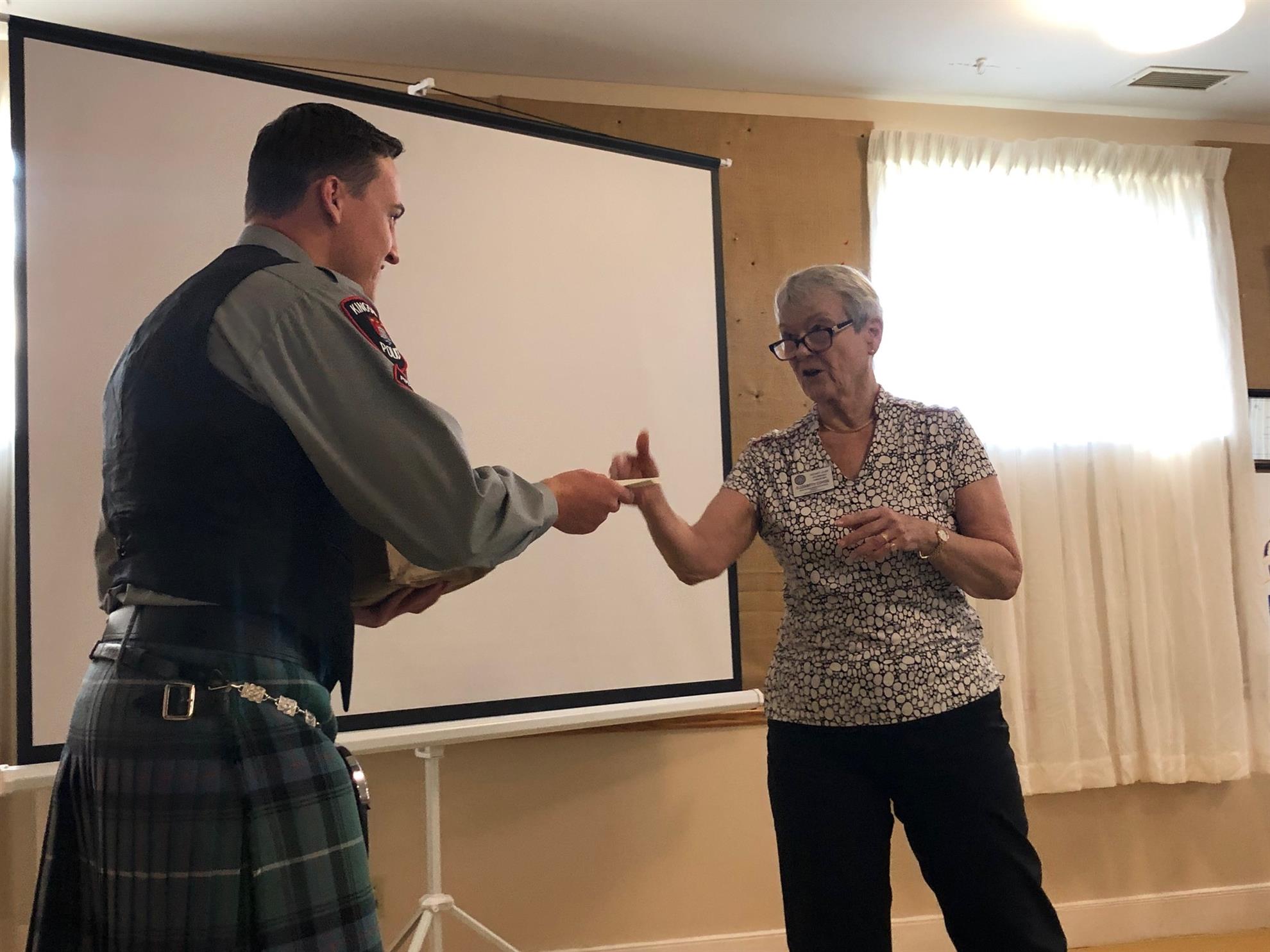 John' powerpoint presentation will be available on the club website. |
||||||||
Birket Foster - Bringing Clean Water to Northern CommunitiesRobert Reid introduced speaker Birket Foster from Chesterville Rotary to speak about the EOT (Emergency Operation Things) Project. Birket spoke at the District Conference last year and President Ana felt it was important for him to connect with us, because of our involvement in Indigenous projects through our National Committee. EOT really started from Birket organizing his high school reunions for Beaconsfield High School. A legacy idea emerged that might change people’s lives. Chesterville Rotary Club was already involved with Ryan’s Wells, helping dig wells in Africa, and someone said "why not do the same work here in Canada?" 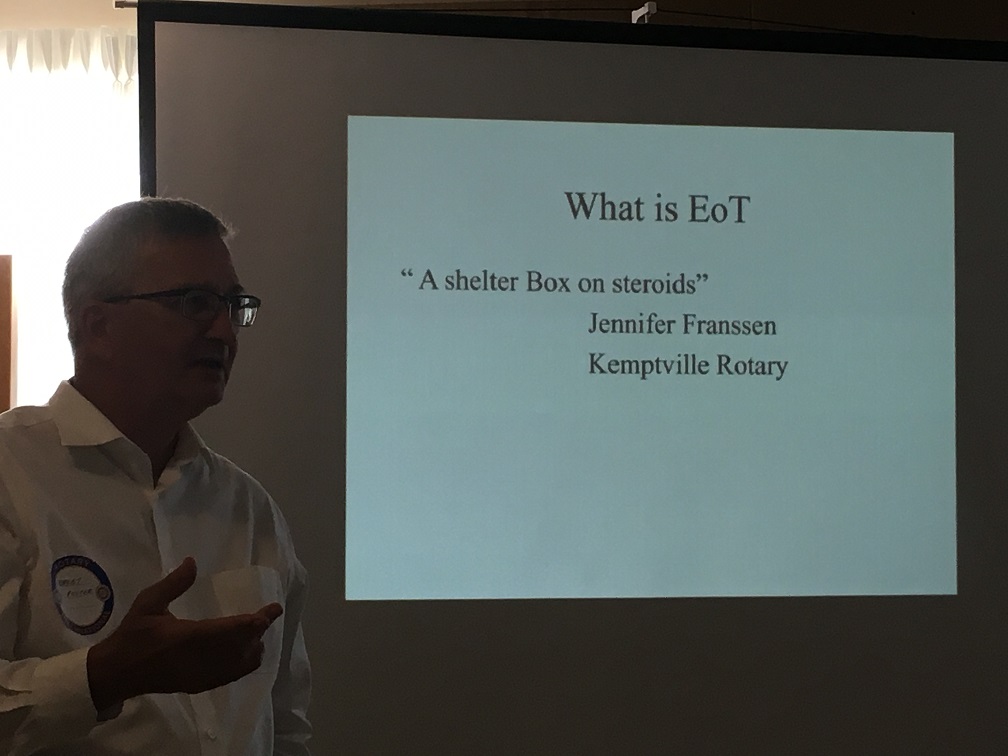 The problem in Northern communities isn’t just getting clean water - the need is also for enough pumpable water to put out fires. Last summer, two fire-fighting schools were set up, at two levels. This was the initiative of Connie Delisle, a person with indigenous background and experience with the Privy Council, as well as a public safety background. Jennifer Franssen from Kemptville Rotary got involved, as well as a couple of members from DART (disaster assistance recovery team) with their technology that provides potable water at the site of any disaster as soon as they get there.and a modified Shelter Box with stoves and water kits was created. All of these Rotary connections are bringing all the assets needed together - water, sewage treatment, power, and communications. The talk was full of examples of key aspects of the project being facilitated by making connections with people with specific expertise and experience; e.g., need for sewage, power, communications. Whenever he talks about the work to Rotarians, some speaks up with expertise and ideas to share. So the Four Avenues of Service of this project are: water, waste water, power, communications Key features that will guide the project are;
This is summarized in the flowchart below (apologies for any problems viewing the chart) 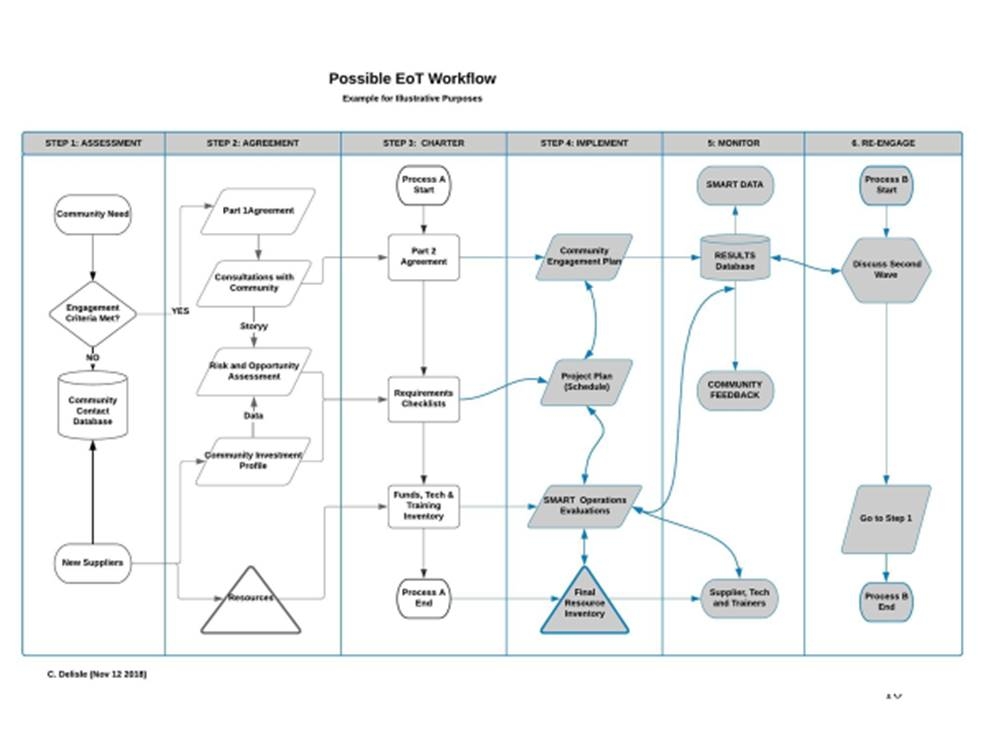 36 of our District 7040 clubs have said they want to help The overall philosophy is: accuracy first, then momentum. We need to understand community needs to get the ball rolling. The target is next year to launch. Q: What about provision of (electrical) power? A: Varies according to equipment. Need enough to run whatever equipment you have. In B.C., Jennifer stashed generators throughout province to ensure earthquake readiness. Example of new company using banks of small generators, serviceable locally, with heat recovery, heat battery, and energy server, etc. This resulted in huge change in Fort Providence, B.C., actually taking the town off the grid. The system stabilizes the community electrical system. A greenhouse is producing fresh vegetables year-round. The model looks like this;  see ssie.ca for details (Innovative Energy Solutions for Remote Communities) Questions and Comments Greg Mumford: An observation. Started with a discussion with the community. So much hinges on their wanting it, wanting to drive it. What are the criteria for working with communities? A: Yes. This is for the north. Onagotay: Nothing for the people without the people. If you don’t gather the people, what they want and need, it won’t work. Ed Thompson: Through my experience working in the 1980's, the big problem is in sustainability. Where does funding for that come? A: There are funds available for training. John Richards: Cost of assessment A: $80,000 approximately John Farrow thanked Birket with the traditional loaf of bread. |
||||||||
Update on the National CommitteeRobert Reid and National Committee had an update for us on their recent activities;
This project has been in the works for a couple of years, the brainchild of Janza Giangrosso. It is an Outdoor teaching circle at Loughborough Public School. Cataraqui Rotary has contributed trees around the circle; will become wonderful shade trees, and has facilitated the putting together of this project. Stones, portraying seven Indigenous values, labelled in Ojibway and English have been placed around the circle. The kids were very, very enthusiastic about the inauguration of the circle. They listened to an elder discuss Indigenous culture and teachings, who got kids to share their thoughts on the meaning of the seven values. This helps develop pride in land and encourages learning of their cultural heritage and language, and to understand more of the history of the land and the territory. Each child was encouraged to bring his or her own stone, to be placed in the circle, giving them a connection to this particular place. It is a beautiful and meaningful space, will be loved and honoured. Our club also has it’s name on a stone because of our sponsorship. The event was covered by local papers including Whig Standard and in the Kingstonist, and was front-page news in Kingston the week. President Ana was presented with a spirit catcher, made of Sweetgrass strands woven to be strong, symbolizing our being stronger together than individually.
We learned about this community again through Janza. Norfolk Sunrise Rotary Club has been doing regular work there. Our International Committee contributed $200 for food for a canoe trip, but it ended up being used for food for the evacuation centre after a forest fire. Once people returned, we contributed $2,000 to employ youth in bike repair workshop, housed in a cleverly repurposed shipping container. Also part of the project was the construction of a BMX track, trails, and employing youth to fix bikes for the kids. An inspiring video was shown about the project, which can be seen at; https://www.youtube.com/watch?v=PcGUqecXIJI&t=14s |
||||||||
Visiting Rotarians from India - Sister Club!Surprise speaker intro person Greta introduced our guests and guest speakers Deepa and Ram from Chennai, India. First up on the agenda was the official twinning of CK Rotary with Deepa and Ram's club, an idea put forward while the Friendship Exchange Team was in India. President Ana reminded us of Past-President Rick's close to all his emails: "if you want to go fast, go alone, but if you want to go far, go together". We want to go far with our mighty efforts, so the official twinning of our clubs make perfect sense - the clubs want to promote cooperation and understanding and carry out projects in their respective communities. We share similar interests, challenges, and history. We speak a common language from the heart, and we are going to work together on a project. |
||||||||
Karenna Chen - My Year in DenmarkPlease give a warm welcome to Karenna Chen – just back from a year in Denmark! Karenna was in Copenhagen, an old European city with tight, cobblestone streets, the capital of Denmark. While old, it is still a very modern city with modern conveniences. Denmark has been designated one of the happiest countries in the world, and the combination of city, nature, joy and urban life was very appealing to Karenna. The first thing she saw when she landed was the windmills and she was welcomed by a giant sign and 100 Danish flags by her host families. She knew this was the place for her! Karenna was also welcomed by a Danish birthday party – cakes in the shapes of men – you cut off the head first, and everyone screams! Karenna's first activity was an Intro Camp and lots of "touristing". She discovered Danes are not as impressed by the Little Mermaid statue as we North Americans are! The photo op was a quick run from the car and then back in and on to the next thing. Karenna went to a ‘music profile’ school, what we would call an arts school – with lots of practice rooms and instruments. They really encourage learning through experience. She rode her bike to school every day, and even took it on the train, which is par for the course in Denmark. It’s a challenge to get used to living without your own parents and with hosts. Her 3 families were all awesome. They were all families whose own children were doing exchanges. That's the way it is in Denmark. About 30 other exchange students were in Copenhagen – this was very helpful, especially in the beginning when being on exchange can be very challenging. Karenna said she now has friends in all corners of the world. Christmas was one of Karenna's highlights. It starts around mid-October and lasts till the middle of January! There is not much for Hallowe’en, so they start early. There are 100s of traditions, including extensive Christmas food…… Karenna also got to go to Sweden and see how they do Christmas there. Being part of a Choir – was a huge part of Krenna's exchange experience. She did A LOT of singing there – it was special to focus more on the arts, than on traditional studies. And there were performances a number of times. Karenna also loves baking, so she learned a lot of traditional Danish baking and shared some Canadian favourites like butter tarts and Nanaimo bars. She also commented that the Danes were a bit tough to warm up to, but once she did, they became great friends. There were trips around Europe including a trip to Barcelona with her class. A week in Dresden with the choir. Legoland! Then a 3 week trip around Europe at the end: Berlin, Prague….. so many places. Winter bathing was quite the experience! Karenna came to love it and did it often (hard no from your editor!). The down side - is was very hard to leave her families when it was time to switch – especially the first family, because they have to help you so much with everything when you are getting settled. 10 months went by in a flash – but Karenna took every opportunity she could: horseback riding, rowing, choir, Opera, Tivoli Gardens, handball and football matches (2 national sports of Denmark), searching out new experiences and the city itself. Karenna is very grateful. Tusind Tak – Thank you SO much. This would not have been possible without Rotary! Elizabeth Cohoe – How much of the language did you know before you went? Karenna -Very little. They speak mostly English there, so it wasn’t that tough. Rotary helped by giving weekly Danish lessons. I have a pretty good handle on the language now. President, Ana Sutherland thanked Karenna for her presentation and commented on all the pins, etc. on her jacket. Karenna was presented with thank you ‘butter tarts’, rather than bread! Karenna brought a banner from her host Rotary club! Karenna is a wonderful young woman, and we could not have made a better selection for Rotary Exchange. 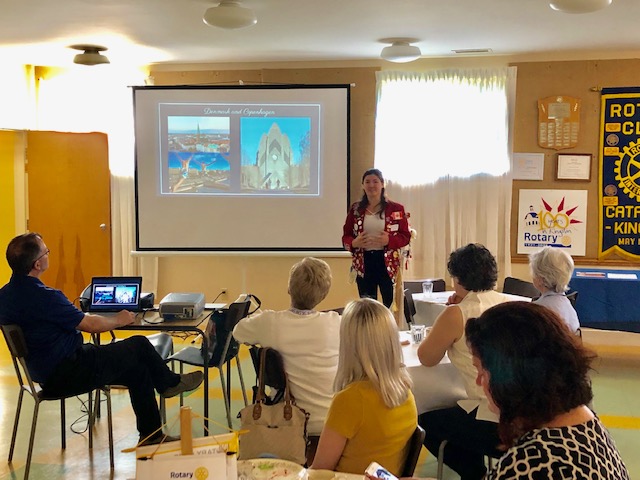 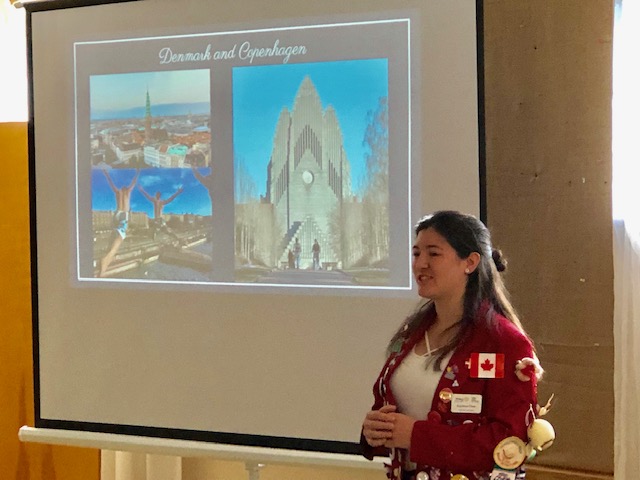 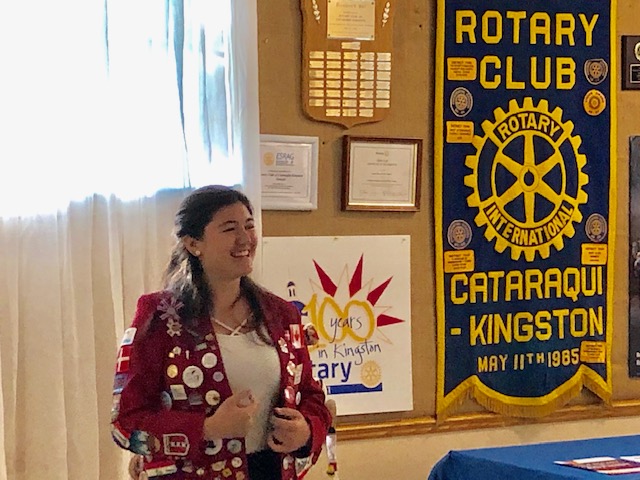 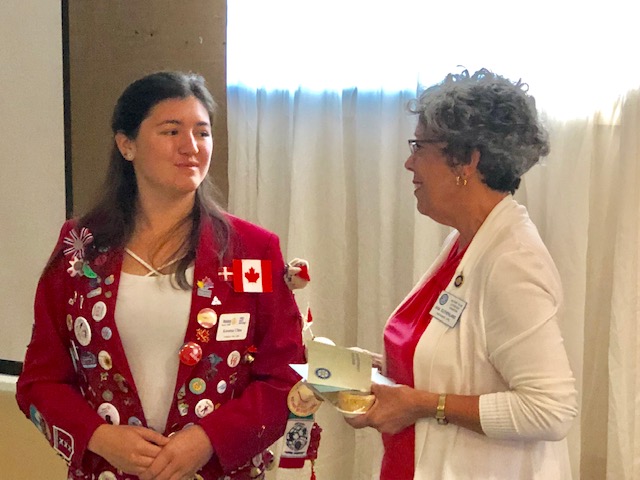 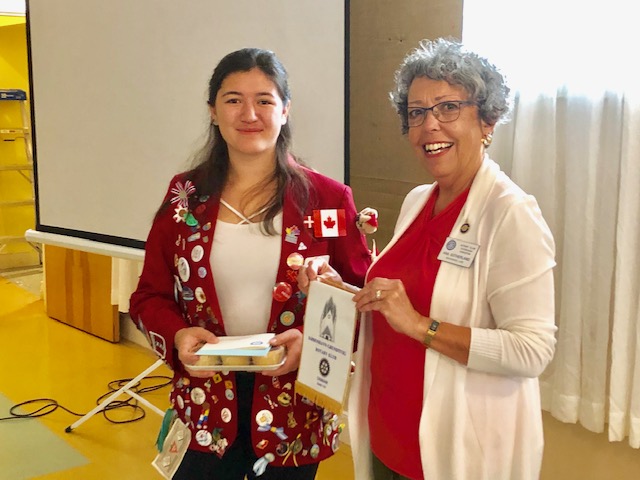 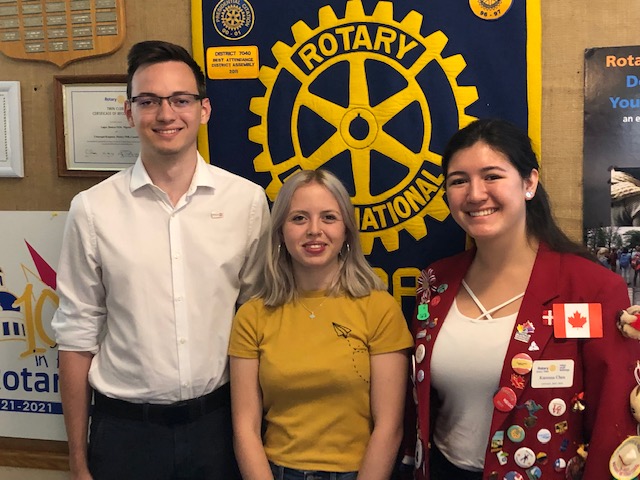 |
||||||||
President Ana's Address to the ClubThe King is Dead, Long Live the Queen! Happy Rotary New Year! Ana began here inauguraI address by thanking Past President Rick for the Rotarian of the Year Award that she shared with Greta DuBois. She is very grateful to be recognized for her contributions to the club. Our theme for this upcoming year is Rotary Connects the World - let’s unite and take care of the world as a group of Rotarians. Hakim with his world travels, John Gale with Pathways, Indian Rotarians arriving soon, Great with Friendship Exchange - we are Uniting the World! We’re 27 members and 5 Friends of Rotary and Zoe Mackenzie is coming back as a Friend. Rotary clubs everywhere are experiencing a decline in numbers and yet this small but mighty group at CK Rotary accomplishes so much – look to the future! Elizabeth’s Service Projects report was 6 pages long! We’ve been ever so quiet about the work that we do here at CK Rotary. It’s time that we speak a little more loudly about what we do. Get our name out there, invite people out, and please also consider mentoring younger members, as well. We have quite a few long-term members, and that is a great resource. |
||||||||
Rotary Year-End CelebrationPresident Rick called the “Rick Fiedorec Good Riddance Party” to order, and Terry Hicks led us in Oh Canada, sans piano. President-Elect Ana led the dinner parade, making sure Paul Malo’s table went last (it’s a tradition). A wonderful dinner with lively conversation followed, as members introduced significant others to newer members and Friends of Rotary. After dinner Ana made several announcements before the ceremonies began. Following Acknowledgement of Territory, a member was selected from each table to introduce guests. Wednesday several members were at Loughborough Public School, inaurgurating an outdoor classroom space. An elder spoke to the children. Thanks to Janza for facilitating this project. See the link to the story in the Kingstonist - https://www.kingstonist.com/news/loughborough-public-gets-indigenous-inspired-outdoor-teaching-space/ . The Club has been recognized for our contribution with an inscribed stone. Pathways to Education had their graduation ceremony at St. Lawrence College on Friday June 21st, with Ana, Ed Thompson and President Rick in attendance. President-elect Ana described it as a heartwarming event where 54 grads received their diplomas. We look forward to working more with Pathways. Finally, Heather Nogrady volunteered at the Skeleton Park Arts Festival, representing our club. Thanks Heather! President Rick reflected on the past Rotary year, thanking everyone for their support, and specifically mentioning his spouse Michelle and the Board of Directors and Committee Chairs. Rick also thanked Maya for being part of out family. Rick presented a small (liquid) token of appreciation to all, making Elizabeth “sing for her supper” as she presented a condensed version of the Service Projects report, elaborating on why and how we do the things we have been involved with. The breadth of what we have done with fewer members is amazing. The full report (or novel as Elizabeth calls it) will be sent to all members. Then the serious hardware was handed out! Rick Frasso and Ana Sutherland presented a thirty year perfect attendance pin to Terry Hicks, and recognized Bernie Allard (41 years) who was away in Nova Scotia (of course Bernie will have a make up). Paul Harris recognition was conferred on five members by Greta and President Rick – Elizabeth Cohoe, John Farrow, John Gale, Greg Mumford, and Terry Hicks (Rick’s choice). Greta Dubois and Ana Sutherland were very deserving recipients of Rotarian of the Year Awards. After exchanging Past-President and new President pins, Ana introduced the new and returning Board members and Committee Chairs, and remarked that the theme of Rotary Connects the World is something we already doing in spades. And of course, “Chase the Ace” was on the menu. The high-pressure job of pulling tickets was granted to Lori Farrow, and after 20 unsuccessful attempts and only 4 cards left, Terri Hodges found the elusive Ace and won $400. |
||||||||
Maya Bergerson and Farida Elsharkawy - Youth ProgramsThis morning we were lucky to have not one, but TWO amazing youth speaking to our club. Our inbound Exchange Student Maya Bergerson was introduced by President Rick for her final presentation to the club. 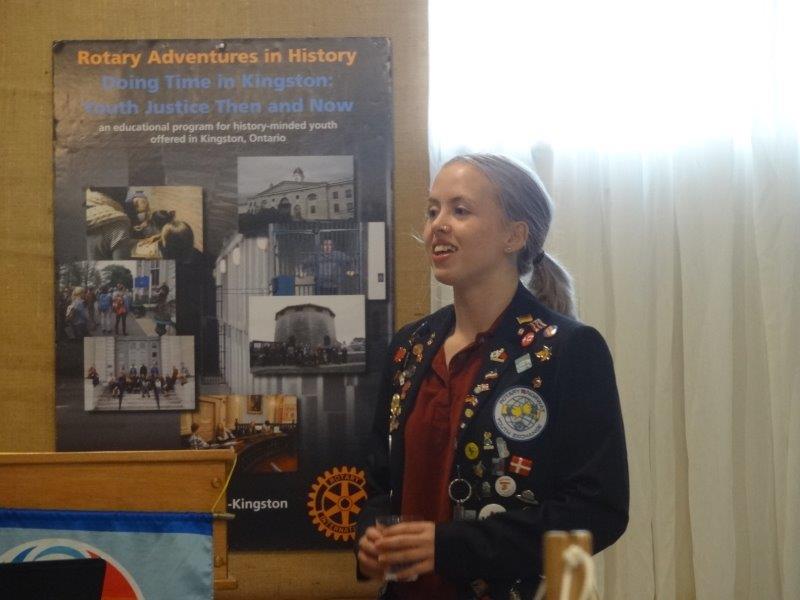 Maya has been with us since August of 2018. She was doing her final presentation on the eve of exams (with a bad cold), and when she was preparing to speak last week, she was taking time from the 8 assignments she had to do (thanks for fitting us in!) Maya showed us her first picture, taken in the Kingston airport, after a loooooong day of flying from her home in Norway to Germany, Toronto, stuck in Toronto, then finally in Kingston. Maya thought about what she’d say, and admitted she’s not good at taking pictures, so she has many pictures of her, not so many of her exchange! But she had lots of friends that did take pictures, lucky for us. Instead of the usual travelogue of photos, Maya wanted to talk about how the exchange has helped her and changed her as a person. Rather than trying to be “that exchange student” who dives in and does everything, Maya wanted her exchange to be more about experiencing what life is like for a normal teenager in Canada – going to school, eating greasy cafeteria pizza, and hanging out downtown with friends. She tried skating in the market square – much different than finding a frigid frozen lake in Norway. Maya’s exchange was about the small things – reading more for pleasure, writing bad poetry (not true, I’ve read some of it, it’s very good!), going to Starbucks, and doing the Polar Plunge. Maya enjoyed the polar plunge because she said if you want to do that in Norway you just go swimming in July! Going to the prom was a highlight (for her date too I’m sure), as was the visit from Maya's Mom and mom’s boyfriend. Chilling at school with her friends was also something that always made Maya smile. Maya was happy to celebrate the Norway National Day in Canada, complete with the required fancy cake. Her last weekend with her fellow exchange students was sad, lots of tears, but Maya realized that she has made friendships that will last forever. She closed by thanking us for being great hosts and being her second family. Answering questions, Maya admitted her favourite Canadian food is poutine, and hopes to do some camping before she leaves on July 10th. She is open for suggestions of things to do before she leaves. Maya was presented with a lovely bracelet and notebook to write poetry in by Heather Kembel. 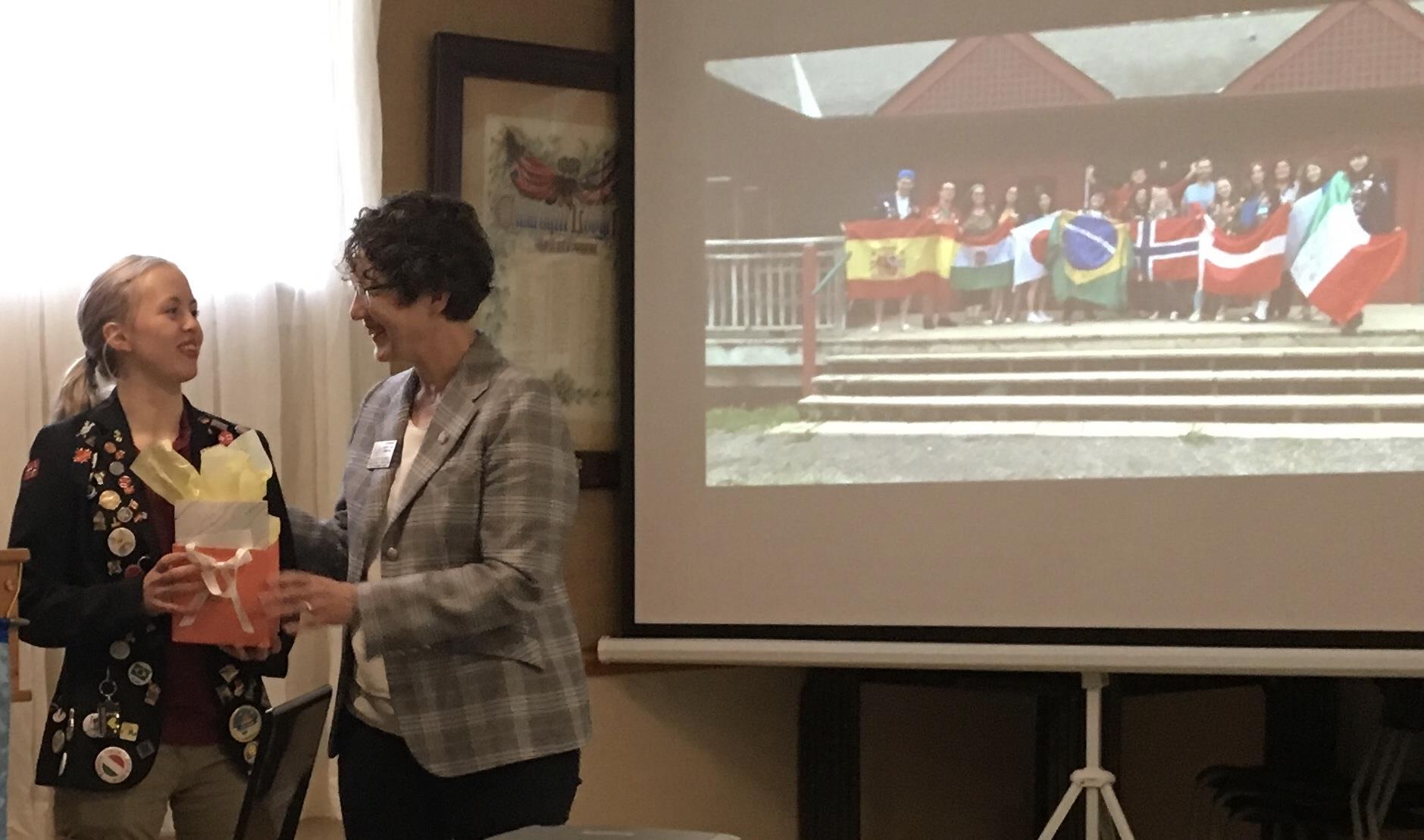 Greg Mumford introduced our second speaker, Farida Elsharkawy– she was sponsored for RYLA last year, and Adventures in Citizenship in May in Ottawa, noting she has made an important commitment when the new high school opens (more on that later). Farida is a grade 11 student at KCVI who thanked us for sponsoring her for programs that she says will make her a better person. Adventures in Citizenship is a week-long program in Ottawa, and luckily Farida’s host dad for the week has served in Egypt in the military (Farida moved to Canada from Egypt 5 years ago). And, her host mom was a physiotherapist, which is what Farida wants to do as a profession. Archives Canada was the base for the program, but Farida got to visit many other places – the War Museum, which she wants to go back to, and the relocated House of Commons, which gave her chills when she thought about the big decisions taken there for our country. Even the technology of the House amazed her. One of her big takeaways was the motivation she received from the amazing speakers. A self-described procrastinator, Farida vowed to change that. It was a wake-up call for her about how much other students are doing, and she remarked on the friends she made and how she will keep up those relationships. RYLA was another great program that involves coming up with a project the you will implement at you school. Farida was fascinated by the proposals to set up an Interact club, and really wants to set up a club at the new high school, and has a teacher interested to help. Answering questions, Farida wanted to become more involved outside of school, so the Rotary connection in the programs piqued her interest. One of the speakers she was very interested in was an immigrant who ran into trouble with the law and turned his life around. One of the most interesting questions came from Martin Thomas, who wanted to know if Farida has reflected on what her life would be like if she had stayed in Egypt. She responded by saying the she loves Egypt but would not be the person she is today if she was there, because she wouldn’t fit in with the conservative society. The idea of community volunteerism is lacking, as are activities outside of school. But maybe she will return to make some of these activities happen. Farida also spoke of her school activities and her passion for rugby – playing, refereeing, and teaching younger kids the game. President Rick presented Farida with the usual loaf of bread. 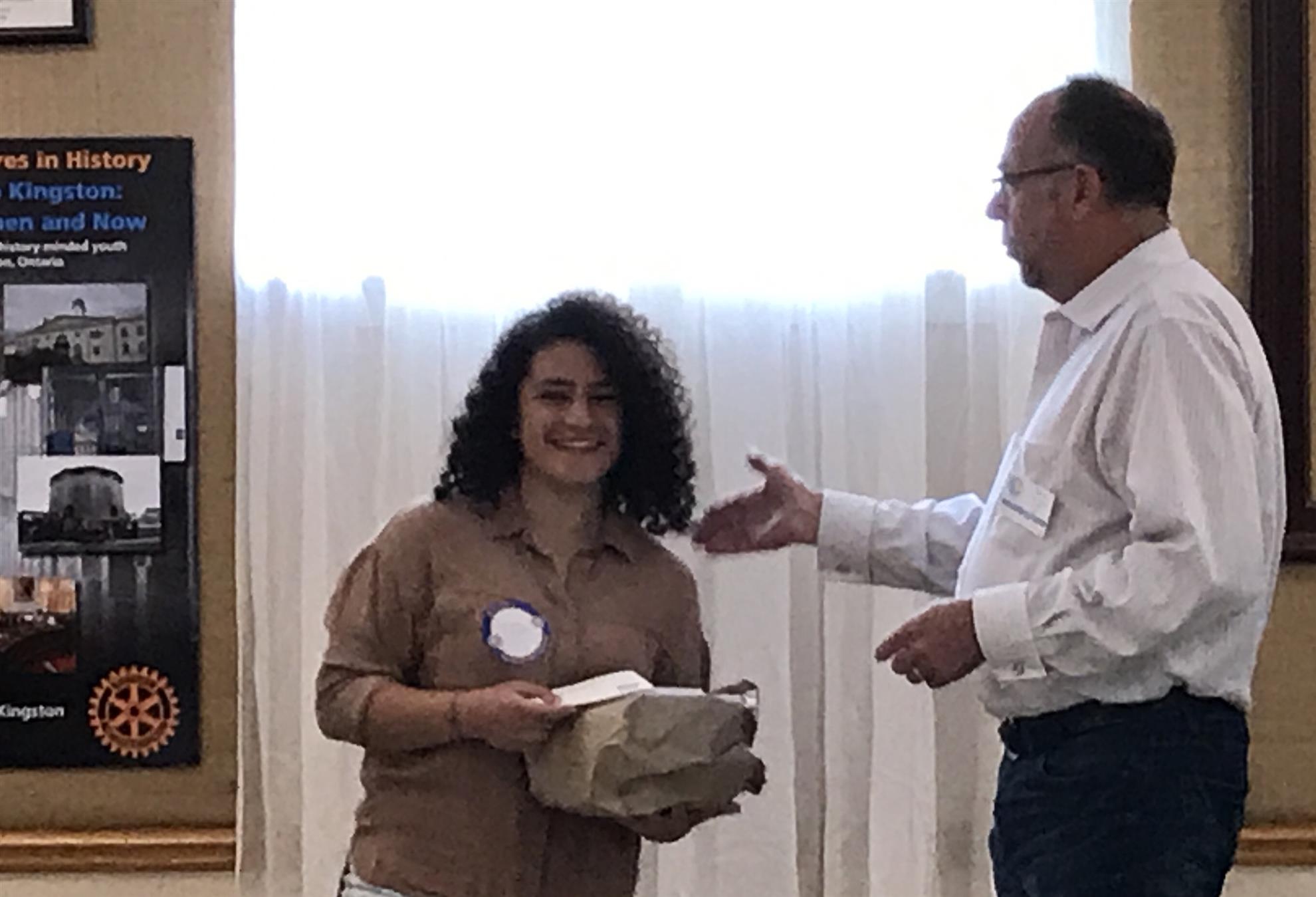 Yet another meeting where youth stole the show. 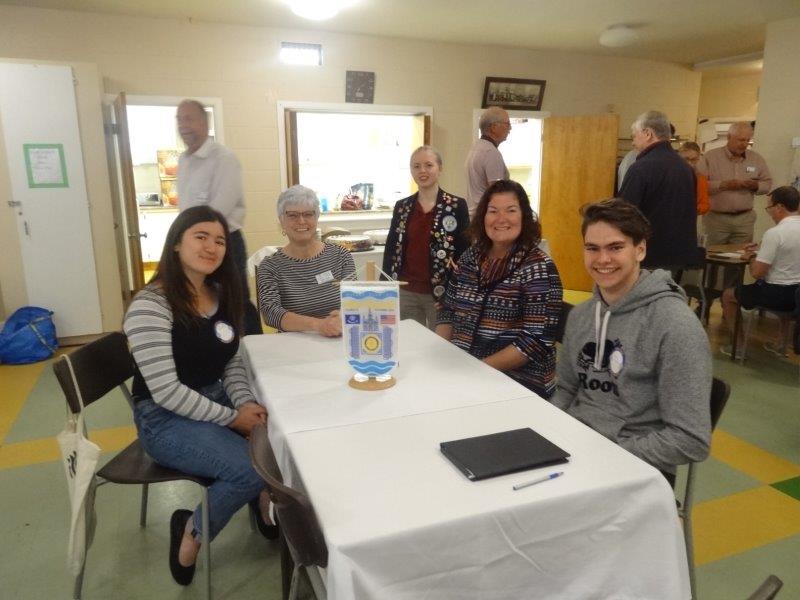 Inbound, Inbound, Rebound, Mom of Rebound, and Bestie of all Exchange Students! |
||||||||
Mayor Bryan Paterson - The State of the City |
||||||||
An Update on Youth Programs and Kingston 2021This morning, with no scheduled speaker, we received updates on many ongoing programs, mostly about our various youth programs. Kingston 2020 Celebrations President Rick gave us plenty of advanced notice on several events; Sunday, July 19th 2020 - Birthday Bash at Rotary Park rain or shine (there will be a tent in case of rain). This will kick off the Rotary in Kingston centennial year. Friday, June 25th, 2021 (advanced notice – expect full attendance) at St. Lawrence College – Rotary Gala, tickets will be $100 per person – light entertainment, 1 speaker for 10 minutes, Rotarians from Australia and New Zealand will be joining us. This is not a fundraiser but a celebration of Rotary's 100 years in Kingston. Monday, June 21st 2021 welcome barbecue for Rotarians from Melbourne and Auckland. Location is yet to be determined. Please get these dates in your calendar! Notes from the South African Friendship Exchange John Farrow read letters from South African youth that went on short term Rotary Student Exchange. these young men were introduced to us by our visitors from South Africa. Last week Urban Ruins, who is supporting these young men (1 to Germany, 1 to Argentina) passed along emotional letters of thanks. These are both young men whose lives will be changed dramatically by their experience. Thank you everyone in the club who supported this student exchange with donations or good wishes. Adventures Programs Greg Mumford reported that we’re supporting Adventures in the Environment which is well subscribed; Adventures in Understanding, although it is harder to find a candidate; Adventures in High Tech in Ottawa in October. We haven’t sent anyone in a few years to this, so we are hoping to return; we are looking to start an Interact Club sponsored by us with Pathways as a partner. And of course Greg has Bingo and Auction in his spare time! |
||||||||
Pat Brown - A Life in RotaryPat summarized her many years with Rotary International – the joy of meeting other people, whether it be locally, or, beyond borders. She has never regretted taking on any role, or, the many positions she has chaired over the years, from President, Secretary, District Conference Chair, District Rotaract Chair, and many more. Pat encouraged everyone to “ get involved “ and take on a leadership role within the club, District, or Rotary International. Pat believes it has been a tremendous learning experience – and opened her eyes to the world. Pat has many fond memories of Rotary and said it has become an important part of her life, – the “icing” on the cake – meeting Arnold, her partner for life. Michelle thanked Pat with the traditional loaf of bread this morning. 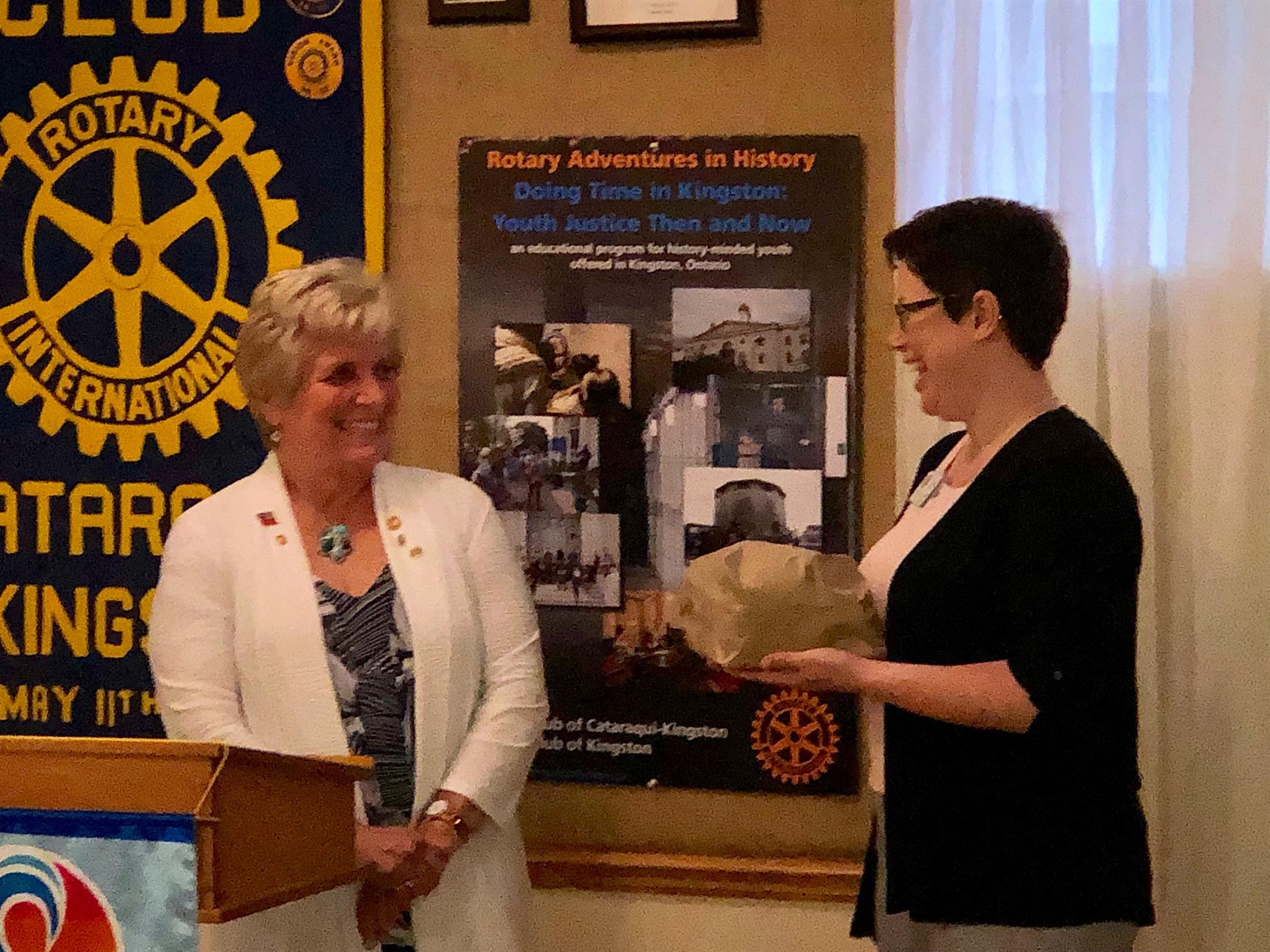 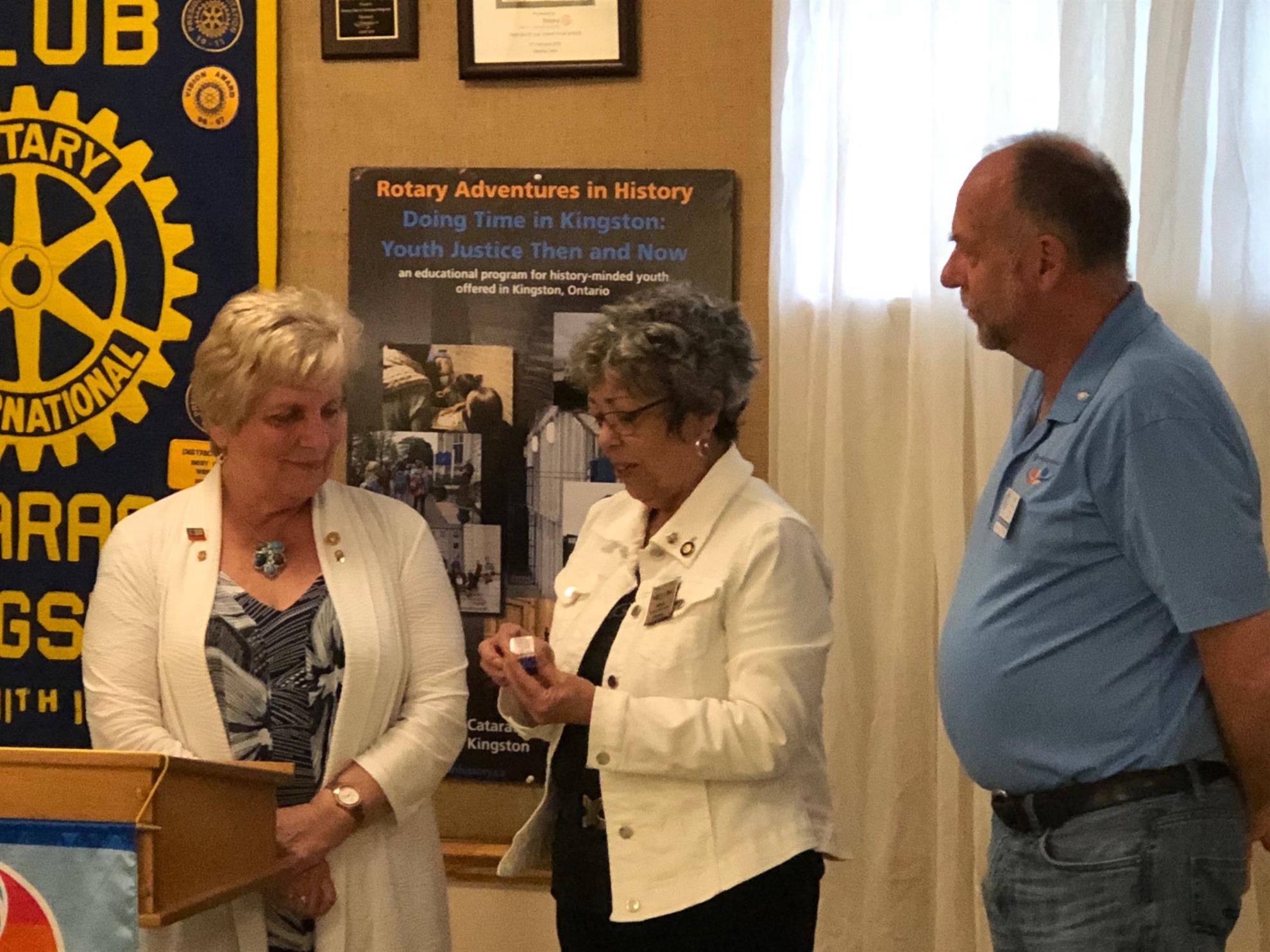 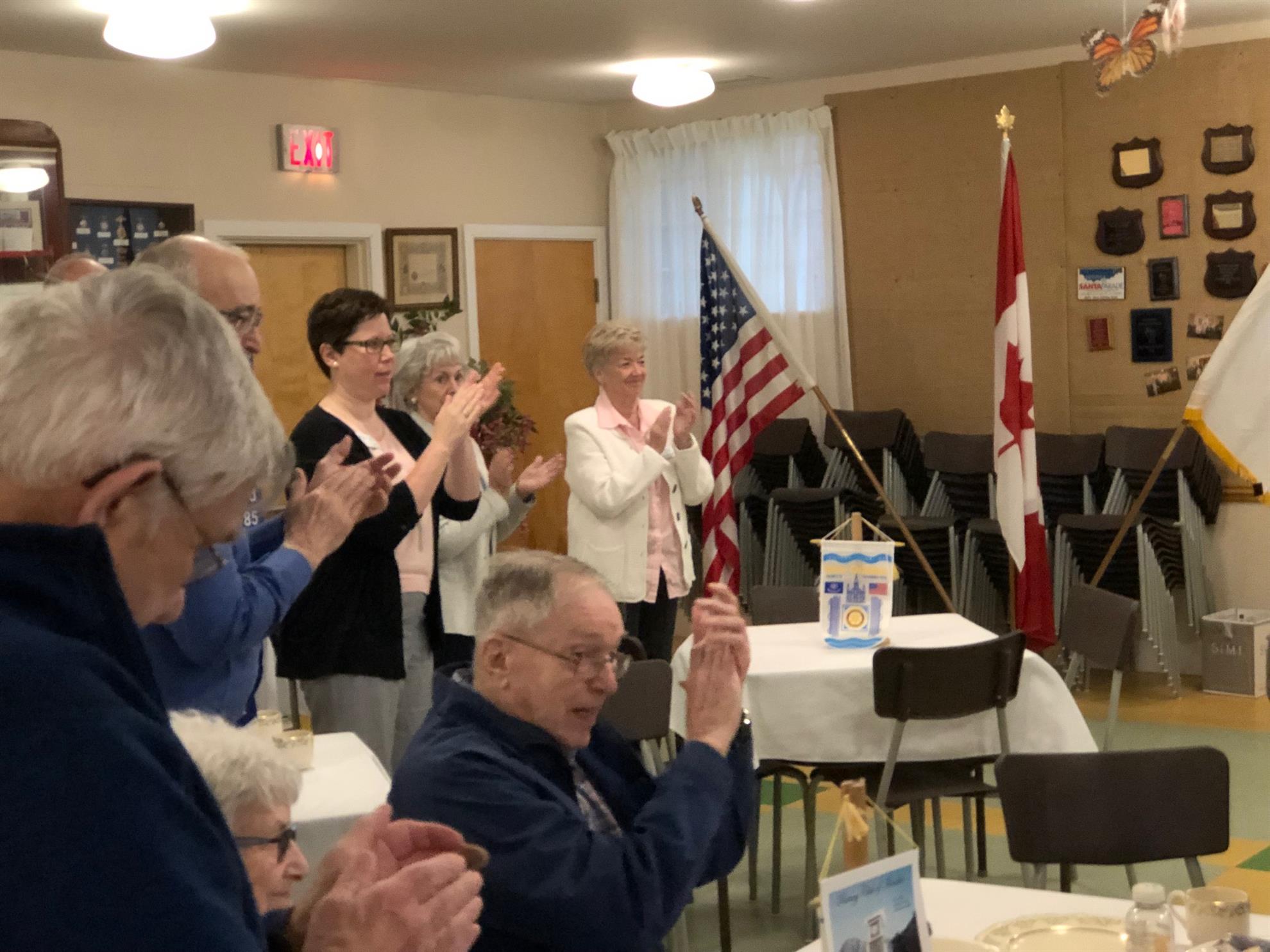 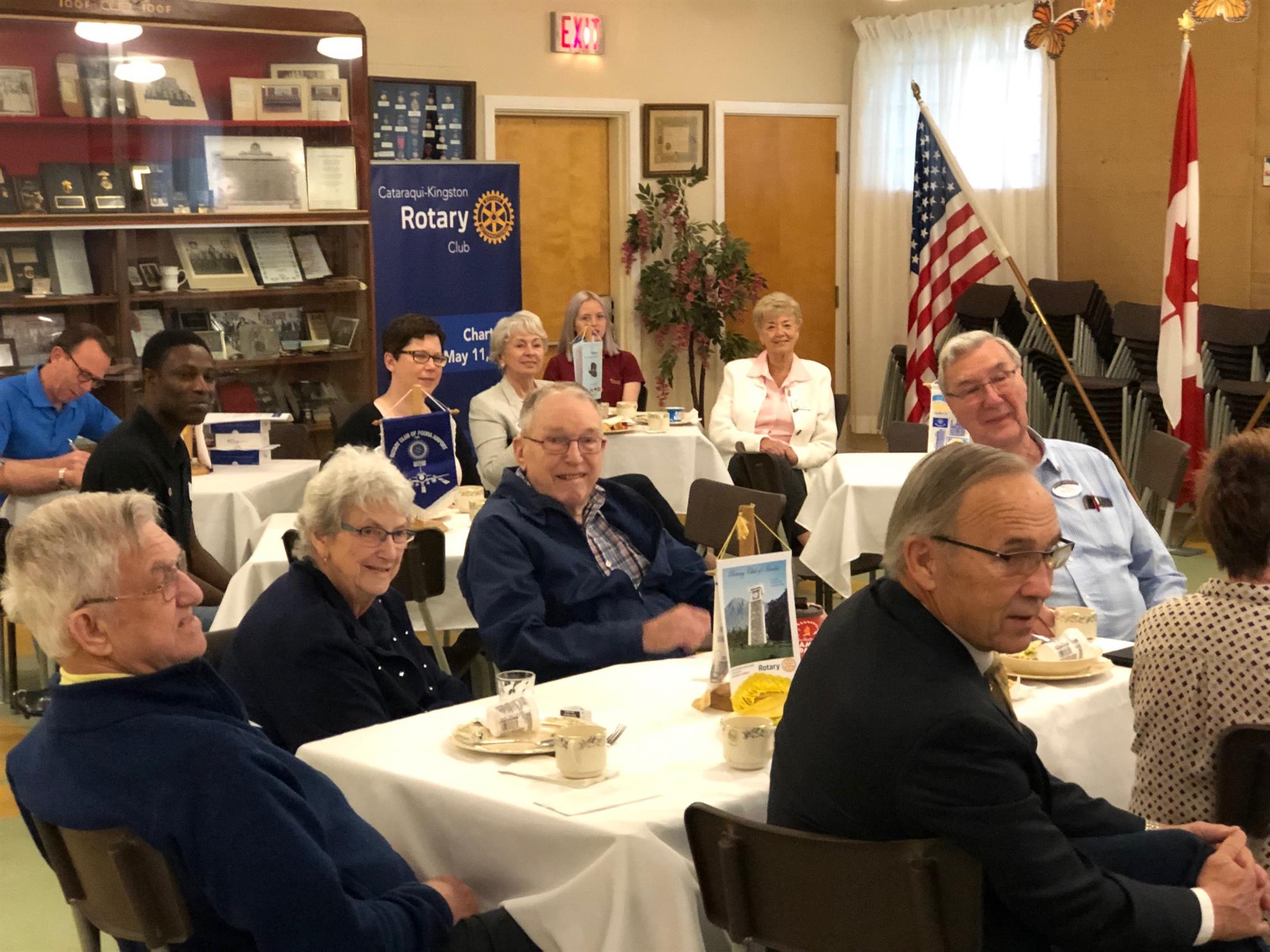 |
||||||||
Jackie Blakney inducted May 21 2019Welcome, Jackie Blakney, as a new member of the Rotary Club of Cataraqui-Kingston. Rick Frasso read the induction precepts, and all present welcomed Jackie. Her classification is Real Estate. Her service will include participating in fund-raising through Bingo and the Auction. She was welcomed to attend all committee meetings. Jackie looking forward to meeting all the committee chairs and finding her niche for service and fellowship.
|
||||||||
Odd Fellows and Rotary--Past Grand Master Mark Blakey May 21 2019
President-Elect Ana Sutherland introduced Mark. Ana had met with Shirley Blakey, who suggested that our club consider using the Odd Fellows Hall for meetings. That led to the Odd Fellows Hall becoming our meeting place earlier this year, and then on May 21st. It seemed a natural step to invite Mark and Shirley so that we could learn about our hosts and their organization. We discovered many parallels of values, fellowship, and service between Odd Fellows and Rotary.
|
||||||||
Member Recruiting with Letters of IntroductionPresident-Elect Ana spoke on behalf of the Membership Committee this morning. Like other clubs, we have more members leaving than coming in. This is a club issue, not just a Membership Committee issue. We need to speak to people about our work in Rotary to inspire them to join. We have a nice new home, and need more members to do projects and give us the energy a vital club needs. And of course we learn from others when they become new members (and keep learning from them). We have many unfilled areas teachers, lawyers (yes more lawyers) and many other classifications. How do we recruit effectively? We have a new invitation letter, which will be shared with club members. It is personalized and we can discuss the classes of Rotary Membership when a guest shows interest. Several questions and suggestions from the membership followed;
All agreed the letter was a good start for recruiting. |
||||||||
Spring Grants PresentationsThis year, Cararaqui-Kingston Rotary received 7applications for funding from diverse organizations in Kingston and area. Proposals were reviewed by members of the Service Projects Committee and evaluated against the criteria stated in the Funding Application. The Cataraqui- Kingston Rotary Club had $18,000 , earned from bingo and other fundraising activities, like the Rotary On- Line Auction, to grant to the 2019 Spring Grants program. $5,000 was set in reserve to support a Centennial project in 2021, leaving $13,000 for Spring Grants. Five grants were awarded. A presentation ceremony was part of the regular meeting on May 7, 2019 at our new location , Oddfellows Hall, 218 Concession St. The winning organization proposals granted include: |
||||||||
Karenna Chen, Exchange Student to DenmarkKarenna Chen is our club's Rotary Exchange student, spending her year in Denmark. Karenna has been updating us on her year away, and here is her spring update: Hej Françine og Joanna, Jeg håber, at det går godt i Canada. Det går rigtigt godt her i Danmark. (I hope this is going well in Canada. It goes really well here in Denmark.) Everything is just getting better and better here. I moved into my 3rd host family in the beginning of March and they have been absolutely wonderful. I have two host siblings, a 15 year old girl named Josephine who will be going on exchange next year to Kansas and a 18 year old boy named Sebastian who also does a lot of music. I get along very well with both of them and my two host parents who are so lovely. However, I can't say it was easy to say goodbye to the 2nd family. I am glad we have kept in touch but I do miss them. I just came back from a trip to Barcelona with my class which was so amazing. It was through the school so they planned a lot of interesting activities for us, from dancing flamenco to touring Gaudi's architecture. It was a really wonderful opportunity to get closer to my classmates and my friends. In late March I was also on a trip with my choir to Dresden which was fantastic. We got to perform for a range of audiences, see an opera and really get to know everyone in the choir. Those two weeks were so special and so much fun. Regular school is coming to a close now. The last day of classes is May 16th but in the meantime, there are a lot of projects to do before it's over. Overall school has been good although I feel like it has been a while since I have been. We were in Barcelona and now it is Easter break so we have the whole week off of school. When we get back there are only a few weeks left! Rotary has also been going very well. I am in the process of preparing a performance for our district's Inspiration Day. I will be singing for the gala that night. I am involved with my club and I must say that I am a bit disappointed that their next service project is after I go back home. I would have loved to have been involved. I am currently staying at my counsellor's house for this Easter week as my host family is going on a trip with their grandparents. It has been quite wonderful to see how so many different families work. Every family is different. It is now two months until I am back home which feels like it is so soon. I am also going on Eurotour so it is just about 4 weeks left where I am actually in Denmark! It will be hard to say goodbye but I am so grateful for the wonderful experience I have had here. I know that this won't be the last time I am in Denmark either -- I love this country too much to not come back! All in all, I have been having a wonderful time here. Spring has come and the trees are starting to get their leaves. The weather is warm and there is no where else I'd rather be. Best wishes, Karenna 1) On the top of Montserrat (about an hour drive from Barcelona) with my class 2) At Gala, the Danish version of prom 3) The cherry blossoms are only in bloom for two weeks but I got out to see them with my host family 4) In Leipzig, Germany -- we visited when we were in Dresden 5) Riding my host sister's horse (not an experience I was expecting to have but a lot of fun!) 6) Every exchange student has Legoland on their bucket list and I got to go! 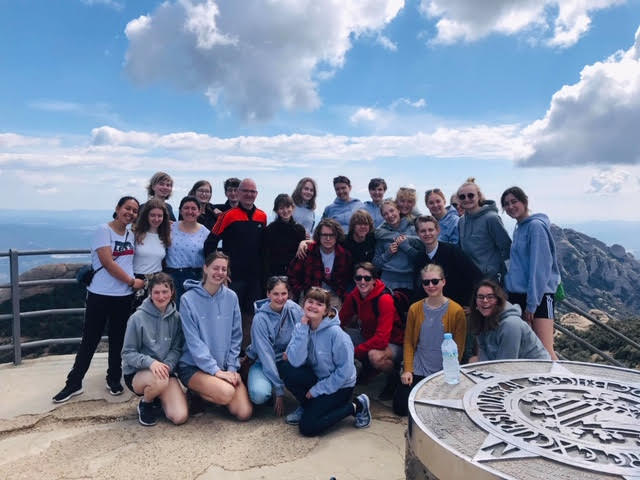 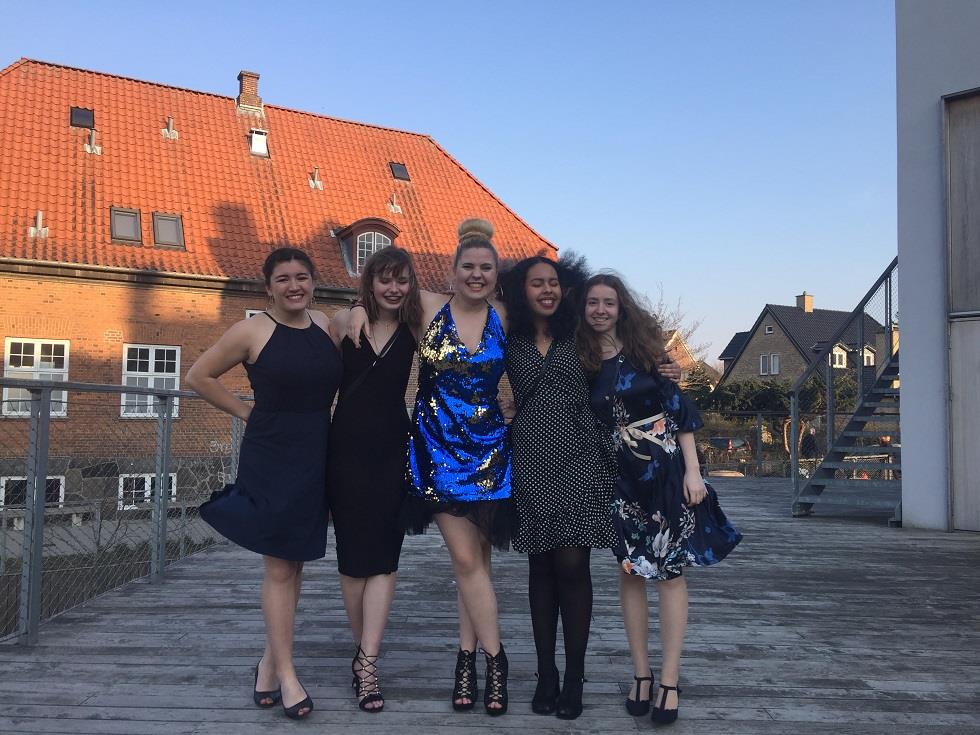 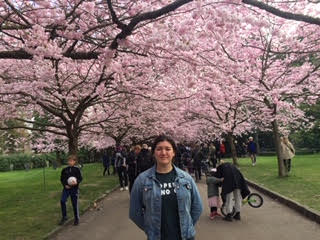 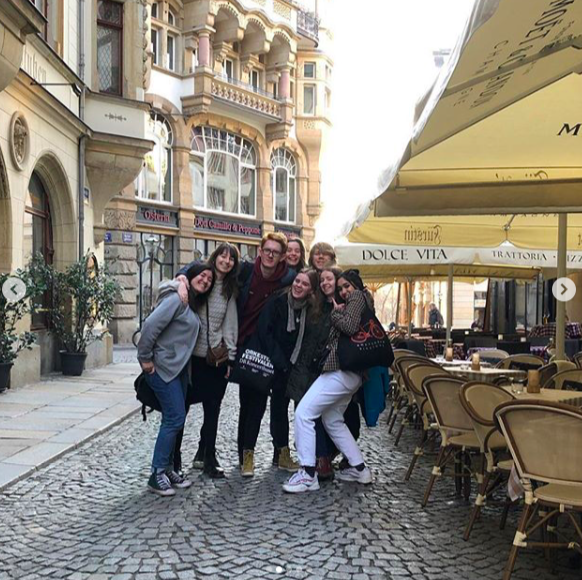 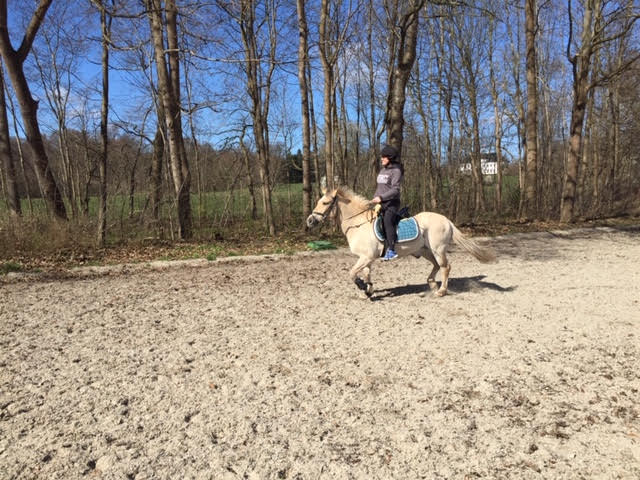 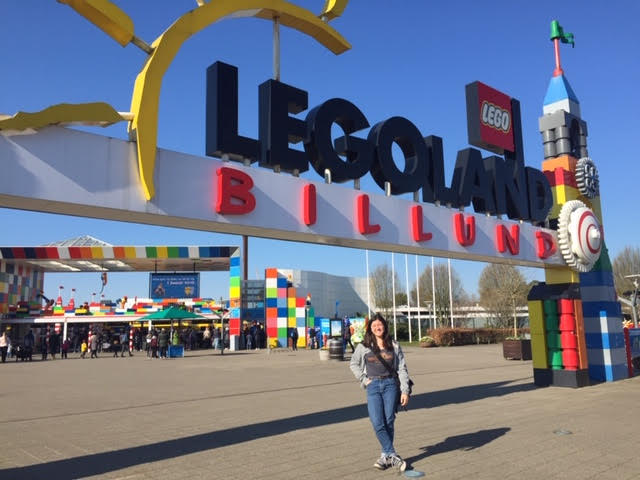 |
||||||||
Jeffrey Hodgson, Canada Pension Plan Investment Board (CPPIB)John Gale introduced guest speaker Jeffrey Hodgson, Director of Industry and Stakeholder Affairs/Public Affairs & Communications with the Canada Pension Plan Investment Board (CPPIB). Jeffrey grew up on a farm outside Prince Albert, Saskatchewan, a town with 492 people and 2 service clubs. As a teen, got to go to the Terry Fox Centre in Ottawa because of the contribution of the Lion’s Club and that set up a path of post-secondary education, and a life in public service. He remarked that Rotary is much like the CPPIB, because it also takes a long term view. Planting the seed of sending a young teenager across the country pays benefits far down the road. There are many facets to financial stability for retired Canadians: workplace pensions, private savings, Old Age Security (OAS), then Canada Pension Plan (CPP). CPP was created in the 1960s when the government felt something else was needed to support retired Canadians. It was a pay-as-you-go system until 1995 when it appeared CPP was going to run out of money by 2015. Lower birth rates and increased life expectancy meant fewer workers to support more retirees. So, in the 1990's the country’s political parties worked together to come up with a solution: increased contributions, slightly decreased benefits, and an arms-length agency set up to manage investments and improve returns (the CPPIB). It worked! And CPP is now funded for the next 75 years! (More on that later) Jeffrey talked about what are Canadians thinking today: 66% are worried CPP will run out of funds. 56% are worried that government raids or will raid CPP funds. There is a general lack of confidence given that CPPIB is arms-length, and the 1990's scare about lack of funds. We also hear that the US system (Social Security) will be depleted by 2031 and that big story influences attitudes. Canadians also hear about private plans running out of money (Sears). The basics of CPP are; a maximum payment in 2018 of $13,610.04 per year; the average Canadian collects $6,726.48. CPP is not the ‘be all’ or the ‘end all’ of retirement income. The latest reform was a 2016 decision to expand to $20,000 per yer maximum benefit. The CPPIB manages more than $368 billion and has more than 1,600 employees with offices around the world (Toronto, London, and Hong Kong which is the largest) and is the 8th largest pension fund worldwide. The CPPIB is reviewed every 3 years and the Chief Actuary for Canada confirms that the CPP will be sustainable for 75+ years. Please pass this message along! It is important to change the narrative around CPP. The CPPIB’s job is to achieve the fund’s returns, not make the policy decisions. It manages the investments but doesn't deal with eligibility or benefit levels. The good news for Canadians is that the CPPIB has a net return (annualized) of 10% over 10 years! The CPPIB has a professional board comprised of people with experience in the financial services industry, and they operate independently and at arms-length. The Canadian Government cannot influence investment decisions. Before the CPPIB, CPP funds were invested very 'passively'. Now there is a more ‘value-added’ approach as of 2008 and they are more active investors. Size and scale is on their side, with professional managers, a long investment horizon, and the ability to take on more equity risk because all the funds are not being used. CPPIB has moved more into infrastructure investing and long term assets – they own parts of the largest British port manager, the 407 hwy, Puget Sound energy and more. What about social consciousness? Jeffrey is also responsible for Sustainable Investing – the CPPIB believes in integrating sustainability factors into their investment decisions. They ask/work with organizations to influence/engage their decision-making in these areas and be a positive force for change. Jeffrey said they want to be active and engaged owners, voting nearly every proxy they are entitled to – several thousand in fact!! There are some ‘no go’ areas - for example, they would never invest in a company making land mines, but push companies as investors to look for long term steady gains and ethical operating principles. 85% of funds are invested outside of Canada, with 15% Canadian exposure. Like most of us, this allows better diversification of funds. Largest market is invested in is the US, but China is growing in importance (now the 2nd largest economy in the world). They have a bit in South Africa, but are a bit cautious about some countries. CPPIB does look to emerging markets; China, India (soon to be world’s most populous country), Brazil. Bill Grey thanked Jeffrey, noting that the conversation to get him here started in 2011…… The story of the CPPIB is such a good news story for Canadians. |
||||||||
Kraig Everard, WPBS WatertownMurray introduced Kraig and welcomed him. Kraig noted that in his business, if you aren’t hearing back from people then maybe your method of communication isn’t right (a thought for auction action). Kraig has been with WPBS for over 11 years in various roles, and now leads the fundraising, programming and development. Some facts and history: WPBS Watertown has 2 towers in northern NY and broadcasts into Canada, boasting a membership base of 70% Canadians. As a public broadcaster, WPBS has a public mission and is a distributor of programs not a creator of content, and relies on non-advertising revenue – over 25% from memberships held by “viewers like you” - to fulfill its mission on the public airwaves. Decisions have been made locally since 1958, when the station began with a 1 hour broadcast of the Boy Scouts program, and through its affiliation with PBS which began in 1969. In 1998 it changed its call letters to “WPBS”. In 2009, members banded together to avoid having the channel dropped by Rogers as part of the basic package…a great illustration of how committed the membership is to the WPBS station and how raising one’s voice has an impact. PBS has been voted #1 in viewer trust for 16 years. Kraig reviewed some of the production at the station and asked something of us: “if you had a TV station, what would you do with it?” District 7040 leadership is exploring ways to partner with WPBS (Kraig is joining a Watertown Rotary Club). Editor's note: Just to add to Michelle's coverage, I spoke with Kraig at length at breakfast. He is born and raised in Carthage, near Watertown, and studied broadcast journalism, but decided his place was behind the scenes, not in front of a camera (although I think we all agree he would be excellent in that role). He is a dynamic young man who will make a great addition to District 7040, and we will probably see more of him as he explores the possibility of partnerships with our District Following some questions from Rotary members, Ana thanked Kraig for his enthusiastic and informative presentation. |
||||||||
Lynn Brown, KFL&A Health Unit, Preventing FallsPresident Rick called the meeting to order, more or less on time, and our pianist extraordinaire, Terry Hicks led the 16 Rotary Club of Cataraqui-Kingston members present in a rousing rendition of O Canada. Following the Rotary invocation, Elizabeth, our Fun Mistress, quickly organized our breakfast parade and all enjoyed the bounty of the catered breakfast with much fellowship and interesting conversation. John Farrow introduced Lynn Brown, Falls Prevention Ambassador with KFL&A Health Unit. Lynn is a former nurse and now volunteers with KFL&A to educate seniors (65+) and others who support seniors about fall prevention. It turns out falls aren’t directly related to age, despite the highest rate of falls being seen in adults 65+, but the circumstances and environment in which a person finds themselves. A handy fall risk checklist was presented and a discussion of the consequences of falls – a main one being fear of falling again! Good news: most falls are predictable and preventable!
Overall healthy choices: nutritious food choices and adequate hydration, bone health consciousness including weight bearing exercise weekly with 150 minutes of moderate-vigorous physical activity, regular physician check-ups including vision and hearing and always tell someone if you have fallen and hit your head, emotional health with social activities and some daily laughter will also help. A brief poll: of the 16 present, 8 had experienced falls!! Slippery conditions require a different approach to walking: walk flat-footed and slowly (like a penguin), keep centre of gravity over feet, wear books with proper winter treads and non-skid soles. There is a new website for rating boot treads: www.ratemytreads.com and you can also consider crampons or cleats for outdoor activity. Regular home safety checks are important…engage your grandchildren in tidying up possible hazards. Secure cords around living areas, lighting to hallways and stairs and exterior, consider high risk areas carefully such as bathrooms, housing entrances/exits. Tips for safety: keep a list of your medications with you (something others can read), be very careful about mixing alcohol and medications and consider Canada’s guidelines for low-risk alcohol consumption is limited to 2/day for women (max 10/week) and 3/day for men (max 15/week). Do you know? Standard sizing for alcoholic beverages is 12oz beer/cider/cooler OR 5oz wine (red or white) OR 1.5oz spirits Lynn provided a complimentary tote bag filled with helpful guides. Yay Lynn! 😊 Questions from the floor: Robert noted a mobility-focus at his gym, Elizabeth asked about new Canada Food Guide, John F. noted the ortho-clinic in hospital stressed the importance of not smoking for bone health, and Terry Hicks shared his positive experience with regular and strong exercise at the Y’s Heart Club over the last 6-7 years. Martin and Anita provided some questions and comments on the new Food Guide. John Richards thanked Lynn with our traditional gift of a loaf of bread. |
||||||||
Janza Giangrosso on Pikangikum First NationJanza joined the OPP as a police officer in 2005. Her last assignment was a fly-in to Pikangikum – 500km north of Red Lake on Easter weekend 2010. The 20 year old pilot and landed on a short, gravel runway. Janza was greeted by an 8 year old girl who had nailed 2 hockey sticks together and wrote her name on them – a cross for her grave, and she asked if Janza would shoot her. Many other kids were wandering around with shot guns shooting dogs (many run wild and are a risk.) Only 20% of Pikangikum homes have electricity and running water. That means 80% of homes don’t have toilets! If it’s really cold outside you just throw your family’s waste bucket out the back door. The soil and lakes are SO contaminated with waste that they can’t fish or grow produce. There are no roads, no streets, no addresses, and no garbage collection (garbage is even thrown on roofs.) The residents pay over $80 for a case of Nestle bottled water, $16 for a bag of apples, and $13 for a cauliflower. Fresh produce costs SO much. The police detachment had these good facilities and were disliked for it. Officers had fire axes in their trailer in case we had to hack our way out if our trailer was set on fire in the night. One night 5 kids under the age of 14 lit a house on fire because they were bored. These stories reflect the difficulty and despair of the community. Janza has since taken a leave of absence from the OPP and has been working on building relationships with the community of Pikangikum. When she got home, Janza realized she was pregnant with Nessie – she was there with her the whole time :) Last summer Janza met with the teacher that teaches art at Pik – and asked what we can do. The teacher replied that they don’t need anyone to swoop in and rescue them, but rather they need to find some purpose. So, 6 healing blankets were made and sent them to Pikangikum and they were given to the students who needed them the most. People collected 350 pairs of socks and mittens this past fall and sent them to Pikangikum – but somehow it just doesn’t ever feel like enough. Here, at Loughborough Public School students created a Wampum that placed 2nd in the Imagine A Canada national competition. This year they created another Wampum – What dish do you want to feed your grandchildren from? And the kids were asked to imagine what life would be like if we had a closer relationship with the land. There are many ways to help, but If you do nothing else – watch the documentary First Contact. Janza was thanked for her presentation by Robert Reid. Janza's Power Point presentation will be made available to club members |
||||||||
Kingston 2021 Rotary Centennial DiscussionWe’ve had a few presentations on potential projects lately, as well as celebrations throughout the year. July 19th 2020 Birthday celebration at Rotary Park. We should be prepared for upcoming costs – President Rick thinks we should set aside at least $500 to help fund this. Kingston Club is running with this and we should be ready to support. Centennial dinner in June of 2021 will be approximately $100/plate. I’m thinking this Club should be prepared to budget approx. $3,000 to help fund these things. Question: Name recognition project at SLC – where should funds for that come from? Thinking Club funds. Murray Cotton noted that he would rather put $50,000 towards an actual project to feed people, etc. rather than naming rights. Many agreed. International Committee has supported the SLC Bursary, increased it in the past, and would like to increase another $4,000 to $40,000, with a preference for an Indigenous student recipient. Robert Reed will make criteria available to attach to these minutes. Current recipient coming to meet us in the fall. Youth Mental Health and Safety project looking for $1,000 Loving Spoonful looking for $75,000 for their project Tree planting looking for $10,000, few details from Wilf Sorensen yet. May not cost this much because the Foundation has a significant amount set aside for worldwide tree planting. Perhaps this is a good project for hands on help? Glen Roberts will be speaking to his landscaping contacts for donations. Number 9 Gardens was started by Andrew Davies and his wife in Toronto. Number 9 Gardens has them carving 40 acres off the back of their family farm in Morton to support seed to table efforts. The $40,000 will go toward maintenance of the trees and include involvement of indigenous youth. Rotarians supporting new Canadians - Perhaps we could speak to Odd Fellows re: the venue they require? Pathways to Education – $90,000 Canadian budget – most through District and R.I. funds. Indian Rotarian partners are willing to support us. John Gale is asking us to commit the $10,000 we put aside 2 years ago, and an additional $10,000 (this coming from Spring grants $5M, and next fall $5M – this could actually be a bit less, because some of the funds might be donated by Rotarians). All money must be accounted for by September 1st because the next academic year at Pathways starts then. Not yet sure how we can sustain past the 3 year point – in talks with Queen’s and SLC on that point. Motion: Bill Egnatoff moved that we commit up to $20,000 ($10,000 already set aside; $5,000 each from Spring and Fall community grant funds), as needed, to this initiative. John Farrow seconded. Elizabeth Cohoe – if we do not need the $20,000 will Service Projects get the funds back? Yes. Motion unanimously carried. Ana Sutherland will send John Gale a text and tell him to get to work! Please volunteer or cut a cheque! To help support the 2020 Rotary celebration efforts. More details on the drive to have Rotarians donate will be available soon. Friendship Exchange: We will have our Friendship Exchange visitors (Australia & New Zealand) here and should be prepared to invite and pay $1,200 for them to attend Centennial dinner. Please approach folks you know to see if we can get beneficial group pricing for attractions, but co-ordinate through Greta, so that we don’t have more than one of us approaching the same person. |
||||||||
Kingston Rotary Centennial ProjectsPaul Elsley introduced the program for this morning: The objective today is to generate some interest in the upcoming projects for Rotary’s 100 years in Kingston – we’re encouraging every Rotarian to donate both their time and money towards these initiatives. Mechanism for making donations is to be determined. It’s taken us 2 years to get to this! All of the projects are scalable, and we aim to leverage our money with Rotary monie. Looking for commemorative opportunities. We’re celebrating for an entire year! 8 Projects and 2 events (with many activities).
The Power Point presentation with further details has been emailed to club members by President Rick. |
||||||||
John Gale - Answers and Discussion on the Pathways ProjectJohn Gale on the Pathways Rotary Centennial Proposal After last week's presentation on the Pathways Project, this week was dedicated for questions and discussion. The major questions and answers are presented in point form. Why this project? John suggested that we should ask 3 questions:
Greg Mumford added that it is “transformative” in the community because it brings other aspects of the community in to support. The project gives us the capability to orchestrate service beyond Rotary. John Gale: Partnering with Pathways. Build on their success. Another multiplier. Funding John Farrow asked for clarification of how our funds will be allocated. Rick Fiedorec responded that we will hear about all nine projects. Some require small funds. We will need to increase the funds that we already allocated for the Rotary Centennial ($10,000) to fund Pathways, (ed. note: probably by 10k) John Gale: Initially we need to pledge funds. If accepted, then we need to pay. The Pathways project could begin next September 2019. Bernie: Will we be ready to be first in line for District Funding? John Gale: To get all multipliers, we’re looking at $15,000 from District. It is currently available. He has talked with Bette Miller about the project and funds that would be requested. Robert Reid: Every Rotarian will be asked to contribute individually. Those donations can be donated specifically or to collective pool. Mentorship Sigi: What would mentorship look like (with Pathways)? Roger (from Pathways) gave examples of things that mentors did with students. After that, the Pathways students want to give back. Working with Rotary as volunteers and in continued mentorship could be a great way to do that while they are in post-secondary programs. Other Centennial Projects John Richards: For the Centennial, will there be one project or multiple? John Gale: Could be multiple. One club needs to be host club to get matching funds. Rick: For several years, we’ve been looking for a big project. This is a possibility. Elizabeth Cohoe: What is being proposed is a beginning, a new way of thinking for our club. We can do so much more. Ana: What we saw in India is that Rotarians were right in, knowing the people who were benefiting. The Pathways project could be like that. It could be sustainable not only for the community but for our club. Howard: What about the other projects? Are they about celebrating Rotary or are they ongoing? Rick Fiedorec: Every one of them is sustainable. The Pathways project is initially for three years, and if successful, should be sustainable. What about the students? John Farrow, to guests from Pathways: Are these high school graduates going into any particular areas? Where are they going? The trades? If so, that could lead to other partners. Wendy (from Pathways): Everywhere, but concentration to St. Lawrence College. Often without parental awareness. The Pathways program helps students to make informed choices. About half go to St. Lawrence College. The portion going to university is increasing. Pathways has been encouraging the Construction Association to take on students to orient them to the trades. The portion of Pathways students now taking academic level courses is double the provincial average. Anita: to build on comments by Roger and Wendy, the pre-Pathways graduation rate was 40%. Pathways rate is now 75% Bill: Greg and I interviewed a Pathways student for Adventures in Citizenship. We were amazed at the strength of this candidate, who explained the many ways that Pathways had helped her define her goals and succeed at school and community service. Her story was a model Pathways success story. We will offer to sponsor her for RYLA. John Gale: For putting in our funds, we will get a 5x multiplier. Should decide soon to confirm international partners, and then need 2-3 months to develop the proposal. Greg & Rick: Let’s work to get all of our members out for this very important meeting next week. Could vote the following week. John Gale presented our Pathways guests with a loaf of bread in thanking them for being with us. |
||||||||
John Gale - Pathways to Education ProjectJohn Gale, International Service Director, presented the club with an opportunity for a Rotary Global Grant/ Centenary Project. In brief, it would involve partnering with Pathways to Education to fund a “guidance counselor” to assist students, principally from Kingston's North end, to transition from high school to post secondary education or the job market. Pathways has already seen a marked improvement in the retention rate with the assistance of a counselor, and this would build on that. Through District, Foundation, and International partners’ funds we could fund a three year position which could have a far reaching benefit to the community. In addition to our monetary contribution, there is the opportunity to establish an Interact Club at the new High School, and a Rotaract Club at St. Lawrence College – enlisting the aid of Queen’s Rotaract and the Kingston Club. There is also the opportunity for members (and past members or Friends of Rotary), to serve as mentors to students who may not have family support. The full proposal will be posted for members to peruse and consider, and there will be time for questions at our meeting of March 19. The full presentation can be accessed by copying the link below into your browser; https://mail.google.com/mail/u/0?ui=2&ik=2b49c0ed29&attid=0.1&permmsgid=msg-f:1627829958663187210&th=169736b908dbab0a&view=att&disp=safe |
||||||||
Rotary Friendship Exchange (RFE) to India ReportAfter returning from a hugely successful RFE trip to India, team co-leader Greta assembled a presentation for the club this morning. As Greta explained, the focus of the trip, as organized by our hosts, was definitely on projects undertaken by the various Rotary Clubs from Chennai and others from the same District. Additional presentations on projects looking for international partnership that our club might be interested in. The team were guests of honour at the dedication of a water and sanitation project for the Rotary Clubs of Madras and Chennai Chola. The team also visited the Avarvind Eye Hospital in Chennai, and the MIOT Pediatric Cardiology Hospital in Chennai (for more on this wonderful hospital, visit https://www.miotinternational.com/centers-of-excellence/miot-institute-of-cardiac-care/childrens-cardiac-care/). Here they saw the cardiac intensive care unit, with the youngest patient being 6 days old. Fellowship is of course a big part of RFE. Apart from being hosted by Rotarians, who kept them extremely well fed (judging by the pictures of a typical breakfast), the team attended many Club meetings and fellowship sessions, giving out all of the Club banners that we took with them. Our club was present and participated in the 90th anniversary celebration of the Madras Club, a wonderful and special event. The team also got to visit a textile factory, a "happy accident" as Michelle put it, because the originally scheduled activity was unavailable. Here they watched weavers using hand looms to wave beautiful fabrics for garments, some of which just happened to end up in the team suitcases for the trip home. It wasn't all business though. An important part of RFE is the chance to see the sights and absorb the culture of the country. The team spent the last 4 days spent touring the countryside and going to the many different temples in the state. Tamil Nadu Province was one destination, especially interesting was Pondicherry, a French oasis in a country largely influenced by the British. Also visited was Trichy, the city of temples, named because it has so many..yes you guessed it.. gorgeous temples. Also on the agenda was a visit to host Ravi's farm, where the workers proudly showed the contribution of the farm to the good of the community. The team also got to visit a temple at night in the city of Thanjavur, a different experience. |
||||||||
Karenna Chen - Update from our exchange student in DenmarkHi Heather and Rotary club of Cataraqui Kingston, It's been quite a while since I have sent an update, my apologies for that. I am coming up to the last stretch of my exchange already – time really does fly. I have just moved into my last host family's house. I was quite sad to say goodbye to my second family but I am looking forward to getting to know this family better. I have been incredibly lucky to live with these families, they are all so kind and helpful. I have been attending Rotary meetings as much as possible and coming up is our Rotary Inspiration day. I will be singing with my new host brother for the gala in the evening. School is going well, I will be travelling with my school's choir to Dresden, Germany for a week and then shortly after I will go with my class on a school trip to Barcelona! I am looking forward to seeing some sun while I am there -- Denmark is quite dark in the winter, although spring is coming and the sun is shining more. Spring is on its way and hopefully the rain will stop soon but even with the bad weather, I have had an amazing time here! I have attached a few photos as I don't post much on Facebook. I hope things are going well back home and for everyone in Rotary. Best wishes, Karenna 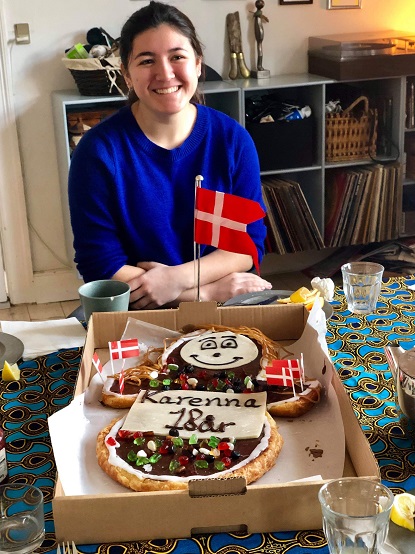 Karenna's 18th birthday with the traditional Danish cake. 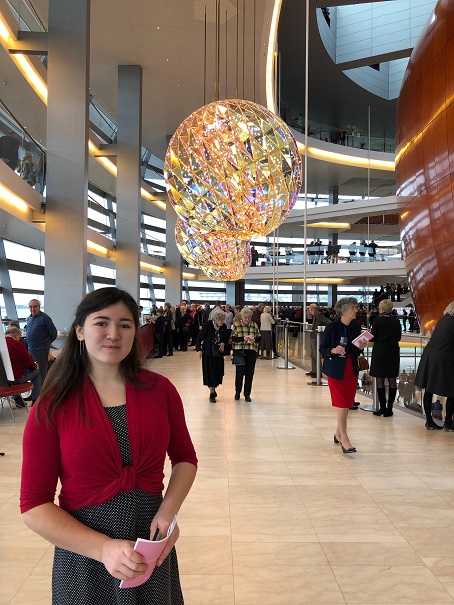 At the opera house. 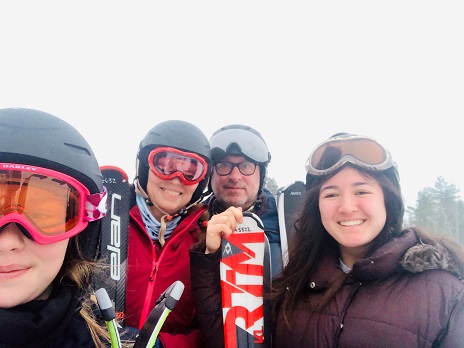 Skiing with her host family |
||||||||
Mara Shaw - What's New at Loving SpoonfulJohn Farrow introduced our Guest Speaker, Mara Shaw from Loving Spoonful. Mara's Daughter is our outbound exchange student this year, so Mara started by sharing some photos of Karenna in Denmark, and pledged to keep pitching Rotary Exchange to everyone she knows. Turning to today's topic, Mara started with Loving Spoonful's new Mission Statement: Loving Spoonful connects people with healthy food. They are working toward a healthier, more connected community and providing programs and championing policies affecting food security, poverty, social inclusion and community health. Since their inception, Loving Spoonful has delivered $1.7 Million of good food! (About $300,000/year). There are about 2 dozen agencies included in their distributions, including agencies like The Mess and Lunch by George, familiar to us all in the club. Mara also noted and thanked us for the information pamphlets that we funded - they are now distributed and are helping out! Loving Spoonful has recently launched the FoodRescue.ca app. Stores, restaurants, etc. can post what they have available and agencies can check on their phone and run pick the food up. Kingston was a pilot city last year and had the most number of ‘hits’ using the service. As a result of this success, FoodRescue.ca is now going national! Other programs under the Loving Spoonful umbrella are;
Mara remarked the new Canada Food Guide is awesome! It includes suggesting eating more with people and not alone! And be aware of food marketing! She also noted that Friday night they are bringing in a guest speaker from the US: Andrew Fisher, author of Big Hunger, to speak about the commercial influence has on the way we think about hunger. Mara also suggested that club members may want to volunteer to help us with the Manly Meals program barbeques in July! Questions: Ana Sutherland – We would like to invite you to be a Friend of Rotary with our Club! John Farrow – Really happy to see free and healthy food for people AND pets in your brochure. Thank you! Bill Egnatoff – how can we work with you – perhaps through our social media – to assist you further and be more involved in your success? Let’s talk! Elizabeth Cohoe will email Mara and pass on details of Manly Meals program. Heather thanked Mara on our behalf. Did you know that Rotary started with 4 business men who decided to get together with their bag lunches! |
||||||||
Project Launch - 2nd Week of RFERotarians from RC Cataraqui and other District 7040 Clubs from Rotary Friendship Exchange were among the guests of honour at the launch of a water and sanitation project co-sponsored by the Rotary Clubs of Madras and Chennai Chola. The inauguration 80 eighty new public toilets at Kannan Kottai Village was celebrated. In this area of India public defecation was common as there were no toilet facilities available even at schools. This lack of sanitation is a health hazard, as diseases like Polio, which Rotary has worked so hard to eliminate in India, are passed through infected soils and other means. Lack of sanitation in schools is a major impediment for young girls to get an education. Many choose to stay home rather than risk issues with menstruation in a public space. The entire project will see over 300 public toilets built. Thanks to Cataraqui Rotarian John Gale for spearheading this project, and congratulations to John as he was the guest of honour at the launch event. .jpg) |
||||||||
What is Rotary Friendship Exchange?In the absence of a regular club meeting this week, here is a look at Rotary Friendship Exchange. On February 9th, 12 Rotarians and partners left on a Rotary Friendship Exchange (RFE) trip to India. President Rick Fiedorec, Greta DuBois, President Elect Ana Sutherland, Past Presidents Michelle Chatten-Fiedorec, Heather Kembel, and John Gale, and member Ed Thompson, along with Jeri Mooney and Gary Kembel, are representing Cataraqui Rotary. Barry and Nicole Rowland, and Matgaret Shibley are representing other District clubs. During their exchange the team will visit other Rotary Clubs, visit projects that we have participated in funding, and talk to other Rotarians about Canada. They will even squeeze in some sightseeing as time allows. During their stay the team will be billeted by volunteer hosts from the Rotary Clubs in India. RFE is a great way to travel to another part of the world and see the work that Rotary does. Its unique structure of Rotarian hosting also makes it more affordable. Soon an RFE Team from India will make a reciprocal visit to Kingston, and there will be plenty of opportunities to connect with Rotarians from another part of the world. From the RI website; Edwin Bos and his family have visited India, Nepal, and most recently, the Philippines, through one of Rotary’s unique programs, Rotary Friendship Exchange. This exchange program gives Rotary members and their families the chance to experience new cultures — and make lifelong friends — by staying in the homes of Rotarians in other countries. Bos, assistant governor of District 6250 in Wisconsin, USA, led 13 Rotary members and their families on an exchange to the Philippines, where they stayed with Rotarians in District 3850. While there, they visited several projects, including a depository for shoe donations, a library’s computer literacy program, and a clean water initiative. Participants also enjoyed local festivals and learned about ecotourism in the Philippines. Rotary Friendship Exchange fosters interclub collaboration, with the goal of advancing international understanding and peace through service projects and spending time together. Bos’ district has worked on several international service projects, including a global grant project with the Rotary Club of Kalibo, Aklan, Philippines, that provided clean water. “Participating in the exchange was the best decision I’ve made as a Rotarian,” says Ellen Waldmer, of the Rotary Club of Jefferson, Wisconsin, USA. “I had the opportunity to see a water project our clubs and others helped fund and celebrate with the children and families it benefited. “We’ve made so many new Rotary friends while visiting our host families and clubs. It’s an experience we will treasure for years to come,” she adds. Please enjoy some of the photos that have been shared of our RFE Team. |
||||||||
Club Meeting of February 5th, 2019 - Updates from National and Membership CommitteesThis morning the spotlight was shared by our National and Membership Committees. National Committee Update Ana Sutherland presented two videos and a slide show of a project that we participated in with Focus Forward for Indigenous Youth. It was a shared presentation by Evan Barianrd (spelling?) from Focus Forward for Indigenous Youth. The Friendship Exchange Team will take this presentation to India, and speak with them about sharing a project with them. Included were interviews with the teachers and the students on benefits to them and their community. The greenhouse will support the growing of vegetables including several varieties of corn. It is a life-changing project for youth involved. The Greenhouse Project, Wikwemkoong First Nation Greenhouse for Change is a way to provide learning opportunities for youth and food for the community. This sustainable project taught the local Indigenous youth on Manitoulin Island how to build greenhouse, working in greenhouse, planting, harvesting, composting, and making pellets for pellet stoves through harvesting forest left-overs. There are many opportunities for growth and development, and interviews with the high school students reflected their enthusiasm and the new skills they learned, from planning, constructing, and managing the greenhouse . This can really change a Nation, a village.“Not a lot of kids to have the opportunity to go out and build another part of their school, their community.” a student said. Food will will be planted in the ground, in boxes, and aerially. The greenhouse will be heated with a pellet stove. Only the south side is exposed to the elements, saving energy. The project video will be posted soon. Kudos to Robert and the National Committee for their great work. Membership Committee update Ana gave details, almost finalized, of the new membership category, Friends of Rotary. The guidelines include the privilege of attending Rotary meetings, pay as you go breakfast, participation in fundraisers, soliciting funds for Rotary projects, wearing a special badge, orientation etc. Once the terms are in final form, they will be brought forward to the Board and the Club. Dues will cover insurance and other marginal costs. Limitations: A Friend of Rotary will not be a club member, will not be a voting member of any committee, will not hold office, won’t wear the Rotary wheel. Friends will have separate name tags and badges. Being a Friend is a great beginning to Rotary, part of the continuity of being involved in Rotary. It can include corporations and other groups. Q: Would a Friend qualify to go on a Friendship Exchange? (good discussion), but no definitive answer. Q: Fee. A: $150/year Q: Could they evaluate project proposals? A: Input would be welcome but no ranking of projects would be permitted. The Membership Committee would welcome whatever input Club members would have on this issue. |
||||||||
Vanessa Yzaguirre - Building a Diverse and Inclusive Community at Queen’s - What Can it Teach RotaryJohn Farrow introduced our Guest Speaker, Vanessa Yzaguirre, M.A. speaking about Building a Diverse and Inclusive Community at Queen’s. Vanessa was invited after John saw an article about her in the Queen's Alumni Magazine dedicated to diversity at the University. Vanessa is Special Projects Officer with the Human Rights and Equity Office at Queen's University.. She is originally from Venezuela and joined Queen's after completing a Masters in Gender Studies. Vanessa task is to work with administrative areas of Queen’s to develop and implement diversity and equity strategies. Practically, this means trying to understand and respect the diversity of the Queen's community when considering the work they do, the activities they plan and the interactions they have. Vanessa defined the terms human rights (entitlements we share by the simple fact of our humanity), diversity (any dimension that can be used to differentiate groups and people from one another), equity (the guarantee of fair treatment, access, opportunity, and advancement for all) ,and inclusion (the active, intentional, and ongoing engagement with diversity), buzz words that we all hear but don't often know the core concepts behind them. Once we understand what they mean, we need to develop the essential skills of collaboration, empathy, and listening so that we can understand what challenges different groups face and what an organization like Queen's (or a Rotary Club) needs to do to provide an inclusive environment for all. The areas that Queen's must consider are numerous, including but not limited to; Planning Exercises; Policies, Procedures and Practices, Committee Representation, Recruitment & Hiring, Supports, Education and Training, Procurement and Delivery of Goods and Services, Communications and Community Relations, Accessibility, and Consulting with Indigenous Communities. Questions: Heather Kembel– have you worked with the City at all? Yes, our Director was involved in the “Say Hello” campaign, and ways to move forward with that. Michelle Chatten-Fiedorec – So important to ask the question: “Do you need some help?” Robert Reid thanked Vanessa on our behalf. Hopefully her presentation gives us food for thought as to how we can make our club more inclusive and diverse. 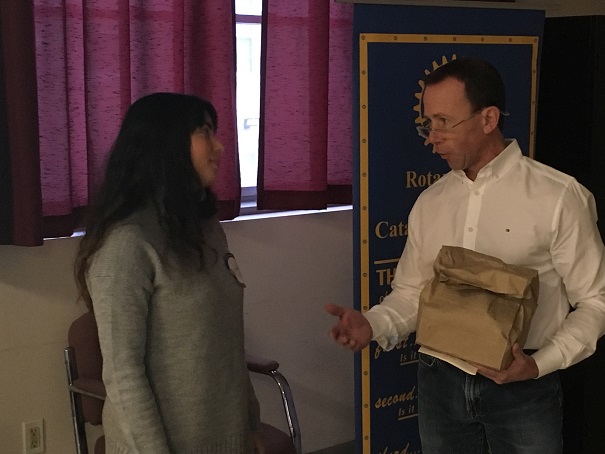 |
||||||||
SPEAKingstonSandy Sheahan & Donna Glasspoole were here today from SPEAKingston, an organization promoting smart development in Kingston.
|
||||||||
Maya Talks About Her Life in NorwayThis morning our exchange student Maya Bergersen spoke about her home country of Norway and her experience so far as an Rotary Exchange Student
|
||||||||
Annual General MeetingAnnual General Meeting was held on Tuesday, January the 8th |
||||||||
Annual Holiday PartyPresident-Elect Ana began the festive evening by welcoming all of the guests/partners who were in attendance this evening. Formal activities were light this evening, given over to the fellowship of Rotarians and their partners and guests. President Rick introduced our entertainment for the evening – Perpetual Emotion – an offshoot of the Kingston Townsmen Chorus. The men entertained us with a mix of traditional Christmas music, blended with some contemporary selections, including a humorous song about texting a loved one at Christmas. Big thanks to President Rick, who purchased the performance in our annual auction and donated it for our entertainment this evening. Auction co-chair Greg Mumford acknowledged the continuing support of the Kingston Townsmen and Perpetual Emotion to our auction. President Rick concluded the evening by thanking everyone for coming and by wishing everyone a safe and happy holiday season. 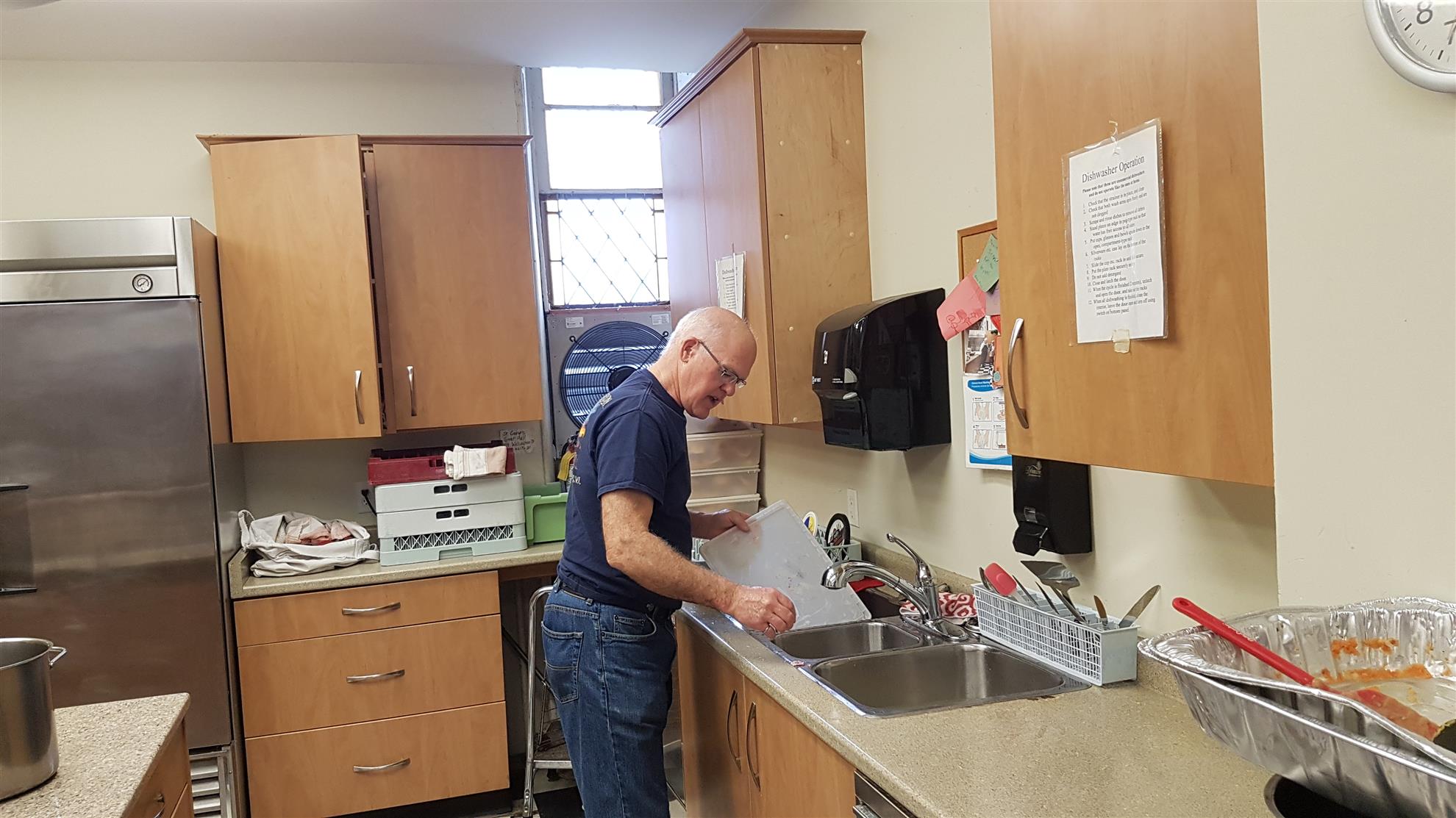 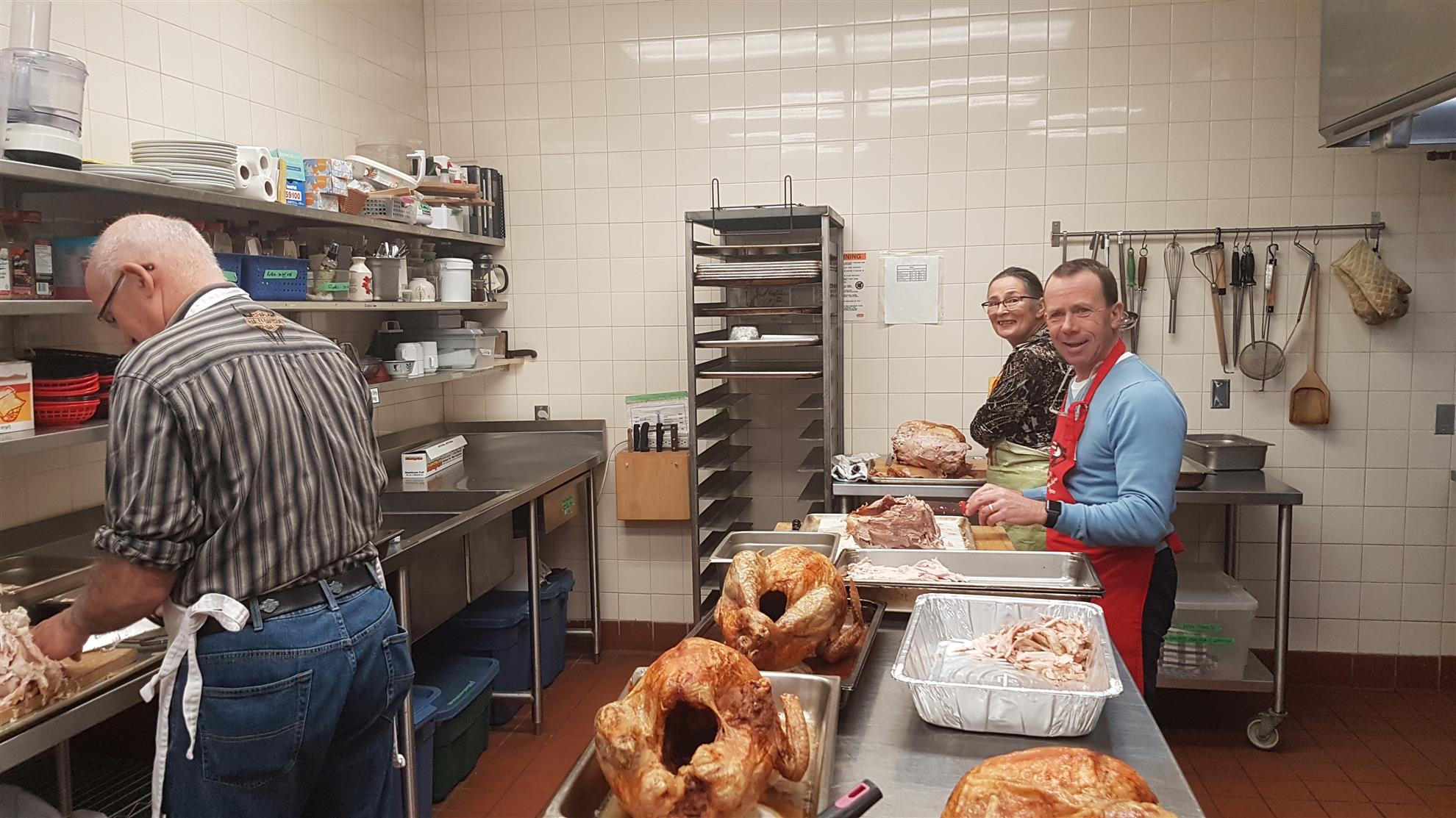 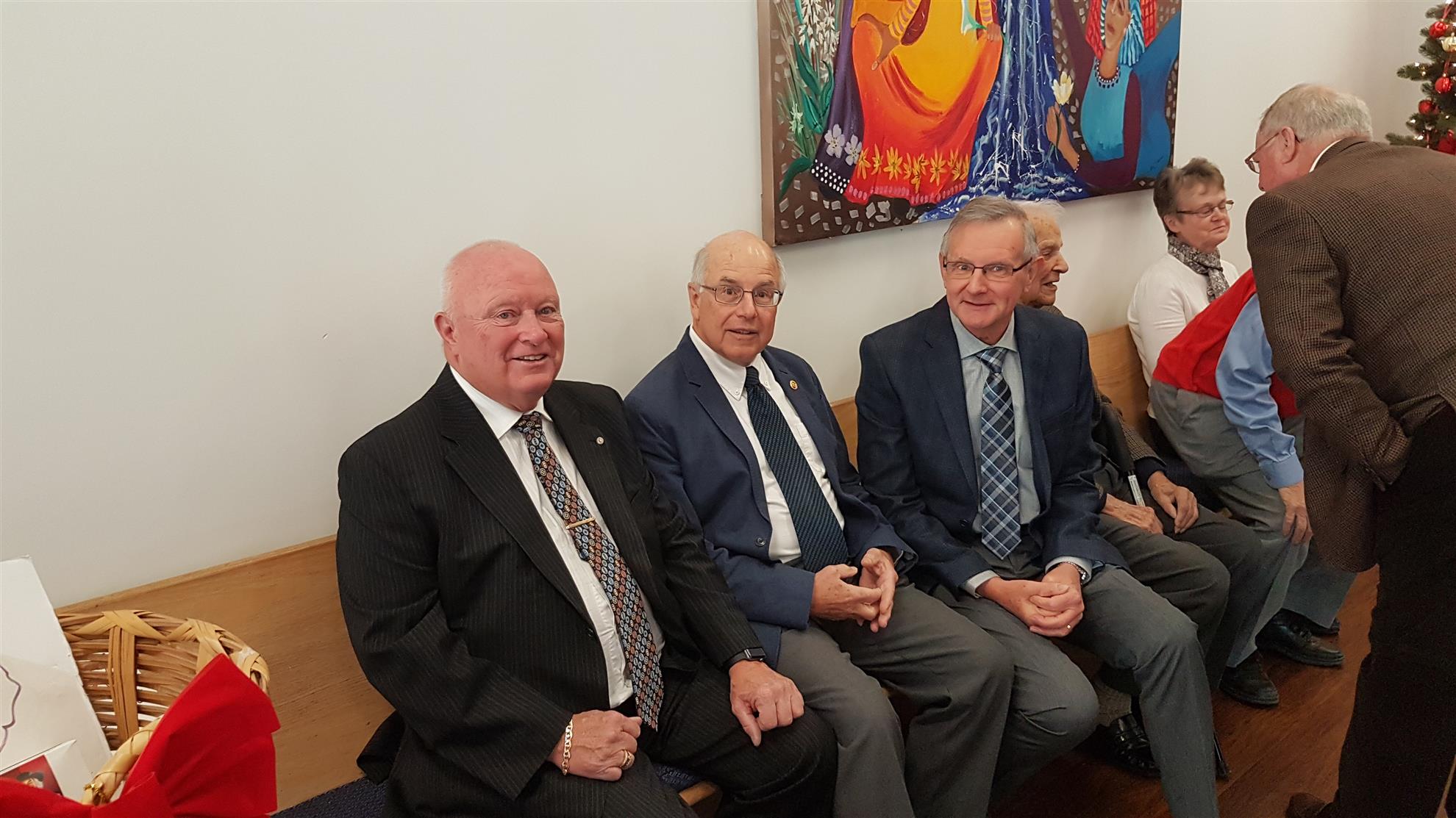 |
||||||||
C-K Rotary Presents Grants to Local Organizations November 27, 2018The meeting program for November 27, 2018 was the presentation of cheques totalling $17,720 to seven organizations who submitted grant proposals this fall, and also to one organization (Lunch by George) that we have been supporting annually for a number of years. Rotarian Terri Hodges coordinated the adjudication process from start to finish, beginning with the posting of information documents on the club website, receiving grant proposals submitted, distributing these to all of our club members, organizing and chairing the adjudication meeting to which all members are invited, and today being the culmination of that process with the presentation of cheques to successful applicants. Elizabeth Cohoe, director of service projects was on hand to assist Terri, and began the proceedings by thanking all of our club members who participated in any of the fund-raising events, including the auction, the nut drive, bingos, and cash calendar sales. |
||||||||
Arnold Lawrence reflects on a life in Rotary service |
||||||||
Paul Harris Fellow Awards November 20 2018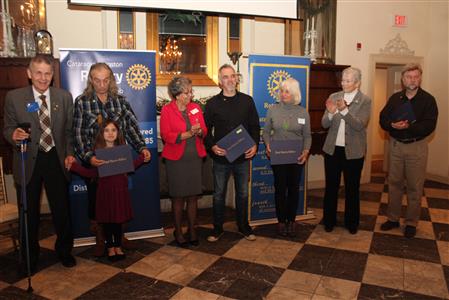
Greta du Bois, Director, Foundation, presented Paul Harris Fellow awards to four Kingstonians nominated by club members. Mary Farrar, nominated by Elizabeth CohoeI’ve nominated Mary Farrar to receive a Paul Harris Award for her many and varied contributions, that align with education, health, conservation, community building, and reconciliation with our Indigenous friends. Professionally, Mary was an elementary school teacher. She retired at 55, and after that became very deeply involved in our community. Mary moved into the city (from a hobby farm) 10 years ago and it was only then that she began cycling. She has been part of the initiative to get all the bike lanes you see now. This supports the physical health of our people as well as health of the environment by encouraging biking and reducing carbon emissions. She was instrumental in getting support from her city councilor and then from city staff to create the Inner Harbor Heritage Trail. With an initial dream of having a trail from the LaSalle Causeway to Kingston Mills on the west side of the Cataraqui River, our city staff suggested that she get a group together to work on possible plans. She was able to get the involvement of some influential citizens, and it went from there. In the end, staff went beyond the original suggestion and proposed that the trail come down the east side of the river as well. Council voted unanimously in favor of the project and completion is planned within the next 20 years. For Canada’s 150th, Council approved that the Inner Harbor Heritage trail be part of a connection between the downtown and the Trans Canada Trail. This connecting trail is now complete except for one inaccessible section at the intersection of Division and John Counter Blvd. Mary and her colleagues are working with city staff to ensure that a pedestrian and cycling overpass will be put in place to solve this problem. Mary is the President of Friends of the Kingston Inner Harbour. The trail has made the Douglas Fluhrer Park more accessible to people in the north end of Kingston. Before, they were cut off by the railroad. She taught for many years at the old Kingscourt Public School and has an affection for the people in that neighborhood. She strives to do things that will help to create social equity. The Kingston Inner Harbour is lively with a large number and variety of animals, including reptiles and birds. With Mary’s leadership, the Douglas Fluhrer Park has become an active place of learning, of projects to support the ecosystem, and activities that connect the settlers’ community to the Indigenous community. There have been organized family days, and many special events. Mary was aware early on in the project to support the turtle population that our Indigenous people place importance on turtles in their cultural beliefs and teaching. She has included The Mohawk Grandmothers’ Council, and The Caretakers of Belle Island. Activities at the park have included teaching about the science of turtles, and about Indigenous learning. On one occasion there was a blanket exercise held in the park, in cooperation with Four Directions and Peace Quest. By itself the turtles project is notable. It has been going for three years now. Volunteers monitor turtle behavior and cover the nests to protect them from predators. Mary has been able to obtain grants from the Kingston Community Foundation to coordinate the volunteers, and from Trailhead to connect paddlers with the turtles and from the Community Foundation to hire students to help with educational event coordination and improve the quality of the citizen-science research they are engaged in. As well, she has obtained financial support from notable foundations outside of Kingston. Partnerships are in place with Queen's University, Carleton University, and several charitable organizations interested in turtle preservation and turtle habitat. Mary herself has been out snorkeling in the Inner Harbour to try to determine where the turtles come back to hibernate. It is known where they bask in the sun, and where they lay, but not where they hibernate. It is necessary to learn these things as part of a long-term demographic study of turtle habitat there. On another note, most recently, Mary has begun to make the public aware of the lack of dental care provided to people in long term care. Her husband Edward has been permanently hospitalized at KGH, due to dementia, which also makes communication difficult. Mary had no idea that there is just no time for the staff to provide adequate dental hygiene, or she would have been providing this herself. Ed’s teeth were falling out, and in the end, this led to him having all his remaining teeth removed, due to neglect. Mary took her story to the Whig Standard, and the full story was reported. She stresses that she places no blame on the nursing staff, but since then, she has taken the first steps to bring about change. Mary is known affectionately to many as “The Turtle Lady”, so my friend Paulette Bruce who does traditional beadwork, and who is here today, designed and made something to recognize that before she receives the award. Doug van der Horden, nominated by Ana SutherlandDoug van der Horden is a child and youth worker and Adolescent Care Worker at Ernestown Secondary School in Odessa. Children and youth benefit from his work. He is providing clothes in a back-pack as a comfort item during the first point of police intervention. He works to raise awareness of human trafficking (see The Real Deal on Human Trafficking, Kingston Whig Standard) and is cofounder of the Alliance for Action to help victims. Raymond Vos, nominated by Bill GrayRay has helped many in Kingston to understand the challenges faced by many people in Kenya. He and Irwin Streight presented to Rotary Club of Cataraqui-Kingston telling us about the work and its impact. I have known Ray Vos for many years. He is a humble man and totally committed to doing what he can to improve lives in Kenya. He works incessantly on the project. Through Creative Framing/Gallery Raymond, Ray has been a consistent donor to the Rotary Club of Cataraqui-Kingston community auction. Ray is a fine example of what one person with a passion for service can accomplish. Ray Vos created The Kenya Initiative: From Street To School about 9 years ago after learning about the challenges faced by people living in and around Kijabe, Kenya. He wanted to support young people, often AIDS orphans or abandoned children, with housing and education at boarding high schools. Why boarding high schools? Students receive a much superior education and have the best opportunity to be able to care on with post-secondary options. But boarding high schools cost about $1,000 per year, far beyond the reach to most Kenyan families. Two young men, Isaac and Kaleb, were the first to benefit. With help from The Kenya Initiative, they have both graduated from university and are building their lives. Funds raised by The Kenya Initiative also support Thread of Hope, an organization training women to learn a skill and become providers for their families. Many have benefited from training and micro loans to establish business from a revolving loan fund made possible by The Kenya Initiative. Ray Vos has travelled to Kenya three times, 2013, 2016, and again in 2018 to learn, understand and provide moral and financial support. He is chief fundraiser and a major financial contributor to The Kenya Initiative. Many people purchase his photographs taken in Kenya of the people, all ages, and animals and landscape. 100% of sale proceeds go to The Kenya Initiative. On'a'got'tay, nominated by Bill GrayI met On'a'got'tay at an event of the Community Foundation of Kingston and Area following the release of the Truth and Reconciliation Commission. From then Nancy and I have gotten to know On'a'got'tay. I meet with him most weeks. He has broadened my understanding and I am very thankful for his coaching, friendship, guidance, and counsel. On'a'got'tay is active most every day as an ambassador for indigenous peoples, as an educator on matters of language and culture, as a medical person providing knowledge of indigenous medicine and natural remedies. On'a'got'tay has helped and helps all of us to have a better understanding of our past and to work not just for reconciliation but also for reconciliaction. He is a face of indigenous people in Kingston, enabling people of all races to learn from one another. Rotarians benefit from his attendance at weekly meetings. The National Committee particularly benefits from his knowledge and advice. At Kingston General Hospital, On'a'got'tay educates medical personnel on traditional remedies at the same time he comforts indigenous patients with the ways of western medicine. He is sought out by local school boards and by the City of Kingston. Children benefit weekly at The Language Nest, a beneficiary of Rotary Club of Cataraqui-Kingston, by learning their language and culture. On'a'got'tay is one of the founders. The Saturday morning programme takes place at Kingston Community Health Centre. Church groups are gaining understanding through his teaching. |
||||||||
Kingston Drum Circle October 9 2018Greta introduced our two speakers, Yessica Rivera Belsham and Théo Paradis aka Red Sky, from the Kingston Drum Circle. Yessica originates in Mexico, and Théo comes from the Ottawa area. Both are indigenous people. Yessica started Brazilian drumming in 2009, and has gradually added drums from all over the world. The Kingston Drum Circle is using drumming to bring people back to their indigenous roots. Drums can be found in every part of the world, and in this context, represent the heart beat of Mother Earth. Yessica brought a drum from West Africa, and because of Thanksgiving, the two shared a song of gratitude for Mother Earth. She explained that as you feel the vibration, you can think about things that make you feel love in your heart. She was located at the Tett Centre for a while but can now be found at the Canadian Mental Health Association headquarters. For them, so much of what the drums can do is related to mental health. All cultures have something to share, and every voice is beautiful. She has also done programs at H’Art and at Ongwanada. Yessica now has a total of 40 drums, and is receiving requests from schools, and from Providence Care. From questions that followed, she talked about the drum tradition in Mexico. Drums have been used in ceremony, in war, and more frequently in celebration. It had been suggested that she submit a grant proposal to our community grants process, to obtain drum kits for schools, but decided against this idea. For her the drums must be authentic. The drums connect many natural elements. She pointed out that just on the one drum at the meeting, it involved goat skin, wood and water. She sees it as creating a connection on a deep level to Mother Earth. It’s much more than just playing with drums. Today, many indigenous people are struggling to return to the culture that was taken away, and drumming is a meaningful way to reconnect. Heather Kembel offered thanks to Yessica and Théo, especially for the song of gratitude at this time.
|
||||||||
Why Ranked Ballots?--Jacob Gardner, October 2, 2018Jacob Gardner, our guest speaker, October 2, 2018, is a Radiologist at KGH and is involved in the Ranked Ballot initiative and is here to tell us about it. I went to Ottawa when I was 17 as part of Adventures in Citizenship. We are currently use a first-past-the-post system for civic elections in Kingston. This splits the vote across those running on the popular issue. A ranked-ballot system is being proposed in which voters rank all the candidates, first to last, and the race is run over and over, each time eliminating the last person, until one candidate has more than 50% of the vote. This sets up for a more civil election. You shouldn’t have to vote "the least of the evils." There is no strategic voting with ranked ballot– you don’t have to vote for someone you don’t want. The ranked ballot system allows newer candidates to thrive. The referendum question will be on the ballot of the upcoming mayoral and district rep election. For more information, see: Ranked Ballots--City of Kingston. |
||||||||
Joan Egnatoff becomes Honorary Rotarian
|
||||||||
Kayleigh Hunter reports on Adventures in Understanding
|
||||||||
Vicki Poffley and the work of the Alzheimer SocietyVicki Poffley, Executive Director of the Alzheimer Society, Kingston, Frontenac, Lennox & Addington addressed the Rotary Club of Cataraqui-Kingston, Tuesday September 18th. Below are notes on her talk and the ensuing discussion. There has been an amazing growth in social awareness and in the number of individuals to whom The Alzheimer Society provides service. Often for talks such as this she brings a family—Bob and Laurel—to share their story, but 7am is too early! Laurel is the caregiver and her husband Bob has dementia. They say hello and may come to visit on some other occasion. The Alzheimer Society in Kingston was started in 1981 by volunteers. Some founders are still involved. Last year recognized need for extended services in KFL&A; there are now satellites in Sharbot Lake, Northbrook, and Napanee. People shouldn’t have to drive an hour for services; services should be available close to home. The board has generously supported this expansion. Funding comes from grants, the Local Health Integration Network (LHIN) and fund raising. |
||||||||
Helen Tufts Nursery School - Open House Sept 6, 2018In the spring of 2018, our club awarded the school a grant of $5,000, to assist with renovations in their new location. They needed to build a washroom within the classroom with toilets and sinks accessible to small children. |
||||||||
Marcel Gummert Youth Exchange to Italy 2017-2018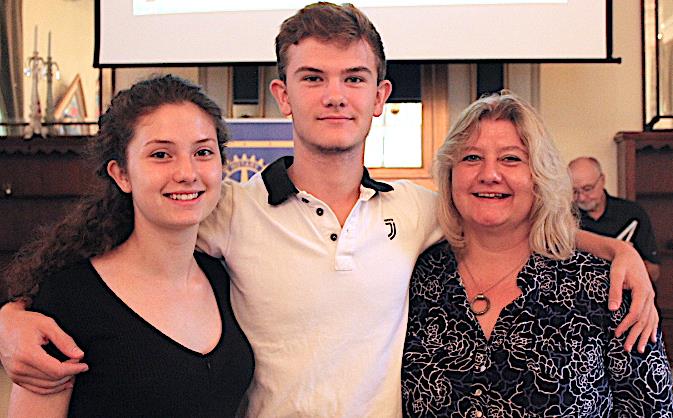 Karina Gummert, Marcel Gummert, Sigi Scholten, August 7, 2018 Marcel spoke on August 7th about his experience as a youth exchange student in Italy during the school year 2017-2018. He was introduced by his mother, club member Sigi Scholten, who spoke of how proud she was of her children, how much the year changed them, and how grateful she was to Rotary and our club for the great opportunity. Summary of Marcel's talkPeople usually think Spaghetti, Pizza, Gelato, and hand gestures. And the hand gestures one is so true! In the North of Italy and very densely populated: Cremona Not a very unified country, with different dialects even as close as 50km apart. I played soccer there – had to register and paperwork took 5 months to come back from Rome! Attended all the practices, but in the end I couldn’t play in the games with my team. Everyone crazy about soccer, even if they don’t play. The pizza there tastes SO different than the pizza here. I liked the thinner one best. 13 exchange students in Cremona and we would meet regularly to chat and have coffee. Stayed with 3 different host families and it was an amazing experience. After about 7 mos, I made dinner for 11 of us exchange students. Visited Pisa, Milan (went 5 or 6 times); went skiing at Ponto di Ligno – through the clouds!; Lake Garda, Rome (my sister Karina visited with me in March); Class trip to Munich!; Venice – best seafood ever!; Sicily – most beautiful beach ever!; Salo (visited our exchange student from last year); Great water bottle fillup stations! Florence (in hospital for 5 days, and that messed up my visit with my family); Cinque Terre – 5 little towns on beautiful cliffs overlooking the water; Prague; Vienna – went to the UN; Budapest – my favourite city of the whole trip – good food and awesome people; Slovenia; visited so many different cities that I can’t remember them all! I learned so much – new life experiences, new friends, beautiful memories. Thank you SO much for this opportunity – the best year of my life yet! PhotosQuestionsQ (Bill E. with a grin): Did you go to school? A: I DID go to school there and studied Italian. High schools are subject specific – language, science, economics – different from here. Q: (Michelle) Before you went, what did you most want to achieve? A: I wanted to learn Italian. Achieved a language certificate.
Heather thanked Marcel on behalf of the Club. |
||||||||
Lily Auty
Lily is a student at Guelph in Environmental Science. She is working for Ducks Unlimited Canada on Wolfe Island to battle invasive species. European Water Chestnut – floating plant that quickly forms a dense floating mat that lowers oxygen levels detrimental to fish and wildlife. Seeds are sharp and dangerous when washed up on shore. Currently hand-pulling to remove them. Need to be careful if wrapped around lilly stems. Pulls out quite easily. 2 people pulling weeds all day! J Leave on land to dry out. Native to western Europe, Africa brought as ornamental plant in 1879. 66% reduction in 3 years. After pulling the plants in an area, they do surveillance around the area to look for more. No bio-controls known for European water chestnut (which have risks of their own). Volunteer, avoid boating in infested areas, never release non-native plants or fish. Bigger problem on south shore in the States. Not much further east than here for us. For the slides of Lilly's presentation, see: photoalbums/lily-auty-invasive-species-talk-slides-july-31-2018 |
||||||||
Dorothy Cotton: Interactions Between Law Enforcement and the Mentally IllDr. Dorothy Cotton--Biography
Dr. Dorothy Cotton is a forensic psychologist with a particular interest in the area of police psychology and who holds diplomate status in police psychology—the only one in Canada. She is an Associate Member of both the International Association of Chiefs of Police and the Canadian Association of Chiefs of Police and has been involved in the latter organization’s policy and program development related to police/mental health systems liaison. She consults regularly, both formally and informally, with police services across the country about issues related to development of mental health liaisons programs and committees. Dr. Cotton also provides pre-employment and fitness for duty assessments to a variety of police services. Dr. Cotton is also an adjunct faculty member at Queen’s University, is Past President of the College of Psychologists of Ontario (the regulatory body for psychology), has served on the Board of Directors of the Canadian Psychological Association (CPA) and is also a Fellow of CPA. She served on the Mental Health and the Law Committee of the Mental Health Association of Canada. In 2012, she received a Diamond Jubilee Medal recognizing her work in relation to interactions between police and people with mental illnesses and in 2018 she was invested into the Order of Ontario for her work in this area. |
||||||||
Kingston Indigenous Medical Aid Initiative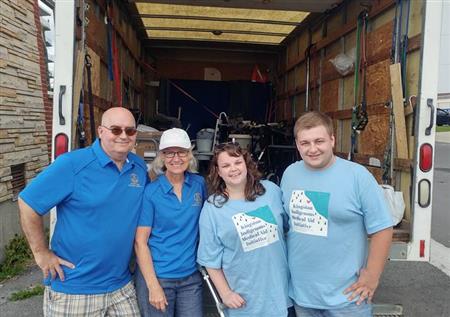
The Kingston Indigenous Medical Aid Initiative, spearheaded by Amanda Stolk and Michael Amesse, and assisted by the Rotary Club of Cataraqui-Kington, hosted a medical supply drive on Aug. 19 in support of the Weeneebayko Area Health Authority. The Weeneebayko region in northern Ontario is home to six Indigenous communities -- Attawapiskat, Fort Albany, Moosefactory, Peawanuck, Kasechewan and Mooseonee -- whose patients are routinely flown to Kingston for medical care. Because they are not close to larger cities, members of these communities can end up waiting for weeks to receive medical supplies that are readily available to patients in southern Ontario.
|
||||||||
Helping people with disabilities make their own music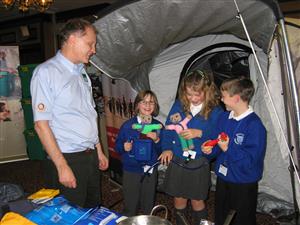
Music has been an important part of leading an ordinary life for students at the Music School for Children With Disabilities in Honor of Paul Harris in Lublin, Poland. Founded by Rotary members, the school serves 20 students with various disabilities, including Down syndrome, autism, and visual impairments. The Rotary Club of Lublin-Centrum-Maria Curie-Sklodowska has provided funding with help from Rotary Foundation Matching Grants and the Henryk Wieniawski Musical Society, which houses the school.
After their son Mateusz was born with underdeveloped eyes, Mariusz and Joanna Kania looked for ways to help him be active. When he showed an aptitude for music, they looked for a teacher and were thrilled to find the Paul Harris music school.
|
||||||||
Saving lives in Ghana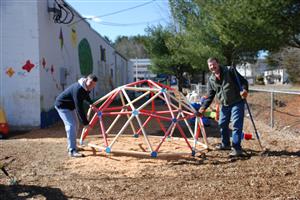 What is it like taking a large team to Africa? It has probably been one of the most rewarding experiences in my life. In mid February, I began leading Rotary members from all over the East Coast of the United States through Ghana. I’ve tried to give the team a warm Ghanaian welcome like I’ve received on my earlier trips. A large trip is a real blessing because each person sees Ghana and our work in a different way. What is it like taking a large team to Africa? It has probably been one of the most rewarding experiences in my life. In mid February, I began leading Rotary members from all over the East Coast of the United States through Ghana. I’ve tried to give the team a warm Ghanaian welcome like I’ve received on my earlier trips. A large trip is a real blessing because each person sees Ghana and our work in a different way.A highlight for the team was greeting the chief of Sagadugu. The team got excited about buying goats and food for children in the villages where I support eight churches. It was good to see the pastors of most of the eight churches, and I had to explain that we were just passing through on our way to Bolgatanga. |
||||||||
Finding Safe Haven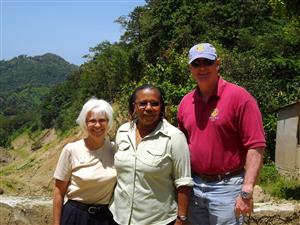 For years, Angalia Bianca had slept in abandoned buildings throughout Chicago. She stole. She did drugs. She spent time in and out of jail for forgery, theft, trespassing, and possession of narcotics. But after she landed in prison for the seventh time, something changed -- Bianca knew she wanted a better life. She just didn’t know how to make it happen. For years, Angalia Bianca had slept in abandoned buildings throughout Chicago. She stole. She did drugs. She spent time in and out of jail for forgery, theft, trespassing, and possession of narcotics. But after she landed in prison for the seventh time, something changed -- Bianca knew she wanted a better life. She just didn’t know how to make it happen.After serving her time, Bianca sought help from a local homeless organization, A Safe Haven, and moved to its shelter in the Rogers Park neighborhood. Bianca followed the program closely -- she attended all the required meetings, passed drug tests, and volunteered at every opportunity.
|
||||||||
India celebrates three years without polio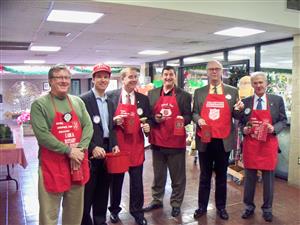 Throughout India and around the world, Rotary clubs are celebrating a major milestone: India has gone three years without a new case of polio. The last reported case was a two-year-old girl in West Bengal on 13 January 2011. To mark this historic triumph, Rotary clubs illuminated landmarks and iconic structures throughout the country with four simple but powerful words, "India is polio free." Throughout India and around the world, Rotary clubs are celebrating a major milestone: India has gone three years without a new case of polio. The last reported case was a two-year-old girl in West Bengal on 13 January 2011. To mark this historic triumph, Rotary clubs illuminated landmarks and iconic structures throughout the country with four simple but powerful words, "India is polio free."The three-year achievement sets the stage for polio-free certification of the entire Southeast Asia region by the World Health Organization. The Indian government also plans to convene a polio summit in February to commemorate this victory in the global effort to eradicate polio.
|


